crony capitalism
description: capitalism featuring undue alliances between business interests and politicians
191 results
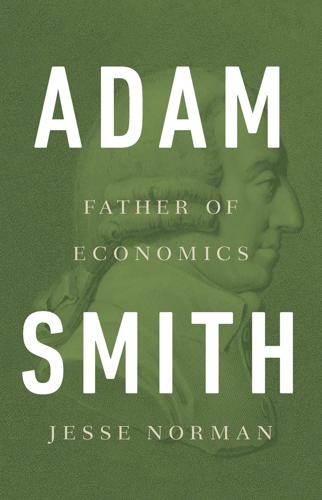
Adam Smith: Father of Economics
by
Jesse Norman
Published 30 Jun 2018
On this view, a general reduction in pay and bonuses across the sector to levels closer to those of other similarly skilled industries, if it could be achieved, would transform the profitability of the banks, and the returns to shareholders. CRONY CAPITALISM AND ‘THE MERCANTILE INTEREST’ Lobbying, rent-extraction, very high pay, growing inequality… the pattern seems clear. Yet, although it is especially evident in the banking sector, one should not ignore the wider picture. For this is just one extreme example of a much more general phenomenon: crony capitalism. What is crony capitalism? It has no single settled definition. But for present purposes we can usefully think of it as having two key features. The first is that business activity loses any relation to, and often clashes with, the wider public interest; the second is that business merit is separated from business reward.
…
Meanwhile government acts to support education, improve public works and prevent market-manipulation and rent-extraction. This is not crony capitalism, in any of its many varieties, but its antidote. CAPITALISM AND EQUALITY A better understanding of Adam Smith and his thought does not merely serve to refute some of the wilder allegations made about him. We can also use it to review the achievements of the modern market economy, to trace the arguments over free trade since Smith’s death and to examine new forces helping to drive crony capitalism today. One point is absolutely fundamental, and bears restating: that markets are the greatest tool of economic development, wealth-creation and social advance ever known.
…
There we see rapidly rising inequality between the top 1 per cent, the top 0.1 per cent and the top 0.01 per cent and the rest—that is, at the very high end of the income spectrum—and this is in part the result of crony capitalism. But the overall picture is that global inequality is falling, especially between nations, and it is falling because of the spread of markets. This confirms the point already made: that crony capitalism is a specific pathology, a disease of capitalism rather than capitalism itself. The capacity to create human prosperity is a human good, so the case for capitalism is not just one about wealth-creation.
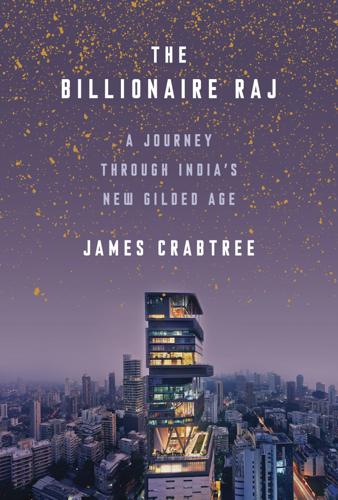
The Billionaire Raj: A Journey Through India's New Gilded Age
by
James Crabtree
Published 2 Jul 2018
London, Routledge, 2002. Gowda, M. V. R. and Sharalaya, N. “Crony Capitalism and India’s Political System.” In N. Khatri and A. K. Ojha, eds., Crony Capitalism in India: Establishing Robust Counteractive Institutional Frameworks. Basingstoke, Palgrave Macmillan, 2016. Guha, R. A Corner of a Foreign Field: The Indian History of a British Sport. London, Picador, 2003. ———. India after Gandhi: The History of the World’s Largest Democracy, rev. ed. London, Pan Macmillan, 2011. Guha Thakurta, P., Ghosh, S., and Chaudhuri, J. Gas Wars: Crony Capitalism and the Ambanis. New Delhi, Paranjoy Guha Thakurta, 2014.
…
Rents, Rent-Seeking and Economic Development: Theory and Evidence in Asia. Cambridge, UK, Cambridge University Press, 2000. Khanna, J. and Johnston, M. “India’s Middlemen: Connecting by Corrupting?” Crime, Law and Social Change, 48(3–5), 2007. Khatri, N. and Ohja, A. K. “Indian Economic Philosophy and Crony Capitalism.” In N. Khatri and A. K. Ojha, eds., Crony Capitalism in India: Establishing Robust Counteractive Institutional Frameworks. Basingstoke, Palgrave Macmillan, 2016. Khilnani, S. The Idea of India. New Delhi, Penguin, 1999. Klitgaard, R. Controlling Corruption. Berkeley, University of California Press, 1988. Kumar, A.
…
Countries riven by internal divisions are also less likely to build the kind of broad social consensus that makes it easier to introduce tough structural reforms, of the type that India itself now badly needs if it is to continue to develop economically. There is also every reason to believe that, without intervention, the gap between India’s rich and the rest will keep widening. The rise of the super-rich then ties into a second issue: crony capitalism, meaning collusion between political and business elites to capture valuable public resources for themselves. India’s old system of central planning and state controls created fertile ground for graft, forcing citizens and businesses alike to pay myriad bribes for basic state services. Yet these problems of retail corruption were trivial compared to those that emerged during the go-go years of the 2000s.
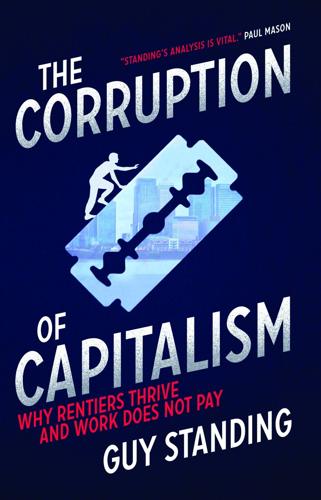
The Corruption of Capitalism: Why Rentiers Thrive and Work Does Not Pay
by
Guy Standing
Published 13 Jul 2016
As The Economist admitted, ‘If technology were to be classified as a crony industry, rent-seeking wealth would be higher and rising steadily in the Western world.’ Moreover, The Economist’s narrow definition substantially understates crony capitalism. Its examples of rent seeking were ‘forming cartels’ and ‘lobbying for rules that benefit a firm at the expense of competitors and customers’. It thus omitted the most insidious way in which crony capitalism is extending its grip: political manipulation by the plutocracy and elite, who are funding politicians and political parties to favour the interest of rentiers (see Chapter 7). Another aspect of crony capitalism is the spread of corporate rentier devices. Individuals or groups buy firms, saddle them with debt, pay themselves huge bonuses and then declare bankruptcy, thereby privatising profit and socialising losses.
…
They were soon to be welcomed and feted in the UK and elsewhere, integrated into the global elite and enabled to fund political parties keen to serve their interests. As in developing countries under structural adjustment, inequality and oligarchy did not come about as a result of free markets but as the predicted consequence of institutional interventions deploying an ideological agenda. They created a venal form of crony capitalism. The Economist has constructed an index of crony capitalism based on the wealth of billionaires in sectors such as casinos, oil and construction where, in its view, there is ample scope for rent seeking through cosy relations with government.2 It claims that rent seeking is worse in emerging-market economies, which account for two-thirds of ‘crony wealth’, with Russia heading the 2016 rankings of twenty-two countries.
…
But corporations and financiers have used their new power to induce governments and supranational financial institutions to build an infrastructure that favours their interests. Aided by the neo-liberal economics community, they have constructed a global framework of institutions and regulations that enable elites to maximise their rental income. It is anything but a ‘free market’. FROM BRETTON WOODS TO CRONY CAPITALISM In 1944, forty-four allied nations met at Bretton Woods, New Hampshire, in the USA to set up a trio of global institutions. The World Bank was established to rebuild capitalism, the International Monetary Fund (IMF) to maintain economic stability, and the General Agreement on Tariffs and Trade (later to become the World Trade Organization) to liberalise trade.

The Fourth Revolution: The Global Race to Reinvent the State
by
John Micklethwait
and
Adrian Wooldridge
Published 14 May 2014
The heirs of Reagan could do with a little of his vim. CRONY CAPITALISM BY THE POTOMAC If privatization is the American Right’s great blind spot, subsidies for the wealthy is the Left’s. Dismantling the web of handouts for the rich and powerful should be at the very top of progressive America’s agenda—in the same way that royal patronage was the great enemy for John Stuart Mill. So far the Left has concentrated on trying to raise taxes in the name of redistribution. It would be much better to focus on dismantling the welfare state for America’s plutocrats. There are two rich targets. The first is crony capitalism: all those subsidies for well-connected industries.
…
The second is the personal tax system, which, as we have seen, is massively distorted by aid to the rich. Fixing these things would simultaneously slim Leviathan and help it focus its energies on people who actually need its help. Crony capitalism represents the most egregious example of Olson’s law. If market capitalism provides a way of turning private benefits to the public good, as Adam Smith argued, crony capitalism provides a way of turning public goods to private gain, lining the pockets of the powerful, undermining economic competitiveness, and misdirecting resources on a huge scale. The industry with the longest history of sucking at the udder of the state is agriculture.
…
Over the past decade eighteen former senior ministers and civil servants have taken jobs with Britain’s biggest three accountancy firms, whose work includes helping businesses minimize their tax bills and lobby the government. For progressives of all sorts this is a huge missed opportunity. The battle against crony capitalism is older than America itself: The Boston Tea Party was a protest against the East India Company, which was using its political connections in London to subsidize its tea. The Democratic Party would not only save the state a lot of money if it were to campaign against crony capitalism. It would also become a champion of the future in much the same way that British radicals did in the nineteenth century by taking on the systems of “outdoor relief for the upper classes” in the form of Corn Laws and patronage.
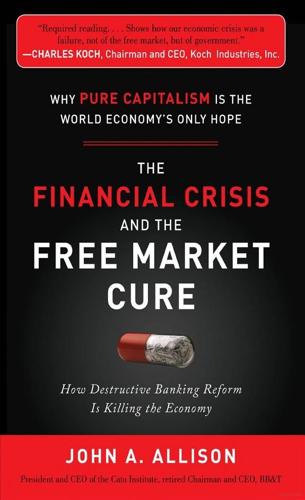
The Financial Crisis and the Free Market Cure: Why Pure Capitalism Is the World Economy's Only Hope
by
John A. Allison
Published 20 Sep 2012
Instead of dealing with market forces, it is easier to influence the political allocation of resources, that is, money. However, the problem is not Goldman. The problem is that the politicians and bureaucrats have this power. If the U.S. Constitution were enforced, crony capitalism would not work because the politicians and bureaucrats would not have the authority to hand out favors to their friends. If there were a separation of economics and state as there is of church and state, crony capitalism would not be possible. Crony capitalism is really crony socialism and is caused by politicians, that is, government. There can be no moral justification for saving Goldman and letting Lehman fail. Many insiders will tell you that Paulson hated Lehman.
…
Accounting: loan loss reserves, 152–154 principles-based, 109 private accounting systems, 177–178 rules-based, 109 (See also Fair-value accounting) AEI (American Enterprise Institute), 64 Affordable housing efforts, 43, 216 Afghanistan, 198 African Americans, 43, 55 AIG: bailout, 128–130, 164 CDSs of, 126–127 TARP funds for, 168 Ally Financial, 178 Alt-A portfolios, 64 Altruism, 215–218, 222–223, 252 Ambac, 86 American Enterprise Institute (AEI), 64 Antitrust laws, 174–175 Argentina, 8 Arthur Andersen, 109 Asian Americans, 43 Assets, valuation of, 106–108 Atlas Shrugged (Ayn Rand), 225 Auction-rate municipal bond market, 85–87 Authority, of regulatory agencies, 46–47 Auto finance market, 178–180 Bank bailout (see Troubled Asset Relief Program (TARP)) Bank of America, 116, 150, 237 counterparty risk at, 124 credit decisions at, 238 funding of shadow banking system, 120 “too-big-to-fail” firms, 173 Bank runs, 75–76 Banking industry, 67–72 competition with risk-taking financial institutions, 39–40 economic role of, 67–69 and Federal Reserve, 22–23 fractional reserve banking, 69–70 in Great Depression vs. recent financial crisis, 70–72 (See also Shadow banking system) Banking industry reforms, 187–193 Dodd-Frank bill, 193 and Federal Reserve, 187–188 and gold standard, 188–189 reducing risk of economic cycles with, 189–193 Banking regulation, 133–147 in Bush administration, 133–136 effects on small businesses, 144–147 impact of, 147 and lending policies of banks, 138–146 and mathematical modeling for risk management, 136–138 reform of, 190 Bankruptcy, 8, 124 Banks: capital requirements for, 190 economic forecasting by, 28 FDIC and risk-taking by, 38–41 healthy, effects of TARP on, 172–174 lending policies of, 138–146 leverage ratios of, 70–72 misinvestment effects on, 12–14 private, 97–99, 187–188 self-insurance at, 48–52 start-up, 38–39 stress tests for, 171 (See also Investment banks) Barclays Bank, 164 Basel Accords, 51, 71, 125, 137, 151 BB&T Corporation, 23–24 and AIG bailout, 128 auditors of, 134 in auto finance market, 178 bonds of, 76, 84–85 competition with risk-taking financial institutions, 39–40, 98 conservatism of, 30 culture of, 240–241 failed bank takeover by, 38–39, 47–48 financial crisis for, 1–2 and flight to quality, 87, 105 home mortgages by, 97–98 and Lehman Brothers failure, 162–163 and liquidity crisis, 105–106 loan loss reserves of, 153–154 and mathematical modeling, 136–137 and misinvestment in residential real estate, 12–14 mortgage servicing rights, 111–112 and pick-a-payment mortgages, 91–92 post-crisis lending policies, 139–140, 142–145 racial discrimination in lending accusation, 42–45 selling of mortgages by, 113 TARP participation by, 170–172 trader principle of, 223 underwriting standards of, 141 use of derivatives, 122, 123 wellness program of, 202–203 Bear Stearns, 70, 71 bailout of, 104, 162 Cdss on bonds of, 127–128 counterparty risk at, 124 derivatives from, 123 financial “innovations” of, 101 Bernanke, Ben: and 2008 panic, 164, 167 and development of TARP, 76, 169–171 monetary policy of, 27–31, 33, 35, 40, 125, 213 response to financial crisis, 7, 70 Blair, Tony, 164 Bond insurance, 86–87 bonds: auction-rate municipal bond market, 85–87 effects of FDIC for, 40–41 fair-value accounting for, 105 subprime mortgage, 82–84 of Washington Mutual, 75–76 Borrowers: CRA, 56–57 of pick-a-payment mortgages, 90–91 post-crisis treatment of, 142–145 and racial discrimination in lending, 42–45 regulated changes in grading for, 140–141 Borrowing for consumption, 57–58 Boston Federal Reserve bank, 42 Budget, federal, 182–183 Bush, George W., and administration: action in financial panic, 161, 167 banking regulations, 133–136 economic proposals, 15 Patriot Act, 45, 46 regulation of Fannie Mae and Freddie Mac, 63 California, 21, 74, 90 CalPERS (California Public Employees’ Retirement System), 93, 116, 121, 131 Canada, 192 Capital: against GSE loans, 137 and leverage, 70–71 and loan loss reserves, 153 misinvestment of, 9–11, 14 wasting of, 159–160 Capital markets, 85–87, 101 Capital standards: for banks, 190 for loans, 51–52 and TARP, 170–171 Capitalism: crony, 6, 102, 129, 179 and freedom, 253–254 at universities, 231–233 Capitalism (Alan Greenspan), 32 Carter, Jimmy, 161, 179 Cash basis accounting, 110 Cash flows, 106–107, 115 Cato Institute, 201 CDOs (collateralized debt obligations), 124–126 CDSs (credit default swaps), 126–128 CEOs (Chief Executive Officers): behavior of, 2–3 decisions of Federal Reserve vs., 34 and rules-based accounting, 109 wage rates of, 210 China: currency standard, 77 demographics, 205 education, 230 GDP of U.S. vs., 183 government debt in, 200 manufacturing in, 10, 25–26, 161 market-based pricing in, 34 military spending in, 198 stimulus fund use, 181–182 trade with, 204–205 U.S. investment by, 29, 159 Chrysler, 130, 179–180 Citigroup: bailout of, 50, 104, 130, 177 CDOs of, 125–126 credit decisions, 238 crony capitalism, 6 funding of shadow banking system, 120 long-term debt of, 71 and panic during financial crisis, 163 pragmatism at, 217–218 reason at, 245 “too-big-to-fail” firms, 173 Clearing, 104 Clinton, Bill: lending reforms, 42–44, 56 subprime lending requirements, 58–60 Collateralized debt obligations (CDOs), 124–126 Colonial Bank, 47–48 Commercial real estate, 11, 97 Common good, 215–216 Community Reinvestment Act (CRA), 42, 55–57, 59 Compensation, 50, 83–84, 197–198 Confidence, 84–87, 184–185 Conservatives, 108 Consumer compliance, 193 Consumer Price Index (CPI), 26–27 Consumption: borrowing for, 57–58 housing as, 9–12, 54–55, 73–74 Contagion risk, 123 Corporate debt, 107 Counterparty risk, 123, 124 Countrywide: crony capitalism at, 6 and fair-value accounting change, 114, 118 and FDIC insurance, 39, 41, 46 necessary failure of, 159 pick-a-payment mortgages of, 91–93 subprime business at, 99 thrift history of, 98 CPI (see Consumer Price Index) CRA (see Community Reinvestment Act) Creativity, 7, 247 Credit default swaps (CDSs), 126–128 Credit rating agencies (see Rating agencies) Crony capitalism, 6, 102, 129, 179 Cross-guarantor insurance fund, 48–52 Cuba, 34, 247, 252 Cuomo, Andrew, 58 Currency, debasing, 22 Debt, 21–22, 107 Declaration of Independence, 220, 252 Defaults, 90–91, 126–128 Defense spending, 198–199, 227 Deflation, 22 Demand, supply and, 104, 185, 209, 210 Department of Housing and Urban Development (HUD), 15, 58 Deposits, disintermediation of, 120–121 Derivatives, 3, 120, 122–124 Disclosure requirements, 150–152 Dodd, Christopher, 7, 46, 61, 63, 64 Dodd-Frank Wall Street Reform and Consumer Protection Act: deficiencies of, 193 introduction of, 63–64, 183 as misregulation, 147 results of, 130 and TARP, 173, 174 Dollar, U.S., 77, 188, 229 Durbin amendment, 193 Earnings, operating, 103–106 East Germany, 34, 247 Eastern Europe, 34, 252 Economic cycles, 108, 189–193 Economic health, 159–161 Economic recovery, 1, 207–208 Economy, banking industry in, 67–69 Edison, Thomas, 19, 158–159 Education, 230–235, 247 Egypt, ancient, 230 Elitism, 7 Ely, Bert, 48 Employee Retirement Income Security Act (ERISA), 82, 149 Enron, 60, 109, 133, 149 Entitlement programs, reforms for, 199–204 Equal Credit Opportunity Act, 42, 55 ERISA (Employee Retirement Income Security Act), 82, 149 Ethical incentives, lending, 57–58 Euro, 189 European banking crisis, 51–52, 137 Expensing (stock options), 114–117 Experiential learners, 244–245 Fair Housing Act, 55 Fair-value accounting, 103–118 asset valuation in, 106–108 and expensing of stock options, 114–117 and losses on CDSs, 126–127 private accounting systems vs., 177–178 SEC involvement in, 151–152 for selling vs. servicing mortgages, 113–114 Fannie Mae: accounting scandal, 112–113, 149 in current environment, 251 and disintermediation of deposits, 121 failure of, 61–65, 164 and fair-value accounting, 118 in housing policy, 58–61 misallocation of resources by, 14 misleading of rating agencies by, 83 mortgage lending by, 97–101 reforms for, 190–192 selling mortgages to, 113–114 subprime lending by, 58, 99–101 FASB (see Financial Accounting Standards Board) FDIC (see Federal Deposit Insurance Corporation) FDIC insurance, 37–52 and bank liquidity, 171 and failing banks, 140 and fractional reserve banking, 68–69 and pick-a-payment mortgages, 91 reform of, 190 and S&L failures, 97 Federal Deposit Insurance Corporation (FDIC), 37–38 as external auditors, 134 and failing banks, 47–48 misallocation of resources by, 14 and pick-a-payment mortgages, 91 as regulator, 41–48, 143 take over of Washington Mutual, 75–77 Federal Housing Administration (FHA), 15, 190–192, 252 Federal Reserve, 22–23, 102, 189 antitrust policy, 174 bailouts by, 120–121, 190, 192 and banking industry reforms, 187–188 as external auditors, 134 and federal debt, 21–22 and leverage, 72 mathematical modeling by, 136 misallocation of resources by, 14, 208 misleading information from, 46, 83, 101, 125 monetary policy of, 17–20, 31–35, 96 overreaction by, 154 stimulus from, 152, 153, 208 and TARP, 165, 167–168, 171 and unemployment, 213 and Washington Mutual, 75 Federal Reserve Board, 18 Federal Reserve Open Market Committee, 31 Federal Savings and Loan Insurance Corporation (FSLIC), 37–38, 50, 96 FHA (see Federal Housing Administration) Financial Accounting Standards Board (FASB), 105, 106, 114–117 Financial crisis (2007-2009), 1–3, 251–254 banking industry in, 70–72 derivatives in, 122–124 Freddie Mac and Fannie Mae in, 65 free-market response to, 177–186 and Great Depression, 25 lessons from, 251–252 SEC role in, 154–155 Financial reporting requirements, SEC, 150–152 Financial Services Roundtable (FSR), 32, 61–62 First Horizon, 237 Fitch, John Knowles, 150 Fitch Ratings: investor confidence in, 84–87 misratings by, 82–84, 101, 125, 126 and SEC, 81–82, 149–150 Flat tax, 197 Forbes, Steve, 197 Ford, 179 Foreclosure laws, 77–80 Fractional reserve banking, 69–70 Frank, Barney, 7, 61, 63, 64 Fraud, 109–113 Freddie Mac: accounting scandal, 112–113, 149 current environment, 251 and disintermediation of deposits, 121 failure of, 61–65, 164 in housing policy, 58–61 misallocation of resources by, 14 misleading information from, 83 mortgage lending by, 97–101 reforms for, 190–192 selling mortgages to, 113–114 subprime lending by, 58, 99–101 Free markets: experimentation in, 19 justice in, 92, 177 market corrections in, 157–159 and monetary policy, 31–35 risk taking by banks in, 40–41 wage rates in, 210–211 Free trade, 204–205 Friedman, Milton, 20, 189 FSLIC (see Federal Savings and Loan Insurance Corporation) FSR (Financial Services Roundtable), 32, 61–62 GAAP accounting, 116, 117 Gates, Bill, 216 GDP, 183, 197–199 General Electric, 168, 169 General Motors (GM), 169, 178–180 General Theory of Employment, Interest and Money, The (Keynes), 181 Germany, 52 GM (General Motors), 169, 178–180 GMAC, 168, 169, 178–180 Gold standard: and deflation, 25–26 and economic future of U.S., 188–189 Greenspan’s view of, 32 Golden West, 39, 91, 92, 98, 159 Goldman Sachs, 71, 173 as AIG counterparty, 128–129 bailout of, 104, 164, 179 CDSs of, 126 counterparty risk at, 124 crony capitalism at, 6 financial “innovations” of, 101 Government policy: as cause of financial crisis, 1, 5–6, 251 and residential real estate bubble, 6 (See also Housing policy; Policy reforms) Government regulation, 5–8, 41–48, 204 Government spending, 180–183, 197–199 Government-sponsored enterprises (GSEs), 59, 64–65, 98, 137 (See also Fannie Mae; Freddie Mac) Great Depression: and avoidance of stock market, 74 banking industry in, 70–72 economic policies after, 161 and Federal Reserve, 19–20, 24, 188 and gold standard, 188 and government interference, 170 and Smoot-Hawley Tariff Act, 205 Great Recession, 1, 251–254 and Federal Reserve, 188 Freddie Mac and Fannie Mae in, 65 and interest-rate variation, 33 market corrections and depth of, 160 and monetary policy, 17 and residential real estate, 9–15 Great Society, 6, 55, 96 Greece, 51, 52, 137, 228 Greenspan, Alan, 23–30, 32, 33, 160 Gross domestic product, 183, 197–199 Hamilton, Alexander, 19 Harvard University, 43, 131 Hayek, Friedrich, 31 Health insurance, 201–202 High-net-worth shareholders, 93 Home Builders Association, 60 Home foreclosure laws, 77–80 Homeownership, 53–55 Hoover, Herbert, 24, 161, 205 Housing: as consumption, 9–12, 54–55, 73–74 government support of, 12 Housing policy, 53–65 HUD (Department of Housing and Urban Development), 15, 58 Human Action (von Mises), 238 Immigration, 19, 205–206 India, 10, 25, 205 IndyMac, 39, 75, 98 Inflation: CPI as indicator of, 26–27 and fair-value accounting, 103 and Federal Reserve, 21–22 and prices, 24–25 (See also Monetary policy) Initial public offerings, 150 Insurance: bond, 86–87 cross-guarantor, 48–52 FDIC (see FDIC insurance) health, 201–202 private deposit, 48–52 self-insurance at banks, 48–52 unemployment, 212–213 Interest rates, 26–27, 31–35 Inverted yield curves, 27–29 Investment banks: disclosure requirements for, 151 government bailout of, 162 “innovations” of, 101–102 leverage ratios of, 71–72 IPOs, 150 Iran, 198, 199, 227 Iraq, 198 Ireland, 77 Isaac, Bill, 107–108, 161–162 Italy, 51, 52 Japan, 159, 200, 205 Jefferson, Thomas, 19, 220 Johnson, Lyndon Baines, 6, 55, 96, 161, 188 JPMorgan Chase, 75 and Bear Stearns, 162 and shadow banking system, 120 as “too-big-to-fail” firm, 173 and Washington Mutual, 163 Keynes, John Maynard, 181 Labor: allocation of, 10–11, 14 minimum-wage laws, 209–212 Lehman Brothers, 71, 76, 101, 104, 129, 164 and Bear Stearns bailout, 162–163 corporate debt at, 107 counterparty risk at, 124 derivatives from, 123 Limited government, 182–183, 195, 231, 253 Liquidity: of banks, 68–69 and FDIC insurance, 171 and financial crises, 70–72 and housing prices, 74–75 and TARP, 171–172 Loan loss reserves accounting, 152–154 Loans: capital standards for, 51–52 qualified, 98 substandard, 140–141 Madoff, Bernie, 149, 225 March of Dimes, 241 Market corrections, 157–165 Federal Reserve’s prevention of, 23, 32 prevention of, 13 residential real estate, 78 and response to financial crisis, 177–180 Market discipline, 21, 38 Market-based monetary policy, 31–35 Market-clearing price, 209 Mathematical modeling: for loan loss reserves, 152–153 by ratings agencies, 82–83 for risk management, 136–138 MBIA, 86 Medicaid, 6, 55, 201 Medicare, 6, 8, 55, 201, 203 Meltdown (Michaels), 35 Merrill Lynch, 101, 124–125 Michaels, Patrick J., 35 Microsoft, 217 Military spending, 198–199, 227 Minimum-wage laws, 209–212 Mises, Ludwig von, 34, 238 Monetary policy, 17–35 of Bernanke, 27–31, 33, 35, 40, 125, 213 and federal debt, 21–22 and Federal Reserve, 17–23 of Greenspan, 23–27 market-based, 31–35 and unemployment, 208–209 Money market mutual funds, bailout of, 120–121, 192 Money supply, 21–22, 24, 189 Moody, John, 83, 150 Moody’s, 81–87 investor confidence in, 84–87 misratings by, 82–84, 101, 125, 126 and SEC, 81–82, 149–150 Morgan Stanley, 71, 101, 124, 173 Mortgage lending, 95–102 by Fannie Mae and Freddie Mac, 97–101 and investment bank innovations, 101–102 prime, 59, 97–99 by private banks, 97–99 savings and loan industry in, 95–97 subprime, 43, 56–57, 99–101 Mortgages: by BB&T Corporation, 97–98 jumbo, 62 pick-a-payment (see Pick-a-payment mortgages) selling vs. servicing, 113–114 Mozilo, Angelo, 46 Multiplier effect, 181 Naked shorting, 127–128, 151 Nationally recognized statistical rating organizations, 82 Negative real interest rates, 26–27 Neo-Keynesian response to financial crisis, 185–186 Neutral taxes, 197 New Deal, 53, 170, 232 Nixon, Richard, 96, 161, 188 North Korea, 34, 198, 227, 247, 252 NRSROs, 82 Obama administration, 142–144: and Dodd-Frank Act, 64 economic policies of, 15, 161 healthcare bill, 183, 201 and Patriot Act, 45 stimulus plan, 181–182 Office of the Comptroller of the Currency (OCC), 40, 154 Office of Thrift Supervision, 40, 41, 45–46 Operating earnings, 103–106 OTS, 40, 41, 45–46 Panics, 137–138, 161–165 Patriot Act, 45, 46, 48, 133–136, 147 Paulson, Henry: in 2008 panic, 164, 167 and AIG bailout, 128, 129 credibility of, 164 development of TARP, 76, 168–170, 172 Pick-a-payment mortgages, 89–93 borrowers using, 90–91 and FDIC, 91 and rise of Fannie Mae/Freddie Mac, 98 Policy reforms, 195–206 for entitlement programs, 199–204 and free trade, 204–205 and government regulations, 204 for government spending, 197–199 for immigration, 205–206 for political system, 206–207 and tax rate, 196–197 Politics: in banking regulation, 42–46 and crony capitalism, 129 and failure of Fannie Mae/Freddie Mac, 59–62 and Federal Reserve appointments, 18 policy reforms for, 206–207 Poor, Henry Varnum, 150 Portugal, 51 Price fixing, 31, 193 Price setting, 31–32 Prime lending, 59, 97–99 Prince, Charlie, 217 Principles-based accounting, 109 Privacy Act, 133, 135 Private accounting systems, 177–178 Private banks, 97–99, 187–188 Private deposit insurance, 48–52 Public schools, 228, 233–235 Racial discrimination (in lending), 42–45 Raines, Frank, 59 Rand, Ayn, 225, 231 Rating agencies, 81–87 investor confidence in, 84–87 mathematical modeling by, 136 and subprime mortgage bonds, 82–84 and “too-big-to-fail” firms, 173 and SEC, 81–82, 149–150 Real estate: commercial, 11, 97 residential (see Residential real estate market) Recessions, 28, 29, 160 Recovery (see Economic recovery) Reforms: banking industry (see Banking industry reforms) government policy (see Policy reforms) Regions Bank, 237 Regulation: of banking industry (see Banking regulation) by government (see Government regulation) Reporting, financial, 150–152 Reserve currency, U.S. dollar as, 77, 188, 229 Residential real estate market: economics of, 73–74 misinvestment in, 9–15 Residential real estate market bubble, 73–80 and government policy, 6 international impact of, 77 and job creation, 80 and state home foreclosure laws, 77–80 Risk: contagion, 123 counterparty, 123, 124 with derivatives, 122–124 diversification of, 67–69 and economic cycles, 189–193 and FDIC insurance, 38–41 and government regulation, 50–51 liquidity, 68–70 mathematical modeling for, 136–138 and “originate and sell” model, 100 systemic, 50–51 RMBS (residential mortgage-backed securities), 81 Roman empire, fall of, 230 Roosevelt, Franklin D., 24, 37, 103, 161 Rules-based accounting, 109 Russia, 198 Samuelson, Paul, 238 Sarbanes-Oxley Act, 133–134 and fair-value accounting, 106 and Fannie Mae/Freddie Mac, 99 misregulation by, 48, 147 and SEC, 150 violations of, 136 SARs (Suspicious Activity Reports), 136 Satchwell, Jack, 57 Savings and loan (S&L) industry, 95–97, 110, 191 Securities and Exchange Commission (SEC), 149–155 capital ratio guidelines, 71–72 and complexity of accounting rules, 116–117 and expensing of stock options, 114, 115 loan loss reserves accounting for, 152–154 misallocation of resources by, 14 and rating agencies, 81–82, 149–150 requirements for shorting stock, 127–128, 151 and rules-based accounting, 109, 110 and Sarbanes-Oxley Act, 150 Self-insurance, 48–52 Selgin, George, 189 Senate Banking Committee, 46 Shadow banking system, 119–131 and AIG bailout, 128–130 credit default swaps in, 126–128 and derivatives, 122–124 Federal Reserve’s role in, 30 losses from, 131 S&L industry, 95–97, 110, 191 Small businesses, 144–147, 183–184 Smoot-Hawley Tariff Act, 205 Social Security, 8, 199–204 South Financial, 237 South Korea, 247 Soviet Union, 34, 195–196, 252, 254 S&P (see Standard & Poor’s) Spain, 51, 52, 77 Spitzer, Eliot, 71, 134–135, 151 Stagflation, 181, 208 Standard & Poor’s (S&P), 81–87 investor confidence, 84–87 misratings by, 82–84, 101, 125, 126 and SEC, 81–82, 149–150 Standard of living, 6–7, 10, 161, 177 Start-up banks, 38–39 State home foreclosure laws, 77–80 Stimulus plan, 181–182 Stock options, expensing of, 114–117 Stocks, shorting, 127–128, 151 Stress tests, banks, 171 Subprime lending: and CRA, 56–57 by Fannie Mae and Freddie Mac, 99–101 and racial discrimination in lending study, 43 Subprime mortgage bonds, 82–87 Substandard loans, 140–141 SunTrust, 152, 237 Suspicious Activity Reports (SARs), 136 Tails (mathematical models), 137 TARP (see Troubled Asset Relief Program) Tax rate, 196–197 Tea Party Movement, 218, 231 Technology industry, 5 “Too-big-to-fail” firms, 130, 173, 193 Trader principle, 92, 223–224 Troubled Asset Relief Program (TARP), 167–175 and 2008 panic, 165 and FDIC, 37 Underwriters Laboratories, 117, 150 Unemployment, 207–213 in economic recovery, 207–208 and minimum-wage laws, 209–212 and misinvestment in residential real estate, 10–11 and monetary policy, 208–209 Unemployment insurance, 212–213 Unions, 179, 180, 212 United Auto Workers, 179, 180 United States: demographic problem in, 228 economic future of, 8, 227–230, 252–253 educational system of, 230–235 founding concepts of, 219–220 as free trade zone, 204–205 GDP of China vs., 183 mixed economy of, 5–6 public schools of, 233–235 university system of, 230–233 United Way, 224, 241 University system, 230–233 U.S.
…
However, any errors by these institutions, individually and collectively, are far less important than government policy mistakes, and almost all the errors were the direct result of government policy incentives.2 It is important to note that many of the financial institutions that should have been allowed to fail had a history of being crony capitalists; that is, these companies did not advocate limited government but instead sought special favors for themselves. Goldman Sachs, Citigroup, and Countrywide are examples of crony capitalists. Crony socialist is probably a better name for these individuals and firms. If the United States had separation of “business and state” as it does separation of “church and state,” crony capitalism (or crony socialism) could not exist. 4. Almost every governmental action taken since the crisis started, even those that may help in the short term, will reduce our standard of living in the long term. If you misidentify the fundamental cause of a problem, you will almost certainly recommend the wrong solution.
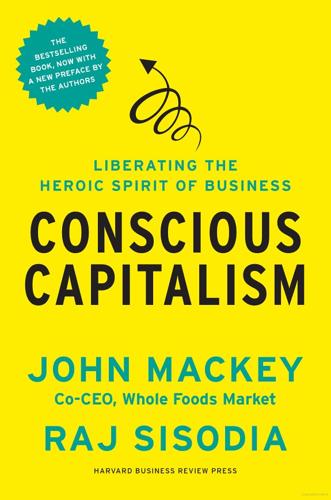
Conscious Capitalism, With a New Preface by the Authors: Liberating the Heroic Spirit of Business
by
John Mackey
,
Rajendra Sisodia
and
Bill George
Published 7 Jan 2014
In recent years, the myth that business is and must be about maximization of profits has taken root in academia as well as among business leaders. This has robbed most businesses of the ability to engage and connect with people at their deepest levels. Regulations and the size and scope of government have greatly expanded, creating the conditions for the spread of crony capitalism, restricting competition in favor of politically well-connected businesses. Crony capitalism is not capitalism at all, but is seen as such by many because it involves businesspeople. These are significant challenges, but they must be overcome if we are to continue to spread freedom and bring dignity and the fruits of modernity to the billions on the planet who are still in dire need.
…
Large corporations have to overcome a lot of inertia and decades of legacy thinking. But the barriers that prevent them from changing are not legal ones; they are the outmoded mental models with which companies have operated in the past. Investing in the Future Much of the animosity toward capitalism today comes from the distortions that crony capitalism has created. In no place is crony capitalism more evident than in the financial sector of the economy. No sector of capitalism more urgently needs to become more conscious and discover its higher purposes and the importance of stakeholder value creation than the financial sector. The sector’s philosophy of maximizing short-term profits and personal compensation while ignoring all other stakeholders is a proven failure with extremely harmful consequences for all of us.
…
In such situations, regulations are often crafted to benefit the industry (or certain companies in the industry) rather than to serve the public interest.9 Society has countless examples of special favors being granted to well-connected people. When people see this kind of corruption, they usually blame business for doing the corrupting. But the government is equally to blame. This kind of crony capitalism represents the worst danger to free-enterprise capitalism. The danger is especially great in emerging economies, but is a problem everywhere and is becoming a serious problem in the United States. Many people who condemn capitalism do so for this reason. But crony capitalism is not free-enterprise capitalism; it is a perversion of it. The bottom line is that good government is absolutely essential. If government becomes too corrupt, it is impossible to have a free-enterprise system and healthy capitalism.
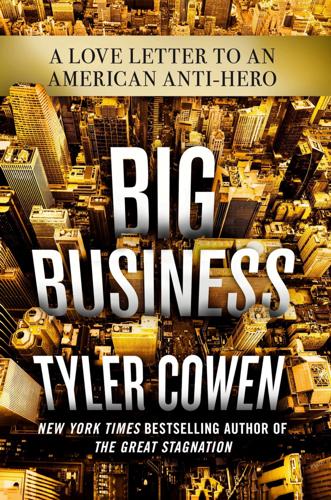
Big Business: A Love Letter to an American Anti-Hero
by
Tyler Cowen
Published 8 Apr 2019
So if you’re looking for a villain, big banks aren’t the right candidate. 8. CRONY CAPITALISM: HOW MUCH DOES BIG BUSINESS CONTROL THE AMERICAN GOVERNMENT? OK, so what about business and the government? Doesn’t big business control what goes on in Washington? There are indeed numerous government privileges for business; most of those are bad policy, and yet they persist for many years, perhaps indefinitely, as has been pointed out eloquently by Luigi Zingales in his 2012 book A Capitalism for the People. I am against virtually all manifestations of crony capitalism, but I’m also not sure people are getting the basic story right.
…
For a disaggregated look at this source of financial sector growth, see Antill, Hou, and Sarkar 2014, who show it occurred disproportionately through non-bank credit intermediation. 29. On the decline in Chinese debt holdings, see, for instance, Mullen 2016. 30. For those numbers, see Comoreanu 2017, drawing upon FDIC data. Chapter 8: Crony Capitalism 1. These quotations are all from Pearlstein 2016. 2. Luigi Zingales has been one of the most articulate critics of crony capitalism. See, for instance, Zingales 2017. 3. For the estimate on total advertising expenditures, see Statista 2017. For the General Motors comparison, see Austin 2012; see also Drutman 2015, 223. For Coca-Cola, see Zmuda 2014.
…
Trump in some key regards likes to favor crony businesses, but it is hard to avoid the suspicion that he does not really know how business works, in spite of having spent his whole life in this vocation. THE BROADER HISTORY OF BUSINESS INFLUENCE IN GOVERNMENT There is indeed plenty of crony capitalism in America today. For instance, the Export-Import Bank subsidizes American exports with guaranteed loans or low-interest loans. The biggest American beneficiary is Boeing, by far, and the biggest foreign beneficiaries are large and sometimes state-owned companies, such as Pemex, the national fossil fuel company of the Mexican government.
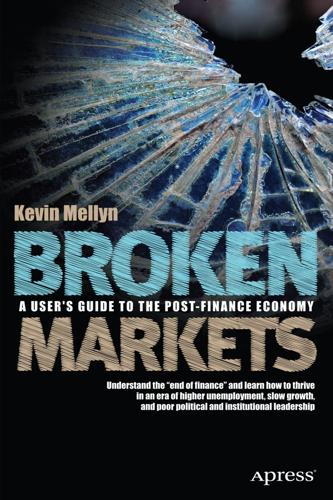
Broken Markets: A User's Guide to the Post-Finance Economy
by
Kevin Mellyn
Published 18 Jun 2012
Most often, crises are followed by the systematic imposition of “financial repression”—a regime in which the state systematically suppresses market forces in finance—especially interest rates—in order to direct credit for political ends and hold down its own funding costs. This regime leaves itself open to democratic crony capitalism at best. At worst, it leads to socialism or “corporatism”—the organization of society into collective interest groups such as big business and labor, all subordinate to the state (as with Italy and Germany and even some aspects of the New Deal). Financial repression is how banking works in China today, and once in place, it is very hard to change.
…
A competing narrative is far less frequently told outside the pages of the Wall Street Journal, although Gretchen Morgenson of The New York Times has, with mortgage expert Joshua Rosner, told it well in the book Reckless Endangerment (Times Books, 2011). It does not let greedy bankers off the hook, but maintains that to a large degree, the crisis was created through a mixture of bad if well-intended public policy and crony capitalism in the housing finance market. This narrative focuses on the GSEs we met in the last chapter, with a central role being played by Fannie Mae CEO Jim Johnson and a host of enablers in Congress and the Washington power structure, including Messrs. Dodd and Frank. In this tale, Fannie Mae and Freddie Mac became money-making machines for their managers by using their ambiguous status as “governmentsponsored” public companies to borrow cheap (essentially at US government debt rates) at very high leverage to build enormous portfolios of mortgage securities.
…
Dodd-Frank’s morass of inconsistent rule-making may even inhibit the Federal Reserve from executing bailouts. No panic in history has ever been foreseen, and inhibiting the discretion of central banks to pour water on the fire is storing up a future disaster for the world economy. A second key lesson is that banks must be free to fail—something that the crony capitalism of the Great Moderation inhibited until the institutions really became too big and interconnected to fail, turning finance into a one-way bet for the bankers. Dodd-Frank punts on too-big-to-fail, choosing instead to do the impossible: make finance safe. Its approach to doing this is to proscribe activities that had nothing to do with the crisis, such as proprietary trading, and to bring previously unregulated financial entities into the net even if they pose no systemic risk.
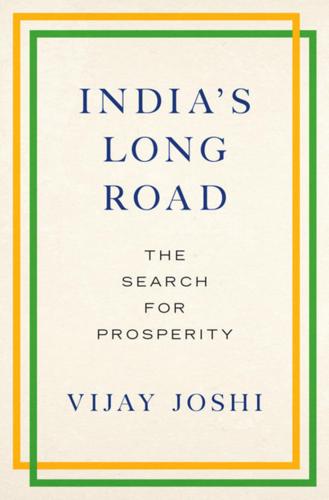
India's Long Road
by
Vijay Joshi
Published 21 Feb 2017
There is also increasingly manifest a contrast between the country’s dynamic private sector (though the shine has been fading recently) and its weak and ineffective government sector. This disjunction has now reached such a level as to seriously endanger India’s ambitions. At the same time, a combination of crony capitalism and excessive ambition has caused leading private companies to trip up on their own greed and zeal. More liberalization is certainly necessary. But it will not be sufficient because the state no longer performs its core functions effectively. Each country has to work out for itself the right balance between the state and the market to suit its particular circumstances.
…
On macroeconomic stability, India has avoided rampant turmoil but periodic inflation spikes remain a major problem, while the fiscal position remains weak, and vulnerable to growing demands on the state. I n di a at t h e C u s p [7] 8 There is also plenty of evidence that the culture of public service has deteriorated, and that government incompetence and venality have become pervasive. The popular perception that sleaze and crony capitalism are rife at all levels of government is not far off the mark. (At the same time, the fear of being blamed for honest mistakes has also paralyzed government administration in recent years.) It follows from this sorry tale that both the state and the state-market relationship need urgent reform, which is no easy task in the context of India’s political economy, with its democratic turbulence and powerful vested interests.
…
But history all over the world shows that entrepreneurship can be directed to productive or unproductive uses depending on the context.20 If the rewards are greater in unproductive rent- seeking than in productive activities, then that is where business energy will go.21 There is no doubt that liberalization in India has very been successful in channelling the energy of firms into innovative and productive uses.22 However, there is also evidence, especially in the recent past, that India’s corporate sector is vulnerable to rent-seeking and unproductive entrepreneurship, a disease that could arrest the growth of productivity in the long run. The lesson is that while the state must redouble its efforts to liberalize, it must at the same time safeguard competition and restrain corruption and crony capitalism (see Chapter 11). Another source of disquiet about dominant firms in India’s private sector is that so many of them are ‘business houses’, i.e. conglomerates that are controlled by ‘promoter’ families and family trusts. It has been claimed, quite rightly, that the prevalence of conglomerates is not surprising, given the weakness of the state: it makes sense to do things in-house and in vertically integrated operations since the infrastructure is poor, the legal system is slow at contract-enforcement etc.23 But is promoter/family control a healthy phenomenon?
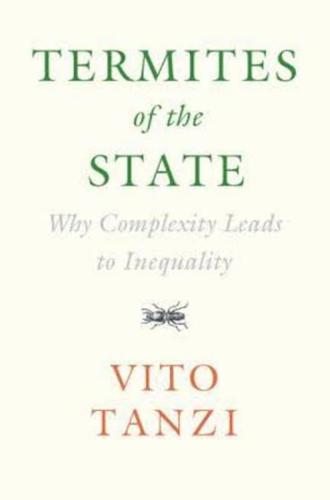
Termites of the State: Why Complexity Leads to Inequality
by
Vito Tanzi
Published 28 Dec 2017
In those years, authoritarian and fascist governments in European countries and elsewhere, such as Argentina, Brazil, Mexico, Japan, and some other countries, would adopt some version of economic planning, which allowed them to increase their political power and their control over the economy and over the populations, as Hayek pointed out. These controls would, at times, take on aspects of what some today call “crony capitalism.” They tended to benefit individuals or industrial groups that were favored by the authoritarian regimes, over less favored ones. For Italian examples, see Carlo Celli (2013); discussions of “corporatism,” especially chapters 8 and 9, in Bosworth (2006); and Steiner (1938). For information on Argentina, and the influence of planning on Peronism, see Falcoff and Dolkart (1975).
…
Thus, it contained a promise of a welfare state operating within a well-working private market that would give the government the objective to intervene to eliminate “market failures.” President Roosevelt was promoting ambitious and potentially very expensive welfare policies for American citizens while, at the same time, promising a well-working free market for economic operators. No “crony capitalism” or other threats, including nonjustified interventions by the government in a well-working market economy, would be allowed, and no abuse of power by any group over the market would be permitted. He was implicitly assuming that there would be no conflict between these two objectives and that a well-working private market would tolerate and finance, without creating excessive economic disincentives and difficulties, the high spending that his Bill of Rights was promising for the American citizens.
…
The reason for this change was that discretion makes it easier for politicians to increase public spending by more than they should; to give tax incentives to enterprises and individuals; to promote easier monetary and fiscal policies to win elections; or to favor particular groups, including themselves, rather than to promote the public interest, however defined. When good rules are absent, or when precise and transparent rules are not observed, some version of what, today, is called “crony capitalism” can make its appearance, as had been recognized by Max Weber a long time ago. Without good rules, we can have a modern version of the mercantilism that Adam Smith had criticized three centuries ago and that exists today in more subtle ways. That version essentially assigns some but at times non transparent monopolistic power to some privileged groups or individuals.
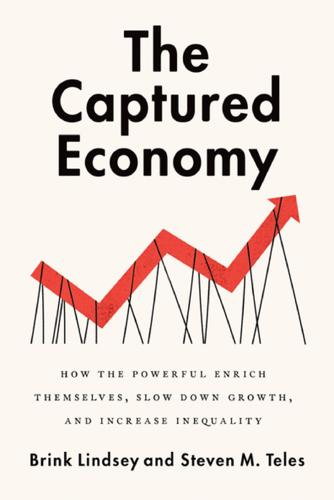
The Captured Economy: How the Powerful Enrich Themselves, Slow Down Growth, and Increase Inequality
by
Brink Lindsey
Published 12 Oct 2017
Would it really not occur to them to push for rules that actively redistribute upward? It is this bipartisan blind spot that helps explain the market for a huckster like Donald Trump. Unless we take steps to unrig our liberal democracy, we run a serious risk that the tide of authoritarian populism will extend itself, all the while entrenching the very crony capitalism that it purports to assault. Market rigging by the already powerful is the primary mechanism by which high status is entrenched. While markets naturally produce unequal returns, they also have powerful mechanisms of creative destruction as well. When there are extraordinary returns by a particular firm, a market with low barriers to entry will encourage challengers to undercut incumbents, thereby driving down their rate of return.
…
On the left, Nobel Prize–winning economist Joseph Stiglitz has sounded the alarm in a pair of recent books.19 Jason Furman (writing while chairman of the Obama administration’s Council of Economic Advisers) and Peter Orszag (former director of the Office of Management and Budget during the Obama administration) have called attention to the buildup of rents in a widely discussed paper.20 Dean Baker of the Center for Economic and Policy Research has long been outspoken on the issue.21 On the right, Luigi Zingales of the University of Chicago has been a prominent critic of “crony capitalism.”22 Under his leadership, the George F. Stigler Center for the Study of the Economy and the State pursues an active research program on the phenomenon of regulatory capture and its associated ills.23 What the analysis of upward redistribution has so far lacked is a plausible account of why high-end rent-seeking has increased so dramatically, and an agenda of plausible mechanisms for restraining it.
…
In the ideal market economy, the rules of the game are set so that the desire for private gain is channeled into bettering the lives of others. In the ideal democracy, the mechanisms of government are devised so that the clash of contending opinions and interests is converted into policies that serve the common good. To the extent that rent-seeking holds sway, the invisible hand of capitalism degenerates into the grasping hand of crony capitalism, and the lofty pursuit of the public interest devolves into a feeding frenzy of special interests. Free markets depend, paradoxically for some, on the existence of a state strong enough to enforce the rules of the game in an impartial, public-spirited fashion. Economic power must, somehow, be kept from being translated into the political power to game those rules for the benefit of market incumbents.
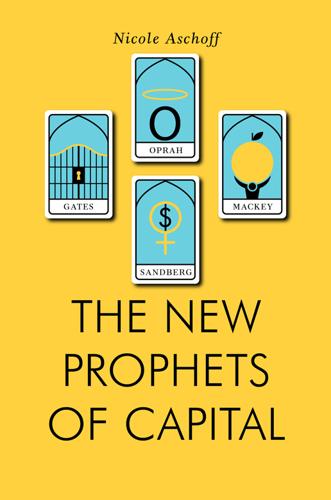
The New Prophets of Capital
by
Nicole Aschoff
Published 10 Mar 2015
Departing from the dominant idea that states have retreated from the market over the past three decades, Mackey argues states have become more interventionist than ever, and that in the process they have “fostered a mutant form of capitalism called crony capitalism” that is to blame for many of the problems societies face today. Mackey does not see crony capitalism as “real” capitalism. Instead it is a product of big government in which politicians trying to preserve their cushy jobs develop symbiotic, parasitic relationships with businesspeople too lazy or unimaginative to compete successfully in the marketplace. 10 In Mackey’s story, crony capitalism has been exacerbated by the rising power of the financial sector and shareholder-value ideology—the idea that firms are nothing more than a stream of assets designed to maximize profits for shareholders.
…
Instead, they are part of a chorus of new elite voices calling for a different kind of capitalism. The long list of “new” capitalisms being touted or disdained—conscious capitalism, creative capitalism, sustainable capitalism, equitable capitalism, philanthrocapitalism, eco-capitalism, inclusive capitalism, crony capitalism—illustrates the widespread feeling that capitalism needs to change. The New Prophets of Capitalism examines the stories told by four of these new storytellers: Sheryl Sandberg (COO of Facebook), John Mackey (CEO of Whole Foods), Oprah Winfrey (media mogul), and Bill and Melinda Gates (creators of the Gates Foundation).7 I argue that each of these storytellers acts as a prophet of capitalism.
…
The reader should note, however, that general views about conscious capitalism are shared and developed by Sisodia. 2See www.wholefoodsmarket.com/. 3Mackey and Sisodia, Conscious Capitalism, p. 236. 4For example, see Michael Strong, Be the Solution: How Entrepreneurs and Conscious Capitalists Can Solve All the World’s Problem’s, New York: Wiley, 2009. 5Mackey and Sisodia, Conscious Capitalism, pp. 264–5, 230. 6People and the Planet Report, Report 01/12, London: Royal Society Science Policy Centre, 2012. 7“Use It and Lose It: The Outsize Effect of US Consumption on the Environment,” Scientific American, September 14, 2012. 8Mackey and Sisodia, Conscious Capitalism, p. 3. 9Ibid., pp. 14, 27. 10Ibid., pp. 16, 21; Mackey is not alone in his emphasis on crony capitalism. See also www.againstcronycapitalism.org/. 11Ibid., pp. 16, 18. 12Charles. Fishman, “Whole Foods Is All Teams,” Fast Company, April/May1996. 13‘Trader Joe’s Top Survey of Best Grocery Chains, Walmart Lands at Bottom of List,” Huffington Post, July 23, 2013. 14Gert Spaargaren and Arthur P.J.
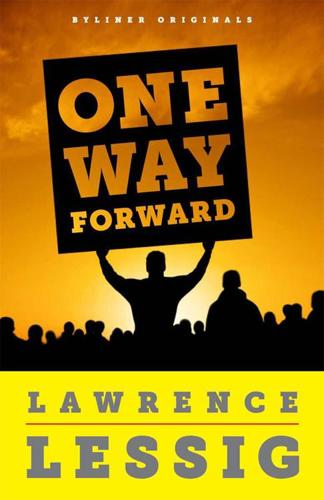
One Way Forward: The Outsider's Guide to Fixing the Republic
by
Lawrence Lessig
Published 12 Feb 2012
“You may or may not like capitalism,” I told them, “but nobody likes ‘crony capitalism,’ and it is crony capitalism that has corrupted this system of government and given us the misregulation that led to the collapse on Wall Street.” Just after I said that, in a scene that could have been scripted in Hollywood, a man sitting in the front row raised his hand and said, “I was one of the original Tea Partiers, and today I run a site called AgainstCronyCapitalism.org. I can guarantee you that if you started talking about the corruption from crony capitalism, you’d have thousands of Tea Partiers down here joining with you in this fight.”
…
There should be no conflict between the Left and the Right on this: Both sides should favor reform that ends this corrupting influence. We don’t need to destroy wealth. We need to destroy the ability of wealth to corrupt our politics. We don’t need to kill capitalism. We need to kill that form of capitalism—crony capitalism—that uses its power to corrupt our politics. We don’t need to hate success. We have to organize against those who think that their success entitles them to special benefits and privilege from those addicts to fundraising we call congressmen. We don’t need to foment another fundamental revolution.
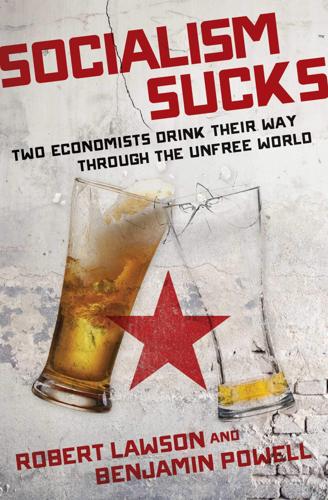
Socialism Sucks: Two Economists Drink Their Way Through the Unfree World
by
Robert Lawson
and
Benjamin Powell
Published 29 Jul 2019
In 1988, the Chinese constitution was amended to officially recognize private property and private business. Before then, the Communist state had been China’s only official employer, with small exceptions. By 1998, the state employed about 60 percent of the working population, and in 2010 it employed only about 19 percent.9 China had transitioned from socialism to a form of crony capitalism. Bob recited all these statistics at a fancy bar, holding court to a group of his SMU MBA students we had literally just chanced upon. They listened politely and then bought us a round of shots, hoping we’d take the hint and leave. We did, stumbling our way along the Bund, a riverfront walkway through the old colonial concessions to the British, American, and French governments that had opened up Shanghai as an international trade port in the nineteenth century.
…
Instead, “They obviously want to try to turn it into a civil dispute, but people are not idiots and everyone can tell what’s the real matter here.”13 When Communist China was governed by socialist ideologues it was an impoverished, totalitarian police state that killed tens of millions of its own people. Now that Communist China practices crony capitalism, it is a prosperous and much more restrained police state. That sucks, but believe us—that’s still progress. CHAPTER FIVE HUNGOVER SOCIALISM: RUSSIA & UKRAINE SEPTEMBER 2017 “This looks like any European city,” Bob said as we walked around central Moscow on an overcast, drizzly afternoon in late September.
…
Ron Paul was always this cranky antiwar libertarian and Bernie Sanders was always this cranky socialist independent. Both were railing against both Democrats and Republicans. I think part of the attraction is their consistency, because people get tired of politicians who just say whatever you want to hear. But dig a little bit deeper. When Bernie rails against crony capitalism, or rails against permanent war, or rails against the surveillance state, or the criminal justice system that has packed our prisons, Ron Paul could be giving the same speech. And it’s not until the end of the story, when Bernie says: “That’s why we need to grow the size of government and give bureaucrats more power,” that people hear a difference.
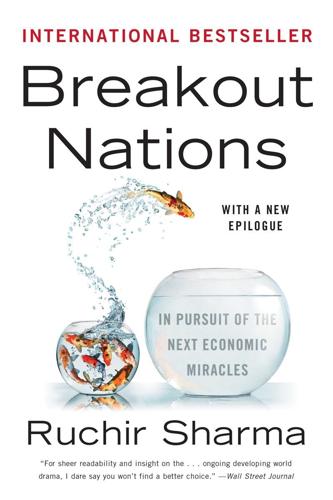
Breakout Nations: In Pursuit of the Next Economic Miracles
by
Ruchir Sharma
Published 8 Apr 2012
Meanwhile, scores of “emerging” nations have been emerging for many decades now. They have failed to gain any momentum for sustained growth or their progress has begun to stall since they became middle-income countries. Malaysia and Thailand appeared to be on course to emerge as rich nations until the crony capitalism at the heart of those systems caused a financial meltdown in the crisis of 1998. Their growth has disappointed ever since. In the 1960s, the Philippines, Sri Lanka, and Burma were billed as the next East Asian tigers, only to see their growth falter badly, well before they could reach the “middle-class” average income of about $4,000.
…
Not a single billionaire in China has a net worth of more than $10 billion; compare that to eleven billionaires with a net worth of more than $10 billion in Russia and six in India, which have far smaller economies. Only one tycoon who made China’s list of top-ten billionaires five years ago was still on the roster in 2011. The government appears to be both creating competitive churn among the very wealthy and restricting their maximum wealth. To be sure, there is crony capitalism in China, or wealth built on friendly ties to the government. Some reports even suggest that a majority of the Chinese worth more than $10 million are children of high-level Communist Party officials. Still, it’s clear that Chinese leaders are acutely aware of the growing wealth gap. The ruling party won’t countenance growth at any cost, if one of the costs is stoking popular revolt.
…
Many outsiders were just as confident before the recent signs of trouble. I put the probability of India’s continuing its journey as a breakout nation this decade at closer to 50 percent, owing to a whole series of risks that the Indian and foreign elites leave out of the picture, including bloated government, crony capitalism, falling turnover among the rich and powerful, and a disturbing tendency of farmers to stay on the farm. The early signs of an unraveling have begun to emerge under the administration of Prime Minister Manmohan Singh, but not really because of it. Singh helped open India to global trade in the early 1990s, when he was finance minister.
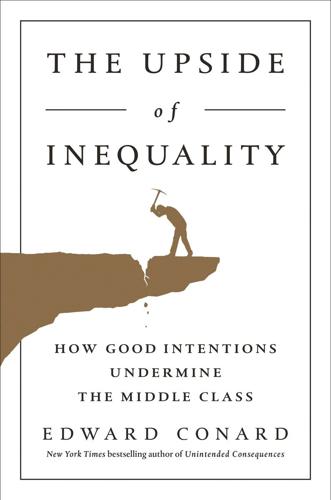
The Upside of Inequality
by
Edward Conard
Published 1 Sep 2016
The growth of middle-class and working-class incomes has slowed. Crony capitalism does exist. Automation and offshoring seem to have reduced the number of high-paying factory jobs. Companies like Apple, Google, and Facebook scarcely seem to employ any Americans, especially not middle- and working-class Americans. Academic test scores are not improving. And it seems impossible to break the generational cycle of poverty. Yet despite these facts, the growth of the U.S. economy has accelerated relative to other high-wage economies with more equally distributed incomes—the opposite of what one would expect if crony capitalism or other unfair means of income distribution had increased in the United States on a scale necessary to account for rising income inequality.
…
At the time, a leading proponent of income redistribution wrote, “the biggest surprise, on opening Unintended Consequences, lies in discovering that this book isn’t about income inequality at all.”1 The critics’ demand for a comprehensive defense of income inequality planted the seeds for this book. Since 2012, accusations that crony capitalism and the success of the 1 percent slow middle- and working-class income growth have only grown louder. While the incomes of the 0.1 percent have soared, the growth of middle-class and working-class incomes has continued to remain slow. Many insist that this gap has grown because the wealthy are rigging a zero-sum game to take what rightly belongs to others.
…
It’s time to stop blaming the success of the 1 percent and embrace the upside of inequality: faster growth and greater prosperity for everyone. Part I THE WORLD AS WE FIND IT Chapter 1 THE CAUSES OF GROWING INEQUALITY It seems as though you can’t pick up a newspaper today without reading an article blaming the 1 percent for the stagnant wages of the middle class.1 If people aren’t accusing the 1 percent of using crony capitalism to steal what they haven’t earned, then they are accusing them of inventing technology that hollows out the middle class or stifles the advancement of the underprivileged by underfunding education.2 In 2003 renowned economists Thomas Piketty and Emmanuel Saez burst into the public’s consciousness with convincing evidence that income inequality had increased dramatically, especially in the United States, and that middle- and working-class incomes had stagnated.
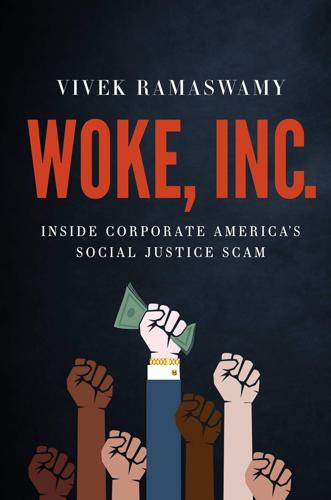
Woke, Inc: Inside Corporate America's Social Justice Scam
by
Vivek Ramaswamy
Published 16 Aug 2021
Hobby Lobby is a family-owned arts and crafts store whose policy applies to its own employees, whereas Goldman’s quota system applies effectively to every public company in America. If liberals dislike Hobby Lobby on principled grounds, they should shudder at the raw societal power exercised by behemoths like Goldman Sachs. Wokenomics is crony capitalism 2.0, and here’s how it works: big business uses progressive-friendly values to deflect attention from its own monolithic pursuit of profit and power. Crony capitalism 1.0 was straightforward by comparison: corporations simply had to make campaign contributions to legislators in return for favorable legislative treatment. Here’s an example: big Wall Street banks hire lobbyists to exert influence in Washington, and in return they get favorable regulations that codify their status as gatekeepers who enjoy oligopoly status in taking companies public.
…
Championship-level players of this game like Goldman Sachs top it off with a flourish, by lending their executives to serve as US treasury secretaries (Steve Mnuchin under President Trump, Hank Paulson under President George W. Bush, and so on). And it pays off in the end: winners like Goldman Sachs get bailouts in tough times like 2008, while less adroit competitors like Lehman Brothers are hung out to dry by Hank Paulson. That much is simple enough. But crony capitalism 2.0 is far trickier. It uses a different playbook from that used by version 1.0—one that’s designed to escape public notice. In January 2020, when David Solomon, first issued the Goldman’s diversity proclamation at the World Economic Forum in Davos, it was at a time when Bernie Sanders and Elizabeth Warren, two of the biggest critics of the US government’s 2008 bailout of Goldman Sachs, were presidential frontrunners.
…
Having supplicated to the swamp uni-party of crony Republicans and centrist Democrats for decades, the moment had arrived for Goldman Sachs to begin placating the identity-politics-obsessed far left, just as that wing of the Democratic party had begun to accrue greater political power. Their new CEO is woker than woke, and he’s a DJ on the side too. That’s how the 2020 edition of crony capitalism looks; Hank Paulson is outmoded by comparison. TO BE SURE, many CEOs who promote stakeholder capitalism do it genuinely. Ken Frazier, the former chairman and CEO of Merck, is a pharma industry leader I greatly admire for his company’s accomplishments in the treatment of cancer and other diseases.
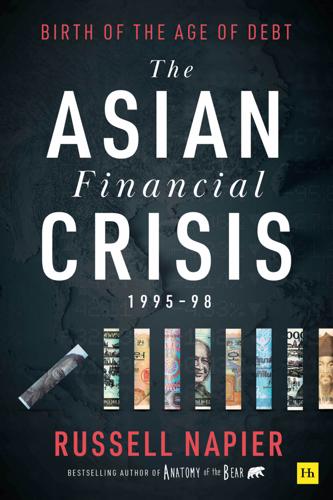
The Asian Financial Crisis 1995–98: Birth of the Age of Debt
by
Russell Napier
Published 19 Jul 2021
When the miracle became a crisis, they rapidly relabelled Asian values as crony capitalism and instead of an asset, they priced this form of Asian value as a liability. That the values foreign investors thought were aligned with capitalism were so opposed to it was to become very apparent when the IMF rode into Asia with its prescriptions for change. Those prescriptions were seen by many, most notably Mahathir Mohammad, the prime minister of Malaysia, as in direct conflict with Asian values. According to the non-Asian policy makers driving the IMF intervention in Asia, foreign investors needed the destruction of crony capitalism if capital outflows were to cease, exchange rates to stabilise and interest rates to decline.
…
By the 1990s, it had morphed into a policy where key Bumiputra individuals sought and obtained favours from the government that allowed them to become particularly wealthy. Wealth was indeed being created among the Bumiputra population, but it was far from equally spread within it. The prime minister of Malaysia believed these policies were necessary to reduce social tension, but others believed that such policies were best classified as crony capitalism. As market forces had delivered easy monetary conditions, the Malaysian state found it easy to continue to be in the business of pushing wealth towards its favoured Bumiputra entrepreneurs. However, when market forces dictated tighter monetary policy and even the creative destruction supposed to accompany economic contractions, would the government stand by and watch its work towards wealth redistribution reversed?
…
But wouldn’t any tenant seek to maximise rents from a property as their tenure becomes increasingly short? If this is the motivation behind these recent moves, then there is more to come and FDI approvals and realisation rates are unlikely to increase from the current high levels. Asia was rife with crony capitalism, but it was a practice that was largely ignored by foreign investors. Indeed, many foreign investors considered that they wanted to invest in such ‘well-connected’ companies likely to get the key deals and franchises from government that usually assured supra-normal returns on capital. The Chinese population of Asia had a name for such a form of capitalism, guanxi capitalism, with guanxi loosely translated as ‘connections’.
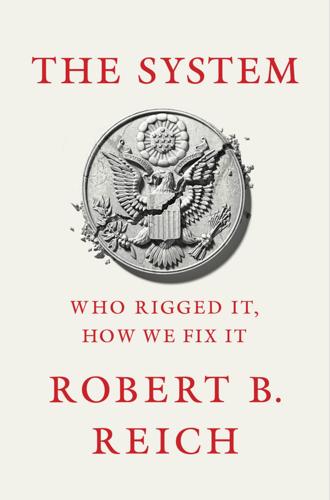
The System: Who Rigged It, How We Fix It
by
Robert B. Reich
Published 24 Mar 2020
The voices of average people have been drowned out. Meanwhile, and largely because of this vast power shift, taxes on the wealthy and on corporations have been slashed. Safety nets for the poor and middle class have begun to unravel. Public investments in education and infrastructure have waned. The “free market” has been taken over by crony capitalism, corporate bailouts, and corporate welfare. The American oligarchy is back, with a vengeance. * * * — Not all wealthy people are culpable, of course. I am not advocating class warfare. The abuse has occurred at the nexus of wealth and power, where those with great wealth use it to gain power and then utilize that power to accumulate more wealth.
…
The way to overcome oligarchy is for the rest of us to join together and win America back. This will require a multiracial, multiethnic coalition of working-class, poor, and middle-class Americans fighting for democracy and against concentrated power and privilege, determined to rid politics of big money, end corporate welfare and crony capitalism, bust up monopolies, stop voter suppression, and strengthen the countervailing power of labor unions, employee-owned corporations, worker cooperatives, state and local banks, and grassroots politics. This agenda is neither right nor left. It is the bedrock for everything else America must do
…
By the time I spoke with them, most were back in jobs, but the jobs paid no more than they had two decades before in terms of purchasing power. I heard the term “rigged system” so often that I began asking people what they meant by it. They spoke about the bailout of Wall Street, political payoffs, insider deals, CEO pay, and “crony capitalism.” These complaints came from people who identified themselves as Republicans, Democrats, and Independents. A few had joined the Tea Party. A few others had briefly been involved in the Occupy movement. Most of them didn’t consider themselves political. They were white, black, and Latino, from union households and non-union.
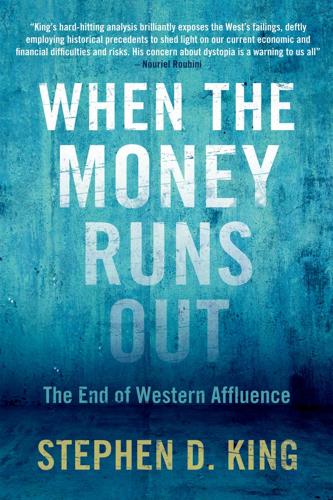
When the Money Runs Out: The End of Western Affluence
by
Stephen D. King
Published 17 Jun 2013
As it turned out, the presumption of official support was at least to some extent misplaced, because the government did not clearly have the resources to provide that support.10 Many Western observers preferred to be just a little more direct. Asian countries were suffering from crony capitalism, an unhealthy relationship between government and commerce associated with endemic bribery and corruption, and they'd fooled innocent foreign creditors into lending to them. The fact that South Korea, in particular, had delivered an extraordinary increase in living standards in previous decades was conveniently ignored. Between 1950 and the onset of the Asian crisis, Korean living standards had risen 15-fold, suggesting that crony capitalism – if that's what it was – had hardly been an impediment to rising prosperity.
…
THE ASIAN CRISIS The story of the late 1990s Asian crisis can be simply summarized: having been forced to recognize they had lived beyond their means, the nations involved took the pain up front but were then able to recover strongly. The near-term losses in Asia were, in many cases, far bigger than those seen in the West following its later financial crisis but, having been written off as hotbeds of crony capitalism and, thus, doomed to fail, Asian economies were able to bounce back in style. There was no Western-style economic stagnation but, instead, a return to economic dynamism within just a handful of years. Yet the political response varied from nation to nation. In the early 1990s, Asian nations had increasingly adopted the so-called ‘Washington Consensus’, broadly speaking a commitment to low inflation, conservative fiscal policies and open cross-border capital markets.
…
At the very least, he was surely invoking age-old anti-Jewish prejudice to explain why Malaysia, alongside other Islamic nations, had been so vulnerable economically. And his 2003 comments were hardly the first time he had claimed some kind of Jewish conspiracy against his country. Dismissing claims of crony capitalism, Mahathir survived – and thrived – by blaming others, however unreasonably, for Malaysia's predicament. Unlike Suharto – whose decision to accept an IMF programme may have contributed to his downfall – Mahathir was able to argue that he was defending Malaysia against evil foreign forces. His use of capital controls – which led to a typically fraught debate among academic economists – was not so much an attempt to fix Malaysia's financial problems but, instead, a deliberate decision to portray Malaysia as an innocent victim of an international conspiracy.
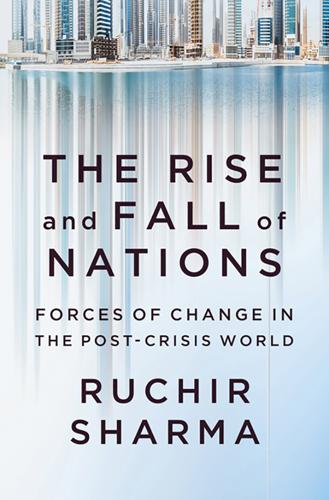
The Rise and Fall of Nations: Forces of Change in the Post-Crisis World
by
Ruchir Sharma
Published 5 Jun 2016
A cover story I wrote for Newsweek International in September 2010 argued that the rise of crony capitalism was “India’s fatal flaw,” and it was greeted with great skepticism in Delhi’s political circles. Top officials told me that corruption is normal when a young economy is taking off, citing the robber barons who ruled America in the nineteenth century. But as economic growth fell by almost half in the years that followed, many of the same officials came to acknowledge that an abnormally high level of corruption and inequality † was one of the main factors in the slowdown. Rising crony capitalism steers money and deals to undeserving hands, but it also sets off a chain reaction in the political system.
…
The judges began denying bail to accused businessmen, holding them in jail for months before formal charges were filed; they began pressuring agents of the Central Bureau of Investigation (CBI) to push forward with corruption charges and questioned their probity if they dropped a case. By 2012, the crackdown was widening, and at parties in the lavish “farmhouses” that wealthy Indians keep as second homes on the outskirts of Delhi, it sometimes seemed that every other guest was either out on bail or about to go to jail. At this point it was not clear which was worse: crony capitalism or the backlash. Bureaucrats grew fearful of attaching their name to any policy or even approving any permit that might look pro-business, lest they be tarred as corrupt themselves. Businessmen started avoiding deals that might require government approval, which in India is an expansive list.
…
India’s finance minister Arun Jaitley, a lawyer himself, lamented in 2015 that government investigators were operating by “the golden rule that I must somehow make the case, and it is good luck of the accused to get a fair trial.” This culture of investigative “overkill,” he warned, has “hindered the whole process of economic decision-making.” India needed to grow rapidly to address poverty and inequality, but the rise of crony capitalism and the subsequent attempt to restrain it had instead impeded growth. It’s difficult to clearly define when the scale of billionaire wealth threatens to throw an economy out of balance, but comparing each country to its peers throws the outliers into stark relief. Total billionaire wealth in the past few years has averaged about 10 percent of GDP both in emerging countries and in developed countries.
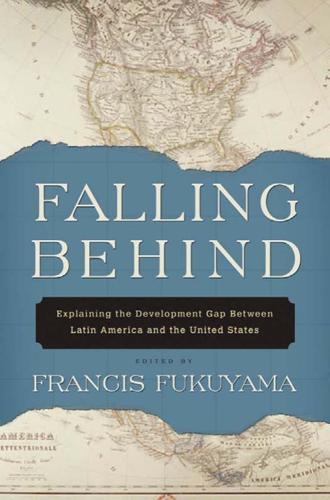
Falling Behind: Explaining the Development Gap Between Latin America and the United States
by
Francis Fukuyama
Published 1 Jan 2006
See, for example, Stephen Haber, ed., How Latin America Fell Behind: Essays on the Economic Histories of Brazil and Mexico, 1800–1914 (Stanford, CA: Stanford University Press, 1997); and Stephen Haber, ed., Political Institutions and Economic Growth in Latin America (Stanford, CA: Hoover Institution Press, 2000). 7. According to Haber, crony capitalism “is usually thought of as a system in which those close to the political authorities who make and enforce policies receive favors that have large economic value.” He could have in mind the restrictions on sugar imports, or the Halliburton Iraq contracts, or the $14 billion subsidy to 126 The Politics of Underdevelopment in Latin America 8. 9. 10. 11. 12. 13. 14. 15. the oil industry. But none of these are possible, because in the United States the government is “limited.” Stephen Haber, Crony Capitalism and Economic Growth in Latin America: Theory and Evidence (Stanford, CA: Hoover Institution Press, 2002), pp. 12, 13.
…
The institutions that matter likely include not only those that protect property rights, but also those that mobilize savings and coordinated investments and those that subject those in government to the approval of the governed.5 Yet institutionalist answers to why Latin America fell behind are often drowned in ritualistic invocations of the institutionalist approach.6 In Stephen Haber’s most recent collection, for example, the culprit is Latin American “crony capitalism,” as if capitalism in the United States could be categorized differently.7 While recent works resulting from a revived interest in Latin America’s lagging development provide several insightful case studies,8 this chapter’s analysis is conducted at the cross-national level. Moreover, to the extent to which data limitations allow, this study closely adheres to the facts.
…
See, for example, Leandro Prados de La Escosura and Samuel Amaral, eds., La independencia americana: Consecuencias económicas (Madrid: Alianza, 1993); John H. Coatsworth and Alan M. Taylor, Latin America and the World Economy since 1800 (Cambridge, MA: Harvard University Press, 1998); and Haber, How Latin America Fell Behind, Political Institutions and Economic Growth, and Crony Capitalism. See Roberto Gargarella, Los fundamentos legales de la desigualidad: El constitucionalismo en América (1776–1860) (Madrid: Siglo XXI, 2005). José Luis Machinea and Cecilia Vera, “Comercio, inversión directa y políticas productivas,” paper presented at the seminar “Una nueva agenda de desarrollo para América Latina,” Salamanca, October 7–8, 2005.
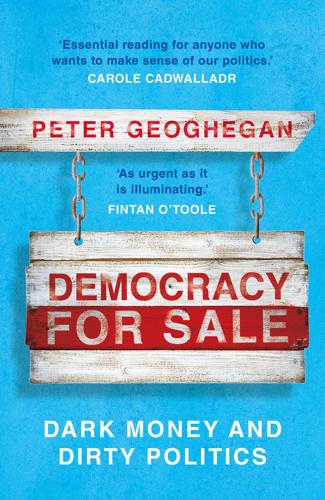
Democracy for Sale: Dark Money and Dirty Politics
by
Peter Geoghegan
Published 2 Jan 2020
Where corporate-funded think tanks once provided the ideas for a conservative revolution, now they often appear as one side in an increasingly hyperbolic culture war. Banning smoking in pubs is a full-scale assault on civil liberties; gambling develops numeracy skills; even the overtly economic ideas, such as free ports, feel more like crony capitalism than removing “the dead hand of the state”. Free marketers talk the same language as the deregulators of the 1980s, but their actions are largely “performative”, writes Westlake. In his reading, libertarians are “play-acting and position-taking rather than fighting the real battles that would matter to a modern-day market liberal”.58 A former staff member at a prominent British libertarian think tank went even further, telling me: “The IEA used to regularly publish Nobel Prize winners.
…
1402669714 12 Robert Booth, ‘Taxpayers’ Alliance admits director doesn’t pay British tax’, Guardian, October 2009. 13 George Eaton, ‘Vote Leave head Matthew Elliott: “The Brexiteers won the battle but we could lose the war”’, New Statesman, September 2018. 14 Tom Bawden, ‘The address where Eurosceptics and climate change sceptics rub shoulders’, Independent, February 2016. 15 Phillip Inman, ‘US Tea Party in London to spread low tax message’, Guardian, September 2010. 16 Andrew Hough, ‘TaxPayers’ Alliance seeks advice from Tea Party movement leaders’, Telegraph, September 2010. 17 Robert Booth, ‘A very British Tea Party: US anti-tax activists advise UK counterparts’, Guardian, September 2010. 18 Tamasin Cave and Andy Rowell, A Quiet Word: Lobbying, Crony Capitalism and Broken Politics in Britain (London, 2015), pp. 39–40. 19 Tim Shipman, All Out War: The Full Story of Brexit (London, 2017), p. 28. 20 Ibid., p. 37. 21 Oliver Wright, ‘Dominic Cummings aims a wrecking ball at Whitehall’, The Times, August 2019. 22 Jonny Ball, ‘John Prescott: the Northern Powerhouse is “not devolution, really”’, New Statesman, February 2019. 23 Johnny McDevitt, ‘Dominic Cummings honed strategy in 2004 vote, video reveals’, Guardian, November 2019. 24 William Norton, White Elephant: How the North East Said No, (London, 2008), p. 70. 25 Frederick Studemann, ‘US conservatives cast wary eye at EU treaty’, Financial Times, November 2004. 26 Tim Shipman, All Out War: The Full Story of Brexit (London, 2017), p. 622. 27 Christopher Hope, ‘Conservative donors prepare to sink £5million into Brexit campaign amid anger about pro-EU leaflet’, Telegraph, April 2016. 28 Jim Waterson, ‘Darren Grimes: the pro-Brexit student activist fined £20k’, Guardian, July 2018. 29 Darren Grimes, ‘Darren Grimes: Why I am a Conservative’, Conservatives for Liberty, December 2015. 30 Public Administration and Constitutional Affairs, ‘Lessons Learned from the EU Referendum’, House of Commons, November 2016.
…
Chapter 6: The Atlantic Bridge to Global Britain 1 Daniel Schulman, ‘Charles Koch’s Brain’, Politico, September 2014. 2 Jane Mayer, Dark Money: The Hidden History of the Billionaires Behind the Rise of the Radical Right (London, 2018), pp. 141–142. 3 Ibid. 4 Daniel Schulman, ‘Charles Koch’s Brain‘, Politico, September 2014. 5 Jane Mayer, Dark Money: The Hidden History of the Billionaires Behind the Rise of the Radical Right (London, 2018), pp. 141–142. 6 Ibid. 7 Ibid., p. 79. 8 Ibid., p. 89. 9 Nadja Popovich, Livia Albeck-Ripka and Kendra Pierre-Louis, ‘95 Environmental Rules Being Rolled Back Under Trump’, New York Times, December 2019. 10 George Monbiot, ‘A rightwing insurrection is usurping our democracy’, Guardian, October 2012. 11 Ibid. 12 Tamasin Cave and Andy Rowell, A Quiet Word: Lobbying, Crony Capitalism and Broken Politics in Britain (London, 2015), p. 130. 13 David Frum, ‘When Did the GOP Lose Touch With Reality?’, New York Magazine, November 2011. 14 Doug Palmer, ‘UK hopes for trade Christmas gift from Trump’, Politico, July 2018. 15 Jeremy W. Peters, ‘Heritage Foundation Says Trump Has Embraced Two-Thirds of Its Agenda’, New York Times, January 2018. 16 Dominic Kennedy, ‘Cash raised for Margaret Thatcher centre spent on rightwing events’, The Times, February 2019. 17 Peter Walker and Anushka Asthana, ‘Brexit thinktank scrambles to remove institute from its name’, Guardian, December 2017. 18 Felicity Lawrence, David Pegg and Rob Evans, ‘Rightwing thinktanks unveil radical plan for US-UK Brexit trade deal’, Guardian, September 2018. 19 George Monbiot, ‘How corporate dark money is taking power on both sides of the Atlantic’, Guardian, February 2017. 20 Jamie Doward, ‘Liam Fox’s Atlantic Bridge linked top Tories and Tea Party activists’, Guardian, October 2011. 21 ‘Conservative Liam Fox is Britain’s “Almost” Donald Rumsfeld’, Human Events, October 2006. 22 Molly Jackman, ‘ALEC’s Influence over Lawmaking in State Legislatures’, Brookings, December 2013.

The Controlled Demolition of the American Empire
by
Jeff Berwick
and
Charlie Robinson
Published 14 Apr 2020
Banking stocks, of course.185 When the stock market collapses due to being built on a foundation of fraud, disinformation, collusion, and the stock buyback programs fueled by free money from the Fed, the banks will be pulling the ripcords on their golden parachutes while the Federal Reserve cranks up their magic printing press again to create more fiat dollars and silently inflate the money supply in order to buy the stock of Goldman Sachs and Citigroup so that they are assured of not becoming worthless. Heads, the bankers win. Tails, the people lose. The Visible Hand of Crony Capitalism Crony capitalism is defined as an economy in which businesses thrive, not as a result of risks they take, but rather as a return on money amassed through a nexus between a business class and the political class. This has been the mission statement of the United States for at least the last 30 years, and probably longer.
…
If the Buyer is unable to find any Sellers willing to take his offer, maybe his offer is just too low and will need to be raised in order to entice someone to sell. This is why they call it an invisible hand because it does not need anyone messing with it to make the market fair for the people. Crony capitalism gives the invisible middle finger to the people. When one manipulates either side of the equation, be it the demand or supply side, they end up with numbers that are invalid and warped. If the local butcher kept his thumb on the scale every time people bought meat from him, they would get fed up and go somewhere else.
…
Americans do not want to get bogged down in the details, just tell them who to hate and they will take it from there. The Slowest Camper The late author Michael Ruppert once pointed out that if a person is in a camp with a bunch of other campers and a bear attacks, they do not really need to be faster than the bear, they just need to be faster than the slowest camper. Crony capitalism is the government handing their favorite camper a large stick to bash another camper in the leg first before turning and running away from the bear. Sure, they will survive, but all of the other campers will instantly hate and distrust them, and with good reason. A politician that is in charge of a massive budget to build 100 detention camps to warehouse illegal immigrants, as an example, is going to give some company a fortune to do the job.
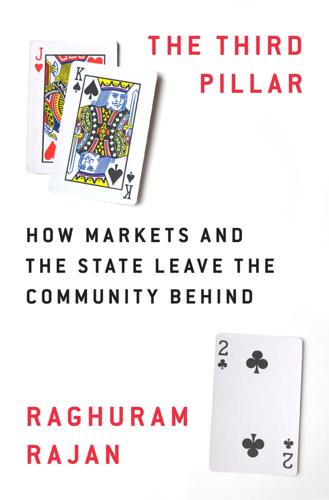
The Third Pillar: How Markets and the State Leave the Community Behind
by
Raghuram Rajan
Published 26 Feb 2019
By doing this they enable sufficient political and economic competition that the economy does not descend into cronyism or authoritarianism. Society suffers when any of the pillars weakens or strengthens overly relative to the others. Too weak the markets and society becomes unproductive, too weak a community and society tends toward crony capitalism, too weak the state and society turns fearful and apathetic. Conversely, too much market and society becomes inequitable, too much community and society becomes static, and too much state and society becomes authoritarian. A balance is essential! THE EFFECTS OF TRADE AND THE ICT REVOLUTION ON THE COMMUNITY The pillars are seriously unbalanced today.
…
The obvious alternative was to do cozy deals with the businessmen in the towns, which the emerging absolute monarchs of sixteenth- and seventeenth-century Europe proceeded to do. Europe’s first stab at a regime more tolerant of business resulted in a pro-business but not pro-enterprise economy. Government and business formed a closed community—or what would be called crony capitalism today. The towns were certainly not free markets. TAXING TOWNS As agriculture became more commercialized and prosperous, it could provide more taxable income. There were limits, though, on how much the powerful landed could be taxed—in France they were not, and in England, landowners colluded to pass laws in Parliament to avoid taxes.16 Moreover, the king needed every last bit of revenue for the new forms of mass warfare because, as Louis XIV declared, “after all it is the last Louis d’or which must win.”17 So the king looked to the towns and ports, where excise duties could be levied on goods like beer and bricks and customs duties could be charged on imports.
…
The demand for a voice came especially from workers in the growing cities, whose squalid filthy communities needed public services. Having obtained democracy, as we will see in the next chapter, communities organized to get the political establishment to pay attention to their demands, especially that unbridled crony capitalism be controlled. The third pillar grew in strength once again. 3 FREEING THE MARKET . . . THEN DEFENDING IT As the state eliminated military challenges within its territory, and as parliamentary bodies came to be dominated by propertied individuals, the wealthy no longer felt their lives or property were under constant threat.
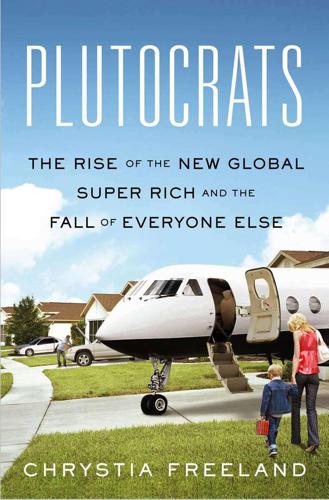
Plutocrats: The Rise of the New Global Super-Rich and the Fall of Everyone Else
by
Chrystia Freeland
Published 11 Oct 2012
The alpha geeks are the dominant tribe in Bangalore, the Indian city that invented technology outsourcing. In their incarnation as engineers, they overwhelmingly populate the Communist Party leadership in China, where political nous is a surer path to wealth than filing patents. The Russian oligarchs are a textbook example of crony capitalism, yet six of the original seven earned degrees in math, physics, or finance before becoming natural resource tycoons. Carlos Slim, who studied engineering in college and taught algebra and linear programming as an undergraduate, attributes his fortune to his facility with numbers. So does Steve Schwarzman, who told me he owed his success to his “ability to see patterns that other people don’t see” in large collections of numbers.
…
Most reports depicted the Orange Revolutionaries, with their determined, subzero encampment in the capital city’s central square, either as western Ukrainians rebelling against the government’s pro-Russian stance or as idealistic students who were unwilling to stomach political repression. Both characterizations were true, but Aslund saw a third dynamic at play. The Orange Revolution, he told me, was the rebellion of the millionaires against the billionaires. Ukraine’s crony capitalism worked extremely well for the small, well-connected group of oligarchs at the very top, but it was stifling the emerging middle class. This rising petite bourgeoisie was finally fed up and it was fighting for more equitable rules of the game. That battle of the millionaires versus the billionaires has been playing out across the world.
…
Graham told me, was when “the gains around them are much bigger than their own, and bigger than they can ever achieve in their lifetime.” Dr. Graham attributes this feeling of inadequacy vis-à-vis the 0.1 percent partly to greed. She points to work by economist Angus Deaton that shows the richer you are, the more covetous you become—the social science version of the biblical proverb about the eye of the needle. But she says crony capitalism is to blame, too. The middle-class achievers are the most frustrated in societies where getting to the top is seen as a function of connections rather than merit. A more sympathetic rationale, advanced most prolifically by Cornell economist Robert Frank, is the problem of positional goods. These are products and services whose value is derived in part from their scarcity and how much everyone else wants them.
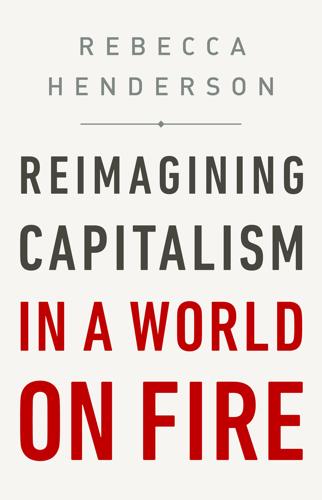
Reimagining Capitalism in a World on Fire
by
Rebecca Henderson
Published 27 Apr 2020
They also have a compelling economic case to do so. A world on fire threatens the viability of every business. The Danger Ahead For years, the proponents of the unchecked free market have been attacking government. But the alternative to strong, democratically controlled government is not the free market triumphant. The alternative is crony capitalism, or what the development economists call “extraction,” a political system in which the rich and the powerful get together to run the state—and the market—for their own benefit. Extractive elites monopolize economic activity and systematically underinvest (when they invest at all) in public goods such as roads, hospitals, and schools.
…
But no one stopped to price externalities, build the institutions that would enforce the rule of law, provide decent education and health care, or ensure that firms couldn’t set their own rules. Behind the smiles, the men with guns were still in charge. The Russian state sold its holdings—the vast majority of the economy—to a small group of cronies, creating a particularly nasty form of crony capitalism. The United States has a population of 327 million and a GDP of $21 trillion.57 Russia has roughly half the population and a GDP of only $1.6 trillion.58 Free markets need free politics: functioning institutions are great for business. When we told the leaders of firms that their sole duty was to focus on shareholder value, we gave them permission to turn their backs on the health of the institutions that have historically balanced concentrated economic power.
…
The Consensus led influential bodies such as the World Bank and the International Monetary Fund (IMF) to push developing countries to enact far-reaching deregulation and privatization, to open domestic markets to global trade, and to permit free capital flows as roots of development—all without explicit attention to the health of local political or social institutions. It’s now clear that this was a mistake. Empirically, many of the states that implemented the Washington Consensus failed to do as well as expected. In post-Soviet Russia in particular, the rapid liberalization of markets was followed by a descent into an extreme form of crony capitalism, while the so-called Asian tigers—especially Taiwan, Singapore, and the Republic of Korea—found economic success by pairing the development of their own markets with heavy government intervention. A 2000 study that found that differences in political and social institutions explained about three-quarters of per capita differences in income across formerly colonized nations provoked a flood of further research.18 This work eventually confirmed what historians and political scientists had never stopped saying—namely that while economic growth and social well-being are often enormously advanced by the presence of free markets, they are also critically dependent on a host of complementary institutions.
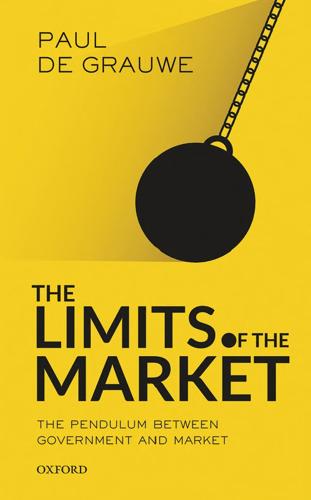
The Limits of the Market: The Pendulum Between Government and Market
by
Paul de Grauwe
and
Anna Asbury
Published 12 Mar 2017
In his impressive book Martin Gilens20 analyses how the American political system promotes the interests of those with the highest incomes. This is closely related to the fact that in the US money is the determining factor in winning elections. To a certain extent it could be said that the US is also a victim of crony capitalism. That makes it very difficult for the government to take care of the public domain, such as the environment. Better known examples of crony capitalism appear in countries in Asia, Africa, and Latin America. Many countries are also unstable. In time there will be revolution and violence, which will damage the mechanism of the free market system. As I concluded previously when I talked about inequality, the true enemies of capitalism are the capitalists themselves.
…
In many countries the minority wins. In these countries the government systematically chooses in favour of the large polluting businesses. This is possible because there is no functioning democracy in place. Politicians are bribed by polluting companies, without any mechanism to put a stop to it. This is referred to as ‘crony capitalism’, where the government systematically defends capitalist interests. Companies exploit their labourers unpunished, destroy the environment, and conspire to push up prices. Politicians, who are bribed or even control large parts of the industry themselves, openly defend the capitalists. A symbiosis arises between government and capital.
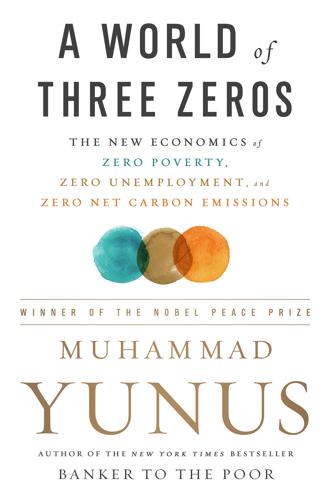
A World of Three Zeros: The New Economics of Zero Poverty, Zero Unemployment, and Zero Carbon Emissions
by
Muhammad Yunus
Published 25 Sep 2017
See Paris Climate Conference corporate control, 45, 224 corruption crony capitalism and, 205 financial institutions and, 214 good governance and, 204–208 new civilization and, 206 rule of law through, 205 widespread problem of, 204 See also political corruption countereconomics of entrepreneurship, 30–32 mainstream economics and, 30–31 social business and, 17 Crédit Agricole, 248–249 credit markets, 47 creditworthiness agriculture and, 191–192 conventional banks and, 23 Grameen Bank and, 12 crime, 127 crony capitalism, 205, 206 crowdfunding, 183 Dalio, Matt, 178, 179, 181 Dalio, Ray, 178 Danone, 51, 58, 251 Danone Communities, 251–252 data usage in emerging markets, 179 Kiva and, 184 MakeSense and, 186 Deaton, Angus, 4 developing nations, 45, 98 Doctor in a Box, 197, 198 donors impact payment and, 256 social business funds and, 254 Social Success Note and, 255 economic crisis banks during, 232 financial systems and, 231 globalization and, 47 other crises and, 48 reasons for, 47 economic development education part of, 215–216 health care part of, 215–216 projects for, 77 economic distress, 84, 85 economic engine, 15–16 economic freedom, 221–225 economic growth Bangladesh and, 100–101 capitalism for, 8 economic freedom and, 222 entrepreneurship for, 105 environmental protection and, 98–99 GDP and, 13 governments and, 209 human rights and, 199 infrastructure and, 214 economic inequality.
…
Every basic institution, from the judiciary and the police to the military services and the financial system, becomes dysfunctional. Often they are converted into tools of repression to ensure that those in power continue to reap their ill-gotten rewards. Minimizing government corruption and crony capitalism is not an easy challenge. History shows that, where money and power are combined, human behavior tends to become corrupted. National and international laws and treaties that forbid corruption in business deals have not accomplished their goals. Too many companies continue to violate the legal and ethical standards set by their national legislatures; practices like money laundering and offshore harboring of cash gained through illegal activities continue to flourish.
…
See Global Entrepreneurship Monitor gender equality, 123, 128 Giving Pledge, 244, 245 Global Alliance for Improved Nutrition (GAIN), 51 Global Entrepreneurship Monitor (GEM), 35 global pollution, 98 Global South, 92, 209 globalization economic crisis and, 47 food markets and, 43 new era of, 14 technology and, 176 Golden Bees operations of, 38 poor people and, 39 social business of, 37 Uganda and, 37 YSB and, 57 Good Bee, 162 good governance, 225 corruption and, 204–208 elections and, 201 elements for, 210–221 human rights and, 200, 221 infrastructure and, 210 technology and, 212 governments budgets for, 243 charity and, 213 civil institutions and, 220 corporate control and, 224 corruption in, 205 crony capitalism and, 206 economic growth and, 209 entrepreneurs and, 209 finance and, 242–243 financial collapse avoided by, 232 financial institutions and, 214 infrastructure and, 247 people’s vision with, 208 poor people and, 246 problems for, 208–210 public opinion mobilized by, 20 social business and, 247 social business funds and, 254 tyranny in, 224 Grameen America economic distress and, 85 microcredit bank of, 12–13 poor people and, 50 Grameen America, Inc.
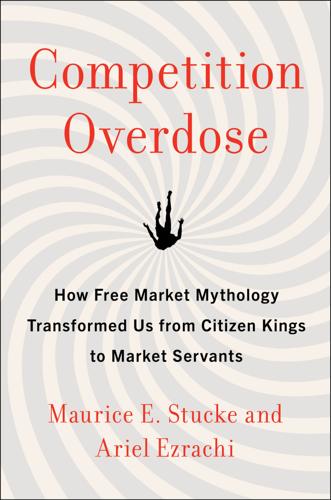
Competition Overdose: How Free Market Mythology Transformed Us From Citizen Kings to Market Servants
by
Maurice E. Stucke
and
Ariel Ezrachi
Published 14 May 2020
Congressman Adam Schiff remarked, “Nothing says drain the swamp like telling a room full of bankers to give more money to politicians who put the interests of banks ahead of people.”40 Lobbying and money can suffocate democratic values. Add the competition ideology and it becomes invasive. After all, that is the effect of kudzu. And there you have it. Lobbyists utilize the competition ideology to support crony capitalism, militate against important regulation and safeguards, and ensure that power and money are allowed to subvert democracy. And most of our legislators go along with it, either out of genuine belief in unbridled competition or for more craven political purposes. The result, in our case, is a distorted ideology that is often used as a smoke screen to benefit the few.
…
They do so, even though they know, or should know, that outsourcing government services to private companies in these particular cases will mean that citizens and consumers end up paying higher costs, in the form of taxes and budget deficits, for inferior services, and that we end up worse off as a result. At times, policy makers kudzu to shrug fiscal responsibility—better to blame private firms for poor quality and high prices than the government. Other times, the support for privatization is driven by crony capitalism, where big government is in bed with big business. To be clear, the support for privatization isn’t always suspect. Many of its supporters, among them libertarians who want to reduce government’s footprint and competition ideologues who believe competition always works, are genuine in their conviction that privatization is for the benefit of society.
…
The United States has one of the highest poverty and inequality levels among the OECD countries,” and also ranks near the bottom among wealthy countries in terms of labor markets, safety nets, and economic mobility.5 The middle class, in the United States and in much of Europe, is shrinking—down to just over 50 percent in the United States and 60 percent in the European Union.6 Once-thriving manufacturing centers where workers could earn a decent living have been reduced to a state of rusting decay brought about by declines in labor’s share of profits, low-skilled workers’ wages, labor force participation, and the start-up rate of new firms (due to barriers erected by powerful incumbents).7 Yet, our elected officials continue to defend the competition ideology, to insist that it will pay off, even as our pocketbooks, health care, and social rights tell us otherwise. What has happened is that the idealized perfect competition portrayed in the economic textbooks has been squeezed out by the bad forms of competition—monopolistic or toxic or both. Crony capitalism, in which big business and big government cozy up to each other to stifle the good forms of competition, is the order of the day. Economists who have studied the data reveal that under this system many markets have actually become more concentrated and less competitive. And while the profit margins of the most powerful companies increased, innovation may have actually declined.8 Yet the consolidation in the marketplace continues to be defended as necessary.
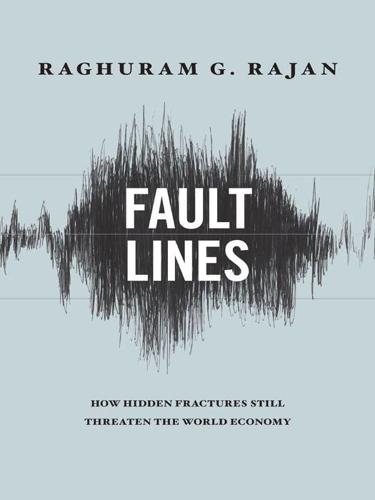
Fault Lines: How Hidden Fractures Still Threaten the World Economy
by
Raghuram Rajan
Published 24 May 2010
Favoring the Few Instead of relying on state-owned firms to propel growth, a number of governments have tried to remedy private-sector organizational deficiencies and build domestic champions, even while relying on some market signals to allocate resources. The process of playing midwife, often derided as crony capitalism but better termed relationship or managed capitalism, involved a judicious mix of the government’s giving firms some protection from foreign competition and special privileges so that they could generate the profits around which they could build their organizational capital, while maintaining some incentives for firms to be efficient.
…
This was indeed what Western governments did in their own economies in 2008–2010, and what the IMF eventually turned to doing. But proud East Asian government officials were initially treated as derelicts who did not understand how to run clean governments. Overnight, managed capitalism was labeled crony capitalism, and there were certainly enough examples of cronyism to allow the Western financial press to go to town. Some of the initial policy advice from the Fund, the World Bank, and Western governments seemed to be focused on punishing the cronies, instead of recognizing that the system was so interconnected that many innocent people would suffer in the process.
…
Confident in the knowledge that the government will come to their rescue, these institutions can play a game of chicken with the authorities by refusing to take adequate precautions against failure, such as raising equity. Perhaps just as important are the political consequences of such rescues. It is hard for the authorities to refute allegations of crony capitalism. Aside from the stated intent of saving the economy, there is no discernible difference between a bailout motivated by the sense that institutions are systemically important and one motivated by the desire of those in authority to rescue their friends or their once and future employers. Even as conspiracy theorists have a field day, painting everyone remotely associated with the financial system into a web of corruption, the damage to the public’s faith in the system of private enterprise is enormous: it senses two sets of rules, one for the systemically important and another for the rest of us.
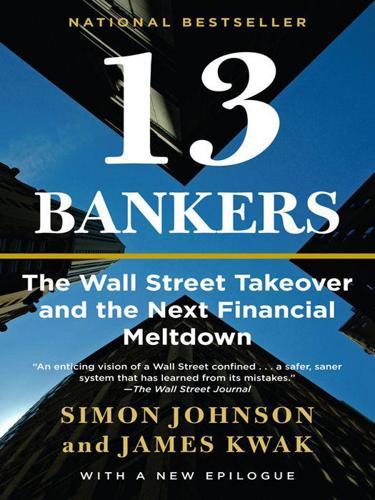
13 Bankers: The Wall Street Takeover and the Next Financial Meltdown
by
Simon Johnson
and
James Kwak
Published 29 Mar 2010
Aided by the president and his family, who opened doors for their friends (and shut them for their competitors), these entrepreneurs built factories, developed cities, and learned how to export raw materials, agricultural products, and simple manufactured items to the rest of the world. As in many other low-income countries in the past half-century, economic development was dominated by a small economic elite defined by their personal ties to the ruling family, which traded favors for both political support and cold, hard cash—a pattern known as “crony capitalism.”26 For example, Indofood became one of the largest conglomerates in the country, largely because of a longtime personal friendship between its founder, Liem Sioe Liong, and Suharto.27 Suharto’s wife, Siti Hartinah Suharto, known as Madame Tien, was involved in so many business deals that she was referred to by critics as “Madame Tien Percent” for her alleged fees.28 Suharto’s children also cut themselves into many major deals; his daughter was involved in the largest taxi company, one son tried to build cars, and another son was a financial entrepreneur.29 For a long time, the system worked reasonably well.
…
Of course, the “dispossessed” oligarchs fight back, calling in political favors or even trying subversion—including calling up their contacts in the American foreign policy establishment, as the Ukrainians did with some success in the late 1990s.41 But the aftermath of an emerging market crisis typically leads to a shakeout of the oligarchy, with political power concentrated in a smaller number of hands. However, another common feature of emerging market crises is that they don’t last forever. Even while outside observers are still despairing over corporate governance, macroeconomic management, and crony capitalism, growth picks up again. In 1999, the Korean economy grew by 11.1 percent; the Russian recovery took slightly longer, with growth of 4.5 percent in 1999 and 11 percent in 2000; and while growth took longest to resume in Indonesia, by 2000 its economy was expanding at close to 4 percent per year.42 A lower exchange rate boosts exports, widespread unemployment reduces the cost of labor, and companies with rescheduled debts or new companies with clean books can take advantage of both higher sales and lower costs.
…
Foreign lenders learn exactly the wrong lessons from a crisis: they learn that when push comes to shove, the IMF will protect them against the consequences of their bad investments; and they learn that it’s always best to invest in the firms with the most political power (and hence the most assurance of being bailed out in a crisis), perpetuating the pattern of crony capitalism. As a result, foreign capital flows back, and emerging markets can repeat the boom-bust-bailout cycle for a long time, perhaps indefinitely. But long-term economic growth is unlikely to result. Although oligarchies may be consistent with episodes of growth, they are not good at supporting the development of new entrepreneurs and the commercialization of new technologies.44 In fact, entrenched economic elites may have an interest in limiting competition from new ideas and new people.
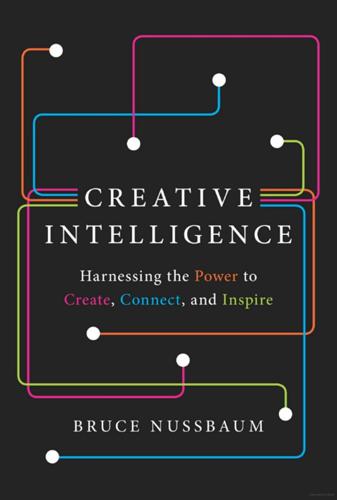
Creative Intelligence: Harnessing the Power to Create, Connect, and Inspire
by
Bruce Nussbaum
Published 5 Mar 2013
We witnessed an inequality gap that hadn’t been as wide since the 1920s and the Great Depression. The Occupy Wall Street movement, with its rallying cry “We are the 99 percent,” crystallized the sense that something needed to change. You knew something fundamental was about to change when both the Tea Party and Occupy Wall Street found a common enemy, publicly blaming “Crony Capitalism” for destroying the American Dream. Even while the New Economy was at its peak, alternative ways of thinking and doing had begun springing up around the nation. Alice Waters’s groundbreaking organic restaurant Chez Panisse served as inspiration for a local food movement, which, four decades later, has gone truly global.
…
It is an economic system that would encourage the formation of vastly larger numbers of start-ups and promote policies that helped them scale successfully. It would reward large corporations with entrepreneurial cultures—companies like Corning and 3M—that generate substantial revenue each year from new products invented over the previous five years. And it would curtail the “crony capitalism” tactics of big corporations and banks that deploy political contributions to turn the tax and regulatory systems to their benefit. BUILDING A NEW ECONOMICS OF CREATIVITY Using the competencies of Creative Intelligence as a starting foundation, we can begin to build a new economic model for the twenty-first century.
…
Apple is pushing aside RIM and Nokia, Facebook is pressuring Google to move into social, online shopping is mauling the malls. But the brutality of the free market isn’t in operation in many industries where large corporations hold sway by virtue of their powerful connections, not their innovations. Creative destruction is the enemy of crony capitalism, as well as a force that’s essential for innovation. An economic model based on creativity would require a transparent economic playing field, a vigorous antitrust policy that breaks up unfair monopolies, and curbs lobbyists who manipulate tax and regulatory policies for special interests. The capital gains tax, for example, should be structured to promote start-ups and young companies.
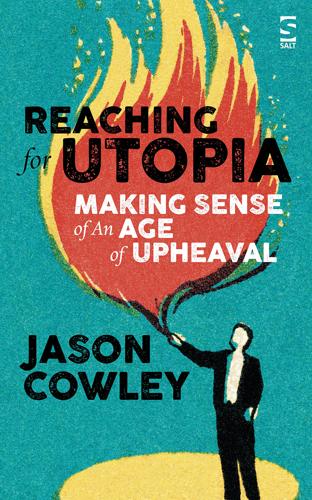
Reaching for Utopia: Making Sense of an Age of Upheaval
by
Jason Cowley
Published 15 Nov 2018
That may be too dark but the subtext is this: liberal societies cannot depend on history for their survival. The assumption that markets and democracy are mutually reinforcing was always an illusion. China and Russia have not evolved to become liberal democracies. Economic liberalisation has not led to political liberalisation. In fact, ours is increasingly becoming an age of crony capitalism, buttressed by authoritarianism and nationalism – think Putin’s Russia, Trump’s America, Erdoğan’s Turkey, Xi Jingping’s China, Modi’s India. Or the illiberal democracies of eastern Europe. Or the Gulf autocracies. Macron is a liberal optimist; there aren’t many like him. Moderation, scepticism, caution, decency, empathy, humility, order, security, moral wisdom, social responsibility, the common good, the protective state: these should be some of the watch words and phrases of any new political dispensation or settlement that emerges out of this age of upheaval.
…
And what is so interesting is that the right is saying that as well.’ You mean the more thoughtful, cerebral right . . . ‘Yes, the more thoughtful right. Now, Cameron is cut off from that political project. It might have been Cameron in 2006, 2007, but it’s just not Cameron now.’ But Cameron speaks of the iniquities of ‘crony capitalism’. He has his own reformist position on the financial crisis and its aftermath. ‘I know, but he doesn’t believe it, does he?’ Ferdinand Mount thinks he believes it. Tom Baldwin interjects: ‘They are cousins [Mount and Cameron].’ Miliband: ‘Well, anyway, look, if Cameron really believes it, you don’t cut taxes for millionaires and then raise taxes for everybody else and say a country is coming together.
…
As for my book being taken up by the left, most of my fan mail, such as it is, comes from former directors of FTSE-100 companies, saying that, alas, yes, that’s pretty much how it is these days. The truth is, or ought to be, that a campaign to restore transparency and accountability to business ought to be an all-party thing. After all, it was D. Cameron, I think, who coined the best phrase for it, “crony capitalism”. More importantly perhaps, much of the reform is going to have to be self-generating (e.g., the shareholder spring), rather than led by government of whatever party, although govt must play an energetic supporting role.’ Miliband’s forthcoming conference speech will develop the defining theme of his leadership – which is, how does a party of the centre left achieve social justice when the old statist tax-and-transfer model of redistribution is no longer affordable?
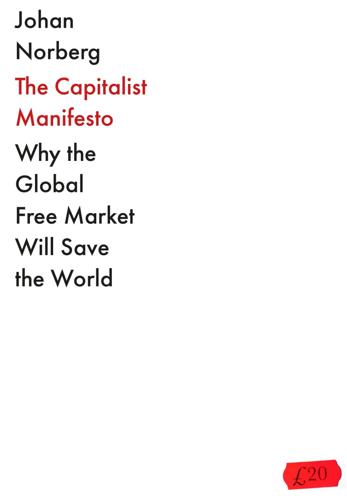
The Capitalist Manifesto
by
Johan Norberg
Published 14 Jun 2023
Capitalism is based on companies competing for the favour of consumers with better goods and services, but unfortunately many companies choose instead to compete for the favour of politicians to get subsidies, tariffs, regulatory benefits and bailouts so that they do not have to worry about consumers. It is not free market capitalism, it is crony capitalism – or, as it is sometimes called, socialism for the rich – and it is one of the biggest problems in our economy. Partly because it gives one group of people the legal right to put its hand in our wallets, and partly because it helps non-competitive business models to survive and drag down the entire economy.
…
On the contrary, it is mainly in rich market economies that we have the will and resources to reduce our environmental impact and – even if one should be careful with data on self-reported happiness – it is striking that it is in rich, individualistic and capitalist countries that people consider themselves most satisfied with life. But everything is not optimist babble (to quote a judgment about me from back in the day). We have serious problems with crony capitalism, which manifests itself in regulations adapted to large companies, occupational licences, building regulations that protect insiders, immigration restrictions that hurt our economy, and a battery of subsidies, tax deductions and tariff protection for companies that are either competitive (so they do not need such help) or not competitive (meaning they are a drag on the economy).
…
INDEX NB Page numbers in italics indicate illustrations Afghanistan, 160–61, 256 Africa, 30–35, 70, 267, 282 colonisation, 31 independence, 31–4 Sub-Saharan Africa, 30–31 AIM (AOL Instant Messenger), 170 Albania, 50 Algeria, 251 Alphabet, 179 AltaVista, 169, 174 Amazon, 169–72, 178–9 Amazon Prime, 179 Andersson, Magdalena, 8 Angola, 239 Annan, Kofi, 3 Ant Group, 227 AOL (America Online), 169–71, 174 Apple, 107–8, 159, 163, 169–73, 179 Apple TV, 179 Arab Spring, 215 Aristophanes, 73 Aristotle, 70 ARPA, 183–6 ARPANET, 184–5 Asia, 267, 282 Asp, Anette, 287 Attac, 2–3, 6 Australia, 11, 258, 267, 282, 285 Ayittey, George, 31 Bangladesh, 235 Bank for International Settlements (BIS), 144 Bankman-Fried, Sam, 153 Bao Tong, 212 Baran, Paul, 184, 186–7 Bastiat, Frédéric, 114 Beijing, China, 209 Belgium, 285 Berggren, Niclas, 62 Bergh, Andreas, 56, 103 Bezos, Jeff, 127 Biden, Joe, 76, 217 big companies, 141, 146–50, 176–7, 292 BioNTech, 177 biotechnology, 195 Björk, Nina, 263, 265, 272, 274–5, 278 BlackBerry, 174 Blair, Tony, 170 Blockbuster, 151 Blue Origin, 202 Bolivia, 47 Bolt, Beranek and Newman, 184 Bono, 4, 170 Botswana, 34–5 Boudreaux, Donald, 125 Boulevard of Broken Dreams (Lerner), 190 Brazil, 11, 29, 239, 258 Brexit, 116–18 Bullshit Jobs: A Theory (Graeber), 86, 98–9 business regulation, 139–41 Callaghan, James, 10 Canada, 102, 267, 283 Capital in the Twenty-First Century (Piketty), 128 capital income, 130–31 Carbon Engineering, 255 Cardoso, Fernando Henrique, 29 Carlson, Tucker, 146 cars, 158 Carter, Jimmy, 10 Case Deaton, Anne, 108–11, 136 Castillo, Pedro, 30 Chávez, Hugo, 43, 135 child labour, 20 child mortality, 19–20, 20 Chile, 11, 29–30 China, 5, 7, 11, 19, 24–5, 76, 78–80, 83–4, 104–7, 204–29, 239, 258 agricultural productivity, 206–7, 209 Communist Party, 182, 204–9, 211–12, 215–18, 221–3, 226–8 deindustrialization, 84 economic development, 205–29 environmental issues, 251–3, 257 exports, 209–10 industrial policy, 205, 212–13, 217, 223–4, 296 innovation strategy, 182, 192 innovation, 226–8 poverty, 213, 214 Reform and Opening Up programme, 212 state-owned companies, 208 WTO and, 205, 209, 211 China’s Leaders (Shambaugh), 215 Chirac, Jacques, 191 Chomsky, Noam, 49 Christianity, 264–5 Churchill, Winston, 135 Clark, Daniel, 87 climate change, 5–7, 230–60, 293 carbon border tariffs, 258 carbon tax, 256–7, 259 energy supplies, 233–5, 253–6, 259 greenhouse gas emissions, 231, 233–5, 238, 240–41, 244, 253–9 see also environmental issues Climeworks, 255 Clinton, Hillary, 140 Coase, Ronald, 206 Cohen, Linda, 189 communism, 2, 25–6, 241–3, 290–91 Communist Manifesto, The, 1848, 2 community, 267 Compaq, 174 Concorde, 191 Confucianism, 22, 25 Congo-Brazzaville, 30 Congo, 239 consumer culture, 160–62, 287–8 Cook, Tim, 173 cooperation, 278–9 Coopersmith, Jonathan, 188–9 Corbyn, Jeremy, 43 coronavirus see Covid-19 pandemic Council of Economic Advisers, 147, 152 Covid-19 pandemic, 8, 21, 76–81, 223, 232–3, 270 Cowen, Tyler, 154 Credit Suisse, 132–3 crony capitalism, 139–40, 291 culture wars, 12–13 Czechoslovakia, 26 Dalits, 63–4 dating profiles, 154 ‘deaths of despair’, 7, 108–10, 136, 271, 293 Deaths of Despair (Deaton and Case Deaton), 136 Deaton, Angus, 19, 108–119, 136 DeepMind, 177 degrowth, 232–5, 254–5 ‘deindustrialization’, 83–5 democracies, 26, 37, 46 Deneen, Patrick, 262–5 Deng Xiaoping, 24, 46, 205, 212–13 Denmark, 91, 285 ‘dependency theory’, 27–8 Detroit, Michigan, 87–8 dictatorships, 11, 24, 29, 32, 42–8 Digital Equipment Corporation, 174 disability-adjusted life years (DALY), 237 dishonesty, 153–6 Disney, 178 Dominican Republic, 225 Easterlin, Richard, 279 ‘Easterlin paradox’, 279–80 Easterly, William, 39 Ecclesiazusae (Aristophanes), 73 Economic Freedom of the World index, 35–7 economic freedom, 35–42, 36, 57, 58–62, 58, 77–8 Economist, The, 179, 192 education, 20, 94 Energiewende, 191, 192–3 Engels, Friedrich, 2, 277, 290–91 Enlightenment, 73 entrepreneurship, 123–4, 128–9, 152–4 ‘welfare entrepreneurs’, 197 environmental issues, 236–41, 245–52, 293 agriculture, 239–40 air pollution, 237–8 biodiversity, 238–9, 249–50 deforestation, 239 health and, 236–8, 237 plastics, 247–8 prosperity and, 245–52, 249 transportation, 250–51, 254–5 Environmental Performance Index (EPI), 248, 252 Estonia, 26 Ethiopia, 277 Europe, 22, 239, 267, 282 European Centre for International Political Economy, 79 European Union (EU), 4, 68, 79, 116, 164, 258–9 Everybody Lies (Stephens-Davidowitz), 155 Facebook, 163, 167–75, 179–80 Fallon, Brad, 192 famine, 29 Fanjul, Alfonso and José, 140 fascism, 75 Federal Communications Decency Act (USA), 174 Feldt, Kjell-Olof, 11 feudalism, 73, 75 Financial Fiasco (Norberg), 142 financial markets, 141–3 Financial Times, 8, 267 Finland, 76, 78, 268, 285 Foodora, 102 Forbes’ list, 129–30 forced technology transfers, 211 Foroohar, Rana, 8 Fortune 500 list, 151 Fortune magazine, 169 France, 79–80, 97, 159, 192, 281, 285 Fraser Institute, 35 free markets, 2–4, 6, 23, 58–62, 65–82, 83, 290–97 happiness and, 279–89, 282, 284, 286 human values and, 261–89 Friedman, Thomas, 204 ‘friendshoring’, 79 Friendster, 170 GAFAM (Google, Amazon, Facebook, Apple, Microsoft), 169–70 Gallup World Poll, 267 Gandhi, Indira, 245 Gapminder, 18 Gates, Bill, 124–7, 274 GDP (Gross Domestic Product), 5, 23, 26, 33, 35, 49–56 General Data Protection Regulation (EU GDPR), 164 generosity, 274–7 Georgia, 26, 215 Germany, 26, 84, 97, 101, 192–3, 196, 268 gig economy, 101–3 Gingrich, Newt, 191–2 Gini coefficient, 132 global financial crisis, 2008, 4–5, 142–3 global supply chains, 41–2, 58–61, 76, 81 Global Thermostat, 255 global warming see climate change globalization, 3–8, 17, 19, 80, 103–10, 117 Google, 163, 169–73, 179–80 Gorbachev, Mikhail, 215 Graeber, David, 86, 98–9 Grafström, Jonas, 240 Greece, 26, 254 Green Revolution, 239–40 green technology, 243, 251–5 Greider, Göran, 50, 241 growth, 49–57 degrowth, 232–5, 254–5 government and, 55–6 health and, 52–3 poverty and, 53–4 Guangdong, China, 207–8 Guardian, 3, 169 Halldorf, Joel, 262, 265 happiness, 279–89, 282, 284, 286 Hawkins Family Farm, 140 Hawkins, Zach, 140 Hayden, Brian, 161 Hayek, Friedrich, 66 Helm, Dieter, 193 Henrekson, Magnus, 56 Hertz, Noreena, 261, 262, 265, 268, 272, 274–5, 278 Hillbilly Elegy (Vance), 87 Hinduism, 22, 25 Hong Kong, 23, 205, 207 Horwitz, Steven, 294 housing market, 131, 142–3, 208–9 How China Became Capitalist (Wang and Coase), 206 How Innovation Works (Ridley), 188 Hsieh, Chang-Tai, 148–9 Hu Jintao, 215–16 Hugo, Victor, 25 Hume, David, 284 Hungary, 26, 283 IBM, 151 Iceland, 285 IKEA, 119, 141, 147 illiteracy, 20, 20 ‘import substitution’, 27–8 In Defence of Global Capitalism (Norberg), 3, 17, 33, 38, 42, 146, 151, 156, 169, 204, 214, 230–31 income, 22, 55, 88–96, 95, 134–5, 285, 291 low-income earners, 136–8 minimum wage, 90 wage stagnation, 89, 92–3 see also inequality India, 11, 24–5, 63–4, 70, 234, 239, 251, 258 caste system, 63–4 Indonesia, 239 industrial policy, 182, 188–203 Industrial Revolution, 22 inequality, 7, 27, 42, 54–5, 110, 131–8, 133, 285–7 happiness inequality, 131–2 income, 285–7 life expectancy and, 136–8 infant mortality, 19–20, 235, 291 Infineon, 196 inflation, 8, 10–11, 69 innovation, 65–6, 122–3, 125, 151, 181–203 government policy and, 181–203 innovation shadow, 169, 176 prizes and, 199 research, 199–200 subsidies and grants, 196–7 Instagram, 168, 177 integrity, 164 intellectual property, 41, 210–11 International Disaster Database, 235 International Union for the Conservation of Nature (IUCN), 238 internet, 162–8, 183–7 IPCC (Intergovernmental Panel on Climate Change), 231 iPhone, 107–8, 156, 159 Iran, 220 Iraq, 251 Ireland, 285 Italy, 97, 285 Jackson, Jesse, 43 Jacobs, A.
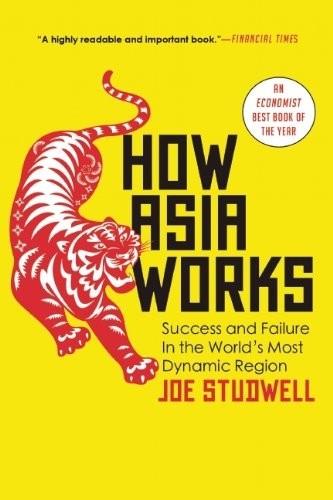
How Asia Works
by
Joe Studwell
Published 1 Jul 2013
If governments allow entrepreneurs access to what economists call ‘rents’ – sources of income at government discretion – without contributing to developmental objectives, this is a political dereliction of duty. What south-east Asians were the first to call ‘crony capitalism’, whereby businessmen are granted concessions without developmental strings attached, is a political failure rather than an entrepreneurial one. The term originates in the Philippines, where the political class has been the most selfish and culpable among all the major states in east Asia. Neo-liberal economists argue that developing countries should avoid the risk of crony capitalism by getting rid of economic rents. But while this might make sense in rich countries, in aspiring states it simply begs the question: How, in that case, will you get entrepreneurs to do what you need them to do in order to develop your economy?
…
What created the Canons, the Samsungs, the Acers and so on in Japan, Korea and Taiwan was the marriage of infant industry protection and market forces, involving (initially) subsidised exports and competition between manufacturers that vied for state support. The north-east Asian states found ways to overcome the problems that afflicted the ISI policies that were promoted in the 1950s (including by the World Bank in its early, ‘left-wing’ incarnation). Contrary to the claims of many economists, rent-seeking and crony capitalism did not inevitably undermine industrial policy so long as sufficient discipline could be wrapped around infant industry promotion. The mix of plan and market recalls the British development economist Ronald Dore’s contemporary observation about foreign perceptions of Japan at the height of its industrialisation: ‘Left-wing … observers come back from Japan convinced they have seen a shining example of state planning,’ he wrote.
…
But then came a downturn at the end of the 1980s, when the Berkeley Mafia were allowed to apply their most radical reforms to the financial system. Finally, in the boom immediately before the 1997 crisis, Suharto was leaning towards Habibie again.94 The Berkeley Mafia were not hardened ideologues, but they believed that only the market could overcome Indonesia’s tendency to crony capitalism. A peripheral member of the group offers an anecdote which helps explain why the economists felt more and more compelled to seek solutions in financial deregulation. Soedradjad Djiwandono, who was governor of the central bank from 1993 until 1998, recalls receiving a letter in late 1996 from Tommy Suharto.95 The president’s youngest son wrote that he had two state banks willing to lend him more than USD1 billion for a car plant.
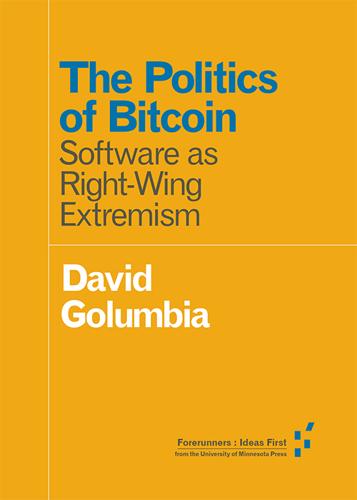
The Politics of Bitcoin: Software as Right-Wing Extremism
by
David Golumbia
Published 25 Sep 2016
Of course, when we look to sites already aligned with the right, even if they usually avoid conspiracy theory, engagement with Bitcoin results in a veritable deluge of extremist sentiment. Paul Krugman’s 2013 article “Bitcoin Is Evil” produced a wealth of conspiratorial commentary on the New York Times site where it was originally published, and even more outraged commentary in social media and on blogs. A typical response was found on the rightist economics blog Against Crony Capitalism, whose editor Nick Sorrentino wrote a piece titled “Paul Krugman Is Scared: He Says ‘Bitcoin Is Evil’: Undermines Central Banks” (2013). Others immediately leapt to discredit Krugman’s authority altogether (see Gongloff 2013; Yarow 2013). Comments to the piece itself include user “Michael Werner” noting that “The Creature from Jekyll Island gives a great history of the Fed and the damage it’s done over the years”; user “Oh Be Newman” writing that “undermining central banks is EXACTLY what we need!!!!!”
…
CryptoCoinsNews (May 4). http://www.cryptocoinsnews.com/. Soltas, Evan. 2013. “Bitcoin Really Is an Existential Threat to the Modern Liberal State.” Bloomberg View (April). http://www.bloombergview.com/. Sorrentino, Nick. 2013. “Paul Krugman Is Scared: He Says ‘Bitcoin Is Evil’: Undermines Central Banks.” Against Crony Capitalism (December 29). http://www.againstcronycapitalism.org/. Suarez, Daniel. 2006. Daemon. New York: Dutton. —. 2010. Freedom™. New York: Dutton. Sutton, Anthony C. 1995. The Federal Reserve Conspiracy. San Diego: Dauphin Publications, 2014. Swan, Melanie. 2015. Blockchain: Blueprint for a New Economy.
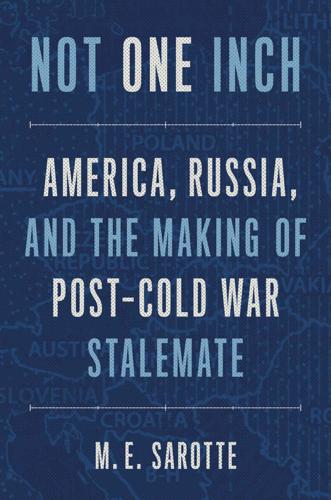
Not One Inch: America, Russia, and the Making of Post-Cold War Stalemate
by
M. E. Sarotte
Published 29 Nov 2021
Clinton made this remark to German chancellor Gerhard Schröder in Memcon, Clinton–Schröder, February 11, 1999, my 2015-0777-M, CL. 2. Åslund, “Russia’s Collapse.” 3. Quotation and IMF information from Åslund, “Russia’s Collapse”; Åslund, Russia’s Crony Capitalism, 22 (budget deficit), 71 (private portfolio inflows, yields, out before crash). 4. Michael E. Gordon and David E. Sanger, “Rescuing Russia,” New York Times, July 17, 1998. 5. AIW Grossman. 6. Åslund, Russia’s Crony Capitalism, 71. 7. “Profile: Sergei Kiriyenko,” BBC News, August 24, 1998, http://news.bbc.co.uk/2/hi/special_report/1998/08/98/russia_crisis/157120.stm. 8. “Crowds Cheer G8 Leaders,” BBC News, May 15, 1998, http://news.bbc.co.uk/2/hi/special_report/1998/05/98/g8/94439.stm. 9.
…
Confirming $11.2 billion a week later: “Press Release: IMF Approves Augmentation of Russia Extended Arrangement and Credit,” International Monetary Fund, July 20, 1998, https://www.imf.org/en/News/Articles/2015/09/14/01/49/pr9831. Åslund, Russia’s Crony Capitalism, 72, gives the amount provided by the IMF, the World Bank, and Japan as totaling $22.6 billion; on $17.1 billion, see Michael E. Gordon and David E. Sanger, “Rescuing Russia,” New York Times, July 17, 1998; see also Miller, Putinomics, 1. 12. Quotation from Åslund, Russia’s Crony Capitalism, 72. 13. “Framing Our Goals for the Upcoming Moscow Summit,” n.d., but from context July 1998, my 2015-0815-M, CL. 14. Quoted in Aron, Yeltsin, 742. 15.
…
Memcon, Ahtisaari–Christopher, February 8, 1996, SDC 1996-Secto-03030, February 10, 1996. 42. Memorandum for the President, From: Warren Christopher, “Note on Helsinki Meetings with Primakov,” February 12, 1996, DS-OIPS. 43. Stent, Limits, 22–23. 44. Hill and Gaddy, Mr. Putin, 23. Åslund, Russia’s Crony Capitalism, 23–24, makes similar comments: “Before the presidential election in the summer of 1996, seven top oligarchs threw all their money and media power behind President Yeltsin and probably managed to turn the election to his advantage.” 45. “Note on Helsinki Meetings with Primakov,” February 12, 1996. 46.
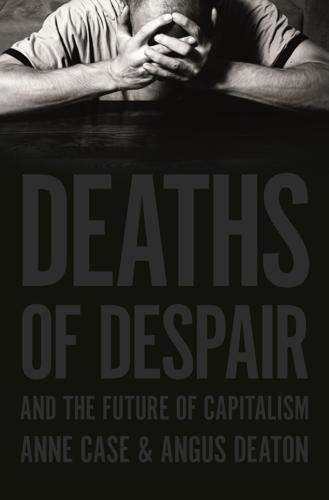
Deaths of Despair and the Future of Capitalism
by
Anne Case
and
Angus Deaton
Published 17 Mar 2020
To take some concrete examples, there is wide agreement that making money out of human suffering is wrong, and that wealth inequality based on that suffering is unjust. There is also broad agreement, on both right and left, among people with very different political views, that rent-seeking and crony capitalism are unjust. Whatever we think about wealth seeking, we can agree that it is unjust to get rich through special favors, such as those excoriated by Adam Smith as supporting “absurd and oppressive monopolies.” By contrast, there is no such agreement that any action that reduces income inequality is thereby automatically desirable.
…
B., 273n6 Boring, Michael A., 274n15 Bousbib, Ari, 202 Bowling Alone (Putnam), 173 Brandeis, Louis, 13 breast cancer, 24 Brexit, 259 Brill, Steven, 283n29, 284n54, 285n14 Brin, Sergey, 215 Britain, 3, 14, 30, 31, 41, 99, 121, 128, 141, 145, 147, 156, 165, 193, 199, 218, 224, 250, 258; austerity policies in, 260; deaths of despair and, 38, 145, 224; Great Recession and, 222; healthcare costs in, 196, 198; minimum wage and, 237; National Institute for Health and Care Excellence, 199, 210, 247, 248, 250; Opium War and, 109–11; social protection and, 223, 224, 225 Buell, Ryan W., 281n9 Buffett, Warren, 187, 207, 231–32, 287n9 Bureau of Labor Statistics, 158, 255 Cabral, H., 268n8 Caine, Eric D., 263, 272n6 California, 33, 86, 100, 134, 140, 179, 216, 237, 239, 251 campaign finance, 186, 241 Campbell, David E., 280n16, 280n18 Campbell, James, 116, 274n16 Canada, 23, 38, 41, 114, 193, 195, 197 cancer, 23–24, 29, 207; in midlife, 41; new drugs for, 202; terminal, 116 Cannadine, David, 266n25 Canton (Guangzhou), 109 Cantril ladder, 53, 181 capital, 152, 232, 260; human, 153; immigration and, 217; owners of, 239; power of, 175, 187; rate of return to, 216; redistribution towards, 240; social, 174 capitalism, 11, 12, 130, 147, 153, 156, 227, 254, 260; central problem of, 213; competition and, 230; crisis of, 140; critiques of, 188; crony capitalism, 245; faults of contemporary, 186; future of, x, 228, 244, 261; Industrial Revolution and, ix; medical emergencies and, 200; modern, 187; regulated, 262; worst face of, 212. See also anticompetitive behavior; rent-seeking carbon monoxide, 99 Card, David, 263, 288n28 car dealers, 11, 230, 256, 257 cardiovascular disease, 43, 97, 107.
…
See also bachelor’s degrees college entrance scandal of 2019, 55 college premium, 51, 153, 155, 217, 278n4 Collier, Paul, 286n6 Collins, Francis, 19, 263 Collins, Sara R., 284n41, 284n43 Comcast, 242 Coming Apart (Murray), 70 Commonwealth Fund, 197 communication, 229 communications technology, 233 community, 173, 179; destruction of, 189; white working-class losing, 178 competition: capitalism and, 230; elimination of, 232; foreign, 68; free markets and, 212; globalization and, 225; labor markets and, 236, 237; permanent advantage in, 235; Robinson and, 236; stifling of, 227 Congress, 13, 100, 120, 124–26, 197, 210, 211, 225, 242, 261 Conner, Marcy, 37, 49 consumer price index (CPI), 158 consumers, 208, 221, 230; benefits to, 227; immiseration of, 188; market power used against, 187; technological change socially beneficial for, 233 contraceptive pills, 160, 169 Cook, Tim, 12 Cooper, Zack, 283n27, 283n28, 284n56 copayments, 192 copyright laws, 256 Corn Laws, 14, 15 corporate choices, 227 corporate lobbies, 228, 232, 239, 241–43, 256–57; healthcare and, 209–11, 250 Corwin, Steven, 201 Cotton, Tom, 285n5 Courtwright, David, 115, 118, 274n11, 274n12 Cowen, Tyler, 286n6 Cox, Daniel, 265n8, 279n28 crack cocaine epidemic, 5, 62, 64; opioid epidemic and, 68–69 Craig, Stuart V., 283n27 creative destruction, 235 Crestor, 197 crime, 68, 179 crime rates, 5, 69 crony capitalism, 245. See also rent-seeking Culyer, Anthony J., 284n45 Cunningham, Rebecca M., 273n6 Currie, Janet, 263 Cutler, David M., 263, 277n11 Damasio, Antonio R., 271n3 Danziger, Sheldon H., 280n5 Daoguang Emperor, 109 Davis, Karen, 282n14 death certificates, 3, 29, 101, 118, 119, 136, 269n19 Deaton, Angus, 271n5, 271n7, 272n12, 272n15, 273n26, 276n3, 277n16, 291n37 deductibles, 192, 204 De Loecker, Jan, 287n14, 287n18 Delta Airlines, 231 delusional parasitosis, 112 democracy, ix, 14, 241, 246, 262; white working-class and, 13 Democratic Party, x Democrats, 210 Denmark, 163 depression, 27, 37, 92, 95, 96, 98, 99, 212 Desmond, Matthew, 276n3 detox, 122 Devine, Tom, 111, 273n4, 276n42 diabetes, 43 Diamond, Peter, 289n4 disability, 27, 161; insurance, 81, 85, 92, 157, 162, 252, 279n19 discrimination, 5, 31, 62, 65, 166, 189; reverse, 6, 166, 190; women and, 160 dissatisfaction, 181 dividends, 52 divorce, 98, 149 Dobson, Frank, 199 Doctor, Jason, 263, 274n20 doctors, 26, 52, 72, 73, 75, 84, 116 186, 198, 204, 210, 249; germ theory of disease and, 56; opioids and, 10, 113, 114, 117–19, 121–26, 247, 259; rent-seeking and, 10, 11, 12, 193, 196–97, 200–202, 241–42, 256 Doonesbury (cartoon), 62, 63 Dorn, David, 238, 278n21, 285n9, 285n10, 285n15, 287n8, 288n33 Doty, Michelle M., 284n41, 284n43 Dow Jones Index, 240 Dreamland (Quinones), 146 drug dealers, 10, 66, 69, 109–11, 114, 115, 120, 121 Drug Enforcement Agency (DEA), 110, 120, 124–25 drug manufacturers, 10, 40, 85, 112, 120, 124, 126, 127, 192, 193, 201, 202, 242, 259 drug overdoses, 2, 37, 38, 65–66, 111, 137, 185; African Americans and, 119; alcoholism and, 246; bachelor’s degrees and, 114, 121; common features of, 97; mortality rates from, 40, 121; rapid increases in, 45; rise in, 118; suicides and, 246.
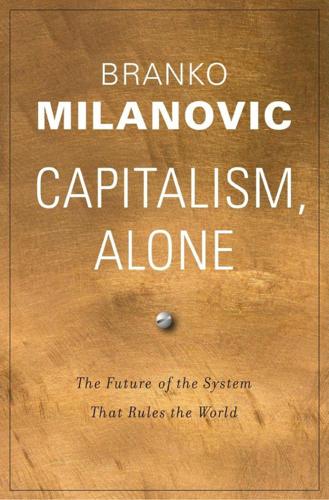
Capitalism, Alone: The Future of the System That Rules the World
by
Branko Milanovic
Published 23 Sep 2019
Many societies have learned to live, or even thrive, with moderate to high levels of corruption that seep through the entire system and make the lives of many people easier than they would be in a purely “noncorrupt” system. In fact, many people who are used to functioning in a system where mutual favors are exchanged have a hard time adjusting to an entirely different, “clean” system. Bai, Hsieh, and Song (2014, 3) argue that decentralized local “crony capitalism” in China plays a role similar to the one that a multiplicity of European states played in the rise of capitalism: local administrations protect their own champions, but they cannot prevent other local administrations from favoring their own, perhaps more efficient, crony capitalists. Thus, cronyism joined with interlocal competition plays the role of Schumpeterian creative destruction.
…
Karl Marx on Colonialism and Modernization. New York: Doubleday. Azar, José, Ioana Marinescu, and Marshall Steinbaum. 2017. “Labor Market Concentration.” NBER Working Paper No. 24147, National Bureau of Economic Research, Cambridge, MA, December. Bai, Chong-En, Chang-Tai Hsieh, and Zheng (Michael) Song. 2014. “Crony Capitalism with Chinese Characteristics.” Unpublished manuscript, May. http://china.ucsd.edu/_files/pe-2014/10062014_Paper_Bai_Chong.pdf. Bakija, Jon, Adam Cole, and Bradley T. Heim. 2010. “Jobs and Income Growth of Top Earners and the Causes of Changing Income Inequality: Evidence from U.S. Tax Return Data.”
…
Alan Cafruny, Leila Simona Talani, and Gonzalo Pozo-Martin, 309–329. London: Palgrave Macmillan. Pareto, Vilfredo. 1935. The Mind and Society, vol. 4 [Trattato di Sociologia Generale]. New York: Harcourt Brace. Pei, Minxin. 2006. China’s Trapped Transition. Cambridge, MA: Harvard University Press. Pei, Minxin. 2016. China’s Crony Capitalism. Cambridge, MA: Harvard University Press. Piketty, Thomas. 2014. Capital in the Twenty-First Century, trans. Arthur Goldhammer. Cambridge, MA: Harvard University Press. Piketty, Thomas, Li Yang, and Gabriel Zucman. 2017. “Capital Accumulation, Private Property and Rising Inequality in China, 1978–2015.”
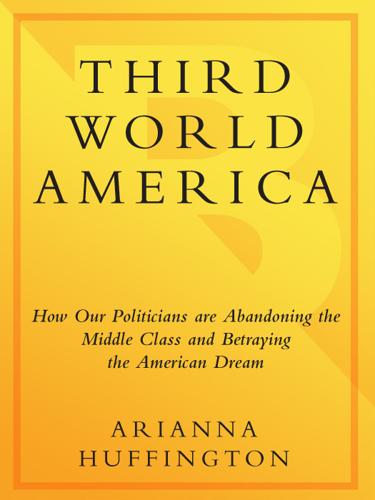
Third World America: How Our Politicians Are Abandoning the Middle Class and Betraying the American Dream
by
Arianna Huffington
Published 7 Sep 2010
THEY’VE GOT LOW FRIENDS IN HIGH PLACES The third leg in the Access Triple Crown is the way corporate America has used its economic clout to cultivate—okay, “buy”—friends in high places. It’s so much easier to get a politician to take your call when you have donated millions to him or used to work in the office next to him. Facebook is great, but the crony capitalism of Washington takes social networking to a whole different level. We saw how all those former Senate and House staffers are making a buck by lobbying their former bosses and colleagues on behalf of the big banks looking to gut reform.74 It’s the same thing we saw during the health-care battle when those fighting against reform hired 350 former members of Congress and congressional staffers to influence the debate, including half a dozen former staffers of Senator Max Baucus, the influential chairman of the Senate Finance Committee.
…
Tom Daschle is a senator, then a near–cabinet member overseeing health-care reform, then a “special adviser” to companies looking to undermine health-care reform.96 Robert Rubin is co-chairman of Goldman Sachs, then secretary of the Treasury, then a senior counselor of Citigroup—pocketing more than $126 million in cash and stock during his almost ten years there.97 Dick Cheney is a congressman, then secretary of defense, then CEO of Halliburton, then the most powerful vice president in history—helping lead America into a war with Iraq that ends up netting his former company billions in sweetheart contracts.98 During the Bush-Cheney years, Halliburton became the poster child for crony capitalism, which is why it was both surprising and utterly predictable when the company came roaring back into the headlines during the BP oil spill fiasco. It’s like one of those horror movie killers who keeps popping back up from the grave. You thought Halliburton had been eradicated when government audits showed the company had bilked taxpayers out of a billion dollars during the war in Iraq?
…
Given that the piece is about the economic meltdown, it’s telling that the bio doesn’t include his nearly ten years at Citigroup—during the very time that ended with the bank having to be saved by the American taxpayers.109 But that’s how our system “works” these days: Someone like Rubin is able to wreak destruction, collect an ungodly profit, then go along his merry way, pontificating about how “markets have an inherent and inevitable tendency—probably rooted in human nature—to go to excess, both on the upside and the downside.”110 This from the man who, as Bill Clinton’s Treasury secretary, was vociferous in opposing the regulation of derivatives—a key factor in the current economic crisis—and who lobbied the Treasury during the Bush years to prevent the downgrading of the credit rating of Enron—a debtor of Citigroup.111, 112 The hidden costs of such crony capitalism are monumental for the middle class. Why would people strive to build businesses—risking their money and their sweat equity—when they know there will always be someone on the other side of the table playing with a stacked deck? THE VULCAN MIND MELD BETWEEN WASHINGTON AND WALL STREET So the deck is stacked.
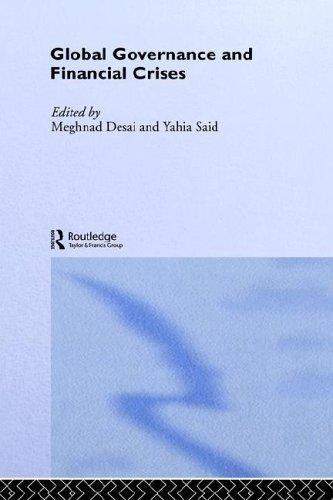
Global Governance and Financial Crises
by
Meghnad Desai
and
Yahia Said
Published 12 Nov 2003
That is, did borrowers and lenders accumulate more risk than was privately (let alone socially) efficient due to exogenous market interference, which distorted their otherwise rational and efficient behaviour? Or did they do so because specific market failures within financial markets led them to be unable to assess and price their risks properly? In other words, did artificially created factors, such as ‘moral hazards’ or ‘crony capitalism’, interfere with the incentive mechanisms and resource allocation dynamics of financial markets? Or did the combination of a particular type of international financial market with a particular form of financial liberalisation lead to the creation of an economic environment in which the interaction among intelligent, self-interested, ‘maximising’ economic agents certainly did not lead towards ‘equilibrium’ (neither global nor local)?
…
Or that in a financially-liberalised economy there would be no room for populism, and that governments (like Brazil’s) would have no option but to keep their fiscal accounts in order? And that, therefore, the logic of efficient markets is compelling?49 Sorry, I forgot, it is all the fault of moral hazards and crony capitalism. Or, more likely, as Stiglitz asks: Are international policies in this area [financial liberalisation] being designed on the basis of the best available economic theory and evidence, or is there another agenda, perhaps a special interest agenda, seemingly impervious to the effects of such policies, not only on growth, but on stability and poverty?
…
Index adverse selection 32 ageing population 67 agency problems 21–9, 41 Akyüz, Y. 99 Allen, F. 20–2, 29 Argentina 11–12, 61 Asian financial crisis 1, 4, 6, 64, 74–5, 79, 83–5, 120; IMF role in 91–4; recovery from 94–7, 101–2 Austrian school of economists 75–6, 81 corporate governance 101–5 cosmopolitan order, concept of 74–5, 79 Cox, R. 77 crashes 11–12 crises, financial 30; definition of 7–8; history of 11–16, 67; management of 57–9, 64–6; three routes to 122–40 crony capitalism 83, 121, 152 currency, international 52–3, 57, 66–7 currency unions 80 Baker, J. 48 Bank of England 2, 11–13, 29 Bank for International Settlements (BIS) 4, 78, 88, 93, 100 bank runs 30, 36–40 Baring Brothers 11–12 Basle Committee 61 Brazil 57, 120, 128–9, 133 Bretton Woods system 13, 15, 43–6, 50–1, 57 bubbles 3–4, 6, 19–24, 28, 70, 84, 129–30, 136–8, 144–8; negative 20–1, 31, 39, 41 business cycles, theory of 1, 6, 9, 13, 15, 30–1 debt, external 87–90 default 28–9 deregulation 70, 72, 103 devaluation, competitive 48 developing countries 54 Diamond, D. 30, 35–6, 39 Dybvig, P. 30, 35–6, 39 Calomiris, C. 31 capital flight 91, 96–7 capital flows 84–5, 89–90, 97–8, 104, 122, 127, 140; controls on 5, 45, 144–50 capitalism 76–7; alternative models of 79–81 Cardoso, Henrique 138 central banks, role of 39–41 Chile 122, 129, 140–6 conditionality 47, 55–6, 99, 104 contagion 57, 89, 91, 104, 137 contingent credit lines 57 convertibility of currencies 13 Federal Reserve 2, 6, 12–15, 30, 94–5 Financial Stability Forum 15–16, 61–2 Finland 19–20 foreign direct investment (FDI) 87, 89 Friedman, Milton 12 “fundamentals” (in asset pricing) 22–4, 28, 41 Furman, J. 92 early warning system, financial 62 Eatwell, J. 15–16 emerging markets 54, 61 Enron 6 euro (currency) 66 European integration 52, 72, 80 exchange rates, fixed 13–14 G5 meetings 15 G7 meetings 15, 66–7 Gale, D. 20–2, 29 General Agreement to Borrow (GAB) 50–1 160 Index General Agreement on Trade in Services (GATS) 100 Germany 53 globalisation 4; alternative views of 70–2 Goldsmith, Raymond 8, 10–11 gold standard 12, 49, 73 Goodhart, C. 64 Gorton, G. 12, 31 Great Depression 2, 12–14 Hamilton, Alexander 29 Hamilton-Hart, N. 103 Hayek, F.A. 2, 9–10, 15, 75 hedging, dynamic 62 hegemony 13, 43, 72, 77–81; collective 77 incentive compatibility 33, 37 Indonesia 92, 94, 115, 117 International Monetary Fund (IMF) 2–5, 13–15, 43–67, 77, 80, 84, 98–105; Articles of Agreement 65; mandate of 58; role in Asian financial crisis 91–4 ISLM model 10 Jackson, Andrew 29 Jamaica Accord 46–7 Japan 19–20, 72 Juglar cycles 9–10 Kahn, J. 12 Keohane, R. 77 Keynes, J.M. 2, 10, 44, 68, 120, 127, 140 Keynesian policies 94, 97, 102, 105 Kindleberger, C.P. 2–3, 7, 11, 19, 30, 77, 122, 127 Kitchin cycles 9–10 Kondratieff cycles 9–10 Korea see South Korea Krueger, Anne 65 Kusnetz cycle 132, 150 lender of last resort (LOLR) 2–4, 49, 57–9, 63–7 liberalisation, financial 48–9, 56, 59, 83–5, 90, 101–2, 120–2 Lindgren, C.J. 30 Long-Term Capital Management (LTCM) 6, 94, 97, 124, 151 McKinnon, R. 128 Malaysia 74, 84, 87, 90–1, 94–5, 102–5, 116, 119, 122, 130, 133, 139, 147–51 Malthus, Thomas 8 market failure 121 Marxism 76, 79, 81 Marx, Karl 2, 9–10 Meltzer Commission and Report 16, 64 Mexico 20, 48–9, 56, 64, 93, 130 Mill, James 8 Minsky, H.P. 2, 10–11, 127, 137 Mises, Ludwig von 75 Mishkin, F. 20 Mitchell, W. 30 monetarism 47 moral hazard 1, 49, 59, 64, 95, 121, 128, 152 nation-states, role of 70–5, 78–9 neo-liberalism 75–81, 104 New Agreement to Borrow (NAB) 57 Nixon, Richard 46 North American Free Trade Agreement (NAFTA) 30, 72, 93 Norway 19 oil prices 13 Organisation for Economic Co-operation and Development (OECD) 83 Overend, Gurney and Company 11, 29 panics 11–12, 29–32, 92 Perez, C. 127 Philippines, the 91 Pill, H. 128 Plaza Accord 15 protectionism 73–5, 78 prudential supervision 60, 100, 103 quantitative controls 147–50 reform programmes 84, 99–105 regionalism 71–2 regulation of the global economy 71–81; see also prudential supervision reserve requirements 25 Ricardo, David 8 Rio de Janeiro agreement (1967) 53 risk shifting 20–5, 28; optimal 32–6 Say, J.B. 8 Say’s Law 126 Schumpeter, J. 2, 9–10 September 11th 2001, events of 6 Shin, J.
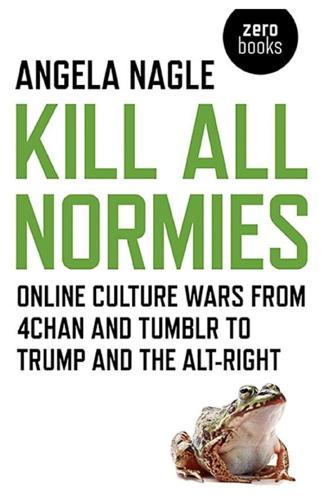
Kill All Normies: Online Culture Wars From 4Chan and Tumblr to Trump and the Alt-Right
by
Angela Nagle
Published 6 Jun 2017
Presumably thinking this was a ready-made hit-piece that would destroy his reputation, Bannon came across in the interview as darkly fascinating and, relative to many Buzzfeed listicle writers, as quite a serious and intriguing person. He spoke of ‘the crisis of capitalism’, secularization, the Islamization of the West, the immorality of crony capitalism and the destruction of the West’s Judeo-Christian heritage. Contrary to what Buzzfeed may have intended, it revealed a thinker who could not be further from the neoconservative or neoliberal establishments within the two major US parties, but instead as an anti-establishment figure with ambitious ideas.
…
In particular, class politics and social liberalism have not always sat comfortably together, nor did social conservatism with free-market economics for many decades until the neocons perfected the formula when in power. As Hartman reminds us, Christian figures like William Jennings Bryan merged concerns about the family with criticisms of capitalism, while before the 60s, American Prairie radicals organized under a populist banner against corporate monopolies and crony capitalism. Large numbers of workers joined trade unions in response to the Great Depression. Ideas of transgression and cultural radicalism were largely irrelevant to this working-class left. The 1962 Port Huron statement, the manifesto of the Students for a Democratic Society, contained a very different kind of message: ‘We are people of this generation, bred in at least modest comfort, housed now in universities, looking uncomfortably at the world we inherit.’
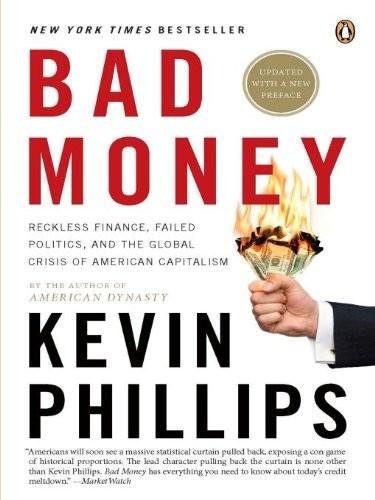
Bad Money: Reckless Finance, Failed Politics, and the Global Crisis of American Capitalism
by
Kevin Phillips
Published 31 Mar 2008
ONE Introduction The Panic of August We are living through the first crisis of our brave new world of securitised financial markets. It is too early to tell how economically important this upheaval will prove. But nobody can doubt its significance for the financial system. Its origins lie with credit expansion and financial innovation in the U.S. itself. It cannot be blamed on “crony capitalism” in peripheral economies, but rather on irresponsibility in the core of the world economy. —Martin Wolf, Financial Times, September 2007 The “crack cocaine” of our generation appears to be debt. We just can’t seem to get enough of it. And, every time it looks like the U.S. consumer may be approaching his maximum tolerance level, somebody figures out how to lever on even more debt using some new and more complex financing.
…
The nature of English-speaking capitalism as practiced especially by Wall Street but also by the City of London is drawing fire. Martin Wolf, the chief economic commentator at the Financial Times, noted at year’s end that “what is happening in credit markets today is a huge blow to the credibility of the Anglo-Saxon model of transactions-orientated financial capitalism. A mixture of crony capitalism and gross incompetence has been on display in the core financial markets of New York and London.”44 On the other side of the Atlantic, the iconic American investor Warren Buffett summarized his criticism: “You can’t turn a financial toad into a prince by securitizing it. . . . Wall Street started believing its own PR on this—they started holding this stuff themselves, maybe because they couldn’t sell it.
…
Connally, John ConocoPhillips Conservative Party, British Consumer Federation of America consumer price index (CPI) agflation and Boskin Commission and debasement of GDP and German hedonics in calculation of housing element of new methodology of Consumer Product Safety Commission consumer spending Corrigan, Gerald Corzine, Jon Coué, Émile Council of Economic Advisers Counter-Reformation Countrywide credit default swaps (CDSs) CreditSights Inc. crony capitalism Crudele, John Curzon, Lord Dalio, Raymond Das, Satyajit Davis, John W. Day of Reckoning (Friedman) debt credit card current account economic favoritism and EMH and expansion of federal bailouts and financial services sector and GDP and history of excessive LBOs and mortgage oil and in post-9/11 era private public in Reagan era see also mortgage crisis “Debt Explosion of the 1980s, The” (Synnott) Defense Department, U.S.
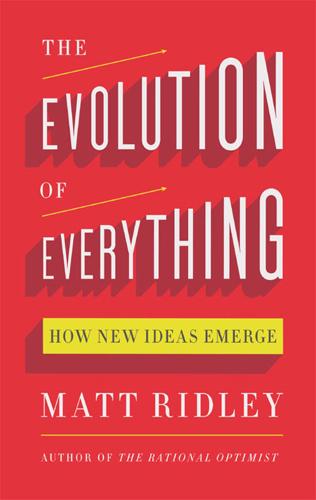
The Evolution of Everything: How New Ideas Emerge
by
Matt Ridley
Take six basic needs of a human being: food, clothing, health, education, shelter and transport. Roughly speaking, in most countries the market provides food and clothing, the state provides healthcare and education, while shelter and transport are provided by a mixture of the two – private firms with semi-monopolistic privileges supplied by government: crony capitalism, in a phrase. Is it not striking that the cost of food and clothing has gone steadily downwards over the past fifty years, while the cost of healthcare and education has gone steadily upwards? In 1969 the average American household spent 22 per cent of consumption expenditure on food and 8 per cent on clothing.
…
When Stockman was Ronald Reagan’s head of the Office of Management and Budget, he set out to strangle Fannie and Freddie by gradually forcing them to borrow at market rates. Horrified lenders, brokers, builders and suppliers joined in a ‘mighty coalition to keep private enterprise humming on cheap, socialized credit’. They lobbied Congress to stop him, and led by the Republicans, it did so. This was a paradigmatic case of crony capitalism in action against the free market. Meanwhile, commercial lenders were coming under pressure from groups like the Association of Community Organizers for Reform Now (ACORN) to lower their lending standards. ACORN discovered that in the period running up to the completion of a merger, when a date for completion had been set, such banks were highly vulnerable to lawsuits that claimed they were not complying with the 1977 Community Reinvestment Act, which forbade racial discrimination in lending.
…
To leave Fannie and Freddie out of the story of the Great Recession is impossible, and to omit the political mandates that drove them is unthinkable. They were from start to finish a top–down distortion of a bottom–up market. David Stockman in his book The Great Deformation is unsparing in his conclusion: ‘The Fannie Mae saga demonstrates that once crony capitalism captures an arm of the state, its potential for cancerous growth is truly perilous.’ Jeff Friedman, in a lengthy and influential essay on the financial crisis, came to a similar conclusion: ‘The financial crisis was caused by the complex, constantly growing web of regulations designed to constrain and redirect modern capitalism.’
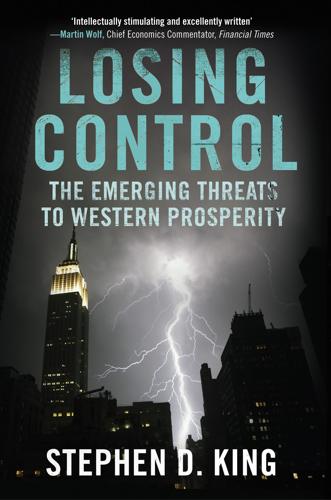
Losing Control: The Emerging Threats to Western Prosperity
by
Stephen D. King
Published 14 Jun 2010
At that time, many emerging economies ran current-account deficits. In other words, domestic investment was higher than domestic saving, requiring inflows of capital from abroad to balance the books. These capital inflows were too often invested in unsound property deals or corrupt business ventures, leading to accusations of ‘crony capitalism’. As foreign investors took fright, capital left Asia and headed elsewhere. Without the inflows, Asia could no longer maintain its earlier standard of living: demand fell, imports dropped, exchange rates plummeted and economies collapsed. The Asian crisis demonstrated two things. First, in their hunt for yield, Western investors were happy to chase returns regardless of the risks involved.
…
Should the credit crunch of 2007/8 be described as a success for soft knowledge? And should Asia’s relentless rise over the last sixty years – the greatest economic expansion of all time – be simply described as a multi-decade credit-fuelled flash-in-the-pan, a wealth-creating machine that will ultimately be brought to its heels by crony capitalism and silly bank lending? That, after all, is the argument. The claim that Asia and, indeed, other emerging economies offer no real threat to Western economic superiority strikes me, however, as absurd, for the reasons outlined in this book. Those who take comfort in the idea of the West’s destiny point to Japan’s stagnation since the 1990s, arguing that while Japan successfully caught up with the US and Western Europe economically, it never surpassed them, despite projections to the contrary.
…
(i) Canada (i), (ii), (iii) Canning, David (i) capital Asian economic growth (i) empires (i), (ii) inequalities (i), (ii), (iii), (iv) price stability (i) protectionism (i) resource scarcity (i) Spain and silver (i) state capitalism (i) trade (i), (ii), (iii) capital controls (i), (ii), (iii) capital flows see cross-border capital flows capital goods (i), (ii), (iii) capitalism (i), (ii), (iii), (iv) capital markets anarchy in capital markets (i) emerging nation war-chest (i) at the end of the rainbow (i) foreign-exchange reserves (i) gold rush revisited (i) the hole in the story (i) hunt for yield (i) Japan’s currency appreciation (i) liquidity and greed (i) mispricing of Western capital markets (i) no promised land (i) role of capital markets (i) economic integration, political proliferation (i), (ii), (iii) globalization (i) indulging the US no more (i), (ii), (iii), (iv) political economy and inequalities (i), (ii), (iii) resource scarcity (i), (ii) state capitalism (i) trade (i), (ii) the West’s diminished status (i), (ii), (iii) capital mobility (i), (ii), (iii), (iv), (v), (vi) car industry (i), (ii), (iii), (iv), (v), (vi), (vii) carry trades (i), (ii) Catholic Church (i) Ceauşescu, Nicolae (i) Celler, Emanuel (i) central banks capital controls (i) capital flows and nation states (i) price stability (i), (ii), (iii), (iv), (v), (vi), (vii) printing money (i) Central Europe (i), (ii), (iii), (iv), (v) Chang, Ha-Joon (i) Chelsea FC (i) Cheney, Dick (i) Chevron (i) China anarchy in capital markets (i), (ii), (iii), (iv), (v), (vi), (vii) currency (i) globalization (i), (ii) indulging the US no more (i), (ii), (iii) political economy and inequalities (i), (ii), (iii), (iv), (v), (vi), (vii) population demographics (i), (ii), (iii), (iv), (v) price stability (i), (ii), (iii), (iv) savings (i) scarcity (i), (ii), (iii), (iv), (v) secrets of Western success (i), (ii), (iii), (iv) state capitalism (i), (ii), (iii), (iv) trade (i), (ii), (iii) the West’s diminished status (i), (ii), (iii), (iv), (v), (vi), (vii), (viii) China National Offshore Oil Corporation (CNOOC) (i), (ii) Chinese Exclusion Act (1882) (i) choice (i), (ii), (iii), (iv), (v) Christianity (i), (ii), (iii) Chrysler (i) Clark, Gregory (i) classical economists (i) climate change (i), (ii), (iii), (iv), (v), (vi), (vii) coal (i) COFER (currency composition of official foreign exchange reserves) (i), (ii) Collier, Paul (i) colonialism (i), (ii), (iii) Columbus, Christopher (i), (ii) Comet jet airliner (i), (ii) Commission of the European Union (i) Committee on Foreign Investment in the United States (CFIUS) (i) commodity prices globalization (i) income inequality (i) a post-dollar financial order (i) price stability and economic instability (i), (ii), (iii), (iv), (v), (vi) savings (i) Spain and silver (i) state capitalism (i), (ii) Common Agricultural Policy (i) communications (i), (ii), (iii) communism capital markets (i) economic integration, political proliferation (i) fall of (i) political economy and inequalities (i) population demographics (i), (ii) scarcity (i), (ii) state capitalism (i) trade (i), (ii), (iii) the West’s diminished status (i), (ii), (iii) The Communist Manifesto (Marx and Engels) (i) Communist Party (i), (ii) comparative advantage political economy and inequalities (i), (ii), (iii) trade (i), (ii), (iii) the West’s diminished status (i), (ii) computers (i), (ii), (iii), (iv), (v) Congress of Vienna (i) Conservative Party (i) consumer prices (i), (ii), (iii), (iv) contraception (i), (ii), (iii), (iv), (v) ‘core’ inflation (i), (ii) corruption (i), (ii) Cortés, Hernando (i), (ii) Costa Rica (i) cotton industry (i), (ii) Cour de Cassation (i) credit (i), (ii), (iii), (iv), (v), (vi), (vii), (viii) credit crunch anarchy in capital markets (i), (ii), (iii), (iv) indulging the US no more (i), (ii) politics and economics (i), (ii), (iii) price stability and economic instability (i), (ii), (iii), (iv) state capitalism (i), (ii) the West’s diminished status (i), (ii), (iii) crime (i), (ii), (iii) Crimean War (i) ‘crony capitalism’ (i) cross-border capital flows anarchy in capital markets (i), (ii) capital flows and nation states (i), (ii), (iii) comparative advantage (i) economic integration, political proliferation (i) economic models (i), (ii) globalization (i), (ii) Japan (i) price stability and economic instability (i), (ii) the West’s diminished status (i), (ii), (iii) Cuba (i), (ii) Cultural Revolution (i), (ii), (iii) currency capital markets (i), (ii), (iii), (iv), (v) economic integration, political proliferation (i) indulging the US no more (i), (ii), (iii), (iv), (v) monetary union (i), (ii), (iii) price stability and economic instability (i), (ii), (iii), (iv), (v), (vi), (vii) protectionism (i) single capital market and many nations (i), (ii) state capitalism (i) current account (balance of payments) (i), (ii), (iii), (iv), (v), (vi) current-account deficit (i), (ii), (iii), (iv), (v), (vi) current-account surplus capital markets (i), (ii), (iii), (iv), (v), (vi) indulging the US no more (i), (ii) resource scarcity (i) state capitalism (i), (ii), (iii), (iv), (v) Cyprus (i) Czechoslovakia (i) Czech Republic (i), (ii), (iii), (iv) debt capital markets (i), (ii), (iii) globalization (i) indulging the US no more (i), (ii), (iii), (iv) political economy and inequalities (i) population ageing (i) price stability and economic instability (i) state capitalism (i), (ii) deflation (i), (ii), (iii) demand-management policies (i), (ii), (iii) democracy (i), (ii), (iii), (iv), (v), (vi), (vii), (viii) demographic deficit (i), (ii), (iii) demographic dividend (i), (ii), (iii) demographic profile (i), (ii), (iii) Deng Xiaoping (i), (ii), (iii) dependency ratios (i), (ii), (iii), (iv) Depression see Great Depression Desai, Meghnad (i) Deutsche Mark (i), (ii), (iii) developed world capital markets (i), (ii), (iii) globalization (i) political economy and inequalities (i), (ii), (iii), (iv) population demographics (i), (ii), (iii), (iv), (v), (vi), (vii) price stability and economic instability (i), (ii) state capitalism (i), (ii), (iii), (iv) trade (i), (ii), (iii), (iv), (v) diet (i), (ii), (iii), (iv), (v), (vi) see also food diversification (i), (ii) division of labour (i) dollar see US dollar Dominican Republic (i) dot.com bubble (i), (ii) drugs (i), (ii), (iii) Dubai Ports World (DP World) (i), (ii) Dutch East India Company (i), (ii) East Asia (i), (ii) Eastern Europe capital markets (i), (ii) migration (i), (ii), (iii) scarcity (i) state capitalism (i) the West’s diminished status (i), (ii), (iii) East Germany (i), (ii), (iii), (iv), (v) East India Company (i), (ii), (iii), (iv), (v), (vi), (vii) Economic Consequences of the Peace (Keynes) (i), (ii), (iii) economic crisis see also Asian economic crisis anarchy in capital markets (i), (ii) economic instability (i) price stability and economic instability (i), (ii) state capitalism (i) trade (i), (ii) economic growth capital markets (i), (ii), (iii) demographic dividends and deficits (i) globalization (i), (ii), (iii) political economy and inequalities (i), (ii), (iii) a post-dollar financial order (i) price stability and economic instability (i), (ii), (iii), (iv) scarcity (i), (ii), (iii), (iv), (v), (vi) trade (i), (ii) US domestic reform (i) economic instability (i), (ii), (iii), (iv), (v), (vi), (vii) economic models (i), (ii), (iii) economic rent (i), (ii), (iii), (iv), (v), (vi) economics (i), (ii), (iii), (iv), (v) economies of scale (i), (ii), (iii) The Economist (i) Ecuador (i) EdF (Électricité de France) (i), (ii) education capital markets (i) migration (i), (ii), (iii) political economy and inequalities (i), (ii), (iii), (iv) resource scarcity (i) state capitalism (i) Eichengreen, Barry (i), (ii) elderly population (i), (ii), (iii), (iv), (v) electricity (i) Elizabeth II, Queen (i) Ellis Island (i), (ii) emerging economies anarchy in capital markets (i), (ii), (iii), (iv), (v) globalization (i), (ii), (iii), (iv), (v) indulging the US no more (i), (ii), (iii), (iv), (v), (vi) political economy and inequalities (i), (ii), (iii), (iv), (v) population demographics (i), (ii), (iii), (iv), (v), (vi) price stability and economic instability (i), (ii), (iii), (iv), (v) scarcity (i), (ii), (iii), (iv) secrets of Western success (i), (ii), (iii), (iv), (v), (vi), (vii) state capitalism (i), (ii), (iii), (iv), (v), (vi), (vii) trade (i), (ii), (iii), (iv), (v) Western progress (i), (ii), (iii) the West’s diminished status (i), (ii), (iii), (iv), (v) ‘enabling’ resources (i), (ii), (iii), (iv) The End of History (Fukuyama) (i) energy supplies political economy and inequalities (i), (ii), (iii), (iv) politics and economics (i) price stability and economic instability (i), (ii), (iii), (iv), (v), (vi) resource scarcity (i), (ii) Russian power politics (i) Spain and silver (i) state capitalism (i), (ii), (iii) the West’s diminished status (i), (ii), (iii) Engels, Friedrich (i) England (i), (ii), (iii) English language (i) English Premier League (i), (ii), (iii) Enlightenment (i), (ii), (iii), (iv), (v), (vi) Enron (i) Entente Cordiale (i) equities anarchy in capital markets (i), (ii), (iii), (iv), (v) population ageing (i), (ii), (iii) a post-dollar financial order (i) price stability and economic instability (i), (ii), (iii), (iv), (v) savings (i) An Essay on the Principle of Population (Malthus) (i), (ii), (iii) EU see European Union euro (i), (ii), (iii), (iv), (v), (vi), (vii), (viii) Europe political economy and inequalities (i), (ii) population demographics (i), (ii), (iii), (iv), (v) price stability and economic instability (i), (ii), (iii) secrets of Western success (i), (ii), (iii), (iv), (v) Spain and silver (i) state capitalism (i), (ii) trade (i), (ii) the West’s diminished status (i), (ii), (iii), (iv), (v), (vi) European Central Bank (i), (ii), (iii), (iv) European Union (EU) economic integration, political proliferation (i), (ii) migration (i), (ii), (iii) state capitalism (i) trade (i) the West’s diminished status (i), (ii), (iii), (iv), (v), (vi) exchange rates anarchy in capital markets (i), (ii), (iii), (iv), (v), (vi) income inequality (i) price stability and economic instability (i), (ii), (iii), (iv), (v), (vi), (vii) sovereign wealth funds (i) the West’s diminished status (i) exports China (i), (ii) political economy and inequalities (i) price stability and economic instability (i), (ii), (iii) state capitalism (i), (ii) trade (i), (ii), (iii), (iv) Eyser, George (i) Fannie Mae (i) Federal Open Markets Committee (FOMC) (i), (ii) Federal Reserve anarchy in capital markets (i), (ii), (iii) economic integration, political proliferation (i) price stability and economic instability (i), (ii), (iii), (iv), (v), (vi) the West’s diminished status (i), (ii), (iii) Ferrari (i) fertility rates (i), (ii), (iii), (iv), (v), (vi) Fidelity International (i) financial services industry (i), (ii), (iii), (iv) Finland (i) First World War (i), (ii), (iii), (iv), (v), (vi) FOMC see Federal Open Markets Committee food political economy and inequalities (i), (ii), (iii), (iv) price stability and economic instability (i), (ii), (iii), (iv), (v) rent-seeking behaviour (i) resource scarcity (i), (ii) savings (i) state capitalism (i), (ii), (iii) the West’s diminished status (i), (ii), (iii) Forbes.com (i) foreign direct investment anarchy in capital markets (i), (ii) income inequality (i) population demographics (i), (ii) trade (i), (ii), (iii), (iv), (v) foreign-exchange reserves anarchy in capital markets (i), (ii), (iii), (iv), (v), (vi), (vii) indulging the US no more (i), (ii), (iii), (iv), (v) price stability and economic instability (i) single capital market and many nations (i) state capitalism (i), (ii), (iii), (iv) fossil fuels (i) France economic integration, political proliferation (i), (ii) indulging the US no more (i), (ii) Louisiana Purchase (i), (ii) political economy and inequalities (i), (ii) population demographics (i) state capitalism (i), (ii), (iii), (iv), (v), (vi) trade (i) the West’s diminished status (i), (ii) Frank, Barney (i) Freddie Mac (i) freedom of speech (i), (ii) free market (i), (ii), (iii), (iv), (v), (vi) free trade (i), (ii), (iii), (iv), (v) Friedman, Milton (i), (ii), (iii) Friedman, Thomas (i) Fu Chengyu (i) fuel (i), (ii), (iii), (iv) Fukuyama, Francis (i) fund managers (i), (ii), (iii), (iv) G7 (i), (ii), (iii), (iv), (v) G8 (i), (ii), (iii) G20 (i), (ii), (iii), (iv), (v), (vi), (vii) Gagon, Joseph E.
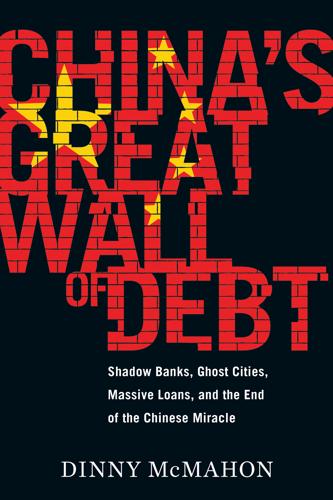
China's Great Wall of Debt: Shadow Banks, Ghost Cities, Massive Loans, and the End of the Chinese Miracle
by
Dinny McMahon
Published 13 Mar 2018
And it nurtures state-owned champions at home with monopolies and other perks before sending them abroad to buy resources and strategically useful infrastructure. Still, an economy in which private companies can summon government thugs to do their bidding might best be described as crony capitalism. Certainly corruption appears to still be rampant, despite President Xi Jinping’s multiyear anticorruption campaign, and officials and private business continue to have complex—and mutually beneficial—relationships. Yet crony capitalism, state capitalism, and free-market capitalism all fail—both individually and in the aggregate—to sufficiently describe the nature of the Chinese economy. Markets thrive, but the presence of the government is ubiquitous.
…
apartments and villas: Benjamin Kang Lim and Ben Blanchard, “Exclusive: China Seizes $14.5 Billion Assets from Family, Associates of Ex-Security Chief: Sources,” Reuters, March 30, 2014, http://www.reuters.com/article/us-china-corruption-zhou-idUSBREA2T02S20140330. mines and property developments: Minxin Pei, China’s Crony Capitalism: The Dynamics of Regime Decay (Cambridge, Mass.: Harvard University Press, 2016), 2. “life of the party”: “党内不能存在形形色色的政治利益集团” [Political vested interests cannot exist inside the Party], Ministry of Supervision of People’s Republic of China, January 12, 2016, http://www.ccdi.gov.cn/yw/201601/t20160112_72582.html.
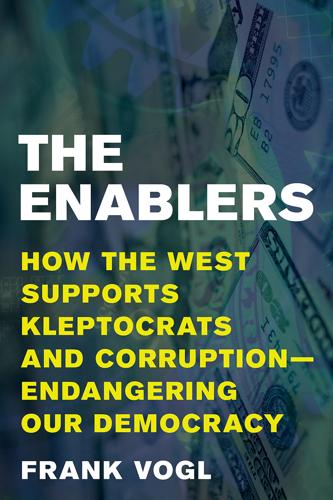
The Enablers: How the West Supports Kleptocrats and Corruption - Endangering Our Democracy
by
Frank Vogl
Published 14 Jul 2021
See, for example: The late Professor Karen Dawisha’s landmark study, Putin’s Kleptocracy: Who Owns Russia? published in 2014 by Simon and Schuster. Putin’s People: How the KGB Took Back Russia and Then Took On the West by Catherine Belton, published in 2020 by Farrar, Straus and Giroux. Russia’s Crony Capitalism: The Path from Market Economy to Kleptocracy, by Anders Aslund, published in 2019 by Yale University Press. Also see the numerous studies by the Hudson Institute’s Kleptocracy Initiative, including: “How Non-State Actors Export Kleptocratic Norms to the West,” by Ilya Zaslavsky, published in 2017.
…
Many authors have written on the subject, from the sweeping Why Nations Fail by Daron Acemoglu and James Robinson, 2012, published by Crown Business; to the excellent post-2008 financial crisis volume The Fate of the West by former editor of The Economist Bill Emmott 2017, published by Profile Books; to the 2020 book Twilight of Democracy: The Seductive Lure of Authoritarianism by Anne Applebaum, published by Doubleday. 5. The Council of Europe’s Group of States Against Corruption (GRECO) website is an invaluable source of reporting on corruption across Europe. 6. For a detailed examination of corruption perpetrated by President Putin and his associates, see, for example, Russia’s Crony Capitalism: The Path from Market Economy to Kleptocracy, by Anders Aslund. Published in 2019 by Yale University Press. 7. BBC news report July 2, 2020, headline: “Putin Strongly Backed in Controversial Russian Reform Vote.” 8. New York Times, article by Andrew Higgins, October 2, 2019, headline: “Russia Couldn’t Stop This Putin Critic.
…
Andersen, Jørgen, Juel Niels Johannesen, and Bob Rijkers. “Elite Capture of Foreign Aid: Evidence from Offshore Bank Accounts.” World Bank Policy Research Paper 9150. 2020. Applebaum, Anne. Twilight of Democracy: The Seductive Lure of Authoritarianism. Doubleday. 2020. Aslund, Anders. Russia’s Crony Capitalism: The Path from Market Economy to Kleptocracy. Yale University Press. 2019. Baker, Raymond. Capitalism’s Achilles Heel: Dirty Money and How to Renew the Free-Market System. John Wiley & Sons. 2005. Bean, Elise. Financial Exposure: Carl Levin’s Senate Investigations into Finance and Tax Abuse.
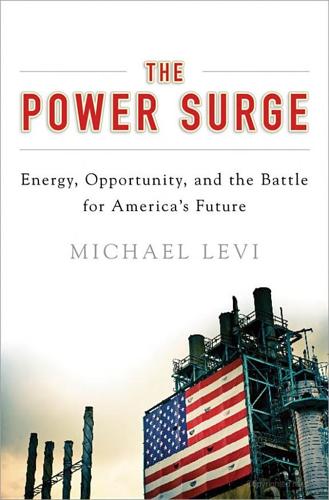
The Power Surge: Energy, Opportunity, and the Battle for America's Future
by
Michael Levi
Published 28 Apr 2013
Solyndra, they said, existed only because government bureaucrats had handed it hundreds of millions of taxpayer dollars. At best, its executives squandered that money, in the process destroying more than a thousand jobs. At worst, some pundits and political operatives darkly suggested, the pile of cash was an invitation to crony capitalism, with money simply steered to the president’s political friends.20 Here, in one small company, was everything that many people found wrong with alternative energy. The technology was nowhere close to being ready to compete with fossil fuels. This meant it required so much government intervention that corruption and incompetence were inevitable results.
…
But it is far from clear that governments are much good at identifying them. Government analysts evaluating projects for potential support don’t face the same financial incentives to get things right that private sector financiers do. Worse, this all can quickly be compounded by politics. That doesn’t require anything nefarious, like the debunked claims of crony capitalism surrounding Solyndra; it simply requires governments and their agencies to seek their own survival, as they are wont to do. Regular failures of government-backed companies make for awful politics, so in the long run big-ticket risk-taking government programs are rare. Instead, those programs often end up supporting less-than-innovative activities; alternatively, they sometimes just die.
…
Section=Home&TEMPLATE=/CM/ContentDisplay. cfm&CONTENTID=65139. 19. Chris Gentilviso, “President Obama Visits Green Energy Start-Up Solyndra,” Time.com, May 26, 2010, http://newsfeed.time.com/2010/05/26/ president-obama-visits-green-energy-start-up-solyndra/. 20. Seema Mehta, “Romney Accuses Obama of ‘Crony Capitalism’ in Solyndra Trip,” Los Angeles Times, May 31, 2012. 21. Clean Energy Ministerial, “Energy Ministers Announce Achievements and Actions for a Clean Energy Future at CEM3,” 2012, http://www. cleanenergyministerial.org/MediaPublications/Newsletters/Summer2012/TopStory1.aspx. 22. Krister Aanesen, Stefan Heck, and Dickon Pinner, Solar Power: Darkest before Dawn (New York: McKinsey and Company, May 2012). 23.
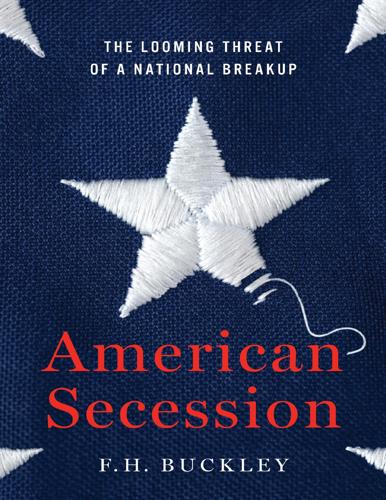
American Secession: The Looming Threat of a National Breakup
by
F. H. Buckley
Published 14 Jan 2020
—Allen Guelzo An important and provocative book. —Michael Ledeen, Front Page Magazine Frank Buckley is one of the most astute observers of the modern American scene. —Deroy Murdock Praise for The Republic of Virtue Bracing stuff … his writing is lucid and often witty. —Wall Street Journal Political corruption, in the form of crony capitalism, is a silent killer of our economy. Frank Buckley’s new book shows how we can rein it in and help restore the Republic. —William Bennett, former Secretary of Education This is Buckley at his colorful, muckraking best—an intelligent, powerful, but depressing argument laced with humor. —Gordon S.
…
Politically connected banks received larger bailouts than financial institutions that spent less on lobbying or political contributions. Benjamin M. Blau, “Central Bank Intervention and the Role of Political Connections,” Mercatus Center, George Mason University, October 2013. 18 Malcolm S. Salter, “Crony Capitalism American Style: What Are We Talking About Here?” Harvard Business School Working Paper 15-025 (October 22, 2014). See Timothy P. Carney, The Big Ripoff: How Big Business and Big Government Steal Your Money (Hoboken, N.J.: John Wiley, 2006). 19 Cheol Liu and John L. Mikesell, “The Impact of Public Officials’ Corruption on the Size and Allocation of U.S.
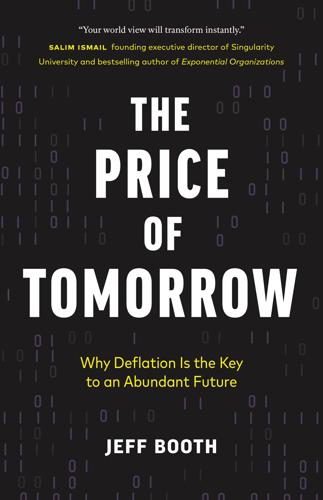
The Price of Tomorrow: Why Deflation Is the Key to an Abundant Future
by
Jeff Booth
Published 14 Jan 2020
I still believe that. I also believe in capitalism, where risk is rewarded and punished, and where the free market is the ultimate referee of your value. That is why it pains me so much to see it breaking down. A market where government reaches in to decide who wins or loses is nothing more than crony capitalism, where wealth is not created by the value you create and the risks you take to get there but by a political system that rewards its insiders. And for every person on the winning side of that decision, there are many others on the losing side. Their costs of food, shelter, gas, and healthcare are rising because their cash and wages are less valuable.
…
The rise of fiat currencies that could be manipulated domestically and the bailout in 2008 changed that strategy to one where the players whose bad bets caused the crisis, instead of being wiped out, were rewarded handsomely. Capitalism’s long-dominant cooperative strategy was replaced by a non-dominant strategy, crony capitalism, where the cheaters won. Perhaps, because it seems that there is a bias for cooperation most of the time, we will find a way to bring harmony to our world over time. With the will of the many, and the right incentive structures, societies might just be able to find a way to limit their exposure to the negative effects of non-cooperation.
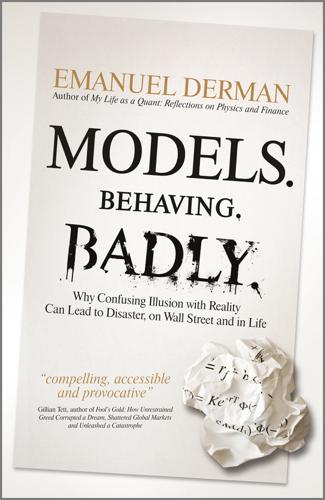
Models. Behaving. Badly.: Why Confusing Illusion With Reality Can Lead to Disaster, on Wall Street and in Life
by
Emanuel Derman
Published 13 Oct 2011
The great financial crisis has been marked by the failure of models both qualitative and quantitative. During the past two decades the United States has suffered the decline of manufacturing; the ballooning of the financial sector; that sector’s capture of the regulatory system; ceaseless stimulus whenever the economy has wavered; taxpayer-funded bailouts of large capitalist corporations; crony capitalism; private profits and public losses; the redemption of the rich and powerful by the poor and weak; companies that shorted stock for a living being legally protected from the shorting of their own stock; compromised yet unpunished ratings agencies; government policies that tried to cure insolvency by branding it as illiquidity; and, on the quantitative side, the widespread use of obviously poor quantitative security valuation models for the purpose of marketing.
…
Everyone should understand the difference between a model and reality and be unastonished at the inability of oneor two-inch equations to represent the convolutions of people and markets. What did shock and disturb me was the abandonment of the principle that everyone had paid lip service to: the link between democracy and capitalism. We were told not to expect reward without risk, gain without the possibility of loss. Now we have been forced to accept crony capitalism, private profits and socialized losses, and corporate welfare. We have seen corporations treated with the kindness owed to individuals and individuals treated pragmamorphically, as things. When models in physics fail, they fail precisely, and often expose a paradox that opens a door. When models in the social sciences fail, they fail bluntly, with no hint as to what went wrong and no clue as to what to do next.
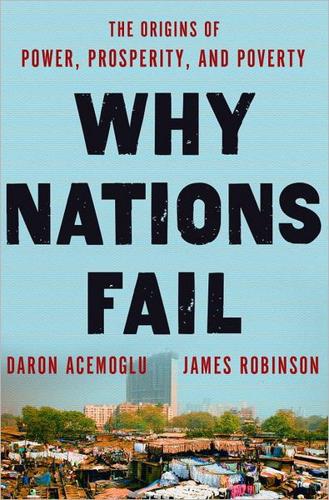
Why Nations Fail: The Origins of Power, Prosperity, and Poverty
by
Daron Acemoglu
and
James Robinson
Published 20 Mar 2012
When Egypt changed sides in the cold war and became pro-Western, it was therefore relatively easy, as well as expedient, for the Egyptian military to change from central command to crony capitalism as a method of extraction. Even so, the better economic performance of Egypt compared with North Korea was a consequence of the more limited extractive nature of Egyptian institutions. For one thing, lacking the stifling control of the North Korean Communist Party, the Egyptian regime had to placate its population in a way that the North Korean regime does not. For another, even crony capitalism generates some incentives for investment, at least among those favored by the regime, that are totally absent in North Korea.
…
These structures themselves were the outcome of a long vicious circle that featured lack of political centralization and the disastrous effects of the slave trade. In Zimbabwe, there was much more of a construction of a new form of extractive institutions, because the British South Africa Company created a dual economy. Uzbekistan could take over the extractive institutions of the Soviet Union and, like Egypt, modify them into crony capitalism. The Soviet Union’s extractive institutions themselves were in many ways a continuation of those of the tsarist regime, again in a pattern predicated on the iron law of oligarchy. As these various vicious circles played out in different parts of the world over the past 250 years, world inequality emerged, and persists.
…
Our discussion of child labor and its use for picking cotton in Uzbeksitan follows Kandiyoti (2008), available at www.soas.ac.uk/cccac/events/cotton-sector-in-central-asia-2005/file49842.pdf. The quote from Gulnaz is on p. 20 of Kandiyoti. On the Andijon uprising, see International Crisis Group (2005). The description of the election of Joseph Stalin in the Soviet Union is reproduced from Denny (1937). Our analysis of “crony capitalism” in Egypt follows Sfakianakis (2004). CHAPTER 14 : BREAKING THE MOLD Our treatment of Botswana follows Acemoglu, Johnson, and Robinson (2003); Robinson and Parsons (2006); and Leith (2005). Schapera (1970) and Parsons, Henderson, and Tlou (1995) are fundamental works. High Commissioner Rey is quoted in Acemoglu, Johnson, and Robinson (2003), p. 96.

Manias, Panics and Crashes: A History of Financial Crises, Sixth Edition
by
Kindleberger, Charles P.
and
Robert Z., Aliber
Published 9 Aug 2011
Several senior officials of the august Ministry of Finance were entertained at a ‘pantyless shabu-shabu restaurant’ that had a mirrored floor; the suspicion was that these officials provided advance information to their hosts about impending changes in financial regulations. When the real estate bubbles in Thailand and Malaysia and the other nearby Asian countries imploded and the banks incurred large losses, ‘crony capitalism’ suddenly appeared – favored treatment for certain borrowers that somehow had not been evident in the earlier years of exuberant economic growth. Indonesia had been a ‘Suharto family business’ for more than thirty years – and remarkably successful measured by the increase in its GDP. When Indonesia was doing well, the banks were happy to make loans to the business enterprises headed by President Suharto’s children – indeed some of the banks were headed by his children.
…
The closing of many banks in Indonesia triggered racial strife, and an immense run on the currency which lost more than 70 percent of its value. When the crises occurred, the play script was a reprise of similar events in Japan in the previous decade. The chatter about the East Asian miracle disappeared and new buzzwords arose – crony capitalism, spontaneous privatization, and destabilizing speculation. The sharp depreciation of the currencies led to significant losses for those firms that had borrowed US dollars or Japanese yen or some other foreign currency. The banks that had lent to these firms also incurred losses; the banks in most of the Asian countries toppled into bankruptcy because of their own revaluation losses and the losses of the firms to which they had made loans.
…
The East Asian crisis of 1997 The financial crisis in East Asia that started in July 1997 involved euphoric lenders in developed countries keen on diversifying their portfolios, and developing-country borrowers that wanted to increase their investments and their growth rates and that had been pushed by industrial countries to deregulate their financial markets. Other factors included crony capitalism in Indonesia, weak government in Thailand, enormous conglomerates (chaebol) in South Korea, and many bad bank loans. The catatonic state of economic policy in Japan robbed the area of what had been a strong source of demand, and the expansion of Japanese direct investment into lower-wage areas and of Japanese bank loans contributed to the increases in the current account deficits in these countries.
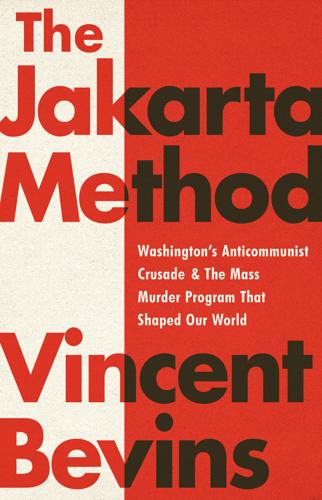
The Jakarta Method: Washington's Anticommunist Crusade and the Mass Murder Program That Shaped Our World
by
Vincent Bevins
Published 18 May 2020
“She didn’t know what it is like to lose everything, to wake up and feel her belly eating itself… without absolute concentration, one could easily slip, tumble backward.”2 There’s a term that broadly describes this kind of economic arrangement. The people of Indonesia and Brazil lived under “crony capitalism.” This was a very different reality from that of Washington’s European, capitalist allies. Francisca and her family arrived in Holland in 1968, and saw immediately how different Western Europe’s dynamic, successful societies were from the Suharto regime. The Communist Party had won a few seats in the most recent Dutch election, and participated in Parliament.
…
Military units fanned out to arrest opposition leaders, the first of whom was the Liberal Party Senator Benigno Aquino Jr. Suharto already had an anticommunist ally in Marcos, but now he—and Washington—had a friendly authoritarian regime in Southeast Asia’s second most-populous country. Marcos, with active US support, created his own version of crony capitalism with record-setting levels of corruption. He went on to kill thousands of people, often dumping their bodies in public in order to terrorize his enemies.46 Marineros Constitucionalistas As 1973 started, Pedro Blaset was twenty-three, a working-class sailor in Chile’s traditionally more upper-class, conservative Navy.
…
“In an historical sense—and especially as seen from the South—the Cold War was a continuation of colonialism through slightly different means,” writes Odd Arne Westad. “The new and rampant interventionism we have seen after the Islamist attacks on America in September 2001 is not an aberration but a continuation—in a slightly more extreme form—of US policy during the Cold War.”64 In Africa, the civil wars ended in different ways, but crony capitalism and resource extraction became the rule almost everywhere.65 In Eastern Europe, the collapse of communism was not as clean a process as the West often believed. Nury, the daughter of Sukarno’s ambassador to Cuba, had moved to Bulgaria with her Bulgarian husband after she left Fidel’s care in Havana.
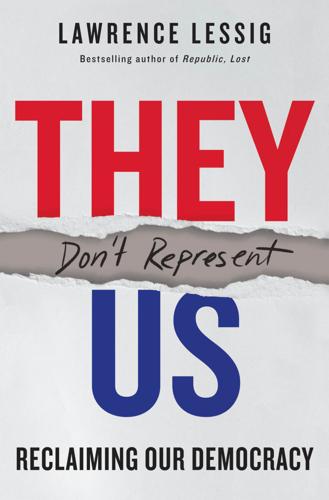
They Don't Represent Us: Reclaiming Our Democracy
by
Lawrence Lessig
Published 5 Nov 2019
Raskin and John Bonifaz, The Wealth Primary (Washington, DC: Center for Responsive Politics, 1994). 124.Bernie Sanders, “A World for All of Us, Not Just the Billionaires,” Nation, June 21, 2018, available at link #77. 125.Tad Dehaven, “Corporate Welfare and the Global Economic Crisis,” Policy Analysis no. 703 (July 25, 2012), available at link #78; Jason Brennan, “The Right to Good Faith: How Crony Capitalism Delegitimizes the Administrative State,” Georgetown Journal of Law & Public Policy 317, 334 (2013); Malcolm S. Salter, “Crony Capitalism, American Style: What Are We Talking About Here?,” Harvard Edmond J. Safra Center for Ethics, Working Papers No. 50 (October 22, 2014). 126.Benjamin I. Page, Jason Seawright, and Matthew J. Lacombe, Billionaires and Stealth Politics (Chicago: University of Chicago Press, 2018). 127.See Theda Skocpol and Vanessa Williamson, The Tea Party and the Remaking of Republican Conservatism (Oxford: Oxford University Press, 2016). 128.Indeed, the median household income of the twenty smallest states is below the median household income of the top twenty.
…
But if the technique of suppressing the vote of your opponent were open and notorious, the beneficiaries would turn on local political control, and not the economic interests of the most wealthy. What these five differently distorting inequalities do together is not easy to predict. Along some vectors—tax cuts—they may be additive. But along a wide range of issues, they conflict. Tea Party Republicans hate crony capitalism. The rich don’t. Swing-state Democrats turn a blind eye to steel tariffs. Democrats generally don’t. Rather than a bias that runs in an obvious direction, the sum of these different inequalities bends consistently in no particular direction. This is not the physics of a plutocracy. It is the dynamic of a vetocracy—a “veto-ocracy,” as Francis Fukuyama puts it.129 As Fukuyama describes, the American Constitution already embeds many veto points for any substantial legislation.
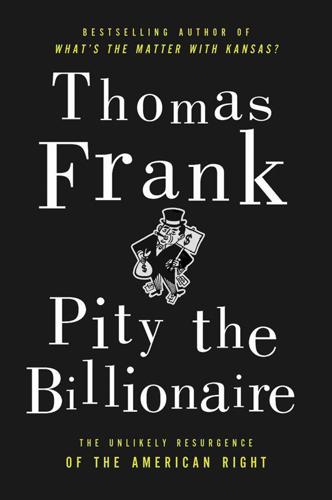
Pity the Billionaire: The Unexpected Resurgence of the American Right
by
Thomas Frank
Published 16 Aug 2011
When the system is corrupted, as it obviously was in the case of the bailouts—and the subprime lending spree, and the West Virginia mine disaster, and the BP oil spill—the obvious answer is to clean up government so it can perform its police function properly. But that’s not how the revivified Right understands things. Instead, they blast the entire structure of the modern economy as “crony capitalism” or “socialism” and find, conveniently, that we can only cure its ills by doing away with the big-government side of the equation—with the regulating and taxing and pension-giving side. And thus are our choices spread before us. On the one hand, the small-business utopia; on the other, “socialism.”
…
The Tea Partiers aren’t the pawns of big business; because they believe in markets, they’re the sworn enemies of big business. Got that? And the way they’re going to take their revenge on the crony-capitalist behemoth is by attacking government. Recall, again, Paul Ryan’s famous Forbes essay, “Down with Big Business.” In it this conservative’s conservative painted a noxious picture of “crony capitalism,” telling us how lobbyists for the biggest firms cut deals with government and secured favors like the hated TARP, which Ryan called “an ad hoc, opaque slush fund for large institutions that are able to influence the Treasury Department’s investment decisions behind-the-scenes.” Which was accurate enough.
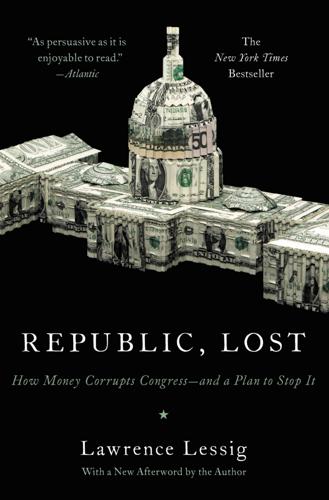
Republic, Lost: How Money Corrupts Congress--And a Plan to Stop It
by
Lawrence Lessig
Published 4 Oct 2011
What wins in the market is too often not what “a free market” would choose, but what a market bent by tariffs and subsidies and endless incumbency protective regulation defaults to. Call that “crony capitalism.” Our tax system is an abysmal inefficient mess not because of idiots at the IRS or on the Joint Committee on Taxation, but because crony capitalists pay top dollar to distort the system to their benefit. We don’t have real financial reform, because millions have been spent to protect bloated banks. We don’t have real health care reform, because the insurance companies and pharmaceutical companies had the power to veto any real change to the insanely inefficient status quo. Adam Smith never defended crony capitalism. Neither did Friedrich Hayek, or Milton Friedman, or William F.
…
“No conspiracy was necessary,” as Simon Johnson and James Kwak put it in their 2010 book, 13 Bankers: “By 1998, it was part of the worldview of the Washington elite that what was good for Wall Street was good for America.”52 As Raghuram Rajan writes, “Cognitive capture is a better description of this phenomenon than crony capitalism.”53 Still, pure ideas are not the whole story. Not by a long shot. The campaign to deregulate the financial services sector was a campaign, even if it was also an ideology. When it began, none could have thought it would succeed. But soon after it began, as I describe in chapter 9, both Democrats and Republicans alike became starved for campaign funds.
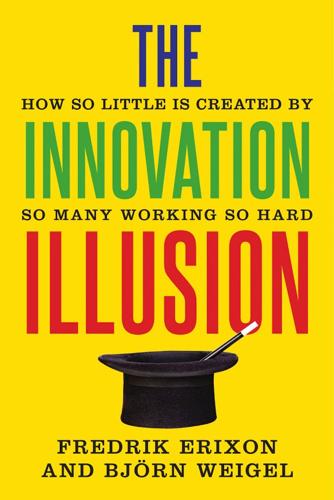
The Innovation Illusion: How So Little Is Created by So Many Working So Hard
by
Fredrik Erixon
and
Bjorn Weigel
Published 3 Oct 2016
Anchored among incumbents’ existing structures, regulation all too often helps to saturate or cement markets. While many existing firms complain about the effects of regulations, they know how to manage business under them and, if they are skilled operators, they can turn government interventions in their favor. In the extreme form, the relation between regulator and business mutates into crony capitalism. “In much of the world,” writes economist Luigi Zingales, “the best way to make lots of money is not to come up with brilliant ideas and work hard at implementing them but, instead, to cultivate a government ally.”9 Surveying the battlefields of political lobbying, this rings true. It is not an unfamiliar thought that cronyism is an important part of Western economies – and perhaps it has been for a long time.
…
Chance character (i), (ii) Belgium profit margins (i) taxi services and regulation (i) Bell, Alexander Graham (i), (ii) Bell Labs (AT&T) (i) Bellamy, Edward (i) Bellman, Richard (i) benchmarking (i), (ii) benefits, and incomes (i) Benz, Karl (i) Bergman, Ingmar (i) Berkshire Hathaway (i) Berle, Adolf (i) Berra, Yogi (i) Bezos, Jeff (i) Bhide, Amar (i) big firms big firm market dominance (i) and investment allocation for innovation (i) and private standards (i) relative importance of in European countries (i) reputation of (i) see also firm boundaries; firms; multinational (global) companies “big swinging dicks” (i) big-data business models (i) biofuels and EU regulation (i) see also energy sector biotechnological sector, and EU regulation (i) Bismarck, Otto von (i) bitcoin (i) BlackBerry (i) blackboard economics (i) Blackrock (i) blockchain (mutual distributed ledger) technology (i) Blue Ribbon Commission (US) (i) The Blues Brothers (movie) (i) boom and bust cycles (i), (ii), (iii) boomer (or baby boomer) generation (i), (ii), (iii), (iv) Boston Consulting Group index of complicatedness (i) on performance imperatives (i) on working time of managing teams (i) branding (i), (ii) Brazil and BRIC concept (i), (ii) taxi services and regulation (i) BRIC as a Bloody Ridiculous Investment Concept (i) countries (Brazil, India, Russia, and China) (i), (ii) Bridgewater (i) Brin, Sergey (i) Britain see United Kingdom (UK) British managerialism (i) Brockovich, Erin (i) Brookings (i) Brown, Gordon (i) Brynjolfsson, Erik, The Second Machine Age (Brynjolfsson and McAfee) (i), (ii) budget process, and compliance officers (i) Buffett, Warren (i), (ii) bureaucracy and capitalism (i), (ii) and competition (i) and compliance officers (i) and globalization (i), (ii), (iii), (iv) and IBM (i) and index of complicatedness (Boston Consulting Group) (i) and Indian economy (i) and managerialism (i), (ii), (iii) and organizational diversification (i) and principal–agent debate (i) and socialism (i) see also bureaucracy brake; bureaucrats; corporate managerialism; managerialism bureaucracy brake, and regulation (Germany) (i) bureaucrats vs. entrepreneurs (i), (ii) see also bureaucracy; bureaucracy brake Burning Man festival (Nevada) (i) Burns, Scott, The Clash of Generations (Kotlikoff and Burns) (i) business-building skills, vs. financial skills (i) business cycles, and productivity (i) business development, and strategy (i), (ii) business information technology (IT) services (i) business investment and cash hoarding (i) and corporate net lending (i), (ii) declining trend (i) explanations for decline (i) and financial regulation (i), (ii) and gray capitalism (i) investment allocation for innovation and big firms (i) low investment growth vs. fast corporate borrowing growth (i) measuring issues (i) and mergers and acquisitions (i) and policy uncertainty (i), (ii) and shareholders (i), (ii), (iii) UK business investment (i), (ii) US business investment (i), (ii) see also asset managers; investment; R&D business management (i), (ii) see also corporate managerialism business productivity growth (i) Business Week, on Peter Drucker (i) CAC 40 index (France) (i) cadmium (i), (ii) Canada diffusion of innovations (i) GDP figures (i) North American Free Trade Agreement (i) cancer research, and innovation (i), (ii) capital accumulation, and capitalism (i) capital expenditure (capex) (i), (ii), (iii), (iv)n39 capital markets (external) (i), (ii), (iii), (iv), (v) capitalism and agency (i) and asset bubbles (i) and bureaucracy (i), (ii) and capital accumulation (i) “complex by design” capitalism (i) criticism of Western capitalism (i) crony capitalism (i) death of capitalism utopia and socialism (i) decline of Western capitalism (i) and digital age (i) and dissent (i), (ii), (iii) and eccentricity (i), (ii), (iii), (iv), (v) and economic dynamism (i), (ii), (iii) and Enlightenment (i), (ii) and entrepreneurship (i), (ii) financial capitalism (i), (ii), (iii), (iv) free-market capitalism (i) and individual freedom (i), (ii), (iii) and innovation (i), (ii), (iii), (iv), (v) joint-stock capitalism (i), (ii) and labor vs. work (i) vs. the market (i), (ii) Marxist monopolistic theory of (i) “middle-aged” capitalism (i), (ii), (iii) “money manager capitalism” (Hyman Minsky) (i) and organization (i) and planning machines (i) rentier capitalism (i), (ii), (iii), (iv), (v), (vi) and Swedish hybrid economy (i) and technology (i) see also capitalist ownership; corporate managerialism; entrepreneurs; entrepreneurship; the future (and how to prevent it); globalization; gray capitalism; regulation; rich people capitalist ownership and corporate globalism (i) and diversification (i) and gray capitalism: case of Harley-Davidson Motor Company (HD) (i); decline/obituary of capitalist ownership (i); dispersed ownership (i); gray ownership (i), (ii), (iii), (iv), (v), (vi); severing gray capital–corporate ownership link (i) ownership structure reforms (i) and pensions (i) and principal–agent problem (i) and uncertainty (i) car industry car sales and regulation (i) driverless vehicles (i), (ii), (iii), (iv) German car production and value chains (i) lean production (i) US environment-related regulations (i) Carew, Diana G.
…
(i) cargo services and deregulation (i) see also air cargo services cash hoarding (corporate savings) (i), (ii), (iii), (iv), (v) catalytic converter technology (i) Central Europe, German-Central European supply chain (i), (ii) chemicals, and EU regulation (i), (ii) Chicago school of economics (i) Chili, and Cybersyn project (i) China and BRIC concept (i), (ii) exports from European Union (i) GDP (2014) (i), (ii) and globalization (i), (ii), (iii) R&D spending (i) sovereign wealth fund (i) Christensen, Clayton (i), (ii) Churchill, Winston (i) Clark, Gregory (i), (ii)n41 classical market liberalism (i) Clinton, Bill (i) Club des Chiffrephiles (i) Coase, Ronald (i), (ii), (iii), (iv), (v) Coca-Cola (i) Code of Federal Regulations (US) (i) cognition, mechanistic vs. organic (i) collaboration “noise” (i) Comin, Diego (i) command economies (i), (ii) command-and-control (i), (ii) community-generated content, and socialism (i) companies see big firms; firm boundaries; firms; multinational (global) companies competition and bureaucracy (i) and containerization (of global trade) (i) vs. contesting markets (i) and financial regulation (i) and firm boundaries (i), (ii) and geography of production (i) and globalization (i) life-or-death competition (i), (ii), (iii), (iv) and market concentration (i) and mergers and acquisitions (i) move of from countries to firms (i), (ii) and multinationals (i) oligopolistic (or monopolistic) competition (i) and planning machines (i) see also market contestability competitive forces concept (i) complexity “complex by design” capitalism (i) market complexity (i) see also regulatory complexity/uncertainty compliance officers (i) complicatedness index (Boston Consulting Group) (i) compound growth (i) Compustat, corporate cash holdings (i) computer technology/computerization and corporate managerialism (i) and knowledge obsolescence (i) and labor (i) and leisure (i) and market socialism (i) and production (i) and quantum dots/cadmium (i) see also digitalization; ICT (information and communications technology); information technology (IT); software technology Conference Board (economics consultancy) (i), (ii) consolidation (i), (ii) see also mergers and acquisitions Consumer Protection Act (US) (i) containerization (of global trade) (i) contestability see market contestability contracts (i) copying, and strategy (i), (ii) corporate borrowing and low investment growth (i) see also corporate net lending corporate control, and specialization (i) corporate failure see failure corporate globalism (i), (ii), (iii) corporate managerialism and bureaucracy (i), (ii), (iii), (iv), (v) and capitalism, decline of (i), (ii), (iii) corporate destruction and innovation: IBM (i); Microsoft (i), (ii); Nokia (i), (ii), (iii), (iv), (v) formula of failure (i) and globalist worldview (i) and globalization (i), (ii), (iii), (iv) managerial ideology on the rise (i), (ii) planning: planning machines (i), (ii), (iii); risk and uncertainty (i); strategy (i) regulation (i), (ii) regulation and compliance officers (i) Swedish managerialist culture (i), (ii) value vs. numbers (i) see also bureaucracy corporate medical research, and financial regulation (i) corporate net lending (i), (ii) see also corporate borrowing corporate politics (i), (ii), (iii), (iv) see also political world corporate savings (cash hoarding) (i), (ii), (iii), (iv), (v) corporate size and entrepreneurship (i) and globalization (i) and regulation (i) corporate social responsibility (CSR) (i) corporate socialism (i), (ii) corporate socialization (i) corporate valuations (i) costs production costs (i), (ii), (iii) sunk costs (i), (ii), (iii), (iv) transaction costs (i), (ii), (iii), (iv), (v), (vi) transmission costs (i), (ii), (iii) Cowen, Tyler (i) creative destruction fear of and political institutions (i) and globalization (i) and innovation (i), (ii), (iii), (iv), (v) and New Machine Age (i) and Nokia (i) and present-day capitalism (i) see also withering credit rating agencies (i), (ii), (iii) Credit Suisse, on stock markets (i) crony capitalism (i) cronyism (i), (ii), (iii), (iv) culture of experimentation (i), (ii) see also entrepreneurs; entrepreneurship culture of individualism (i) see also dissent; eccentricity; freedom customer loyalty (i) Cybersyn project (i) cyclical effects, and productivity (i) da Vinci, Leonardo see Leonardo da Vinci Darwinianism (i), (ii) Das, Gurcharan (i) data see recorded data (national accounts) data economy, and productivity (i) DAX 30 index (Germany) (i) de Blasio, Bill (i) debt and dividends/share buybacks vs. investment (i), (ii) and economic decline (i) vs. equity funding (i), (ii), (iii), (iv), (v), (vi) and retirement savings (i), (ii) decision-making probabilistic decision-making (i), (ii) and strategy (i) decoupling (productivity/incomes) thesis (i), (ii) deregulation case of air cargo services (FedEx) (i) and diffusion of innovations (i), (ii) OECD product market regulation (PMR) indicators (i), (ii) and reallocation of business (i) and regulatory accumulation (i) wave in 1980s–1990s (i), (ii) see also regulation; regulatory complexity/uncertainty Descartes, René (i) design (i) development vs. research (i), (ii) see also incremental development; R&D diffusion and deregulation (i), (ii) and globalization (i), (ii) and occupational licenses (i) and productivity (i) and R&D (i) “diffusion machine” (i), (ii), (iii) digital age and capitalism (i) and politics (i) digitalization and innovation (i) and leisure (i) and managerialism (i) and productivity growth (i) and regulation (i) and second unbundling of production (i) see also computer technology/computerization; ICT (information and communications technology); information technology (IT); “servicification” (or “servitization”) direct-to-consumer sales (i) dirigisme (France) (i) discriminate dynamism theory (i) dispersed ownership (i) dissent (i), (ii), (iii), (iv) see also culture of individualism; eccentricity diversification and investment (i), (ii) organizational (i), (ii) dividends (i), (ii), (iii), (iv), (v) DJs, and jobs and technology debate (i) dock labor, and containerization (of global trade) (i) Dodd-–Frank Act (US) (i), (ii), (iii), (iv) Dolly the Sheep (i) Dr.
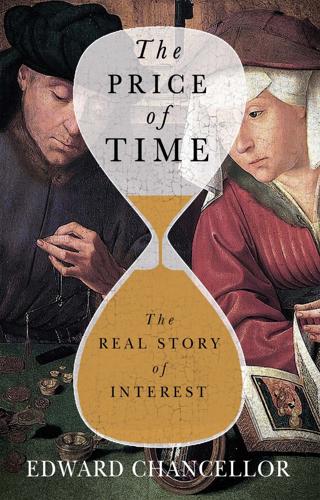
The Price of Time: The Real Story of Interest
by
Edward Chancellor
Published 15 Aug 2022
Bureaucrats who jealously guarded their monetary powers would resist demands for financial liberalization, he added.123 According to the ‘public choice’ school of economics, rents are created when the state interferes with markets and prices are kept away from equilibrium.124 Financial repression in China created copious rents and fostered crony capitalism. ‘Inordinate swindling is often bound up with a low rate of interest,’ observed that acute financial journalist Karl Marx.125 The Harvard economist John Kenneth Galbraith coined a term, ‘the bezzle’, to describe an economy’s ‘inventory of undisclosed embezzlement’ that varies with the business cycle.126 China’s bezzle was inversely related to the interest rate: as rates went down, the bezzle went up.fn14 Corruption was concentrated in those sectors, such as real estate, mining and construction, that benefited most from easy money.
…
Peach, Richard and Steindel, Charles, ‘Low Productivity Growth: The Capital Formation Link’, Liberty Street Economics, 26 June 2017. Peek, Joe and Rosengren, Eric S., ‘Unnatural Selection: Perverse Incentives and the Misallocation of Credit in Japan’, NBER Working Paper, April 2003. Pei, Minxin, China’s Crony Capitalism: The Dynamics of Regime Decay (Cambridge, Mass., 2016). Perry, Emily and Weltewitz, Florian, ‘Wealth Management Products in China’, RBA Bulletin, Reserve Bank of Australia, June 2015. Pettis, Michael, ‘China’s Economy Needs Institutional Reform rather than Additional Capital Deepening’, The Carnegie Endowment for International Peace, 24 July 2020.
…
The combined turnover for Macau’s casinos approached $30 billion. Assuming a win rate of 2.8 per cent, this suggests that total turnover was around $1 trillion, or roughly one-sixth of Chinese GDP. The average bet size that year was HK$30,000 (author’s conversation with Citibank’s head of Asian equities, 16 May 2011). 130. See Minxin Pei, China’s Crony Capitalism: The Dynamics of Regime Decay (Cambridge, Mass., 2016), pp. 21, 83. Pei comments that as the economic value of political power rose there was a huge increase in the amount of bribery paid to officials. Before 2001, the median value for the sale of a public office was 1.2 million yuan. After 2001, the median price of an office rose to 5.3 million yuan. 131.

The Smartphone Society
by
Nicole Aschoff
Trumpism, which political scientist Cas Mudde describes as a “radical right combination of authoritarianism, nativism and populism,” can be traced back to a response to the 2008 crisis, but one very different from the response on the left.44 After the crisis anger over debt, precarity, the bailout, job loss, and alienation was also articulated through right-wing voices such as Rick Santelli, now an editor for CNBC. In his famous 2009 rant from the trading floor of the Chicago stock exchange, Santelli blamed the crisis on crony capitalism—the government’s symbiotic, parasitic relationships with businesspeople too lazy or unimaginative to compete successfully in the marketplace—and losers looking for a handout.45 Instead of trying to buy our way out into prosperity, Santelli shouted, America needed to “reward people who carry the water, instead of drink the water.”
…
“Abrams, Jenna,” 109 ACLU (American Civil Liberties Union), 21, 22, 96, 148–49, 153, 176n28 Acxiom, 72, 77 addiction to social media, 65–69 Admiral, 78, 79 Adolfsson, Martin, 84 AdSense, 52 Advanced Research Projects Agency Network (ARPANET), 80 advertising: data collection and, 76–77, 83–84; on Facebook, 47–48; on Google, 52; political, 149 AdWords, 52 Afghanistan, politics in, 95–96 age discrimination, 149 AI Now, 129, 157 Airbnb, 42, 119, 120, 148 al-Abed, Bana, 90 al-Abed, Fatemah, 90 Aldridge, Rasheen, 91 algorithm(s): for consumer categories, 77; in dystopian future, 129–30, 131; in politics, 109–10; recommender, 67; search, 51–52, 53 algorithmic accountability, 151, 157–59 “algorithmic management,” 32–34 Alibaba, 4, 42 Allard, LaDonna Brave Bull, 104 aloneness, 7 Alphabet, 41, 55, 76, 122, 150 Alpha Go Zero program, 122 alter-globalization activists, 91 Amazon: acquisitions by, 41; and CIA, 81; in Europe, 150; marketplace model of, 150; as monopoly, 53–54; and new capitalism, 118–19; as new titan, 38–41, 44, 45; power of, 54–55; Rekognition software of, 149; tax evasion by, 49; warehouse workers at, 31–32, 33, 34; working conditions at, 46 Amazon Shopping, 30 Amazon Web Services (AWS), 41 American Academy of Pediatrics, 9 American Association of People with Disabilities, 55 American Civil Liberties Union (ACLU), 21, 22, 96, 148–49, 153, 176n28 American Dream, 120–21 American Library Association, 55 amplification, 91 analog networks, in cognitive mapping, 143 Android operating system, 39, 41, 53, 69, 70–71, 72 “angel investor,” 120 Ant Financial, 42 antidiscrimination laws, 149 antitrust laws and practices, 43–44, 52–53, 55, 150 AOL, data collection from, 81 app(s): top ten, 38 “app dashboard,” 69 app jobs, 30–34, 35, 137 Apple: data collection from, 81; in Europe, 150; low-paid workers at, 147; as new titan, 42; refusal of “right to repair” by, 155; supply chain of, 28–29; tax evasion by, 49–50; working conditions at, 46 appropriation, frontiers of, 73–76 appwashing, 34, 35, 146 “Arab Spring,” 97 Ardern, Jacinda, 93 ARPANET (Advanced Research Projects Agency Network), 80 artificial intelligence, 121–22, 123, 130 aspirational story, 120 assembly workers, 28–29 Athena, 42 AT&T, 29, 42, 43, 71 attention, 7 Audible, 41 Australia, justice in, 21 automation, 128, 131 automobiles, analogy between smartphones and, 2–3, 161, 162 autonomy, 117, 124 AWS (Amazon Web Services), 41 bad behavior, 138–39 Baidu, 42 Bannon, Steve, 105 Barlow, John Perry, 124 Bellini, Eevie, 24 Berners-Lee, Tim, 40 Beyoncé, 61, 107 Bezos, Jeff, 38, 44, 49, 54, 118–19 Bharatiya Janata Party (India), 93 big data, 76, 83–84, 145 Binh, Huang Duc, 95 black(s): police violence against, 17–23, 35, 169n6, 169n13 Blackberry, 6 “black-box algorithms,” 151 Black Lives Matter (BLM), 89–90, 100–102, 104, 107, 111 Blades, Joan, 91 blockchains, 124 body cameras worn by police, 22 book publishers, 172n40 boredom, 11 bots, 109 Boyd, Wes, 91 boyfriend, invisible, 24 Boyle, Susan, 63 Brazil, politics in, 97 Brin, Sergei, 38, 41, 54, 119, 148 Brown, Michael, Jr., 22, 89–90, 91, 101–2 Buffett, Warren, 41 Bumble, 23, 91 Bumblehive, 81 Burke, Tarana, 108 Bush, George W., 99 Calico, 41 California Consumer Privacy Act, 150 “CamperForce,” 31–32 Canales, Christian, 21 cancer, 7 candidates, social media use by, 103–5 Capital G, 41 capitalism: chameleonesque quality of, 116–17; crony, 105; and frontiers, 72–79; maps of, 143–44; neoliberal, 69, 102, 112–13, 117–18, 144–45; smartphones as embodiment of, 161–62; spirit of, 115–18; surveillance, 8 capitalist frontiers, government and, 80–81 carbon footprint, 82, 175n77 Carnegie, Andrew, 37, 54, 57 Castile, Philando, 20, 35 CatchLA, 62 caveats, 14–15 celebrities, in digital movements, 91 celebrity culture, 64–65 censorship, 95 Center for American Progress, 55 Center for Responsive Politics, 56 Central Intelligence Agency (CIA), 81, 95, 96, 138, 175n74 centrism, 112 Chadaga, Smitha, 89 change agent, 12 Chan, Priscilla, 56 Chan Zuckerberg Initiative (CZI), 56 Charles, Ashley “Dotty,” 109 Charlottesville, Virginia, 106–7, 111 Chesky, Brian, 120 children, 8, 9, 11–12, 84 China, 4, 42, 94–95 Chronicle, 41 CIA (Central Intelligence Agency), 81, 95, 96, 138, 175n74 Cienfuegos, Joaquin, 20–21 City of the Future, 124 Clinton, Bill, 43, 91, 99 Clinton, Hillary, 50, 107 Clooney, George, 91 “the cloud,” 82 cloud storage facility, 81 coercive relationships, 137–38, 152–54 cognitive maps and mapping, 143–59; algorithmic accountability in, 151; antidiscrimination laws in, 149; coercive and unjust relationships in, 152–54; defined, 143; digital and analog networks in, 143; digital commons in, 156–59; ecological externalities in, 145; economic implications in, 151–52; internet access for poor and rural communities in, 149–50; lacunae in, 145; low-paying jobs in, 146–49, 153–54; monopoly in, 150; political advertising in, 149; power in, 145; and principles of smartphone use, 152–59; privacy in, 150–51; selfish or immoral behavior in, 154–56; sociotechnical layers of, 145 collateral damage, 96 collective action, 155–56 Comcast, 29, 71 comic books, 11 commodification of private sphere, 144 Communications and Decency Act, 51 communities, on-line, 64 community broadband initiative, 149–50 Community Legal Services, 171–72n32 Compass Transportation, 147 Computer and Communications Industry Association, 55 “connected presence,” 6 connection, 44, 63–64, 143, 162 connectivity, 122 Connolly, Mike, 94 consumer(s): vs. producers, 28–29 consumer categories, 77 consumer scores, 77–78 consumption, 83, 138–39 content algorithms, 51–52 content creation, 74–79 contingent workers, 30 convenience, 29–30, 35 Cooperation Jackson, 155 cop-watch groups, 20–21 “The Counted,” 19, 169n6 “creative monopoly,” 44 creativity, 117 credit scores, 78–79 creepin”, 65 critiques, 7–8 crony capitalism, 105 CrushTime, 24 Cruz, Ted, 92 “Cuban Twitter,” 95 Cucalon, Celia, 48 Cullors, Patrisse, 100–102 cultural capital, 62 “custom breathers,” 69 “customer lifetime value score,” 78 “cyberspace,” 82 CZI (Chan Zuckerberg Initiative), 56 Dakota Access Pipeline Protests, 103–4, 110 dashboard apps, 132 data brokers, 72, 77 data centers, energy use by, 82 data collection, 70–72, 83–84, 137, 150–51, 156–59 data mining, 76–79 data ownership, 135–36 “data smog,” 72 Data & Society, 151, 179n20 data vendors, 76 datification, 156–57, 161 dating apps, 23–27, 35 decentralization, 101–2, 120 decommodification, 156–57 DeepMind, 41, 79, 122, 157 Deliveroo, 32–33, 153 Department of Homeland Security, 149 Desai, Bhairavi, 146 Descartes, René, 67 Diallo, Amadou, 19 Diapers.com, 41 dick pics, 25 Dick’s Sporting Goods, 91 digital-analog political model, 104, 110–12, 145, 162 digital commons, 139–41, 156–59 digital divide, 28–29, 35 “digital exclusion,” 29 digital frontier, limits of, 82 digital justice, 17–23, 152, 157, 169n6, 169n13 digital networks, 143 digital platforms, 44 “digital redlining,” 29 “digital well-being,” 69 disconnection, 132–33 discrimination in housing, 47–48 divides, 17–36; built-in, 28–34, 35; related to justice, 17–23, 169n6, 169n13; related to sexuality, 23–27, 35 division of labor, 74–75 Dobbs, Tammy, 129 documentation, 62 domestic violence, 25 DoorDash, 33–34, 146–47 dopamine driven feedback loops, 67 double standard, 25–27, 35 drone warfare, 95 “dual economy,” 12–13 dumbness, 7, 9 “dumb phone,” 1, 8, 132, 167n15 dystopian future, 125–26, 128–30, 131 eBay, 147, 148 Echo Look device, 84 ecological externalities, 145 ecological limit of digital frontier, 82–83, 175n77 economic crisis (2008), 98–100, 117–18 economic divide, 13–14 economic implications, in cognitive mapping, 151–52 economic nationalism, 105 “ecosystems,” 40 Eddystone, 78 education, 13 Edwards, Jordan, 18 Egypt, 92, 97 elderly Americans, 63–64, 84 Electronic Frontier Foundation, 55, 124 Elliot, Umaara, 90 Ellison, Keith, 45 emails: vs. phone calls, 6; scanning of, 70–71 Emerson, Ralph Waldo, 133 employment relationships, 137 encryption, 81, 175n74 energy consumption, 151–52, 154–55; by physical elements of digital life, 82, 175n77 entrepreneurship, 120–21 environmental justice, 154–55 Epsilon, 72 Equal Credit Opportunity Act, 78 Estrada, Joseph, 90–91 Europe, American tech titans in, 150 European Union (EU), 49, 52–53, 150–51 experience economy, 62, 83 exploitation of labor, 75 externalization of work and workers, 31 Facebook: acquisitions by, 41; addiction to, 66–67, 69; and antidiscrimination laws, 149; credit ratings by, 79; data collection by, 71–72, 76, 81, 84; demographics of, 84; discrimination in advertising by, 47–48; employees organizing at, 148; in Europe, 150; Free Basics by, 41–42, 50; low-paid workers at, 147; managing impressions on, 63; as monopoly, 53–54, 172n46; and new capitalism, 124, 136; as news source, 50–51; as new titan, 38–39, 40, 41–42, 44–45; power and influence of, 56; tax evasion by, 49; time spent on, 60 Facebook Live, 84 Facebook Pixel, 72 “Facebook Revolution,” 97 facial recognition software, 129, 149 Fair Housing Act, 48 fake news, 50–51, 56 Federal Bureau of Investigation (FBI), 149 feedback loop, 66–67 “Feminist Five,” 108 feminist movement, 107–8 Ferguson, Missouri, 89–90, 101–2 Fields, James Alex, Jr., 106 filter bubbles, 53, 109–10 financial crisis (2008), 98–100, 117–18 fintech companies, 78–79 flexibility, 117 FlexiSpy, 25 FOIA (Freedom of Information Act) requests, 149 food delivery apps, 32–33 food pictures, 62 forced arbitration, 148 Ford, Henry, 37, 124 Fordlandia, 124 Ford Motor Company, 37, 38, 44 Fowler, Susan, 126–27 FoxConn, 28 framing of analysis of cell phones, 12–14 Free Basics, 41–42, 50 Freedom of Information Act (FOIA) requests, 149 “free market” competition, 98 free speech, 138 Friedman, Patri, 124 frontier of social media, 59–86; addiction to, and fears about, 65–69; and big data, 82–86; characteristics of, 59–65; and government, 80–81; and privacy, 69–72; and profit, 72–79 Fuller, Margaret, 133 Galston, Bill, 45 gamification, 23–24, 146 Garza, Alicia, 100–102 Gassama, Mamoudou, 115 Gates, Bill, 56, 130 General Data Protection Regulation (GDPR), 150–51, 156 Geofeedia, 96 geopolitics, 95–96, 144 Germany, 3 Ghostbot, 24 gig economy, 137 Gilded Age, 1–2, 11, 54 global divides, 28–29 globalization, 98 Global Positioning System (GPS), 5 Gmail, 38, 71 Goodman, Amy, 104 Google: addiction to, 69; advertising on, 76; companies owned by, 41; data collection by, 70–71, 76, 81, 150; employees organizing at, 147–48; in Europe, 150; immoral projects at, 154; and intelligence agencies, 81; lobbying by, 55; low-paid workers at, 147; molding of public opinion by, 55; as monopoly, 52–54; and new capitalism, 119–20, 123, 136; as new titan, 38, 39, 40, 41, 43–45, 56; for online search, 52; power and influence of, 55–56; research funding by, 55; “summer camp” of, 55; tax evasion by, 49, 50; use by children, 84; working conditions at, 47 Google Calendar, 71 Google Chrome browser, 53 Google Drive, 71 Google Earth, 123 Google Fiber, 41 Google Images, 131 Google News, 50 Google Play, 72 Google Search, 38, 41, 53 Google Shopping Case, 52–53 Google Translate, 10 government: and capitalist frontiers, 80–81; and Silicon Valley, 124; surveillance by, 137–38, 144, 148–49 government tracking, 94–95 GPS (Global Positioning System), 5 Grant, Oscar, III, 18 Gray, Freddie, 22, 96 Great Pessimism, 118, 119 Great Recession, 118 Greece, 97 greenhouse emissions, 82 Green New Deal, 103, 151–52, 154, 179n22 Greenpeace, 157 Grindr, 23 gun violence, 90, 91, 110, 111 GV, 41 habitus, 62 Happn, 23, 24 Harari, Yuval Noah, 129–30, 132 Hearst, William Randolph, 50 Herndon, Chris, 56 Heyer, Heather, 106 Hirschman, Albert, 133 household expenses, 13 housing, discrimination in, 47–48 human, fear of becoming less, 67–68 iBeacon, 78 IBM, 149 ICE (Immigration and Customs Enforcement), 21, 148 ICT (information and communication technologies) sector, energy used by, 82 ideals, 120 “identity resolution services,” 77 ILSR (Institute for Local Self-Reliance), 149–50, 153 Immigration and Customs Enforcement (ICE), 21, 148 immoral behavior, 138–39, 154–56 impressions, management of, 62–63 income discrepancy, 12–13 independent contractors, 33–34, 137, 153 India, 4, 42, 60, 93 individualism, 117, 118 information and communication technologies (ICT) sector, energy used by, 82 injustice, 17–23, 169n6, 169n13 In-Q-Tel, 96 insta-bae principles, 61–62 Instacart, 30, 146 Instagram: addiction to, 69; content on, 60, 61, 62; creepin’ on, 65; data collection from, 72; demographics of, 61; microcelebrities on, 60; as new titan, 38, 41; time spent on, 60; value of, 74 Institute for Local Self-Reliance (ILSR), 149–50, 153 insurance companies, data mining by, 79 intelligence agencies, and capitalist frontiers, 81 internet: access for poor and rural communities to, 149–50; access to high-speed, 5, 29; creation of, 80; early days of, 40; government shutdown of, 94; smartphone connection to, 10 Internet Association, 45 Internet Broken Brain, 66 Internet.org, 41 Internet Research Agency, 109 internet service providers, and privacy, 71–72 inventions, new, 11 investors, 120–21 invisible boyfriend, 24 iPhone, 6, 42 Iron Eyes, Tokata, 104 Jacob’s letter, 127 Jacobs, Ric, 127 Jaffe, Sarah, 91 James, LeBron, 92 Jenner, Kris, 59 Jigsaw, 41 Jobs, Steve, 2, 6, 42 Joint Special Operations Command, 95 Jones, Alex, 111 Jones, Keaton, 109 justice, 17–23, 152, 157, 169n6, 169n13 Kalanick, Travis, 126, 127 Kardashian, Kim, 59 Kardashian, Kylie, 59 Kasky, Cameron, 90 Kattan, Huda, 60 Kellaway, Lucy, 1 Kennedy, John F., 88 Kerry, John, 56 Keynes, John Maynard, 117 Khosla, Sadhavi, 93 King, Martin Luther, Jr., 97 King, Rodney, 19 Klein, Naomi, 104 Knight First Amendment Institute, 93, 175n14 Knoll, Jessica, 108 Kreditech, 78–79 Kristol, Bill, 45 Kurzweil, Ray, 123 Lanier, Jaron, 67, 70, 135 Lantern, 95 law enforcement, surveillance by, 96–97, 137–38, 176n28 “leaners,” 29 Lean In (Sandberg), 107 Lehman Brothers, 98 Levandowski, Anthony, 123 LGBTQ community, 10, 64 “lifestyle politics,” 133 “like” button, 66 Lind, William, 105 “listening tour,” 56 Liu Hu, 94 live chats, 5 livestreaming of police violence, 20–21 lobbying, 55, 56 location data, 71 logistics workers, 31 Loon, 41 Loop Transportation, 147 Losse, Katherine, 124 love, 23–27, 35 low-income households, access to high-speed internet by, 29 low-paying jobs, 146–49, 153–54 Luxy, 23 Lyft 30, 31, 33, 146, 153 Lynd, Helen, 2, 3 Lynd, Robert, 2, 3 Lynn, Barry, 56 machine learning, 76, 121–22, 174n52 “machine zone,” 8 Macron, Emmanuel, 93 mainstream media, bypassing of, 91 Ma, Jack, 42 Makani, 41 mamasphere, 64 March for Our Lives, 104 March of the Margaridas, 108 Marjorie Stoneman Douglas (MSD) High School, 90 marketification, 161 Markey, Ed, 152, 179n22 marriage, expectations and norms about, 24–25 Marshall, James, 17–19 Marshall, Tanya, 17–19 Martin, Trayvon, 22, 100 Marx, Karl, 67 mass shootings, 90, 91, 110, 111 Match.com, 23, 24 Match Group, 24 Matsuhisa, Nobu, 62 Maven, 147–48 McDonald, Laquan, 18 McInnes, Gavin, 106, 107, 111 McSpadden, Lezley, 101 meaning, sense of, 64–65, 162 Medbase200, 77 men’s work, 75 mental health of children, 8 meritocracy, 121 Messenger: data collection from, 72 Messenger Kids, 84 metadata, 72 #MeToo movement, 108 microcelebrities, 60 microchoices, 69 Microsoft: and City of the Future, 124; data collection from, 81; employees organizing at, 148; in Europe, 150; immoral projects at, 154; as new titan, 42, 43, 55, 56 Middleton, Daniel, 60 “Middletown,” 2–3 Middletown: A Study in Contemporary American Culture (Lynd and Lynd), 2–3 military, 80–81, 95 mind-body divide, 67–68 miners, 28 Minutiae, 84 misogyny, 25 Mobile Devices Branch of CIA, 81, 95 Mobile Justice MI app, 21, 169n13 Modi, Narendra, 93 Mondragon, Elena, 22–23 monetization, 59, 79 money accounts, mobile, 10 monopolies, 43–46, 52–53, 150 Morgan, J.
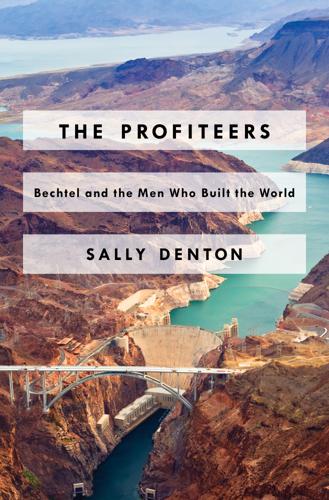
The Profiteers
by
Sally Denton
(12) The legendary, nationally syndicated columnist Drew Pearson, seen here in the White House garden with President Lyndon Baines Johnson in 1964, was the harshest critic of John McCone and Bechtel. Pearson, and then his equally legendary successor, Jack Anderson, drew repeated public attention to the crony capitalism and revolving door they thought McCone and Bechtel epitomized. (13) Greg Mello, executive director of the Los Alamos Study Group, thought Wen Ho Lee “was an invented crisis, not an intelligence operation.” As Mello saw it, the arrest of Lee as a spy set the stage for the nation’s nuclear laboratory to be transferred into private hands
…
Burrows, Anne Platt, Paul Kucik; William Skinnyhorn; and John Straigis. “A Systems Analysis of the A.Q. Khan Network.” Social Sciences Seminar, December 8, 2005. Presented at the Freeman Spogli Institute for International Studies at Stanford University. Authors: “Competition—or Collusion? Privatization and Crony Capitalism in the Nuclear Weapons Complex: Some Questions from New Mexico.” Los Alamos Study Group. Authors: Damon Hill and Greg Mello. May 30, 2006. Fehner, Terrence R. “The U.S. Department of Energy and the Cold War.” Presented at the Conference on The Power of Free Inquiry and Cold War International History at the National Archives at College Park, Maryland.
…
National Security Archive. From Alfred L. Atherton, Jr., to Secretary of State. Department of State Action Memorandum. From CIA Director John McCone to President Lyndon Johnson. April 28, 1965. Declassified January 3, 1986. Hill, Damon, and Greg Mello. “Competition—or Collusion? Privatization and Crony Capitalism in the Nuclear Weapons Complex: Some Questions from New Mexico.” Los Alamos Study Group. May 30, 2006. “Iran-Contra Investigation. Testimony of George P. Shultz and Edwin Meese, III.” U.S. Congress. Joint Hearings Before the Senate Select Committee on Secret Military Assistance to Iran and the Nicaraguan Opposition and the House Select Committee to Investigate Covert Arms Transactions with Iran. 100th Cong., 1st Sess.
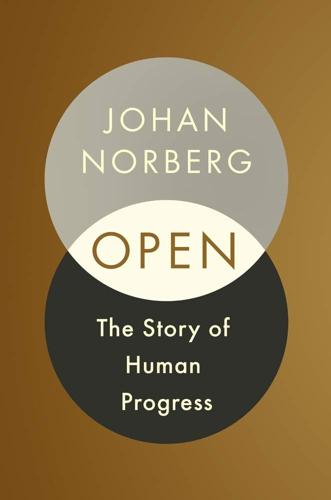
Open: The Story of Human Progress
by
Johan Norberg
Published 14 Sep 2020
If there were no way to reduce the pain in the world, what would you pay to have it? If you ask someone before going into surgery you would see that the price would approach their total wealth. And yet it is rarely visible in GDP statistics. Making it zero-sum Not all wealth is created innocently and creatively, though. According to The Economist’s index of crony capitalism, a quarter of the world’s billionaires derive their wealth from markets that are susceptible to monopoly or depend on government favours or licensing. This includes mining and commodities, defence, banking, tech, telecom, infrastructure, real estate and construction.31 It doesn’t rule out the possibility that they made money on heroic entrepreneurship to the benefit of consumers, of course.
…
(Huntington), 362–3, 365–6 classical liberalism, 185, 205, 214 Claudius, Roman Emperor, 90, 92 climate change, 75, 323, 325, 326–34 Clinton, Hillary, 238 Clouds, The (Aristophanes), 129 Cobden–Chevalier Treaty (1860), 53–4 coffee houses, 166 cognitive dissonance, 127 Cohen, Floris, 150 Colombia, 120 colonialism, 214, 232, 256 Britain, 84, 191, 194, 200 Dutch Republic, 100 Portugal, 100, 146–7, 178 Spain, 147, 178, 182 Columbia University, 223 Columbus, Christopher, 77, 177, 178, 305 Comenius, John, 152 command economies, 43, 315 communism, 54, 56, 215, 302–5, 314–18 Communist Manifesto, The (Marx and Engels), 33 compensatory control, 322–3 competition, 60 benefit–cost ratio and, 62 creative destruction and, 57, 190 Great Depression and, 54 guilds and, 190 immigration and, 117 Rust Belt and, 64, 65–6 competitive advantage, 28–9 computers, 302–14 automation, 63, 312–13 Internet, 57, 275, 278, 306–11, 312 confirmation bias, 127, 160, 161 Confucianism, 129, 149, 169, 176 Congo, 365 conquistadores, 77 conservatism, 334–40 authoritarianism and, 345 disgust and, 335, 336 dynamism and, 286, 300–302, 312, 326 economic, 185, 336 security and, 334–40, 378 superpowers study, 338–9 conspiracy theories, 322–3, 324 Constantine, Roman Emperor, 133–4 Constantinople, 92, 94, 224 contact hypothesis, 244–5 Conway, Kellyanne, 108 Coontz, Stephanie, 199 Cooper, Anthony Ashley, 1st Earl of Shaftesbury, 185 Copernicus, Nicolaus, 146, 150, 332 copper, 42 Cordoba, Spain, 137–9 Corn Laws, 53, 191 corn-based ethanol, 328, 329 coronavirus, 3, 4, 10–11, 162–3, 293, 312 corruption, 317, 345, 381 COVID-19 pandemic (2019–20), 3, 4, 10–12, 162–3, 312 cowboys, 73 Cowen, Tyler, 257 Coxe, Tench, 103 creative destruction, 57, 179, 182, 190, 270, 339 automation, 63, 312–13 nostalgia and, 296–9, 313 Schumpeterian profits, 273–4 Crete, 89 crime, 110, 119–20, 346, 377 Crisis and Leviathan (Higgs), 337 Criswell King, Jeron, 255–6 Croats, 72 Cromwell, Oliver, 183 Crone, Patricia, 207 crony capitalism, 279–80 Crusades, 94, 138 cults, 244 culture appropriation, 71–2 borrowing, 70–73 evolution, 26–30 immigration and, 69–73, 116, 119, 120–23 ‘purity’ of, 69, 70, 71, 352 Cyrus II ‘the Great’, King of Persia, 86–7, 249 Daily Mail, 119 Dalberg-Acton, John, 1st Baron Acton, 140, 180 Dalton, John, 196 Danube (Magris), 219 Danube river, 93 Darfur, 365 Darius I ‘the Great’, Persian Emperor, 86 Dark Ages, 5, 50, 140, 215 Darkening Age, The (Nixey), 134 Darwin, Charles, 24, 28, 162, 227 Davies, Stephen, 170 death penalty, 349 Defense Science Board, US, 313 Defoe, Daniel, 195 deindustrialization, 62 demagogues, 15, 217, 353–4, 360 dementia, 289 democracy, 205, 321, 357, 363, 378–82 authoritarianism and, 357 deliberative, 378–9 environment and, 327 in Greece, 5 Muslims and, 112, 113 populism and, 325 representative, 378 in United States, 200 Democratic Party, 164, 224–5, 238, 302, 349 Deng Xiaoping, 316, 317 Denisovans, 75 Department of Defense, US, 306, 313 Depeche Mode, 245, 295 Descartes, René, 100, 149, 153 Désert de Retz, France, 287 Deutsch, David, 261, 332 Diamond, Jared, 41 Diana, 89 Dickens, Charles, 197, 206 dictator game, 35 Diderot, Denis, 154 Dilmun, 42 disasters, 338 disease, 77–9, 128, 213, 293 Antonine Plague (165–80), 77 Behavioural Immune System, 222 Black Death (1346–53), 77, 139, 356 COVID-19 pandemic (2019–20), 3, 4, 10–12, 162–3, 312 Plague of Justinian (541–750), 77 Spanish flu (1918–19), 77 disgust, 222, 336–7, 371 ‘dismal science’, 206 Disraeli, Benjamin, 254 diversity, 83–4, 121–2 empires and, 84–106 problem solving and, 83 turtle theory, 121–2 division of labour, 28, 31–2, 40, 57, 117, 168 DNA (deoxyribonucleic acid), 8, 73–4, 75, 76 Doctor Who, 135 Doggerland, 74 Dollond, John, 158–9 Dominicans, 144 dreadlocks, 72 dung beetles, 284–5 Dunn, Kris, 357 Dutch East India Company, 100 Dutch Republic (1581–1795), 6, 53, 84, 99–101, 147, 184, 208 Calvinism, 149 colonies, 100 exiles in, 99, 152, 153, 158, 185, 186 Glorious Revolution (1688), 101, 185–8, 190, 193 Jewish community, 100, 150 multi-shuttle ribbon frame in, 180 Dutch Revolt (1568–1648), 98–9, 101, 208 dynamism, 301–2, 312, 318, 330 Eagles and Rattlers, 218–19, 236, 243, 252 East River Rift Valley, 24 Eastern Europe, 114, 115 Eastern Roman Empire (395–1453), see Byzantine Empire Ebola virus, 293 economies of scale, 42 Economist, The, 118, 279, 318 economy and nativism, 349–51 efflorescences, 5, 6, 10 Egypt, ancient, 43, 45, 70, 87, 88, 89, 128 Ehrlich, Paul, 160 Eighteenth-Century Commonwealthman, The (Robbins), 201 Eighty Years War (1566–1648), 101 Einstein, Albert, 105 electricity, 297 Elizabeth I, Queen of England and Ireland, 179, 237, 277 Eller, Martin, 306 Elusians, 89 Elvin, Mark, 173 empathy, 219, 224 Encyclopédie, 154 ‘End of History?’
…
(Fukuyama), 362–5 End of Work, The (Rifkin), 312 Engels, Friedrich, 33, 36, 162, 206, 247, 256 English Civil War (1642–1651), 148, 183, 184, 201 Enigma machine, 124–6 Enlightenment, 4, 5, 6, 13, 103, 154–60, 165–6, 195–6 Environmental Performance Index, 327 Ephesus, 45 Epic of Gilgamesh, The, 38 Epicurus, 134–5 Epstein, Richard, 320 equality matching, 262–6, 267 Erasmus, 152 Erdogan, Recep Tayyip, 354 Ethiopia, 72, 130 ethnocentrism, 219, 271 Etruscan civilization (c. 900–27 BC), 43 Eubulus, 47 eugenics, 109 Euphrates river, 37 Euripides, 132 European Organization for Nuclear Research, 306 European Parliament, 325 European Union (EU) Brexit (2016–), 9, 14, 118, 238, 240–41, 349, 354, 379 common currency, 280–81 freedom of movement, 118, 343 migration crisis (2015–), 10, 114, 115, 342–3, 358 subsidies in, 280 trade and, 272 United States, trade with, 19 Evans, Oliver, 203 Evolution of God, The (Wright), 249 evolutionary psychology, 14, 23, 225 exoticism, 84 Expressionism, 198 Facebook, 239, 309 Falwell, Jerry, 113–14 Farage, Nigel, 241 farming, see agriculture Fascist Italy (1922–1943), 105, 219 FedEx, 319 Feifer, Jason, 290–92 Fenway Park, Boston, 223 Ferdinand II, King of Aragon, 97, 98, 106 Ferguson, Charles, 314 Fermi, Enrico, 105 Ferney, France, 153 feudalism, 92, 194, 202, 208 fight-or-flight instinct, 15, 346, 348–9 filter bubbles, 239 financial crisis (2008), 10, 15, 62, 254, 333, 358, 359–60 fire, control of, 32–3, 76 Flanders, 208 fluyts, 100 Flynn effect, 109 Fogel, Robert, 276 folk economics, 258–62 football, 223–4, 245–6 Forbes, 274 Ford, Henry, 203 Fortune 500 companies, 82 Fox News, 82, 302, 354 France, 151 American Revolutionary War (1775–83), 201 automation in, 313 Cathars, 94, 142 Cobden–Chevalier Treaty (1860), 53–4 corruption in, 345 Dutch War (1672–8), 101 Encyclopédie, 154 free zones in, 180–81 Huguenots, persecution of, 97, 99, 101, 158, 193 immigration in, 115 Jews, persecution of, 96, 97, 254 languages in, 289 Minitel, 313 Revolution (1789–99), 201, 292 Royal Academy of Sciences, 156 ruin follies, 287 St Bartholomew’s Day massacre (1572), 97 Thököly Uprising (1678–85), 137 Uber in, 320 University of Paris, 140, 141–2, 143 Francis I, Emperor of Austria-Hungary, 178 Franciscans, 144 Franklin, Benjamin, 107 Franks, 92 free speech, 127, 131–2, 160, 163–5, 343 Chicago principles, 164–5 emigration for, 152–3 university campuses, 163–5 free trade, see under trade Fried, Dan, 289 Friedman, Benjamin, 253 Friedman, David, 284 Friedman, Thomas, 325 Friedrich Wilhelm I, King of Prussia, 153 Fukuyama, Francis, 362–5 Fulda, Germany, 179, 180 Future and Its Enemies, The (Postrel), 300 Future of Nostalgia, The (Boym), 288 Galatia, 90 Galaxy Zoo, 80 Galilei, Galileo, 146, 150 Gallup, 164 game theory, 26 Gandhi, Indira, 326 gas lighting, 297 Gates, William ‘Bill’, 274, 277, 309 Gauls, 90, 91, 92 gay rights, 113, 336 Geary, Patrick, 288–9 gender equality, 113, 114 General Motors, 64 generations baby-boom generation (1946–64), 294, 340 generation X (1965–80), 340 immigration and, 106, 110–11, 113–14 interwar generation (1928–45), 340 millennial generation (1981–96), 340 nostalgia and, 291, 293–4, 296 genetically modified organisms (GMO), 299, 301 Geneva, Switzerland, 152, 153 Genghis Khan, 94–5, 96, 174 Genoa, Republic of (1005–1797), 73, 178 George II, King of Great Britain and Ireland, 193 George III, King of Great Britain and Ireland, 103, 193 George Mason University, 257, 258 Georgia, 365 Georgia, United States, 349 German Conservative Party, 254 Germany automatic looms, 179 Berlin Wall, fall of (1989), 10, 340, 341, 363, 364 Bronze Age migration, 75 budget deficits, 60 COVID-19 pandemic (2019–20), 12 guilds in, 190 immigration in, 114, 115 Jews, persecution of, 99, 104–6, 109, 220, 233 migration crisis (2015–), 342–3 Nazi period (1933–45), 104–6, 109, 124, 220, 233, 353 Neolithic migration, 74 protectionism in, 314 Reichstag fire (1933), 353 Thirty Years War (1618–48), 150 United States, migration to, 104, 107–8, 111 Weimar period (1918–33), 353 al-Ghazali, 139 Gholia, 89 Gibbon, Edward, 90 Gilder, George, 314 Gilgamesh, 38 Gillis, John, 291 Gingrich, Newton, 313 Gini coefficient, 273 Gintis, Herbert, 36 global history, 13 global price crisis (2010–11), 11 global warming, 75, 323, 325, 326–34 globalization, 4, 55, 270 backlashes against, 9, 14, 54, 57 cities and, 35 classical world, 43–50 conspiracy theories on, 323 disease and, 11, 77–9 United States and, 19 Westernization, 4 Glorious Revolution (1688), 101, 185–8, 190, 193 Goa, India, 146–7 golden nugget theory, 5 Golden Rule, 251–2 Golding, William, 219, 243, 244 Goldstone, Jack, 5, 133, 353 Goodness Paradox, The (Wrangham), 227 Google, 309, 311 Gordon, Thomas, 201 Göring, Hermann, 106 gossip, 229 Goths, 92 Gottlieb, Anthony, 135 Great Awakening (1730–55), 102 Great Depression (1929–39), 54–5, 56, 254 Great Enrichment, 167, 204 Great Recession (2007–9), 254–5, 358, 359–60 Great Transformation, The (Polanyi), 37 Great Vanishing, 134–5 Great Wall of China, 178 Greece, ancient, 127–32, 169 Athens, 47, 53, 89, 90, 131–2, 134 Axial Age, 129 cosmopolitanism, 87–8 golden nugget theory, 5 Ionian enlightenment, 127–9 Mycenae, 88 philosophy, 13, 70, 127–32, 134–5, 136 Phoenicians, relations with, 43, 44, 45, 46 science, 127–32, 136 Sparta, 47, 54, 90, 132 trade, attitudes towards, 47, 54 xenophobia in, 90 Green New Deal, 302 Greene, Joshua, 216, 259 Greenland, 51 Gregorian calendar, 137, 152 Gregory IX, Pope, 142 Gregory XIII, Pope, 152 gross domestic product (GDP), 68–9, 257, 278–9 Grotius, Hugo, 147, 152–3 groupthink, 83 Guangzhou, Guangdong, 352 guilds, 190 Gutenberg, Johannes, 146 Haber, Fritz, 105 Habsburg Empire (1282–1918) anti-Semitism in, 254 Austria, 151, 179, 190 refugees, 99 Spain, 98–9, 208 Hadrian, Roman Emperor, 91 Hadrian’s Wall, 47 Hagley Park, West Midlands, 286–7 Haidt, Jonathan, 163, 229, 344, 348, 357 Haile Selassie, Emperor of Ethiopia, 72 Hamas, 365 Hangzhou, Zhejiang, 173 Hanseatic League (1358–1862), 53 Hanson, Robin, 282 Hanway, Jonas, 298 Happy Days, 294 Harari, Yuval Noah, 38 Harriot, Thomas, 150 Hartsoeker, Nicolaas, 159 Harvard Business Review, 313 Harvard University, 116, 122, 137, 253, 309, 313 Haskell, Thomas, 206 Hässelby, Stockholm, 217–18, 245 Hayashi, Stuart, 370 Hayek, Friedrich, 1, 7, 29, 300, 325 Hebrew Bible, 248–50 Hegel, Georg Wilhelm Friedrich, 288, 365 Helm, Dieter, 328, 331 Henrich, Joseph, 36 Hercules, 87 Herodotus, 132 Hewlett-Packard, 304 Higgs, Robert, 337 Hill, Christopher, 182 Hinduism, 136, 149, 354 von Hippel, William, 24, 25, 262, 284 Hippocrates, 128 Hispanic people, 110–11 Hitler, Adolf, 104–5, 353 Hobbes, Thomas, 9, 152, 226 Hofer, Johannes, 288 Holmgren, Pär, 325 Holocaust (1941–5), 109, 220 Holy Roman Empire (800–1806), 155, 181, 288 Homestead Acts, 171 Homo economicus, 34, 36 Homo erectus, 76, 267 Homo sapiens, 3, 21, 23, 30–33, 76, 259–62, 282, 371 homosexuality, 79, 113–14, 336 Homs, Syria, 82 Honeywell, 303 Hong Kong, 53, 235, 316 Hoover, Herbert, 55 horseshoes, 203 House of Wisdom, Baghdad, 136 Household Narrative, The, 297 housing, 375–6 Huguenots, 97, 99, 101, 158, 193 human rights, 87, 147, 213 humanitarianism, 204–7 Hume, David, 151, 154, 194 Hungary, 105, 190, 235, 237, 354, 357 hunkering down, 121, 165 Huns, 93 hunter-gatherer societies death rate, 9 disease and, 78 division of labour and, 29, 32, 40–41, 57 equality matching, 262–3, 265 inbreeding and, 78 isolation and, 52 migration, 73–4, 78–9 physical fallacy, 268 race and, 232 trade, 265 tyranny of cousins, 230 Huntington, Samuel, 110, 362–3, 365–6 Hussein, Saddam, 345 Hussey, Edward, 287 Hutchins, Robert Maynard, 165 Hutus, 230–31 Hypatia, 134 hyper-fast stars, 80 IBM, 305, 307, 319 Ibn al-Haytham, 156 Ibn Hayyan, Jabir, 156 Ibn Rushd, 137–8, 143, 144, 145 ice core drilling, 49 Identity & Violence (Sen), 231 identity politics, 241 al-Idrisi, Muhammad, 137 immigration birth rates and, 115 crime and, 110, 119 culture and, 69–73, 116, 119, 120–23 disgust and, 336, 371 division of labour and, 117 empires and, 84–106 European migration crisis (2015–), 10, 114, 115, 118, 342–3 exoticism, 84 GDP and, 68 innovation and, 81–4 Islam and, 112–14, 255 labour market and, 115, 116–19 opposition to, 69, 70, 114–23, 223, 254–5 productivity and, 68, 81, 117, 204 protectionism and, 66–7 self-selection and, 107, 112 skilled vs unskilled, 66, 82, 102, 116, 117 trade and, 35, 66–7, 234–5 tribalism and, 223, 235–6, 240, 243 urban vs rural areas, 114 welfare and, 118, 281 zero-sum thinking and, 254–5, 259 immigration in United States, 102–14 crime and, 110, 119 innovation and, 81–2, 202 overestimation of, 115, 223 tribalism and, 223, 240 zero-sum thinking and, 254–5, 259 In Defence of Global Capitalism (Norberg), 270 in vitro fertilization, 298–9 inbreeding, 78 India, 42, 45, 46, 56, 75, 129, 136, 140, 146, 270 Arabic numerals, 70, 137 engineering in, 269 Hindu nationalism, 354 industrialization, 207 Maurya Empire (323–184 BC), 53 Mughal Empire (1526–1857), 98, 148, 149, 215 national stereotypes, 235 Pakistan, relations with, 366 pollution in, 326 poverty in, 276, 326 Indo-European language, 75 Indonesia, 41 Industrial Revolution; industrialization, 5, 6, 13, 54, 132, 180, 339 in Britain, 182, 188–99, 202 in China, 169, 172–3, 207 climate change and, 326 in Dutch Republic, 101 in India, 207 in Japan, 71 in United States, 202, 291–2 in Vietnam, 207 inequality, 273, 349 Inglehart, Ronald, 339 ingroups and outgroups, 217–47 fluidity, 230–38 political, 224–5, 238–42 zero-sum relationships and, 252–5 Innocent III, Pope, 233 InnoCentive, 126–7 innovation, 4, 6, 10, 27, 80 ancient world, 32, 42, 44, 46 authoritarianism and, 318 bureaucratic inertia and, 318–21 canon and, 195 cities and, 40, 53, 79 creative destruction, 57, 179, 182, 190 cultural evolution, 28 immigration and 81–4 patent systems, 189–90 population and, 27, 51, 53 Schumpeterian profits, 273–5 resistance to, 10, 179–81 zero-sum thinking and, 266–9 Inquisition, 150 France, 94, 143 Portugal, 100 Spain, 97, 98 intellectual property, 58 Intergalactic Computer Network, 307 International Monetary Fund (IMF), 117 Internet, 57, 275, 278, 306–11, 312, 313 interwar generation (1928–45), 340 Inuit, 22, 51 Ionian enlightenment, 127–9 IQ (intelligence quotient), 109 Iran, 365 Ireland, 104, 108–9, 111, 112, 379 iron, 172 Isabella I, Queen of Castile, 97 Isaiah, 46 Isaura Palaia, Galatia, 90 Isenberg, Daniel, 296 Isis, 89 Islam; Islamic world Arab Spring (2011), 10, 342 clash of civilizations narrative, 237, 365 conflict within, 365 efflorescence, 6, 53, 136–41 fundamentalism, 112, 134, 139, 351 Koran, 137, 250–51 migration from, 112–14 orthodox backlash, 148–9 philosophy, 5, 13 science, 70, 132, 136–41 values in, 112, 113 Islamic State, 351, 365–6 Islamic world, 5, 6, 13, 53, 70 Israel, 111, 365 Italy, 6, 151, 169 anti-Semitism in, 254 Fascist period (1922–1943), 105 Genoa, Republic of (1005–1797), 73, 178 guilds in, 190 Lombard League (1167–1250), 181 Ötzi, 1–2, 8–9, 73, 74 Padua, 144, 146 Papacy in, 155, 181 Renaissance, 6, 150, 153, 169 United States, migration to, 104, 109 Venice, Republic of (697–1797), 53, 144, 152, 174, 181 Jacobs, Jane, 39–40, 79, 264 James II and VII, King of England, Scotland and Ireland, 185–6 Jamestown, Virginia, 200 Japan housing in, 376 kimonos, 73 Meiji Restoration (1868), 53, 70–71 protectionism, 314 Tokugawa Shogunate (1600–1868), 54 United States, migration to, 104, 236, 335 Japanning, 156 JavaScript, 310 jealous emulation, 154–7 jeans, 73 Jefferson, Thomas, 103, 184, 201, 205 Jenner, Edward, 296 Jerusalem, 87, 251 Jesus, 250 Jews in Abbasid Caliphate, 136 anti-Semitism, 254–5, 356 Ashkenazim, 99 Babylonian captivity, 87, 249 Bible, 46, 72, 248–50 Black Death and, 355–6 in Britain, 101, 193 in Dutch Republic, 99, 100, 150 in Germany, 99, 104–6, 109, 111, 254 Inquisition and, 97, 98 in Israel, 111 Mongol invasion and, 95 Muhammed and, 251 Nazirites, 72 in Ottoman Empire, 98 persecution of, 11, 95–7, 109, 220, 233, 251, 355–6 in Poland, 111, 220 in Roman Empire, 90, 93, 94 Sephardim, 99 in Song Empire, 170 in Spain, 97, 98, 99, 140 in United States, 102, 109 Jim Crow laws (1877–1965), 106, 254 Job Buddy, 375 Jobless Future, The (Aronowitz), 312 Jobs, Steven, 82, 304 John Chrysostom, 135 John III Sobieski, King of Poland, 237, 238 Johnson, Samuel, 191, 197 Johnson, Steven, 306 Jones, Rhys, 51 Joule, James Prescott, 196 Judaism, 46, 72, 93, 94, 96, 97 Jupiter, 145 Jurchen people, 172 Justinian I, Byzantine Emperor, 134, 224 Kahn, Robert, 307 Kandinsky, Wassily, 220–21, 289 Kant, Immanuel, 154 Karakorum, Mongol Empire, 96 al-Karaouine, Morocco, 137 Kearney, Denis, 109 keels, 44 Kenya, 21–2 Khayyam, Omar, 137 al-Khwarizmi, 137 Kiesling, Lynne, 328 Kim Jong-il, 314–15 kimonos, 73 King, Martin Luther, 19 King, Steven, 111 Kipling, Rudyard, 70 Klee, Paul, 220–21, 289 Know-Nothings, 108–9 Kodak, 319 Koran, 137, 250–51 Kramer, Samuel Noah, 37, 292 Krastev, Ivan, 342–3 Krugman, Paul, 309 Ku Klux Klan, 254 Kublai Khan, 174 Kurds, 136 Kushim, 37–8 labour mobility, 69, 374–7 lacquerware, 156 lactose, 75 Lao Tzu, 129 lapis lazuli, 70 Late Bronze-Age Collapse (1200–1150 BC), 44, 49, 54 Lebanon, 43, 236 Lee, William, 179 leisure, 199 Lenin, Vladimir, 256 Lesbos, 141 Levellers, 183–4, 186 Leviathan (Hobbes), 152 Levinovitz, Alan Jay, 290 Levy, David, 205 Lewis, David Levering, 140 Libanius, 49 liberalism, 14, 183, 334–40 colonialism and, 214 disgust and, 335, 336 dynamism and, 301 economic, 185, 336 Islam and, 112–14 security and, 334–40, 378 slave trade and, 205 universities and, 163 Libya, 48, 89, 366 Licklider, Joseph Carl Robnett, 307 life expectancy, 4, 169, 339 light bulbs, 297 Lilburne, John, 183 Lincoln, Abraham, 203 Lind, Amanda, 72 Lindsey, Brink, 301 literacy, 15, 57, 168 in Britain, 188, 198 in China, 148 in Dark Ages, 50 empathy and, 246–7 in Greece, 128–9 in Renaissance, 146, 148 Lithuania, 238 Little Ice Age, 148 lobbying, 280, 329 Locke, John, 100, 152, 185, 186, 201 Lombard League, 181 London, England, 190, 193–4, 197 7/7 bombings (2005), 341 London Bridge stabbings (2019), 120 Long Depression (1873–86), 253–4 Lord of the Flies (Golding), 219, 243, 244 Lord’s Resistance Army, 365 Louis IX, King of France, 96 Louis XIV, King of France, 237 Louis XVI, King of France, 201 love, 199 Lucas, Robert, 167 Lucy, 24–5 Lugh, 89 Lul, 111 Luther, Martin, 150, 356 Lutheranism, 99, 356 Lüthi, Max, 351 Lysenko, Trofim, 162 Lyttelton family, 286 Macartney Mission (1793), 176 Macedonian Empire (808–148 BC), 84, 87–9 Madison, James, 337 madrasas, 138 Madrid train bombings (2004), 341 Maduro, Nicolás, 354, 380 Magna Carta (1215), 5 Magris, Claudio, 219 Malacca, 100 Maltesholm School, Hässelby, 217–18, 245 mammoths, 76 Manchester United, 246 Manichaeism, 93 Mann, Thomas, 79 Mansfield, Edward, 271 Mao Zedong, 53, 162, 315, 316, 317, 355 Marcus Aurelius, Roman Emperor, 91 Marduk, 87 de Mariana, Juan, 147 markets, 37 humanitarianism and, 204, 206 immigration and, 68 tribalism, 247 ultimatum game, 34–5 Marley, Robert ‘Bob’, 72 marriage, 199 Marshall, Thurgood, 335 Marx, Karl, 33, 36, 162, 169, 247, 255–6 Marxism, 33, 36, 162, 182, 256, 268 Mary II, Queen of England, Scotland and Ireland, 186, 193 Maryland, United States, 349 Maslow, Abraham, 339, 341 al-Masudi, 136 mathematics, 70, 134, 135, 137, 156 Maurya Empire (323–184 BC), 53 Mauss, Marcel, 71 McCarthy, Joseph, 335 McCarthy, Kevin, 108 McCloskey, Deirdre, 167, 189, 191–2, 198 McConnell, Addison Mitchell ‘Mitch’, 108 McKinsey, 313 measles, 77 media, 346–9, 370 Medicaid, 119 Medina, 251 Medusa, 88 Meiji Restoration (1868), 53, 70–71 Mencken, Henry Louis, 325, 353 Mercury, 89 Merkel, Angela, 343 Mesopotamia, 37–43, 45, 70, 292–3 Metaphysics (Aristotle), 142 Mexico, 73, 77, 257 United States, migration to, 110, 122, 223, 240, 255 Miami, Florida, 120 Micro-80 computers, 304 Microsoft, 305–6, 309 middle class, 60–61 Migration Advisory Committee, UK, 118 Miletus, 127 militarism, 214 Mill, John Stuart, 124, 160, 164, 176, 319 millennial generation (1981–96), 340 Milton, John, 150 Ming Empire (1368–1644), 54, 148, 175, 177–8, 179, 215 minimal group paradigm, 220–22 Minitel, 313 Mobutu Sese Seko, 187 Mokyr, Joel, 157, 195, 196–7 Molyneux, Stefan, 84 Mongol Empire (1206–1368), 53, 84, 94–7, 138, 139, 173–4, 352–3 monopolies, 182, 189 Monte Testaccio, 48 Montesquieu, 89, 94 Moral Consequences of Growth, The (Friedman), 253 Moral Man and Immoral Society (Niebuhr), 253 Moriscos, 97 mortgages, 375 Moscow Institute of Electronic Engineering, 304 most-favoured-nations clause, 53–4 Mughal Empire (1526–1857), 98, 148, 149, 215 Muhammed, Prophet of Islam, 251 Murray, William Vans, 104 Muslims migration of, 112–14, 170, 255 persecution of, 97, 106, 233, 355 Mutz, Diana, 271 Mycenae, 88 Myth of Nations, The (Geary), 288–9 Myth of the Rational Voter, The (Caplan), 258 Naipaul, Vidiadhar Surajprasad, 167 Napoleonic Wars (1803–15), 288 National Aeronautics and Space Administration (NASA), 126, 127 National Library of Medicine, US, 12 National Science Foundation, US, 313 National Security Agency, US, 313 national stereotypes, 235 nationalism, 9, 11, 13, 16 civic nationalism, 377–8 clash of civilizations narrative, 237 cultural purity and, 69, 70, 71, 352 immigration and, 69, 70, 82 nostalgia and, 287–8, 351 World War I (1914–18), 214 zero-sum thinking, 253, 254, 259, 272 nativism, 14, 122, 176, 223, 254, 349–51, 358 Natural History Museum, London, 124, 125 Naturalism, 198 Nazi Germany (1933–45), 104–6, 109, 124, 220, 233, 353 Nazirites, 72 Neanderthals, 30–33, 75, 76 Nebuchadnezzar, Babylonian Emperor, 46 neckties, 72 negative income tax, 374–5 Neilson, James Beaumont, 194 Nemeth, Charlan, 83 Neo-Classicism, 198 Neolithic period (c. 10,000–4500 BC), 74 Netflix, 309, 310 Netherlands, 99 von Neumann, John, 105 neurasthenia, 291 New Atlantis (Bacon), 147 New Guinea, 41 New Testament, 250 New York, United States crime in, 246, 334 September 11 attacks (2001), 10, 114, 340–42 New York Times, 291, 297, 325 New York University, 223 New York Yankees, 223 Newcomen, Thomas, 196 Newton, Isaac, 158–9, 201 Nicomachean Ethics (Aristotle), 131 Niebuhr, Reinhold, 253 Nietzsche, Friedrich, 365 Nîmes, France, 73 Nineteen Eighty-Four (Orwell), 230, 368 Nineveh, Assyria, 248–9 Nixey, Catherine, 134 Nobel Prize, 82, 105, 276 non-market societies, 34, 35 Nordhaus, William, 273–4 North American Free Trade Agreement (NAFTA), 63, 64 North Carolina, United States, 102 North Korea, 54, 314–15, 366 North Star, 44 nostalgia, 14, 286–95, 313, 351 Not Fit for Our Society (Schrag), 107 novels, 188–9, 246–7 nuclear power, 301, 327, 328, 329, 332 nuclear weapons, 105, 290, 306 O’Rourke, Patrick Jake, 280 Oannes, 267 Obama, Barack, 66, 240, 329 obsidian, 22, 29 occupational licensing, 376–7 Ögedei Khan, 96 Ogilvie, Sheilagh, 179 Oklahoma, United States, 218–19 Old Testament, 46, 72, 248–50 olive oil, 48 Olorgesailie, 21–2 omnivores, 299 On Liberty (Mill), 160 one-year-old children, 26 open society, 6 open-mindedness, 35, 112 Opening of the mouth’ rite, 70 Orbán, Viktor, 354, 380 de Orta, Garcia, 146–7 Orwell, George, 230, 368 Osman II, Ottoman Sultan, 148 Ottoman Empire (1299–1923), 84, 94, 98, 148, 215, 220, 237, 353 Ötzi, 1–2, 8–9, 73, 74 overpopulation, 81, 160 Overton, Richard, 183 Pacific islands, 52 Paine, Thomas, 56, 158, 247 Pakistan, 70, 366 Pallas Athena, 89 Pallavicino, Ferrante, 150 Palmer, Tom Gordon, 15 Panthers and Pythons, 243–4 Papacy, 102, 142, 143, 152, 155, 178 Papin, Denis, 179, 180 Paris, France exiles in, 152, 153 University of Paris, 140, 141–2, 143 parochialism, 216 patent systems, 58, 82, 189–90, 203, 314 in Britain, 179, 189–90, 203, 314 in China, 58 in France, 189 immigrants and, 82 in Netherlands, 189 in United States, 203 PayPal, 310 Peasants’ Revolt (1381), 208 peer review, 127 Pence, Michael, 108 penny universities, 166 Pericles, 131 Permissionless Innovation (Thierer), 299 Perry, Gina, 243 Perseus, 87–8 Persia, ancient, 84, 86–7, 88, 95, 129, 215 Abbasid period (750–1258), 136 Achaemenid Empire (550–330 BC), 86–7, 88 Greeks, influence on, 129 Mongols, influence on, 95 Safavid Empire (1501–1736), 149 Sasanian Empire (224–651), 134 personality traits, 7 Pertinax, Roman Emperor, 91 Pessimists Archive, 290, 297, 298 Pessinuntia, 89 Peters, Margaret, 66 Peterson Institute for International Economics, 60 Petty, William, 296 Philip II King of Spain, 98 Phoenicia (2500–539 BC), 43–6, 49, 70, 128–9 Phoenicia dye, 44 Phrygians, 89 physical fallacy, 267–8 Physics (Aristotle), 142 Pietists, 153 Pinker, Steven, 23, 243, 266, 324 Plague of Justinian (541–750), 77 Plato, 130, 131, 132, 134, 352 pluralism, 85, 129, 357 Plutarch, 45–6 Poland Battle of Vienna (1683), 237, 238 Dutch Republic, migration to, 99 Holocaust (1941–5), 220 immigration, 116 Israel, migration to, 111 United Kingdom, migration to, 120 United States, migration to, 108, 109 Polanyi, Karl, 37 polio, 293 pollution, 326, 347 Polo, Marco, 174 Popper, Karl, 6, 26, 127, 129, 130, 182–3, 237, 362 population density, 28 populism, 9, 13, 14, 16, 324, 379–82 authoritarianism and, 325, 350–51 complexity and, 324 nostalgia and, 295, 324, 351 trade and, 19 zero-sum thinking and, 254, 259, 274 pornography, 113, 336 Portugal Empire (1415–1999), 100, 146–7, 178 guilds in, 190 Inquisition, 100 Postrel, Virginia, 300, 312, 326 pound locks, 172 poverty, 4, 168, 213, 270 in Britain, 256 in China, 4, 316 immigration and, 66, 69, 81, 121 in Japan, 71 Jeff Bezos test, 275–9 Preston, Lancashire, 190 priests, 41, 128 printing, 146, 153, 171 Pritchard, James Bennett, 43 productivity cities and, 40 foreign trade and, 57, 59, 63 free goods and, 278 immigration and, 68, 81, 117, 204 programming, 8 Progress (Norberg), 12–13 progressives, 286, 300–302 Proserpina, 89 protectionism, 13, 15, 16, 54–5 Great Depression (1929–39), 54–5 immigration and, 66–7 Internet and, 314 Trump administration (2017–), 19, 57–8 Protestantism, 99, 104, 148, 149, 153, 169, 178, 237 Prussia (1701–1918), 153, 288 Psychological Science, 335 Puerto Rico, 80 Pufendorf, Samuel, 147 purchasing power, 59, 61, 63, 66, 198 Puritanism, 99, 102 Putin, Vladimir, 14, 353–4 Putnam, Robert, 121, 165 Pythagoras, 137 Pythons and Panthers, 243–4 al-Qaeda, 351 Qianlong, Qing Emperor, 153 Qing Empire (1644–1912), 148, 149, 151, 153, 175–7, 179 Quakers, 99, 102, 206 Quarantelli, Enrico, 338 Quarterly Journal of Economics, The, 63 race; racism, 76–7, 206, 231–4, 358–9 railways, 53, 179, 202, 296, 297 Rammstein, 274 RAND Corporation, 307 Raphael, 137 Rastafari, 72 Rattlers and Eagles, 218–19, 236, 243, 252 reactive aggression, 227–8 Reagan, Ronald, 63, 111 Realism, 198 realistic conflict theory, 222 Reconquista (711–1492), 139 Red Genies, 236 Red Sea, 75 Reformation, 148, 155 refugees crime and, 119 European migration crisis (2015–), 10, 114, 115, 281, 342–3 integration of, 117–18 German Jews (1933–45), 104–6, 109 Rembrandt, 99 reminiscence bump, 294 Renaissance, 5, 6, 132, 143, 145–6, 149–50, 215 Republic of Letters, 157–9, 165, 195 Republic, The (Plato), 352 Republican Party, 164, 225, 238, 240, 301 Reynell, Carew, 184 Reynolds, Glenn, 308 Ridley, Matthew, 20–21, 80 right to work laws, 65 Rizzo, Frank, 334 Road to Serfdom, The (Hayek), 325 Robbers Cave experiment (1954), 218–19, 236, 243, 252, 371 Robbins, Caroline, 200–201 Robertson, Marion Gordon ‘Pat’, 114 Robinson, James, 185, 187, 200 rock paper scissors, 26 Rogers, Will, 282 Roman Law, 5 Romanticism, 198, 287, 296–7 Rome, ancient, 47–50, 89–94, 132 Antonine Plague (165–80), 77 assimilation, 91–2 chariot racing, 224 Christianity in, 90, 93–4, 133–4 citizenship, 91 cosmopolitanism, 89–91 fall of, 54, 94 gods in, 89–90 golden nugget theory, 5 globalization, 45–6, 47–50 haircuts, 72 Latin alphabet, 45 philosophy, 70, 136 Phoenicians, relations with, 43, 44 Sabines, relations with, 89 Social War (91–88 BC), 91 trousers, attitudes towards, 92 Romulus, 89, 90 Rotterdam, Holland, 158 Rousseau, Jean-Jacques, 226 Royal Navy, 205 Royal Society, 156, 157, 158, 196 Rubin, Paul, 258 ruin follies, 286–7 rule of law, 68, 189, 269, 334, 343, 358, 379 Rumbold, Richard, 183–4 Rushdie, Salman, 73 Ruskin, John, 206, 297 Russia Imperial period (1721–1917), 154, 289–90 Israel, migration to, 111 Mongol period (1237–1368), 95, 352 Orthodox Christianity, 155 Putin period (1999–), 14, 15, 347, 353–4, 365, 367 Soviet period (1917–91), 162, 302–5, 315, 317 United States, relations with, 236 Yamnaya people, 74–5 Rust Belt, 58, 62, 64–6, 349 Rwandan Genocide (1994), 230–31 Sabines, 89 Safavid Empire (1501–1736), 149 safety of wings, 374 Saint-Sever, France, 180 Salamanca school, 147, 150 Sanders, Bernard, 302 Santa Fe Institute, 216 SARS (severe acute respiratory syndrome), 3, 162 Saudi Arabia, 365 Scandinavia Bronze Age migration, 75 Neolithic migration, 74 United States, migration to, 104, 108 see also Sweden scapegoats, 11, 83, 253, 268, 349, 355–61 Black Death (1346–53), 352, 355–6 Great Recession (2007–9), 255 Mongol invasion (1241), 95 Schmandt-Besserat, Denise, 38 School of Athens, The (Raphael), 137 School of Salamanca, 147, 150 Schrag, Peter, 107 Schrödinger, Erwin, 105, 128, 129, 132 Schumpeter, Joseph, 277 Schumpeterian profits, 273–5 science, 127–66 in China, 4, 13, 70, 153, 156, 162–3, 169–73 Christianity and, 133–5, 141–6, 149–50 Enlightenment, 154–9 experiments, 156–7 Great Vanishing, 134–5 in Greece, 127–32 jealous emulation and, 154–7 in Islamic world, 70, 132, 136–41 Renaissance, 145–6 Republic of Letters, 157–9, 165, 195 sclera, 25 Scotland, 101, 194 Scotney Castle, Kent, 287 Sculley, John, 304 sea peoples, 43 sea snails, 44 Seinfeld, Jerry, 224 Seleucid Empire (312–63 BC), 88 self-esteem, 372, 379 Sen, Amartya, 231 Seneca, 49, 91 Sephardic Jews, 99 September 11 attacks (2001), 10, 114, 340–42, 363 Septimius Severus, Roman Emperor, 91 Servius, Publius, 90 Seven Wonders of the World, 45 Seville, Spain, 91, 139 sex bonobos and, 226 encoding and, 233 inbreeding, 78 views on, 113, 336 SGML (Standard Generalized Markup Language), 307 Shaftesbury, Lord, see Cooper, Anthony Ashley Sherif, Muzafer, 219, 220, 222, 243, 252 Shia Islam, 149 Shining, The, 335 shirts, 72 Siberia, 76 Sicily, 89 Sierra Leone, 365 Siger of Brabant, 143, 144 Sikhism, 149 Silicon Valley, 311 Silk Road, 171, 174, 352 silver processing, 49 Simler, Kevin, 282 Simmel, Georg, 266 Simon, Julian, 81 Simple Rules for a Complex World (Epstein), 320 Singapore, 53 skilled workers, 36, 45, 66, 95, 97, 101, 117 Slater, Samuel, 202 slavery, 86, 156, 205–6, 232 in British Empire, 182, 199, 200, 205 in Mesopotamia, 40, 41, 43 in Rome, 47, 48 in Sparta, 54 in United States, 103, 106, 205, 232 smallpox, 77, 197, 293, 296 Smith, Adam, 21, 59, 192, 194, 205, 280 Smith, Fred, 319 smoke detectors, 234 Smoot–Hawley Tariff Act (1930), 55 snack boxes, 20 Snow, Charles Percy, 105 social media, 239, 347, 370 social status, 281–5 Social War (91–88 BC), 91 Socrates, 130, 131–2, 330 solar power, 328, 329, 331, 332 Solomon, King of Israel, 38, 45 Solyndra, 329 Song Empire (960–1279), 53, 169–75 Sony, 319 Soros, George, 323 South Korea, 314, 366 South Sudan, 365 Soviet Union (1922–91), 162, 302–5, 315, 317 Sovu, Rwanda, 231 Sowell, Thomas, 267–8 Spain, 97–101, 184, 207 Almohad Caliphate (1121–1269), 137–8 amphorae production, 48 al-Andalus (711–1492), 97, 137–9, 140 Columbus’ voyages (1492–1503), 178 Dutch Revolt (1568–1648), 98–9, 101 Empire (1492–1976), 147, 178, 182 guilds in, 190 Inquisition (1478–1834), 97, 98 Jews, persecution of, 97–8, 106, 140 Madrid train bombings (2004), 341 Muslims, persecution of, 97, 106 Reconquista (711–1492), 97, 138–9, 140 regional authorities, 152 Roman period (c.218 BC–472 AD), 48, 91 Salamanca school, 147, 150 sombreros, 73 Uber in, 320 vaqueros, 73 Spanish flu (1918–19), 77 Sparta, 47, 54, 90, 132 Spencer, Herbert, 165, 214 Spinoza, Baruch, 100, 150, 153 Spitalfields, London, 190 sports, 199, 223–4, 232–3, 245–6 Sri Lanka, 100, 365 St Bartholomew’s Day massacre (1572), 97 St Louis, SS, 109 Standage, Tom, 166 Stanford University, 307, 311 Star Trek, 246, 259 stasists, 301–2 Statute of Labourers (1351), 208 steam engine, 179, 180, 189, 194, 203, 296 steamships, 53, 202 Stenner, Karen, 242, 343, 348, 350, 357 Stockholm, Sweden, 217–18 Stranger Things, 294 Strasbourg, France, 153 strategic tolerance, 86–96 Strindberg, August, 239 Suarez, Francisco, 147 suits, 72 Sumer (4500–1900 BC), 37–43, 45, 55, 292–3 Summers, Larry, 329 Sunni Islam, 148, 149, 238, 365 superpowers, 338–9 supply chains, 11, 62, 66 Sweden DNA in, 73 Green Party, 325 Lind dreadlocks affair (2019), 72 immigration in, 114, 115, 118, 281 manufacturing in, 65 Muslim community, 114 Neolithic migration, 74 refugees in, 118, 281, 342 United States, migration to, 107 Sweden Democrats, 281 swine flu, 3 Switzerland, 152, 153 Sylvester II, Pope, 137 Symbolism, 198 Syria, 42, 82, 342, 365, 366 tabula rasa, 225 Tacitus, 91 Taiwan, 316, 366 Taizu, Song Emperor, 170 Tajfel, Henri, 220, 221–2 Tandy, Geoffrey, 124–6 Tang Empire (618–907), 84, 170, 177, 352 Tanzania, 257 Taoism, 129, 149 tariffs, 15, 56, 373 Anglo–French Treaty (1860), 53–4 Great Depression (1929–39), 54–5 Obama’s tyre tariffs (2009), 66 Trump’s steel tariffs (2018), 272 Tasmania, 50–53, 54 Tatars, 238 taxation in Britain, 72, 187, 188, 189 carbon tax, 330–31 crony capitalism and, 279–80 immigration and, 69 negative income tax, 374–5 in Song Empire, 172 in Spanish Netherlands, 98 Taylor, Robert, 306 TCP/IP protocol, 307 technology, 296–9 automation, 63, 312–13 computers, 302–14 decline, 51–2 Internet, 57, 275, 278, 306–11, 312 nostalgia and, 296–9, 313 technocrats, 299–300, 312, 313–14, 326–9 technological decline, 51–2 telescopes, 145–6 Teller, Edward, 105 Temple of Artemis, Ephesus, 45 Temple of Serapis, Alexandria, 134 Tencent, 311 terrorism, 10, 114, 229, 340–41, 363 Tetlock, Philip, 160 textiles, 172–3 Thales, 127 Thierer, Adam, 299 third-party punishment game, 35 Thirty Years War (1618–48), 72, 97, 148, 150 Thomas Aquinas, Saint, 142–3, 144–5 Thoreau, Henry David, 203 Thracians, 130 Thucydides, 131, 132 Tiangong Kaiwu, 153 Tibetans, 85 Tierra del Fuego, 52–3 Tigris river, 37, 139 Timurid Empire (1370–1507), 139 tin, 42 Tokugawa Shogunate (1600–1868), 54 Toledo, Spain, 140 tolerance, 86–114, 129 Tomasello, Michael, 25 ‘too big to fail’, 280 Tower of Babel, 39 Toynbee, Arnold, 382 trade, 13, 19–23, 28–9, 129, 140, 363, 373 backlashes against, 19, 54–67, 254 benefit–cost ratio, 60, 61, 62 Britain, 181–99 competitive advantage, 28–9 division of labour and, 28, 31, 57 Great Depression (1929–39), 54–5 Greece, ancient, 47 humanitarianism and, 204–7 Mesopotania, 37–43 migration and, 35, 66–7, 234–5 morality of, 33–6 Phoenicia, 43–6 Rome, ancient, 47–50 snack boxes, 20 United States, 19, 57–8, 202–3 zero-sum thinking and, 248, 252–66, 270–72 trade unions, 64, 65, 272, 374 Trajan, Roman Emperor, 91 Trans-Pacific Partnership, 58 Transparency International, 381 Treaty of Trianon (1920), 354 Treaty of Versailles (1919), 353 Trenchard, John, 201 Treschow, Michael, 65 Trevor-Roper, Hugh, 215, 356 tribalism, 14, 217–47, 362, 368–72 fluid, 230–38 political, 224–5, 238–42, 378, 379 media and, 348, 370 threats and, 241, 350, 370 Trollboda School, Hässelby, 218 Trump, Donald, 9, 14, 240, 313, 321, 322, 354, 365, 367, 380 immigration, views on, 223 presidential election (2016), 238, 241, 242, 349, 350 stasism, 301, 302 steel tariffs (2018), 272 trade, views on, 19, 57–8 zero-sum attitude, 248 Tunisia, 45, 48 Turing, Alan, 124 Turkey; Turks, 70, 74, 136, 156, 354, 357, 365 turtle theory, 121–2 Tutsis, 230–31 Twilight Zone, The, 260–61 Twitter, 84, 239, 245 Two Treatises of Government (Locke), 186, 201 tyranny of cousins, 229, 230 tyre tariffs, 66 Tyre, 45 Uber, 319–20 Uganda, 365 Ukraine, 75, 116, 365 ultimatum game, 34–6 umbrellas, 298 uncertainty, 321–6 unemployment, 62, 373–4, 376, 377 ‘unicorns’, 82 United Auto Workers, 64 United Kingdom, see Britain United Nations, 327 United States, 199–203 Afghanistan War (2001–14), 345 America First, 19, 272 automation in, 313 Bureau of Labor Statistics, 65 California Gold Rush (1848–1855), 104 China, trade with, 19, 57, 58–9, 62–3, 64 Chinese Exclusion Act (1882), 254 citizenship, 103 Civil War (1861–5), 109 climate change polices in, 328 Constitution (1789), 102, 202 consumer price index, 277 COVID-19 pandemic (2019–20), 12 crime in, 110, 119, 120, 346 Declaration of Independence (1776), 103, 201, 202 dynamism in, 301–2 Federalist Party, 103 free trade gains, 60, 61 Great Depression (1929–39), 54–5, 254 gross domestic product (GDP), 257 Homestead Acts, 171 housing in, 376 immigration, see immigration in United States Industrial Revolution, 202, 291–2 innovation in, 53, 203, 298–9 intellectual property in, 58 Internet in, 306–14 Iraq War (2003–11), 345 Jim Crow laws (1877–1965), 106, 254 Know-Nothings, 108–9 Ku Klux Klan, 254 labour mobility in, 374, 376–7 lobbying in, 280, 329 Manhattan Project (1942–6), 105 manufacturing, 62–6 McCarthy era (1947–57), 335 Medicaid, 119 middle class, 60–61 NAFTA, 63, 64 National Library of Medicine, 12 national stereotypes, 235, 236 nostalgia in, 290–92, 294 open society, 169, 199–203 patent system, 203 political tribalism in, 224–5, 238, 240 populist movement, 254 presidential election (2016), 238, 241, 242, 349, 350 railways, 202 Revolutionary War (1775–83), 102–3, 200–201 Robbers Cave experiment (1954), 218–19, 236, 243, 252, 371 Rust Belt, 58, 62, 64–6, 349 Saudi Arabia, relations with, 365 Senate, 108 September 11 attacks (2001), 10, 114, 340–42, 363 slavery in, 103, 106, 205 Smoot–Hawley Tariff Act (1930), 55 Supreme Court, 108, 335 tariffs, 66, 272 trade deficits, 60, 270 Trump administration (2017–), see Trump, Donald unemployment in, 373, 376 universities, 163–5, 241 Vietnam War (1955–75), 345 Watergate scandal (1972–4), 345 World War II (1939–45), 56, 64, 335 Yankees, 58 United Steelworkers, 64, 272 universal basic income (UBI), 374, 375 universities, 140 University Bologna, 140 University of California, Berkeley, 311 University of Cambridge, 140 University of Chicago, 165 University of Leeds, 357 University of London, 201 University of Marburg, 153 University of Oxford, 140, 144, 145, 328 University of Padua, 144, 146 University of Paris, 140, 141–2, 143 University of Pennsylvania, 271 University of Salamanca, 140 University of Toulouse, 144 unskilled workers, 36, 66, 102, 117 untranslatable words, 288 Ur, 55 urbanization, see cities Uruk, Sumer, 39 US Steel, 64 Usher, Abbott Payson, 196 Uyghurs, 85, 174 vaccines, 12, 296, 299 Vandals, 92 Vanini, Lucilio, 150 vaqueros, 73 Vargas Llosa, Mario, 213, 261 Vatican Palace, 137 Vavilov, Nikolai, 162 Venezuela, 354 Venice, Republic of (697–1797), 53, 144, 152, 174, 181 Vermeer, Johannes, 99 Vespucci, Amerigo, 146 Vienna, Austria, 95, 237, 238 Vienna Congress (1815), 288 Vietnam, 171, 207, 270, 345 Virgil, 91 Virginia Company, 200 vitamin D, 74 de Vitoria, Francisco, 147 Vladimir’s choice, 221, 252, 271 Voltaire, 153, 193 Walton, Sam, 277 Wang, Nina, 315 War of the Polish Succession (1733–8), 289–90 Ward-Perkins, Bryan, 50 warfare, 216–17, 243 Warren, Elizabeth, 302 washing of hands, 10, 335 Washington, George, 103, 205 Washington, DC, United States, 280 Watergate scandal (1972–4), 345 Watson, John, 291 Watson, Peter, 79 Watt, James, 172, 189, 194, 274 Weatherford, Jack, 95 Web of Science, 159 Weber, Maximilian, 204 WeChat, 311 Weekly Standard, 312 welfare systems, 118, 281, 374 Wengrow, David, 42 West Africa Squadron, 205 Western Roman Empire (395–480), 94, 135 Westernization, 4–5 Wheelan, Charles, 20 Whig Party, 185, 201 White House Science Council, 313 white supremacists, 84, 351, 367 Whitechapel, London, 190 Who Are We?
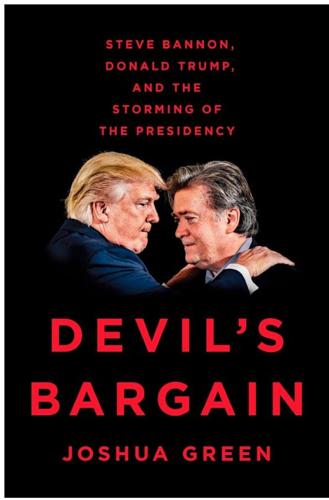
Devil's Bargain: Steve Bannon, Donald Trump, and the Storming of the Presidency
by
Joshua Green
Published 17 Jul 2017
GAI is housed in a sleepy cul-de-sac of two-story brick buildings that looks like what you’d get if Scarlett O’Hara designed an office park. The unmarked entrance is framed by palmetto trees and sits beneath a large, second-story veranda with sweeping overhead fans, where the (mostly male) staff gathers in the afternoons to smoke cigars and brainstorm. Established in 2012 to study crony capitalism and governmental malfeasance, GAI is staffed with lawyers, data scientists, and forensic investigators and has collaborated with such mainstream news outlets as Newsweek, ABC News, and CBS’s 60 Minutes on stories ranging from insider trading in Congress to credit-card fraud among presidential campaigns.
…
What Trump represents is a restoration—a restoration of true American capitalism and a revolution against state-sponsored socialism. Elites have taken all the upside for themselves and pushed the downside to the working- and middle-class Americans.” Bernie Sanders had tried to warn them, but the Democrats hadn’t listened and didn’t break free of crony capitalism. “Trump saw this,” Bannon said. “The American people saw this. And they have risen up to smash it.” For all his early-morning bravado, Bannon sounded as if he still couldn’t quite believe it all. And what an incredible story it was. Given the central role he had played in the greatest political upset in American history, the reporter suggested that it had all the makings of a Hollywood movie.
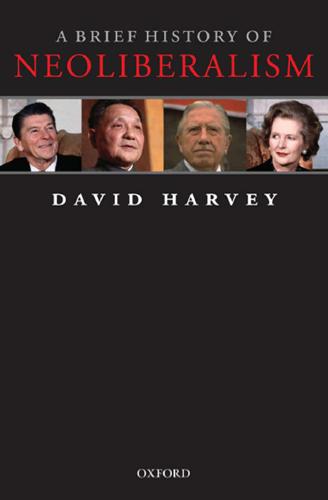
A Brief History of Neoliberalism
by
David Harvey
Published 2 Jan 1995
While the wealthiest Chinese business elite decamped to Singapore, a wave of revenge killings and attacks on property engulfed the rest of the Chinese minority, as ethnonationalism reared its ugly head in search of a scapegoat for the social collapse.9 The standard IMF/US Treasury explanation for the crisis was too much state intervention and corrupt relationships between state and business (‘crony capitalism’). Further neoliberalization was the answer. The Treasury and the IMF acted accordingly, with disastrous consequences. The alternative view of the crisis was that impetuous financial deregulation and the failure to construct adequate regulatory controls over unruly and speculative portfolio investments lay at the heart of the problem.
…
D. 183, 184, 206 Rosenblum, N. 212 Rosenthal, E. 218 Ross, A. 219 Rua, F. de la 105 rural areas 159 urban areas different 125, 126–7, 142–7 Russia 96, 105, 122, 139, 156, 182 freedom concept 17, 19, 32 freedom’s prospect 201, 202 neoliberal state 66, 76, 86 see also Soviet Union Sable, C. 212 Sachs, J. 186, 221 Saez, E. 208 Salerno, J. 214 Salim Group 34, 35–6 Salinas, C. 100–1 Saudi Arabia 27, 104, 139 Scandinavia 12–13 see also Sweden Schwab, K. 81 Seabrook, J. 219 Sen, A. 184 Shah of Persia 28 Shanghai 88, 127, 128, 131–3 passim, 136, 147–8 freedom’s prospect 157, 160 Sharapura, S. 214 Sharma, S. 216 Shenzhen 131, 133, 134, 136, 147 Shi, L. 217 ‘shock therapy’ 71 short-term contracts 166, 168 Silver, B. 222 Simon, W. 46, 49 Singapore 2, 169 and China 120, 138 neoliberal state 71, 81, 85–6 uneven development 89, 91, 96, 97, 116 slave trade 159 Slim, C. 17, 34, 35–6, 104 Smadja, C. 81 Smith, A. 20, 185 Smith, B. 221, 222 Smith, N. 27 social justice 41–2 socialism/communism 2, 12–13, 15, 86 consent 41–3 fight against 28 see also Cold War see also central planning; China; Marx; Soviet Union Soederberg, S. 214, 219 SOEs (state-owned enterprises, China) 125–6, 128, 129, 130, 132, 138, 144, 145 solidarity, social 80–1 Sommer, J. 219 Soros, G. 31, 34, 97–8, 186, 221 South Africa 3, 169 freedom’s prospect 185, 199, 203, 206 uneven development 91, 108, 116, 118 South America 120, 139, 140 consent, construction of 39, 40, 46, 54, 63 freedom concept 7–9, 11, 15–16, 28 freedom’s prospect 185, 186, 201, 206 neoliberal state 65, 74, 75, 79 neoliberalism on trial 153, 154, 160, 163, 165, 167, 174–5, 181 uneven development 91, 94–6, 104–6, 109, 115–18 US comparison with 189, 193, 194 see also Argentina; Brazil; Chile South East Asia 2 ASEAN 79 and China 120, 122, 130, 138–41 passim consent, construction of 40, 41, 53 freedom concept 5, 19, 31–2 neoliberal state 71, 76, 81, 85–6 neoliberalism on trial 153, 154, 156, 163, 167–9, 175, 178 uneven development 89, 91, 94, 96–7, 108–9, 116, 117, 118 see also crisis under Asia; Indonesia; Malaysia; Singapore; Thailand South Korea 2, 35, 169 and China 120, 123, 134, 136, 138–40 freedom’s prospect 199, 206 neoliberal state 72, 85 uneven development 89–91 passim, 94, 96, 97, 106–12, 115, 116, 118 ‘sovereignty’ 7 Soviet Union 117, 154 collapse of 3, 32, 87 freedom concept 5, 10, 22, 32 see also Russia Spain 12, 15 special economic zones (China) 130 sport 85, 132, 164 stagflation see under inflation Stanislaw, J. 51, 208, 211 state authoritarianism and market economy combined see China ‘crony capitalism’ 97 monopoly 98 -owned enterprises see SOEs uneven development 112, 115 see also neoliberal state; welfare Stevenson, C. 215 Stiglitz, J. 29, 51, 74, 152 freedom’s prospect 186, 221 uneven development 93, 98, 111, 118, 211, 213, 214 Strauss, L. 92 Stren, R. 212 strikes see unions structural adjustment 163, 188–9 student movements 99, 100 consent, construction of 41, 42, 44 Tiananmen Square 5, 123, 142, 176 Sudan 139, 173 Suez venture (UK) 55–6 Suharto, T.
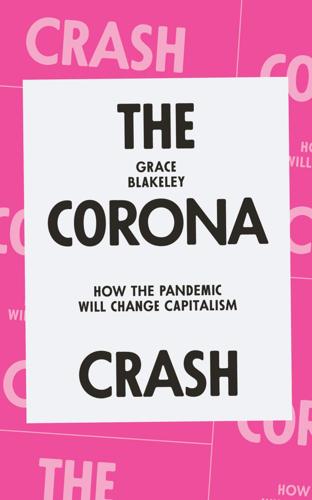
The Corona Crash: How the Pandemic Will Change Capitalism
by
Grace Blakeley
Published 14 Oct 2020
In other words, we will increasingly see private planning of the economy. Free market, competitive capitalism – if it ever actually existed – is dead. Many economic libertarians would recognise this critique. They frequently complain about moral hazard and loose monetary policy, blaming the overactivity of the state for the emergence of a form of ‘crony capitalism’ characterised by market centralisation, complex regulation and low productivity, and arguing for a return to a purer, more competitive, freer version of capitalism. These arguments are generally pitted against those of social democrats, who respond that state intervention is necessary to mitigate the ups and downs of the business cycle – to protect workers from the caprices of capitalist accumulation.
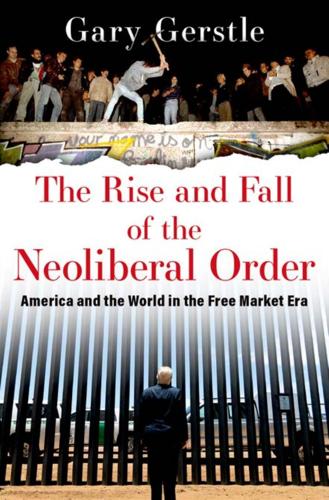
The Rise and Fall of the Neoliberal Order: America and the World in the Free Market Era
by
Gary Gerstle
Published 14 Oct 2022
In the first two years of occupation, these firms often failed to deliver on their promise of getting Iraq’s infrastructural systems up and running with speed and efficiency. But they were still handsomely paid for their work. If Hussein had engaged in crony socialism, the Americans were engaging in crony capitalism. None of this was lost on the Iraqis themselves, now reduced to unemployed bystanders in the Iraq rebuilding charade. No wonder many began contemplating using their remaining resources to join an insurgency against the American occupiers and their armies of private contractors. Naomi Klein, in her book The Shock Doctrine, portrays the course of events in Iraq as flowing directly from neoliberal principles cooked up in University of Chicago economics seminars and straightforwardly applied in this unfortunate Arab country.
…
domestic neoliberal politics under, 3–4, 205–10 election win, 189–91 homeownership goals, 210–17 Iraq War, 189, 195–205, 222 Bush, Jeb, 190 Business Roundtable, 110, 112 cable television, 166–67 Calamari, Matthew, 247 Campbell, W. Glenn, 47 Capital for the Twenty-First Century (Piketty), 254–55 capitalism American capitalism, 20, 31, 42–43, 139 in China, 10 communism and, 141, 147–48 crony capitalism, 201 curtailing destructive chaos of, 23 free market capitalism, 4–5, 99–100, 105, 108–9, 120–21, 133–34, 144–45, 173, 195–96, 204, 254–55 globalization of, 145–46 internationalist capitalist economy, 31 market capitalism, 195–96, 200 neoliberalism and, 4–12 Capitalism and Freedom (Friedman), 94–95 Capitol Hill violence (2021), 1, 288–89 capture thesis (political science), 159 Carnegie, Andrew, 169 Carter, Jimmy, 64–69, 121–22 Castle Rock Entertainment, 172 Catholic Americans, 133 Catholics, 27, 118–19 Cato Institute, 102–3, 109 Center for American Progress, 278–79 Centers for Disease Control (CDC), 280 Chamberlain, Neville, 55 Chauvin, Derek, 286 Chicago School of Economics, 90–91, 201 China, 10, 37, 271–72 Chinese Communist Party, 143, 145–46 Chinese democracy movement, 143 Chomsky, Noam, 254–55 Christie, Chris, 268 Chrysler Corporation, 62 Churchill, Winston, 36–37 Civil Aeronautics Board (CAB), 67 civil rights, 49, 50–51, 117, 124–25, 138 Civil Rights Act (1964), 53–54, 95, 125 Civil War, 79–80 classical liberalism, 5–9, 25–26, 93 Clinton, Bill minority homeowners under, 212, 213–14 neoliberalism and, 1, 2–4, 11, 137–38 New Deal order and, 152–64 New Left and, 14–15 political dissent, 179–88 restructuring of political economy, 4–5 Telecommunications Act, 164, 165–73, 181 Wall Street reform and, 173–78 Clinton, Hillary Rodham Clinton, Bill and, 153, 154–55, 186–87 election loss, 265–66 neoliberalism and, 260–65 Obama, Barack and, 222, 223–24 Sanders, Bernie and, 254–55, 259–62 Trump, Donald and, 250 CNN, 128, 172 Coalition Provisional Authority (CPA), 198 Cobb, Jelani, 263–64 Cohen, Michael, 245–46 Cohn, Gary, 270–71, 276 Cold War era, 10, 11–12, 29, 35–47, 48–54, 129–32 collective bargaining, 27–28, 81–82, 85 collectivism, 23, 73–74, 82–84, 85, 86, 100–1 Colloque Lippmann, 73–74, 86–87, 135–36 Comey, James, 265–66 Coming Apart (Murray), 231–34 Commodity Futures Modernization Act (2000), 213 Commonwealth of Independent States (CIS), 141–42 Communications Act (1934), 26, 125–26, 165, 170 Communications Decency Act, 169–70 communism capitalism and, 141, 147–48 cybernetic revolution and, 161–63 economic stagnation under, 69 impact on neoliberalism, 10–12, 20–21 labor movement militancy, 23 New Deal order and, 10–12, 27–35 Republican Party and, 38–47 World War II impact on, 33–35 Community Action Program, 159 conformism, 95–96 conservatism, 4–12, 28, 38 The Constitution of Liberty (Hayek), 97–98 consumer spending crisis, 214–15 Coors, Joseph, Jr., 108–9, 114 corporate welfare, 180–81 cosmopolitanism, 5, 8–9, 13, 182–83, 186, 208, 209 Council of Economic Advisers, 66, 171, 224, 284 Court, Warren, 118–19 Covid-19 pandemic, 272, 279–81, 282–83 crime rates, 1980s, 130–31 Croly, Herbert, 80–82 crony capitalism, 201 Cuban Missile Crisis, 219–20 culture wars, 4–5, 14, 15, 186–88 cybernetic revolution, 161–63 Daily Kos (blog), 278–79 Dart, Justin, 110–12 Debs, Eugene, 82–83 Debt: The First 5,000 Years (Graeber), 252–53 Defense Production Act (1950), 280 deindustrialization, 63–64 democracy American democracy, 1, 7, 282–83, 287–88, 289 Chinese democracy movement, 143 communism and, 187–88 Iraq war and, 195–96, 197–98, 203–4 liberal democracy, 147–48, 277 media corporations and, 165 neoliberalism impact on, 7, 91–92, 96–97 New Leftists impact on, 66 popular democracy (Ralph Nader), 66, 143 proletarian democracy, 33 social democracy, 6–7, 34–35 Democratic Leadership Council (DLC), 137–38, 180–81 Democratic National Committee, 64–65 Democratic Party. see also specific Democratic presidents acquiescence/resistance to neoliberalism, 135–40 African Americans, shift to, 48–49 civil rights and, 117 electoral constituencies and, 21–22 Keynesian economic ideas, 22–23 neoliberal order and, 2–3 New Deal order and, 20–27, 118, 152–64 support from religious groups, 27 white supremacy and, 49 Deng Xiaoping, 143, 145–46, 187–88 deregulation, 5, 68, 156–57, 228, 276 Disloyal (Cohen), 245–46 Disney Corporation, 172 Dixiecrats, 117–18 Dole, Robert, 209 Dow Jones Industrial Average, 60–61, 220–21 Duggan, Lisa, 102 Dukakis, Michael, 137 Dyson, Esther, 160–61, 162–63 economic liberalism, 76–78 economic recession, 48, 107–8 Economic Recovery Tax Act (1981), 122 Efron, Edith, 111–12 Eisenhower, Dwight D.
…
Glenn, 47 Capital for the Twenty-First Century (Piketty), 254–55 capitalism American capitalism, 20, 31, 42–43, 139 in China, 10 communism and, 141, 147–48 crony capitalism, 201 curtailing destructive chaos of, 23 free market capitalism, 4–5, 99–100, 105, 108–9, 120–21, 133–34, 144–45, 173, 195–96, 204, 254–55 globalization of, 145–46 internationalist capitalist economy, 31 market capitalism, 195–96, 200 neoliberalism and, 4–12 Capitalism and Freedom (Friedman), 94–95 Capitol Hill violence (2021), 1, 288–89 capture thesis (political science), 159 Carnegie, Andrew, 169 Carter, Jimmy, 64–69, 121–22 Castle Rock Entertainment, 172 Catholic Americans, 133 Catholics, 27, 118–19 Cato Institute, 102–3, 109 Center for American Progress, 278–79 Centers for Disease Control (CDC), 280 Chamberlain, Neville, 55 Chauvin, Derek, 286 Chicago School of Economics, 90–91, 201 China, 10, 37, 271–72 Chinese Communist Party, 143, 145–46 Chinese democracy movement, 143 Chomsky, Noam, 254–55 Christie, Chris, 268 Chrysler Corporation, 62 Churchill, Winston, 36–37 Civil Aeronautics Board (CAB), 67 civil rights, 49, 50–51, 117, 124–25, 138 Civil Rights Act (1964), 53–54, 95, 125 Civil War, 79–80 classical liberalism, 5–9, 25–26, 93 Clinton, Bill minority homeowners under, 212, 213–14 neoliberalism and, 1, 2–4, 11, 137–38 New Deal order and, 152–64 New Left and, 14–15 political dissent, 179–88 restructuring of political economy, 4–5 Telecommunications Act, 164, 165–73, 181 Wall Street reform and, 173–78 Clinton, Hillary Rodham Clinton, Bill and, 153, 154–55, 186–87 election loss, 265–66 neoliberalism and, 260–65 Obama, Barack and, 222, 223–24 Sanders, Bernie and, 254–55, 259–62 Trump, Donald and, 250 CNN, 128, 172 Coalition Provisional Authority (CPA), 198 Cobb, Jelani, 263–64 Cohen, Michael, 245–46 Cohn, Gary, 270–71, 276 Cold War era, 10, 11–12, 29, 35–47, 48–54, 129–32 collective bargaining, 27–28, 81–82, 85 collectivism, 23, 73–74, 82–84, 85, 86, 100–1 Colloque Lippmann, 73–74, 86–87, 135–36 Comey, James, 265–66 Coming Apart (Murray), 231–34 Commodity Futures Modernization Act (2000), 213 Commonwealth of Independent States (CIS), 141–42 Communications Act (1934), 26, 125–26, 165, 170 Communications Decency Act, 169–70 communism capitalism and, 141, 147–48 cybernetic revolution and, 161–63 economic stagnation under, 69 impact on neoliberalism, 10–12, 20–21 labor movement militancy, 23 New Deal order and, 10–12, 27–35 Republican Party and, 38–47 World War II impact on, 33–35 Community Action Program, 159 conformism, 95–96 conservatism, 4–12, 28, 38 The Constitution of Liberty (Hayek), 97–98 consumer spending crisis, 214–15 Coors, Joseph, Jr., 108–9, 114 corporate welfare, 180–81 cosmopolitanism, 5, 8–9, 13, 182–83, 186, 208, 209 Council of Economic Advisers, 66, 171, 224, 284 Court, Warren, 118–19 Covid-19 pandemic, 272, 279–81, 282–83 crime rates, 1980s, 130–31 Croly, Herbert, 80–82 crony capitalism, 201 Cuban Missile Crisis, 219–20 culture wars, 4–5, 14, 15, 186–88 cybernetic revolution, 161–63 Daily Kos (blog), 278–79 Dart, Justin, 110–12 Debs, Eugene, 82–83 Debt: The First 5,000 Years (Graeber), 252–53 Defense Production Act (1950), 280 deindustrialization, 63–64 democracy American democracy, 1, 7, 282–83, 287–88, 289 Chinese democracy movement, 143 communism and, 187–88 Iraq war and, 195–96, 197–98, 203–4 liberal democracy, 147–48, 277 media corporations and, 165 neoliberalism impact on, 7, 91–92, 96–97 New Leftists impact on, 66 popular democracy (Ralph Nader), 66, 143 proletarian democracy, 33 social democracy, 6–7, 34–35 Democratic Leadership Council (DLC), 137–38, 180–81 Democratic National Committee, 64–65 Democratic Party. see also specific Democratic presidents acquiescence/resistance to neoliberalism, 135–40 African Americans, shift to, 48–49 civil rights and, 117 electoral constituencies and, 21–22 Keynesian economic ideas, 22–23 neoliberal order and, 2–3 New Deal order and, 20–27, 118, 152–64 support from religious groups, 27 white supremacy and, 49 Deng Xiaoping, 143, 145–46, 187–88 deregulation, 5, 68, 156–57, 228, 276 Disloyal (Cohen), 245–46 Disney Corporation, 172 Dixiecrats, 117–18 Dole, Robert, 209 Dow Jones Industrial Average, 60–61, 220–21 Duggan, Lisa, 102 Dukakis, Michael, 137 Dyson, Esther, 160–61, 162–63 economic liberalism, 76–78 economic recession, 48, 107–8 Economic Recovery Tax Act (1981), 122 Efron, Edith, 111–12 Eisenhower, Dwight D.
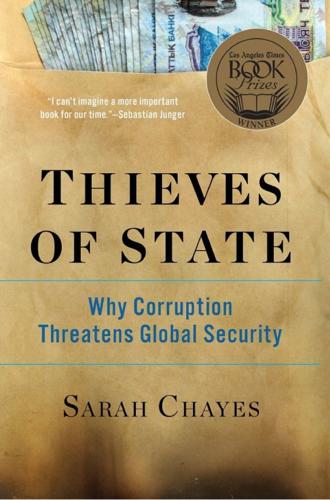
Thieves of State: Why Corruption Threatens Global Security
by
Sarah Chayes
Published 19 Jan 2015
Nederman (Cambridge: Cambridge University Press, 1990), bk. 6, chap. 24, p. 133. 4. Niccolò Machiavelli, The Prince, trans. (into French) Marie Gaille-Nikodimov (Paris: Librairie générale française, 2000), p. 131. 5. By 2014, the pattern was even visible to the mainstream Economist Magazine. See “Our Crony Capitalism Index: Planet Plutocrat,” March 15, 2014. Chapter Seven: Variation 1 1. Shana Marshall and Joshua Stacher, “Egypt’s Generals and Transnational Capital,” Middle East Research and Information Project 262: Spring 2012. 2. Robert Springborg, Naval Postgraduate School professor, quoted in Cam Simpson and Mariam Fan, “Egypt’s Army Marches, Fights, Sells Chickens,” Bloomberg Businessweek, February 17, 2011, http://buswk.co/1mh6qaN. 3.
…
Nathan Brown, “Why Do Egyptian Courts Say the Darndest Things,” Washington Post, March 25, 2014. 12. Gamal Amin, Egypt in the Era of Hosni Mubarak (Cairo: American University in Cairo Press, 2011), p. 8. 13. “Underlying the movement’s economic views is a conviction that the old order was run on the basis of corruption at all levels: crony capitalism at the top seeping down to lower-level coping mechanisms of those left out of the scramble to exploit state resources for private ends. What the Brotherhood offers as a remedy is virtue.” Nathan J. Brown, When Victory Becomes an Option: Egypt’s Muslim Brotherhood Confronts Success (Washington, D.C.: Carnegie Endowment for International Peace, January 2012), p. 15.
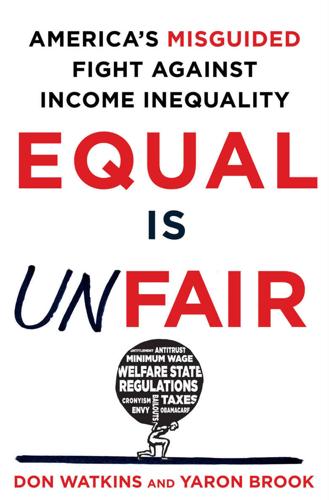
Equal Is Unfair: America's Misguided Fight Against Income Inequality
by
Don Watkins
and
Yaron Brook
Published 28 Mar 2016
Carney, The Big Ripoff (New York: Wiley, 2006), pp. 59–61. 11. Chris Edwards, “Agricultural Subsidies,” DownsizingGovernment.org, June 2009, http://www.downsizinggovernment.org/agriculture/subsidies (accessed May 28, 2015). 12. Timothy P. Carney, Obamanomics (Washington, DC: Regnery, 2009), p. 122. 13. Hunter Lewis, Crony Capitalism in America: 2008–2012 (Edinburg, VA: AC2 Books, 2013), p. 104. 14. Timothy P. Carney, “Carney: How Hatch Forced Microsoft to Play K Street’s Game,” Washington Examiner, June 24, 2012, http://www.washingtonexaminer.com/carney-how-hatch-forced-microsoft-to-play-k-streets-game/article/2500453 (accessed May 28, 2015), Michael Kinsley, “Michael Kinsley: The Washington Lobbying Dance,” Los Angeles Times, April 5, 2011, http://articles.latimes.com/print/2011/apr/05/opinion/la-oe-kinsley-column-microsoft-20110405 (May 28, 2015). 15.
…
Russell Roberts, “Gambling with Other People’s Money: How Perverted Incentives Caused the Financial Crisis,” Mercatus Center, April 28, 2010, http://mercatus.org/publication/gambling-other-peoples-money (accessed May 28, 2015). 27. Jim Manzi, “Do CEOs Matter? Absolutely,” Atlantic, June 5, 2009, http://www.theatlantic.com/business/archive/2009/06/do-ceos-matter-absolutely/18819/ (accessed May 28, 2015). 28. Steven N. Kaplan, “The Real Story behind Executive Pay: The Myth of Crony Capitalism,” Foreign Affairs, April 3, 2013, https://www.foreignaffairs.com/articles/2013-04-03/real-story-behind-executive-pay (accessed May 28, 2015). 29. Piketty, Capital in the Twenty-First Century, pp. 302–303. 30. Albert R. Hunt, “Corporate Chiefs May Come to Rue Fat Paydays: Albert R.
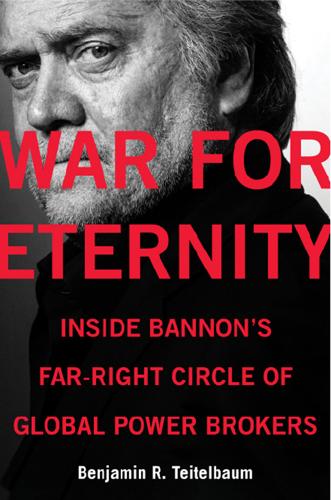
War for Eternity: Inside Bannon's Far-Right Circle of Global Power Brokers
by
Benjamin R. Teitelbaum
Published 14 May 2020
He called for capitalism to be subordinated to spirituality—to Jewish or Christian values in particular—so as to blunt its instinct to treat human beings as commodities. He called for a conservative revolution, not against leftists, but against the conservative establishment in the West, which was peddling elitism and ensuring crony capitalism. A rebellion was bound to happen, he was sure. It would happen in Europe with nationalist parties like the UK Independence Party (UKIP) and National Rally (formerly National Front) in France. It would happen in the United States through the Tea Party—even Latin America and India were likely candidates.
…
Dugin saw deep problems in Olavo’s accounting of the power dynamics in the world as well. Could you really equate the economic and cultural globalism emanating from the United States with that coming from the others? In other words, is there really as much Russo-Chinese militarism and Islam in the world as there is crony capitalism? Of course not, and any opponent of globalism should accordingly get his priorities straight. Further, while he understood the criticisms against the Russian state, what about America’s crimes? “Hiroshima and Nagasaki, the occupation of Iraq and Afghanistan, the bombing of Serbia.” It seemed preposterous to separate that legacy and “Western finance” from the United States on the grounds that its native culture was a helpless victim of it all.
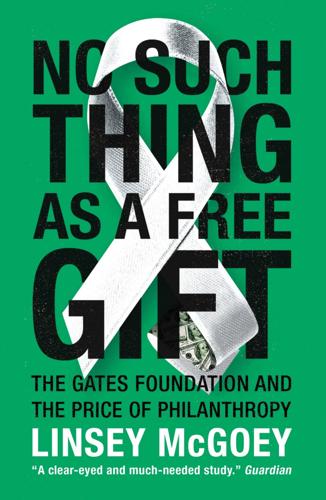
No Such Thing as a Free Gift: The Gates Foundation and the Price of Philanthropy
by
Linsey McGoey
Published 14 Apr 2015
In both pre-industrial and capitalist economies, wealth is often augmented through what Offer calls ‘economies of regard’: the ability to court favour through extending a network of exclusive political or social contacts; through knowing how to act, dress, and speak around such contacts; through sensitive adherence to duties of gift-giving and economic ‘freebies’ (the corporate box, the Wimbledon tickets, the conference goodie bags).14 Attention to ‘economies of regard’ helps to underscore a rather obvious point. Often, people lament the rise of ‘crony capitalism’ as if cronyism is an aberration of good operating practices. In reality, crony capitalism is not a perversion of business as usual. It is business as usual. In Guistra’s words, ‘generosity can be very profitable’. A curiosity noted by early anthropologists such as Malinowski is that gift-giving often increased the power of the initiator of a gift exchange more so than the recipient, augmenting a donor’s ability to capitalize on an ever-growing number of dependents.
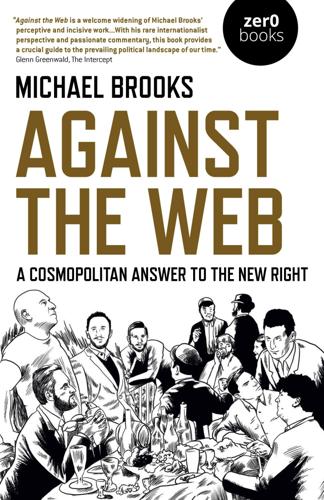
Against the Web: A Cosmopolitan Answer to the New Right
by
Michael Brooks
Published 23 Apr 2020
The unfulfilled promise of this next phase of liberation has kept the obscene economic inequality that has long characterized South Africa in place; in turn, many of the old structures of racial hierarchy remain, and the country continue s to generate political forces that traffic in demagoguery, crony capitalism, and a shallow technocratic liberalism. These problems are hardly unique to South Africa. Much of what has gone wrong there are local manifestations of global trends. What the world needs to counter these forces is a renewed commitment to the kind of international socialist politics embodied in the Freedom Charter.
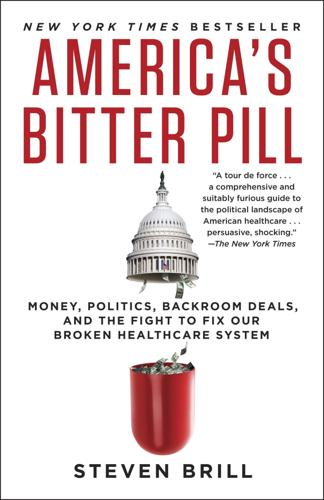
America's Bitter Pill: Money, Politics, Backroom Deals, and the Fight to Fix Our Broken Healthcare System
by
Steven Brill
Published 5 Jan 2015
Most political observers would later consider this the beginning of the Tea Party movement, the loosely organized assortment of grassroots groups of mostly conservative people that staged rallies across the country beginning in the spring of 2009 to protest all varieties of government interference and Washington crony capitalism. By the summer of 2009, Washington’s idea of healthcare reform would become the Tea Party’s prime target. For as Santelli screamed into his microphone, a group of capital insiders representing multiple factions of America’s biggest industry—healthcare—was negotiating exactly the kinds of secret deals that would have made Santelli scream louder had he known about them.
…
Then he had routinely vowed, as he put it during a town hall in Virginia, that in framing his healthcare reform bill, “We’ll have the negotiations televised on C-SPAN, so that people can see who is making arguments on behalf of their constituents, and who are making arguments on behalf of the drug companies or the insurance companies.” Instead, he had given the Tea Party activists exhibit A in crony capitalism—if they ever found out about it. THE NONPROFITS’ PROFITS The hospitals were next up at the Finance Committee negotiating table. More than 75 percent of America’s 5,700 hospitals were officially nonprofit institutions. So, they have no shareholders and, therefore, no stock analysts following them and issuing reports that Tony Clapsis could read.
…
But that shouldn’t have been a problem in Democratic Philadelphia, especially for Specter, who had begun his political career there. What had inflamed the crowd was healthcare reform, which was now starting to be called Obamacare. The crowd had been organized by one of the Tea Party groups that had sprung up following Rick Santelli’s CNBC rant in February. They were fed up, they proclaimed, with bailouts, crony capitalism, secret deals, and the government relentlessly trying to interfere with their lives. To them, Obamacare epitomized all that. The next day, in Adel, Iowa, Chuck Grassley got booed off the stage by hecklers holding “You’re fired” signs. Their principal complaint, too, was the purported government takeover of their healthcare.
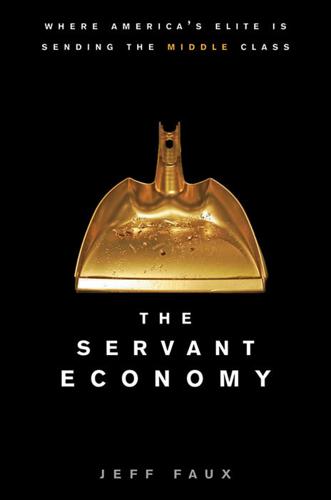
Servant Economy: Where America's Elite Is Sending the Middle Class
by
Jeff Faux
Published 16 May 2012
When there is an economic downturn and the money stops rolling in, not only will the banking system spasm, but the entire fabric of Chinese society will shudder.”22 Friedman’s confidence in China’s meltdown is shared by a significant portion of U.S. policy intellectuals. It rests on an assumption that China’s ethnic conflicts make it an inherently unstable country, unnaturally held together by Mao’s revolutionary dictatorship and then by the wealth generated by crony capitalism. But British journalist Martin Jacques has pointed out that the Han Chinese represent 92 percent of the population and consider themselves not only one people but one race. “The explanation for this,” writes Jacques, “lies in the unique longevity of Chinese civilization, which has engendered a strong sense of unity and common identity while also, over a period of thousands of years, enabled a mixing and melding of a multitude of diverse races.”23 Jacques reminds us that the overwhelming majority of Chinese have lived in the same regions for about two thousand years, “acquiring a unity which has, despite long periods of Balkanization, lasted until the present.”24 From the mid-nineteenth century until the 1949 revolution, the country was exploited by outsiders, and this created a profound sense of nationalism.
…
If you are an American, your future depends on us doing just that. Notes 1. Martin Fackler, “Japan Goes from Dynamic to Disheartened,” New York Times, October 17, 2010. 2. Naomi Klein, “Capitalism vs. the Climate,” Nation, November 28, 2011. 3. “Bank Bailouts Supporter Palin Criticizes TARP as ‘Crony Capitalism,’ ‘Slush Fund . . . Just As We Had Been Warned About,’ ” Media Matters, February 6, 2010, http://mediamatters.org/mmtv/201002060024. 4. John Nichols, “Rick Perry’s Attack on Democracy,” Nation, October 10, 2011, http://www.thenation.com/article/163548/rick-perrys-attack-democracy. 5. Mark Danner, “State of Exception,” New York Review of Books, October 13, 2011. 6.
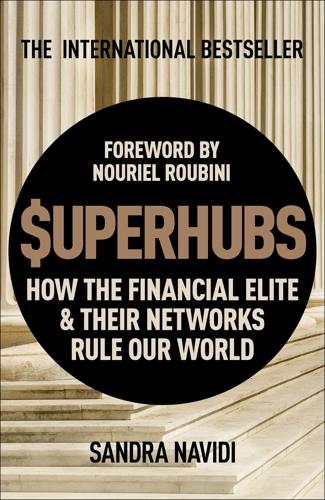
SUPERHUBS: How the Financial Elite and Their Networks Rule Our World
by
Sandra Navidi
Published 24 Jan 2017
Even Asher Edelman, the real-life Gordon Gekko on whom the movie Wall Street’s ruthlessly greedy protagonist was partly modeled, has turned dissident, arguing for the self-proclaimed democratic socialist Bernie Sanders as the best option for the U.S. economy.18 The economic discontent has led to unprecedented political polarization, pitting the “have-nots” against the “haves,” the proletariat against the intellectual elite, and the young against the old. People are acutely aware of the democratic deficit resulting from the undue collusion of the financial, corporate, and political sectors, and many feel that the system has been hijacked and rigged by special interests. They have come to detest crony capitalism—in which gains are privatized and losses are borne by the public, while bankers continue to award themselves record-setting bonuses. EU populist parties and “extremist” U.S. presidential candidates reflect the explosive anger of globalization’s losers, who are now lobbying for radical change in greater numbers.
…
See Personal connections Conspiracy theories, 111 Consultancy firms, 43 Consulting, 49 Consumer Financial Protection Bureau, 153 Contagion effect, 217 Contextual intelligence, 62, 97 “Convening power,” 25 Cooperatives, 90 Corbat, Michael, 88, 174 Corporate culture, 223–224 Corporations, global, 178–179 Corzine, Jon, 85 Council of Economic Advisers, 47–48, 84, 188 Council on Foreign Relations, 105, 166, 168, 170 Council on Systemic Financial Risk, 1 Coups d’état, 139–141 Credibility, 25 Credit Suisse, 2–3, 138 Crisis of Global Capitalism, The, 65 Crony capitalism, 212 Cult of failure, 64–65 Cultural capture, 46 “Cultural fit,” 80 Culture, 220–221, 223–224 Currency information as, 39–41 misinformation as, 41 D D. E. Shaw, 188 Dakota building, 199–200 Daley, William, 165 Dalio, Ray, xxvii Anthony Scaramucci and, 24 background on, 69–72 meditation by, 62, 70 net worth of, 88 Principles, 63, 71 Robin Hood Foundation and, 76 spouse of, 135 Dallara, Charles, 27, 107, 131–133 Dallara, Peixin, 131–133 D’Andrea Tyson, Laura, 185 Das, Satyajit, 210 Davos access to, 113 attendees of, 2, 4, 113–114 central bankers at, 33 critics of, 95 description of, 1–4, 96, 112–116 drawbacks of, 113 environment of, 2–3 hierarchy at, 114 hotels in, 2–3 networking at, 113–114 parties at, 114–116 peer-to-peer networking at, 5, 9 purpose of, 4 status markers at, 114 superhubs at, 8–12 Dealbreaker, 71 Debt, 210 Decision makers, proximity to, 42 Dell, Michael, 115 Democratic Party, 168 Den of Thieves, 190 Depression, 137 Deripaska, Oleg, 9, 69 Deutsche Bank, 27, 42, 101, 105, 118, 120–121, 131, 136, 141, 143, 176 Diamond, Bob, 43, 137, 205 Dijsselbloem, Jeroen, 121 DiMartino, Joseph, 199 Dimon, Jamie alma mater of, 174 as superhub, 11, 56 as type A personality, 56–57 background on, 55–58 charity by, 76 Elizabeth Warren and, 225 financial losses by, 23, 51 firings by, 140–141 general references to, xxv, 79 at JPMorgan, 9.
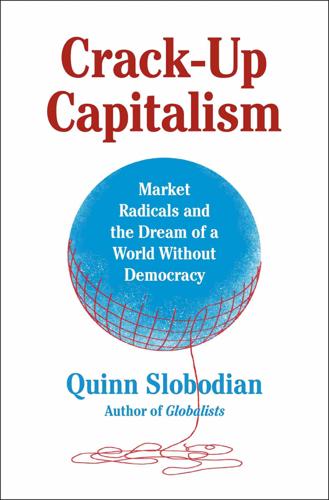
Crack-Up Capitalism: Market Radicals and the Dream of a World Without Democracy
by
Quinn Slobodian
Published 4 Apr 2023
The net worth of Hong Kong’s top ten billionaires accounts for 35 percent of its GDP, as compared to 3 percent for the United States.136 From its founding, Hong Kong was less a freewheeling market open to all entrants than an economy controlled by a handful of merchant houses—and later family conglomerates and tycoons—with a cozy relationship to the government.137 Studies show “the ten largest families in Hong Kong controlled about a third of the corporate sector.”138 Less celebrated than the economic freedom index was the fact that Hong Kong topped the Economist’s “crony capitalism index.”139 This was a capitalist paradise with little competition. The lack of inheritance tax means the wealth is dynastic and leaves little interest in challenging the status quo. Thomas Piketty and Li Yang found that the top 15 percent wealthiest in Hong Kong were the least likely to support moves to more democracy.140 In the end, the essence of the Hong Kong model was not an abstract idea of economic freedom.
…
See also city-states; specific cities as legal islands as mines turned upside down citizenship(s) citizen-customers by contract “contract citizens” in Liechtenstein multiple opt-in, opt-out version of replaced by customers rights of City of London city-states Civil War (US), revisionist interpretations of clans Clavell, James climate change Clinton, Bill cloud country coaling stations Cold War end of colonialism free enterprise and by invitation revival of colonization Columbus, Christopher commodification, utopia and Commonwealth of Southern States communism vs. capitalism collapse of communities, self-policing by company towns Confucian capitalism Conservative Party (UK) container ships container terminals contract(s) “contract citizens” contractual communities social contract Cool Britannia corporate governance Corporation of London corporations corporate taxes corporate welfare development corporations sovereign corporations (sovcorps) cosplay Costa Rica “countrypreneurship” COVID-19 pandemic Cowen, Deborah crack-up capitalism definition of significance of Crane, Ed crisis of democracy as galvanizer Croatia “crony capitalism index” “Crown colonies” cryptocurrency cryptography CSX World Terminals cultural essentialism “culture fever” Cummings, Dominic cybercash cyberpunk cyberspace Cyprus Czechoslovakia Dallas, Texas Davidson, James Dale Davidson, Jim Davis, Mike debt brake decentralization decolonization deglobalization Deist, Jeff Delaware delivery services democracy abandonment of absence of artificial intelligence and automation and capitalism without crisis of direct in Hong Kong language of markets and messiness of movement away from social democracy narratives about nation branding and in question in United States republican restricted franchise and revival of in Singapore Democracy for Docklands democratic capitalism “democratic feudalism” democratization, narratives about Deng Xiaoping deregulation Deutsche Bank development corporations direct democracy “discontinuists” disenfranchisement disintegration distributed networks Djibouti, Somaliland Djibouti-Ambouli International Airport Dominican Republic–Central America–United States Free Trade Agreement Doraleh oil terminal DP World (Dubai Ports World) drug trafficking Dubai, United Arab Emirates authoritarianism in citizens of expansion of expats in foreign population in foreign workers in global financial crisis and globalization and hyperreality of journalists and migrants in radical legal pluralism in real estate in rise of in early 2000s United States and Dubai Healthcare City Dubai International Financial Centre (DIFC) Dubai Knowledge Village (Knowledge Park) Dubai World Trade Centre Duke Cariadoc of the Bow duty-free zones East Asia.
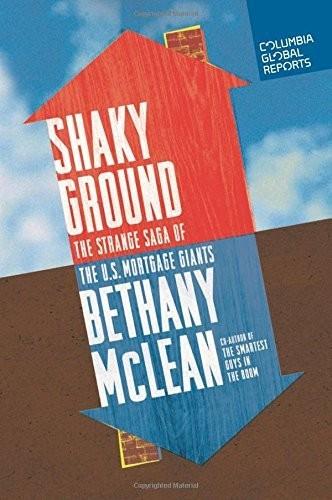
Shaky Ground: The Strange Saga of the U.S. Mortgage Giants
by
Bethany McLean
Published 13 Sep 2015
q=306BF929-5A1A-41FC-9737-691E189D7D2F&app=eccafile 56wealthiest 40 percent of borrowers: “Changes in Buyer Composition and the Expansion of Credit During the Boom,” by Manuel Adelino, Antoinette Schoar, and Felipe Severino, National Bureau of Economic Research, January 2015. http://www.nber.org/papers/w20848 58“What’s good for American housing”: “Fannie Mae’s Last Stand,” by Bethany McLean, Vanity Fair, February 2009. http://www.vanityfair.com/news/2009/02/fannie-and-freddie200902 59“attracts too little private capital”: “Early Steps Down the Path of GSE Reform,” by Jim Parrott, the Urban Institute, March 2015. http://www.urban.org/sites/default/files/alfresco/publication-pdfs/2000155-Early-Steps-Down-the-Path-of-GSE-Reform.pdf 60“scoring an executive post at Fannie Mae”: “Nice work if you can get it: how Fannie Mae became Washington’s biggest power player,” by Michelle Cottle, Washington Monthly, June 1, 1998. http://www.thefreelibrary.com/Nice+work+if+you+can+get+it%3A+how+Fannie+Mae+became+Washington%27s…-a020789484 61“Fannie has this grandmotherly image”: “Crony Capitalism: American Style,” by Owen Ullmann, The International Economy, July/ August 1999. http://www.international-economy.com/TIE_JA99_Ullmann.pdf 62Sarah Lehman Quinn’s dissertation: “Government Policy, Housing, and the Origins of Securitization, 1780–1968,” by Sarah Lehman Quinn, 2010. https://escholarship.org/uc/item/7sq3f6xk 63“Roosevelt Charges Federal Neglect of ‘Little Fellow,’” New York Timest April 8, 1932. http://query.nytimes.com/gst/abstract.html?
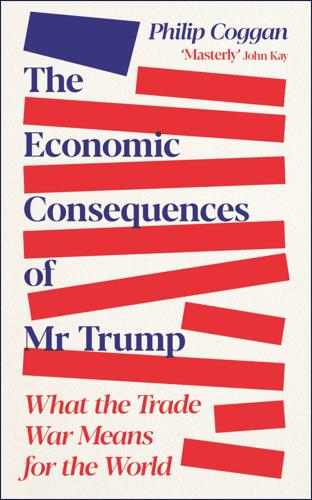
The Economic Consequences of Mr Trump: What the Trade War Means for the World
by
Philip Coggan
Published 1 Jul 2025
The underlying idea was that the western world was exploiting these countries by flooding them with manufactured imports, leaving them to focus on low-margin and volatile commodity production. Instead, developing nations aimed to exclude imports and build their own industries in areas such as cars and domestic appliances. The problem with import substitution industrialisation is that it very easily leads to crony capitalism in which favoured businesses prosper safe in the knowledge that they cannot be undermined by foreign competition. The result is higher prices and inferior goods for domestic consumers. Such products are not good enough to compete in global markets. By contrast, some of the success stories in Asia, such as Taiwan and South Korea, focused on generating more exports, rather than excluding imports.
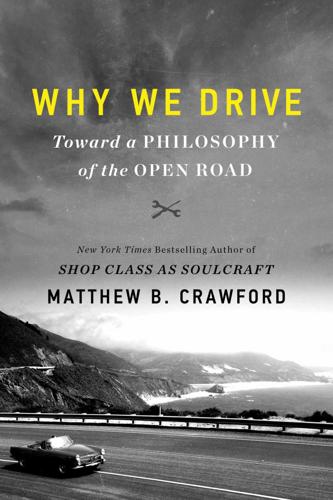
Why We Drive: Toward a Philosophy of the Open Road
by
Matthew B. Crawford
Published 8 Jun 2020
The litigation record in our case documents the resources which both NHTSA and Tesla were willing to commit to prevent public scrutiny of this taxpayer funded research, based on a fear of competitive harm to Tesla. The adversarial relationship which ought to obtain between regulators and industry, and between both of these and the profession of journalism, becomes a fiction under “crony capitalism.” One gets the sense that these are no longer separate elites; that they have merged into a super-elite bent on controlling the narrative of progress, even if at the cost of the public interest. WE HAVE A RISK BUDGET At a conceptual level, the difficulties of disentangling the causal factors in traffic accidents, and the toll of such accidents when they occur, remain much as they were in 1975 when Sam Peltzman published his influential study Regulation of Automobile Safety.
…
See also Crawford-Lambert rat driving project Crawford-Lambert rat driving project building rat car, 61 Crawford, L. Elizabeth and, 59–65 driver’s education, 62–63 effort-driven rewards, 64–65 inducing a conditioned response, 62–63 rat ergonomics and, 61–62 self-motion and, 59–60 skills vs. tasks, 60 tool use, 62–63 Croly, Herbert, 38, 138 crony capitalism, 90 cultural development, 65 Daimler, 304 Datsun 510, 80 David, Joe, 203 Davis, Joe, 19 death algorithm, 117 The Death and Life of Great American Cities (Jacobs), 35–36 deference to machines, 126 delegation, societal effect of, 119 demolition derby, 184–187. See also motor sports; soap box derby Department of Motor Vehicles experience, 213–214 digital Rust Belt, 290 dilemma zone, 219–220 dirt bike riding.
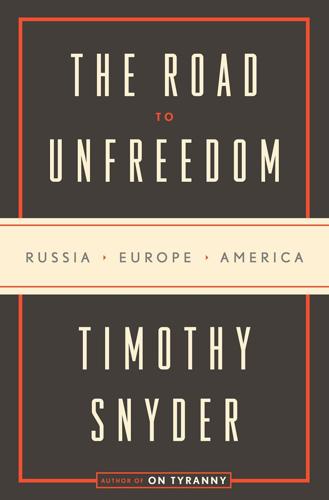
The Road to Unfreedom: Russia, Europe, America
by
Timothy Snyder
Published 2 Apr 2018
Weber defined two mechanisms that would allow a burst of charisma to become durable institutions: (1) through custom, as for example in a monarchy where the eldest son succeeded the father; or (2) through law, as for example in a democracy where regular voting allows parliaments and rulers to be replaced. Putin did not seem to be planning a monarchical succession. He has kept his daughters at a distance from public politics (although the family did benefit from crony capitalism). The logical possibility that remains is thus law, which in the modern world usually means democracy. Putin himself dismissed this alternative. And so the display of masculinity provided a semblance of power at the expense of Russia’s integrity as a state. During self-inflicted catastrophes of this kind, a certain kind of man always finds a way to blame a woman.
…
Aleksandr Kott and Konstantyn Statskii, debate between Trotsky and Ilyin in episode 8, at 26:20–29.40. In 2016, Russia Figures from Anastasiya Novatorskaya, “Economic Inequality in the United States and Russia, 1989–2012,” 2017; see also (89% and 76%) Credit Suisse, “Global Wealth Report 2016.” Friends: Anders Åslund, “Russia’s Crony Capitalism,” Zeszyty mBank, no. 128, 2017. Cellist: Luke Harding, “Revealed: the $2bn offshore trail that leads to Vladimir Putin,” TG, April 3, 2006. The case of the billionaire cellist $7 trillion: Oxfam Briefing Paper, Jan. 18, 2016. $21 trillion: Interview with James Henry, “World’s Super-Rich Hide $21 Trillion Offshore,” RFE/RL, July 31, 2016.
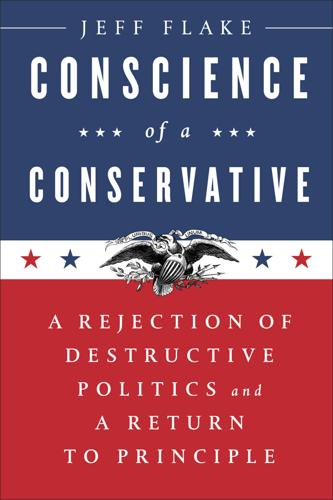
Conscience of a Conservative: A Rejection of Destructive Politics and a Return to Principle
by
Jeff Flake
Published 31 Jul 2017
He promptly began to commit Hayek’s fatal conceit, but with a twist that not even Hayek himself could have imagined: The new president would not merely demonstrate a preference for specific sectors of the economy, he would meddle in the economy by advocating for—or conversely, by intimidating—specific companies. To conservatives, this is the essence of crony capitalism. For the conservative, the role of government is to create a conducive tax and regulatory environment and let the free market prosper. But if a president is incoherently intervening wherever he or she sees fit, it can only lead to bad things. President Trump would go on to propose the worst kind of uneconomic “deals” with the coal miners who so ardently supported him and believed his promises about the resurgence of an industry long in decline, but their old jobs really weren’t coming back.
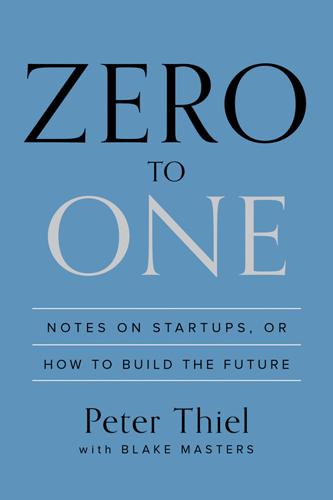
Zero to One: Notes on Startups, or How to Build the Future
by
Peter Thiel
and
Blake Masters
Published 15 Sep 2014
In December ’96—more than three years before the bubble actually burst—Fed chairman Alan Greenspan warned that “irrational exuberance” might have “unduly escalated asset values.” Tech investors were exuberant, but it’s not clear that they were so irrational. It is too easy to forget that things weren’t going very well in the rest of the world at the time. The East Asian financial crises hit in July 1997. Crony capitalism and massive foreign debt brought the Thai, Indonesian, and South Korean economies to their knees. The ruble crisis followed in August ’98 when Russia, hamstrung by chronic fiscal deficits, devalued its currency and defaulted on its debt. American investors grew nervous about a nation with 10,000 nukes and no money; the Dow Jones Industrial Average plunged more than 10% in a matter of days.

City Parks
by
Catie Marron
The quiet respect with which even grade school groups in Russia will listen to docents talking about Pushkin is unlike anything I know of in America. Russians, as it seems to me, always favor the orthodox approach—they’ve been Orthodox Christians, orthodox Marxists, orthodox atheists, and now orthodox followers of modern-day crony capitalism. When they fall for a belief they don’t mess around; they go all the way. Passionate as they have been about these systems, what they really believe is deeper and survives all creeds that come from outside. The true, deep-down Russian religion is animism. Russians believe that things in the world possess individual spirits of their own.
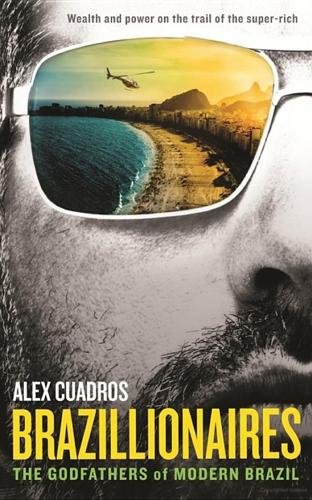
Brazillionaires: The Godfathers of Modern Brazil
by
Alex Cuadros
Published 1 Jun 2016
When I asked him about the government’s decision to fund companies that had backed the military regime, he told me, “You can’t develop the country just with the kind of people you’d invite home for dinner.” In the nineteenth-century United States, after all, railroad tycoons laid tens of thousands of miles of track not out of selfless civic interest but for profit, engaging in a crony capitalism that would be very familiar to Brazil’s “cordial man.” Like the leaders of the military regime in the sixties and seventies, Lula wanted to build highways and dams and ports, to get Brazil caught up with the developed world. He wanted to build huge refineries to process Petrobras’s oil discoveries, and he wanted Brazilian companies employing Brazilian workers to do the job.
…
, 91 Salve Jorge, 100–101, 102–7, 131 TV Record, 108, 110, 115, 121–22, 123, 126, 300n110 Macedo’s takeover of, 119–22, 301n120 R7 news, 231 TV SBT, 256 TV Tupi, 84, 297n84 TVX, 153–54, 155–56, 170, 180, 187–88 UBS (Swiss bank), 28, 218 UHNW (ultra-high-net-worth), 23 Ulloa, Santiago, 22–23 Ultragaz, 40, 42, 291n41, 291n42 Ultrapar, 291n41 United Arab Emirates, 180, 181, 183, 184, 217–18, 253 United States billionaires, 24, 26 Brazilian investment in, 18, 19, 144 campaign financing, 286, 317n286 capitalism and bubbles, 244 CIA and Brazilian politics, 39 crony capitalism, 55 Federal Reserve and 2008 crisis, 181 Hoover’s “Buy American Act,” 184 interest rates, 18 prosperity gospel and, 109 shale gas extraction, 67 “too big to fail” banks, 274 Universal Church of the Kingdom of God, 108–18, 123–26 Congress of Winners, 116–17, 124–25 cures and liberation, 115–17 Fogueiras Santas campaigns, 118 Globo targeting of, 122 Love Therapy, 114, 115 number of churches, 108, 110, 300n109 number of followers, 109, 300n109 radio network, 301n118 revenues, 110, 112, 118–19, 300n110 São Paulo church, 111, 114, 301n114 solicitation, 118–19, 125, 301n119 Solomon’s Temple replica, 126, 301n114 suits against, 301n118, 301n119 tax fines against, 123, 302n123 in the U.S., 109–10 University of São Paulo, 11 Uruguay, 24, 177 Vale, 136, 137, 138, 140, 160, 168, 171, 214, 305n160, 306n167 Valor Econômico, 244–45 Vanguarda Agro, 59 Vargas, Getúlio, 83, 86, 96, 172 Veja, 44–45, 120, 164, 166 Vilardi, Celso, 228–29 Villela family, 290n39 Volkswagen, 290n39, 294n69 Voz da Comunidade, 101, 106–7, 208 “Wagner,” 178, 179, 180–81, 205 Waimiri-Atroari tribe, 69 Wallace, David Foster, 194 Wallach, Joe, 88 Walton, Sam, 197 Warby Parker, 213 Wealth of Nations, The (Smith), 176, 280 Welch, Jack, 197 White, Richard, 244 Wilson, Charlie, 293n56 Winkler, Matt, 96 Workers Party, 54, 55, 56, 67, 95, 96, 131, 183, 191, 239–40, 257, 275.
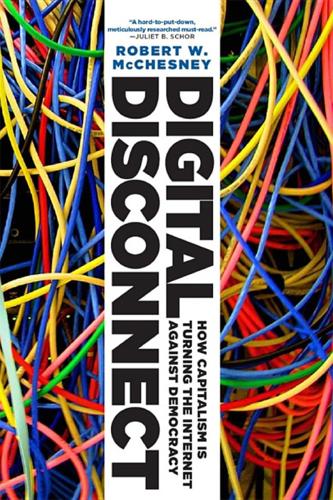
Digital Disconnect: How Capitalism Is Turning the Internet Against Democracy
by
Robert W. McChesney
Published 5 Mar 2013
To top it off, the political power of these firms in Washington and state capitals has reached Olympian heights.60 Accordingly, politicians pretty much ignored their platitudes about increasing competition. The George W. Bush administration, as Tim Wu puts it, “tended to agree that competition didn’t necessarily require that there be any extant competitors.”61 These monopolists are the poster children for crony capitalism, which in theory promarket types despise but in practice invariably champion, at least when they’re anywhere near political power. Increasing monopoly power and crushing the threat of competition was all well and good, but it did not solve the problem posed by the Internet. The telephone companies provided the main wires for Internet access in the late 1990s, but the FCC required that they fulfill the “common carriage” statutes, which meant that the shrinking number of Baby Bells had to allow open access at nondiscriminatory prices for other firms to use their lines as Internet service providers (ISPs).
…
As comfortable as the free-market catechism is with a minimal government when it comes to interfering with the affairs of the wealthy on behalf of the general population, it is equally comfortable with a government that has considerable incarceration and policing powers over the general population. See Bernard E. Harcourt, The Illusion of Free Markets (Cambridge, MA: Harvard University Press, 2011). 2. Luigi Zingales makes a passionate defense of the catechism as the American way—and a criticism of many of the attributes of dominant “crony capitalism”—in A Capitalism for the People: Recapturing the Lost Genius of American Prosperity (New York: Basic Books, 2012). 3. I am obviously generalizing. For the classic explanation of this process, see Morton H. Fried, The Evolution of Political Society: An Essay in Political Anthropology (New York: McGraw-Hill, 1967). 4.
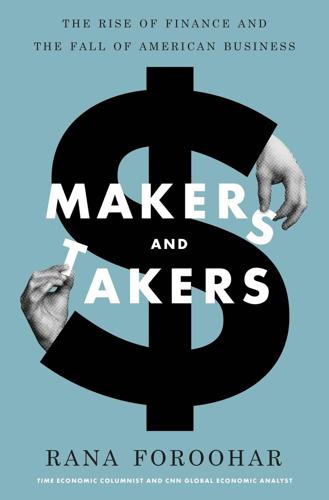
Makers and Takers: The Rise of Finance and the Fall of American Business
by
Rana Foroohar
Published 16 May 2016
Finance regularly outspends every other industry on lobbying efforts in Washington, D.C.,46 which has enabled it to turn back key areas of regulation (remember the trading loopholes pushed into the federal spending bill by the banking industry in 2014?) and change our tax and legal codes at will. Increasingly, the power of these large, oligopolistic interests is remaking our unique brand of American capitalism into a crony capitalism more suited to a third-world autocracy than a supposedly free-market democracy.47 Thanks to these changes, our economy is gradually becoming “a zero-sum game between financial wealth-holders and the rest of America,” says former Goldman Sachs banker Wallace Turbeville, who runs a multiyear project on financialization at the nonprofit think tank Demos.48 Indeed, one of the most pernicious effects of the rise of finance has been the growth of massive inequality, the likes of which haven’t been seen since the Gilded Age.
…
The Fed knew this and asked Chase and Goldman to take first dollar risk in the bailout, and then took ‘no’ for an answer. I think that the AIG bailout was a moment in which public confidence in the government’s decisions in the crisis being in the public interest started to collapse. Later on, some called this dynamic ‘crony capitalism.’ ” To be fair, Geithner was probably doing his best in a tough situation, one that had been unfolding for quite a while, rather than exploding in a short burst like LTCM. But it’s interesting to note, as the TARP investigation report does, that he backed down rather quickly when bank leaders like J.P.
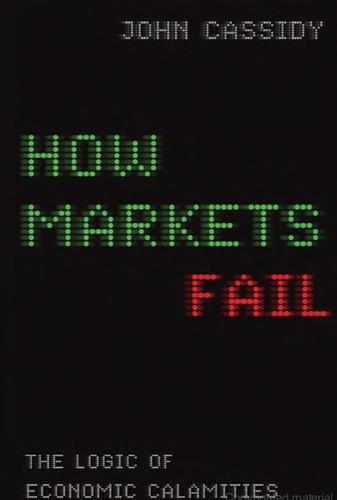
How Markets Fail: The Logic of Economic Calamities
by
John Cassidy
Published 10 Nov 2009
The combination of a Fed that can print money, deposit insurance, and a Congress that can authorize bailouts provides an extensive safety net for big financial firms. In such an environment, pursuing a policy of easy money plus deregulation doesn’t amount to free market economics; it is a form of crony capitalism. The gains of financial innovation and speculation are privatized, with the bulk of them going to a small group of wealthy people who sit at the apex of the system. Much of the losses are socialized. Such a policy framework isn’t merely inequitable; it is also destabilizing. Once the Fed abdicates its responsibility of preventing excessive risk-taking, rational irrationality will eventually ensure that the system moves toward what Minsky referred to as Ponzi finance.
…
If these special interests succeed in blocking meaningful reform, we could well end up with the worst of all worlds: a financial system dominated by a handful of firms that are “too big to fail,” but that can take on as much risk as they please, secure in the knowledge that if things go wrong the taxpayer will be there to bail them out. Such an arrangement would amount to crony capitalism writ large, and it would make a mockery of the democratic ideals that both major parties claim to represent. Before the political will for reform dissipates, it is essential to put Wall Street in its place and to confront utopian economics with reality-based economics. Hopefully, this book can play a small part in that effort.

Virtual Competition
by
Ariel Ezrachi
and
Maurice E. Stucke
Published 30 Nov 2016
Price regulation has taken a beating, especially, as Chapter 3 explores, with the rise of neoclassical economic theories associated with the University of Chicago. Granted, the appeal of the invisible hand has diminished in recent years—after the financial crisis, the Great Recession, growing income and wealth inequality in the United States and U.K.,1 reduced social mobility, and the sheer arrogance of crony capitalism. Nonetheless, despite the growing appeal of conscious capitalism and shared value, many policymakers still praise the unrestrained free market, and are far more vocal over the cost of false positives from governmental intervention than the cost of false negatives from governmental abstention.
…
Money, Power, and Politics Besides the deadweight welfare loss, the rise of market giants in control of data, analytics, and the ecosystems raises challenging questions about the concentration of power.57 To what extent does economic concentration affect enforcement? Economic power can translate into political power. Corporations and trade groups spend billions of dollars lobbying the U.S. government.58 And with the rise of private economic power, the dividing line between corporate action and the political realm may easily fade.59 The extent of crony capitalism may surprise some. Many of us knew that the major financial institutions had clout, but the economic crisis and subsequent U.S. taxpayer bailouts exposed the extent to which they manipulated the regulatory environment in their favor, and how the economically powerful have every incentive to use the government to protect their economic interests.
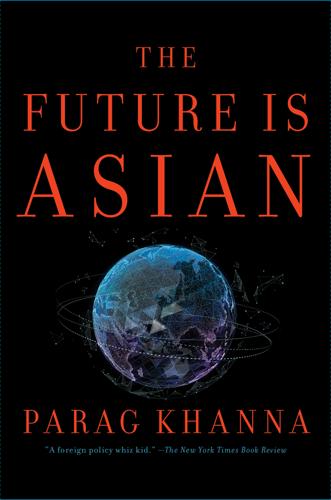
The Future Is Asian
by
Parag Khanna
Published 5 Feb 2019
Southeast Asia’s export-led growth surge suffered a significant setback with the financial contagion of 1997, in which insufficient foreign currency reserves forced major devaluations and skyrocketing debt in Thailand, Malaysia, the Philippines, and even mature economies such as South Korea. The collapse of local currencies laid bare the crony capitalism governing countries such as Indonesia. After three decades of rule, Suharto lost the backing of the army and resigned in 1998 amid waves of demonstrations. The Soviet collapse was also a major precipitating factor in India’s 1990s shift toward an open economy. As the once significant trade volumes with the Soviet Union plummented and the Persian Gulf War caused a doubling of oil prices, India’s prime minister, P V.
…
Park, Jehoon, T. J. Pempel, and Gérard Roland, eds. Political Economy of Northeast Asian Regionalism: Political Conflict and Economic Integration. London: Edward Elgar, 2008. Park, Yeonmi. In Order to Live: A North Korean Girl’s Journey to Freedom. New York: Penguin, 2015. Pei, Minxin. China’s Crony Capitalism: The Dynamics of Regime Decay. Cambridge, MA: Harvard University Press, 2016. ———. China’s Trapped Transition: The Limits of Developmental Autocracy. Cambridge, MA: Harvard University Press, 2006. ———. From Reform to Revolution: The Demise of Communism in China and the Soviet Union. Cambridge, MA: Harvard University Press, 1994.
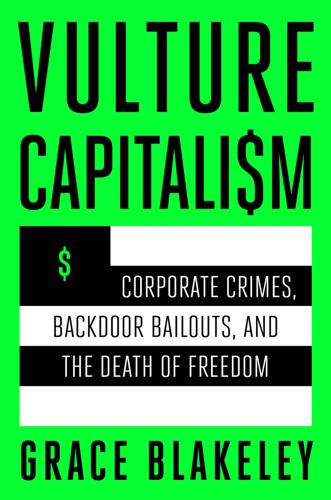
Vulture Capitalism: Corporate Crimes, Backdoor Bailouts, and the Death of Freedom
by
Grace Blakeley
Published 11 Mar 2024
In Chile, for example, tens of thousands of innocent people were murdered or disappeared by Pinochet’s neoliberal regime, supported by neoliberal acolytes like Milton Friedman, all in the name of destroying socialism and building “free markets.” The neoliberals ultimately succeeded in “generating an antidemocratic culture from below, while building and legitimating antidemocratic forms of state power from above.”99 The end result has been the emergence of a kind of “crony capitalism” that Brown claims the original neoliberals would have abhorred. Hayek himself wrote in The Road to Serfdom that he would “prefer to have to put up with some such inefficiency than have organized monopoly control my ways of life.”100 And yet the movement that he spawned has birthed some of the largest and most powerful monopolies in human history.
…
Madoff Investment Securities LLC, 120–21 Bevins, Vincent, 191 Bezos, Jeff, 75–77, 80–81, 132 Biden, Joe, 69, 70–71, 136, 140–42 Big Three asset managers, 133, 135, 137 biopolitics (Foucault), 105 BlackRock, 69, 132–37, 257 Blackstone Financial Management, 44, 133 “black swan” events, 50, 114 Blackwater, 104 Bodie, Matthew, 254 Boeing, 3–10, 86, 87, 96, 225 agreements with Southwest Airlines, 5, 10, 16 Boeing 737 MAX, 3–9, 17, 218–19 Boeing 787 Dreamliner, 4–5, 8 capitalism and, 16–17 corporate welfare and, 7–8, 29 MCAS (Maneuvering Characteristics Augmentation System), 4, 5–7 merger with McDonnell Douglas, 4, 8–9 shareholder distributions, 6 Bolsonaro, Jair, 251 BP, 64 Braithwaite, Michael, 163–64 Braun, Benjamin, 129–30 Braverman, Harry, 99–100 Brazil Amazon environmental protections, 251 Fordlândia in, 22–23, 186 Porto Alegre model for participatory budgeting (PB), 232–33, 247 Bregman, Rutger, 224 Bretton Woods, 51 British Business Bank (BBB), 156–57 Brook House (UK), 102 Brown, Matthew, 237–38, 247 Brown, Wendy, 33, 34, 143, 167 Buffett, Warren, 95 Builders Labourers Federation (BLF, Australia), 227–29 Bukharin, Nikolai, 182 bureaucratization, 34–35, 147 Burke, Edmund, 103 Bush, George W., 140 C Calhoun, David, 9 Cameron, David, 54, 154–56, 162 campaign finance reform, 259 Canada COVID-19 aid to corporations, 46, 136 Ethyl Corp. lawsuit and, 197 resistance to the labor movement, 78 Toronto Community Housing Corporation (THTC) participatory budgeting, 232–33 Canada Infrastructure Bank, 136 Capita, 164 Capital (Marx), vii capitalism, 11–17 alliances among capitalists in, 13–14 centralization of power in, xvi–xvii, 92, 136–37 central vs. corporate planning and, x–xiv, xvi, xix–xx, 14–16 class divisions in, x, xix, 11–14, 38–39, 82–84, 108, 151, 158–60, 216–18, 252, 259, 268 democracy and, xiv–xv, 147, see also democratic planning dialectic/creative tension between markets and planning, xvi–xvii, 37, 53, 123, 126 distinction between capital and labor, 30–39 feudalism vs., 12–13, 266, 269–71 foundations of, 264–66, 268–71 free markets and competition and, ix, 11–14, 15–17, 30, 36–39, 97–98, 137, 221, 268–70 fusion of political and economic power in, xviii, 10, 13–15, 33, 80, 82–84, 95–96, 104–8, 183–85, 190, 264–65 fusion of public and private power in, 142–43, 159–60 human capital and, 33, 148, 166–67 as hybrid system of competitive pressure and centralized control, ix, 16, 37, 47, 123, 269 imperialism as highest stage of, 183 international finance system as time lords of, 109, 113–14 investor-capitalists, 118, 148 Keynes and, see Keynes, John Maynard Marx and, see Marx, Karl means of production in, 12–13, 247, 264 “mini-capitalists” and, 33, 118, 122–23 nature of capital and, 11, 12–13 need for business firms in, 81–85 negative externalities, 88–89 new industrial capitalism (Galbraith), 37 pursuit of profit in, xiii–xiv, 25, 29 rewards for competitiveness, 225–26 as rule by capital vs. free markets, 10–11, 36–39, 137 socialism vs., 221 socialized capitalism (Galbraith), 97–98 social relationships in, 11, 13, 143, 157–59, 164, 170, 172, 265–66 stakeholder capitalism, 35–36, 135–36, 148 state vs. markets and, 220–22 surveillance capitalism, 27, 54–58, 94, 98–100, 155 see also disaster capitalism CARES Act (2020), 9–10 Cayman Islands, as tax haven, 42, 132 central banks, 124–32 bank bailouts in the United Kingdom and, 31–32 BlackRock and, 136 democratizing, 258 emergence of central banking, 124–25 legitimacy questions, 129–32 loanable funds model and, 114–18 quantitative easing (QE) and, 127–28, 129, 136 swap lines among, 209–10 US dollar and, 178, 209–10 see also specific central banks Central Intelligence Agency (CIA, US), 175, 189, 241 centralized planning by Amazon, 75–81 in capitalist economies, 14–16, 24, 66–71, 98, 143, 266 collective action problem and, 47–48, 67, 70, 159–61, 166–67, 248–49, 253 corporatism/corporate planning vs., x–xiv, 14–16, 27, 30, 84 democratic, see democratic planning empires and, see empire planning financial crisis of 2008 and, 49–50 at Ford Motor Company, 19–24 Galbraith on, 97–98 Gramsci on, 24 Hayek on, x–xii international finance system and, 113–14 neoliberal revolution vs., 24–26 resisting, 71–72 by states, see state planning by Walmart, 88, 264, 265 Chamayou, Grégoire, 27, 30 Chan, Jackie, 168 Chang, Ha-Joon, 146, 180, 182 Chao, Elaine, 42–43 ChemChina, 90, 91, 124 Chemring Group, 46 Chevron, 64, 194–96, 205 Chicago School, 150–51, 199 Chile democratic socialism in, 241–46 National Telecommunications Enterprise, 245 Project Cybersyn, 245–46, 247, 265, 266 State Development Corporation (CORFO), 244–45 violence of the neoliberal state in, 34 Chiluba, Frederick, 206 China Belt and Road Initiative, 171–72, 182–83 COVID-19 surveillance and, 57–58 developmentalism and, 137, 170–72 Evergrande Group implosion, 167–69, 171 state planning in, 167–72 China CITIC Bank International, 124 Chiquita (formerly United Fruit Company, UFC), 186–89 Christophers, Brett, 136 Chrysler, 29 Citigroup, 120, 124 Civil War, 144 climate breakdown, viii, 66–71 Amazon and, 79 decarbonization efforts, 67, 69–71, 78, 135, 140–41, 250–51, 256, 263 economic power of capital and, 15 Extinction Rebellion and Fridays for Future, 251 fossil-fuel sector and, 66, 69, 139–43 Global North and, 263 Global South and, 263 Green New Deal proposal, 69, 248 need for cooperation and, 66–71, 216, 247–52 Climate Leviathan (Wainwright and Mann), 70 Coase, Ronald, 81, 83–85 Coca-Cola, 81 Cold War, ix, xx collective action problems, 47–48, 66–71, 159–61, 166–67, 248–49, 253, see also democratic planning Collins Aerospace, 219 Colombia, surveillance of Teleperformance workers, 99 Communist Manifesto (Marx), 152 Communist Party of China, 171 of Guatemala, 188 of Indonesia, 191 community wealth building (CWB), 237–38 comparative advantage (Ricardo), 179–81 computer technology ARPANET, 244 coop app platforms, 154–55, 254–55 data protection and privacy, 27, 54–58, 94, 99, 155 in democratizing the future, 264–66 dot-com bubble (1997–2001), 110–11, 120, 133 intellectual property rights and, 262 Project Cybersyn (Chile) and, 245–46, 247, 265, 266 surveillance capitalism and, 27, 54–58, 94, 98–100, 155 Walmart centralized planning and, 88, 264, 265 Connolly, James, 59, 61 conspiracy theories, xvi, 38, 43–44, 53 Cooley, Mike, 216–20 Coons, Chris, 141 COP26 (UN Climate Change Conference, 2021), 70–71 Coral Island, The (Ballantyne), 222–24 Corbyn, Jeremy, 250 Cornered (Lynn), 21 corporations central vs. corporate planning, x–xiv corporate crime and, 106–7, 119–24, 156–57, 220–21 corporate sovereignty, xiv, 22–23, 25, 80, 103–8, 143 corporatism and, x–xiv, 14–16, 27, 30, 84 COVID-19 pandemic programs, 9–10, 41–49, 59–60, 141–42, 155–56 democratic planning and, see democratic planning expanding collective ownership of, 253–55, 257 fusion of political and economic power of, xviii, 10, 13–15, 33, 80, 82–84, 95–96, 104–8, 183–85, 190, 264–65 lobbying by, 105–6, 140, 141–42, 151, 159, 259 managerialism and, 34–35, 84, 100, 108, 216 profit maximization by, xiii–xiv, 25, 29 see also taxes and taxation COVID-19 pandemic airline industry and, 9 BlackRock and, 136 call center workers and, 98–99 CARES Act (2020) and, 9–10 corporate beneficiaries of, 9–10, 41–49, 59–60, 141–42, 155–56 cost-of-living crisis, 48, 58, 63–66, 129 Evergrande (China) implosion and, 167–69, 171 fossil-fuel industry and, 64, 141–42 frauds and scams in, 156–57 housing crisis and, 43, 44–45 inflation and, 63–66 McKinsey & Company and, 53–58, 155 mortality measures during, 105 shareholder distributions/share buybacks during, 45–47, 59–60, 64 shipping companies and, 62–63, 64 state economic programs in, 41–48 supply chain financing and, 153–54 surveillance programs, 57–58, 98–99 UK responses to, 45–46, 53–61, 155–57, 162–63 US responses to, 41–45 WeWork business model and, 112 worker loss of income and poverty, 60, 63, 98–99 zoonotic disease and, 68 creative destruction (Schumpeter), 86, 95, 96 Credit Suisse, 52, 123–24, 153–54 crony capitalism, 34 Crothers, Bill, 155–56 Crown Commercial Service (CCS, UK), 155–56 Crown Prosecution Service (CPS, UK), 102 Cunningham, Ceri, 239–40 Curaçao, as tax haven, 45 D Dalton, David, 155 Danone, 46 Dark Waters (2019 film), 91 data protection and privacy, 27, 54–58, 94, 99, 155 Davis, Mike, 68 Dawn of Everything, The (Wengrow and Graeber), 224–25 Dayen, David, 89 Debt (Graeber), 125 Debt Collective (US), 249–50 Decree 900 (Guatemala), 188 de Guzman, Leody, 177 Delinquent Genius (Cooley), 217 democracy capitalism and, xiv–xv, 147 democratizing the state, 257–61 planning and, see democratic planning as synonymous with socialism (Meiksins Wood), xviii “unfreedom” and, xiv–xv Democratic Party (US) fossil-fuel industry and, 140–41, 142 in Mississippi, 236 democratic planning, 215–66 Argentina, Ciudad Futura, 234–35, 255 Australia, green bans, 227–29 Brazil, participatory budgeting, 232–33, 247 in Chile, 241–46 for the future, 264–66 human nature and, 222–26 Iceland, Better Reykjavik program, 235–36, 258–59 India, Kerala people’s planning, 233–34 international finance system and, 255–57 international institutions and, 261–64 Mississippi, Cooperation Jackson program, 236–37, 247, 251–52, 255 participatory budgeting (PB), 232–33, 235–36, 258–59 people-powered planning, 226–40, 247–52 Spain, Marinaleda workers’ collective, 229–30 state-level, 241–46, 257–61 UK, Blaenau Ffestiniog program (Wales), 238–40 UK, Greater London Enterprise Board, 216–17, 219–20 UK, Lucas Plan/Lucas Aerospace Corporation, xix, 215–22, 226, 229, 231, 247, 248, 266 UK, People’s Plan for the Royal Docks (London), 230–31 UK, Preston community wealth building (CWB) program, 237–38, 247, 255 for work and the corporation, 252–55 democratic socialism, 216–17, 241–48, 265 Democratic Socialists of America (DSA), 250 dependency theory, 184–86, 199, 205 deregulation, xv–xvi, 7, 31, 32, 51, 170, 206 Deutsche Bank, 49 developmentalism, 137, 170–72, 205–8 disaster capitalism, 41–71 climate breakdown and, 66–71 collective action problems and, 47–48, 67, 70, 159–61, 248–49, 253 corporate welfare programs and, 31–32 COVID-19 pandemic and, see COVID-19 pandemic financial crisis of 1987 and, 126–27 financial crisis of 1997 and, 51, 200 financial crisis of 2008 and, see financial crisis of 2008 (subprime bubble) nature of, 38 shock doctrine (N.
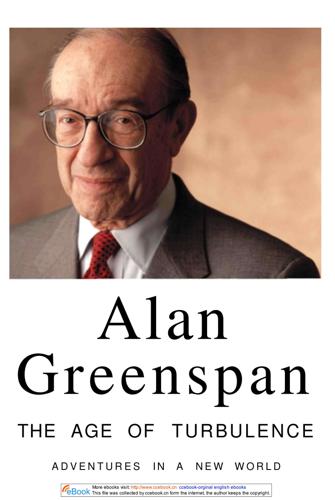
The Age of Turbulence: Adventures in a New World (Hardback) - Common
by
Alan Greenspan
Published 14 Jun 2007
When a government's leaders routinely seek out private-sector individuals or businesses and, in exchange for political support, bestow favors on them, the 274 More ebooks visit: http://www.ccebook.cn ccebook-orginal english ebooks This file was collected by ccebook.cn form the internet, the author keeps the copyright. THE M O D E S OF C A P I T A L I S M society is said to be in the grip of "crony capitalism." Particularly appalling was Indonesia under Suharto in the last third of the twentieth century, Russia immediately following the collapse of the Soviet Union, and Mexico during its many years under the PRI (the Institutional Revolutionary Party). The favors generally take the form of monopoly access to certain markets, preferred access to sales of government assets, or special access to those in political power.
…
The favors generally take the form of monopoly access to certain markets, preferred access to sales of government assets, or special access to those in political power. Such actions distort the effective use of capital, and, accordingly, lower standards of living. Then there is the broader issue of corruption of which crony capitalism is but a part. In general, corruption tends to exist whenever governments have favors to extend, or something to sell. If there were unobstructed, free flow of goods and people across national boundaries, customs and immigration officials, for example, would have nothing to sell. Indeed, their jobs would not exist.
…
Taiwan had significant governmentowned companies and, like the other Tigers, heavy trade protection of domestic industry. Most had charismatic but autocratic leaders. Singapore's Lee Kuan Yew sparked the emergence of a small but world-class city; other autocrats, like General Suharto, who ruled over Indonesia's system of crony capitalism, were arguably less successful. Malaysia's prime minister Mahathir Mohamad, still harboring resentments of his country's colonial past, was a very forceful nationalist leader. I have met, but cannot say I have gotten to know, many of these leaders. Over the years, I have had the most contact with Lee Kuan Yew, most recently in 2006, and have always found him impressive, even though we do not always see eye to eye.
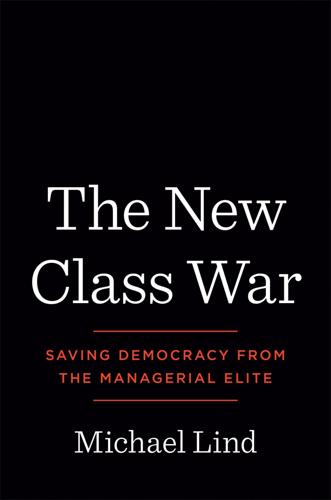
The New Class War: Saving Democracy From the Metropolitan Elite
by
Michael Lind
Published 20 Feb 2020
An intellectual and political insurgency treated institutions like tripartite business-labor-government wage setting, trade unions, and the regulation of industries as public utilities as obstacles to both economic progress and individual liberty. On the overclass right, such institutions were denounced by libertarian economists as “crony capitalism” and by conservative constitutional lawyers in the United States as infringements on the supposed quasi-royalist “unitary power” of the president. On the overclass left, many of the same structures were demonized by public interest progressives like Ralph Nader whose constituency consisted of affluent and educated reformers.1 The political scientist Theodore Lowi coined the term “interest group liberalism” for New Deal arrangements as an insult.2 By 1986, a bipartisan consensus among American intellectuals and policy makers held that inherited democratic pluralist institutions were both corrupt and inefficient.
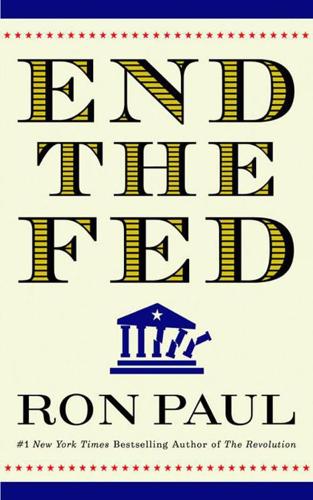
End the Fed
by
Ron Paul
Published 5 Feb 2011
Because if you come from the viewpoint that says that the market does not work, I can understand everything you do. But if I see that you totally rejected the market, and that we have to do something about it, I can understand why we in the Congress, and you in Treasury, and you in the Fed continue to do this. So where do you put the blame, on the market or on crony capitalism that we’ve been living with probably for three decades? BEN BERNANKE: Congressman, I certainly do not reject capitalism. I don’t think this is a failure of capitalism per se, and I also think that free markets should be the primary mechanism for allocating capital. They’ve shown over many decades that they can allocate money to new enterprises, to new technologies very effectively, and so we want to maintain that free capital market structure.
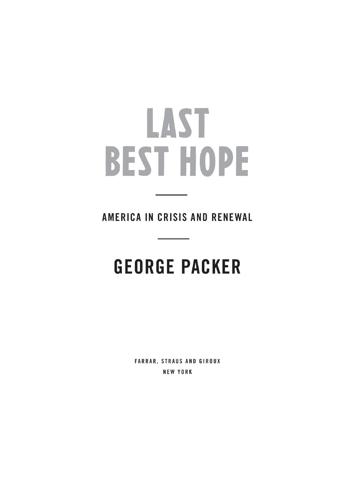
Last Best Hope: America in Crisis and Renewal
by
George Packer
Published 14 Jun 2021
They had never heard of Charles and David Koch—heirs to a family oil business, libertarian billionaires, who would pour money into the lobbies and propaganda machines and political campaigns of Free America on behalf of corporate power and fossil fuels. Freedom sealed a deal between elected officials and business executives: campaign contributions in exchange for tax cuts and corporate welfare. The numerous scandals of the 1980s exposed the crony capitalism that lay at the heart of Free America. The shining city on a hill was supposed to replace remote big government with a community of energetic and compassionate citizens, all engaged in a project of national renewal. But nothing held the city together. It was hollow at the center, a collection of individuals all wanting more.
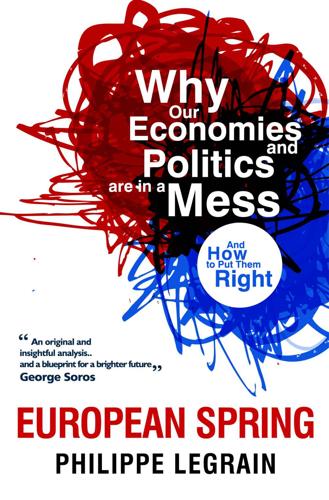
European Spring: Why Our Economies and Politics Are in a Mess - and How to Put Them Right
by
Philippe Legrain
Published 22 Apr 2014
A cultural conservatism that is suspicious of change, hostile to diversity and deeply pessimistic about the future hampers innovation, investment and growth. The biggest underlying problem is the capture of governments by vested interests and self-serving elites who appropriate value created by others rather than creating it themselves – call it crony capitalism. Most European countries have an overmighty and dysfunctional financial sector that benefits from taxpayer bailouts and subsidised borrowing, extracts value from companies and households, and does a poor job of channelling savings to productive investments. Big landowners in rigged property markets benefit from vast subsidies from the EU’s Common Agricultural Policy in rural areas and capture the value created by others’ investment and hard work in urban ones.
…
Shifting tax off hard work and enterprise and on to unearned rewards from land ownership and inheritance. The ability to save for your retirement tax-free without your returns being gobbled up in fees. A future-proofed state pension system. The security that enables you to sleep easily at night – and take risks. Open capitalism, not crony capitalism. The freedom to be who you want to be, live the life you want to lead and still have a place in society. How, though, can one overcome entrenched vested interests? Sometimes war – or revolution – wipes out the old power structure. Change can also come about peacefully. Reform can be precipitated by external forces or domestic ones.
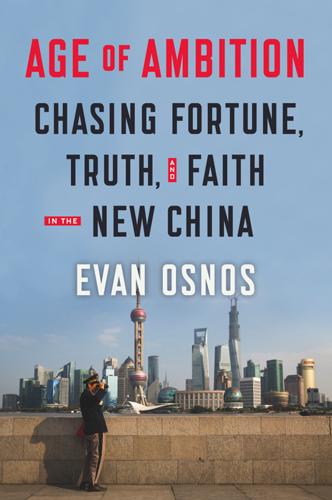
Age of Ambition: Chasing Fortune, Truth, and Faith in the New China
by
Evan Osnos
Published 12 May 2014
“It’s entirely obvious that the biggest problem China faces right now is corruption,” he told me. “Corruption is the reason for the gap between rich and poor. Where did this corruption come from? From the fact that government continues to control too many resources.” In a furious stream of essays and books, Wu pointed to crony capitalism and the gap between rich and poor as evidence that China’s economic model had run up against the limit of what was possible without the government’s permitting greater political openness to mediate competing demands. In recent years, he had gone so far as to argue that China needed to adopt a Western-style democracy, and nationalists had blasted him for apostasy.
…
The central government would not allow them to issue their own debt, so they raised cash by selling land they already owned or by offering low prices to farmers (the source of many of China’s protests). In Beijing, one of Lin Yifu’s former students, a professor named Yao Yang, published a view of China’s political and economic future that was strikingly at odds with his mentor’s. Yao pointed to the rise of crony capitalism and the gap between rich and poor as evidence that China’s economic model had run up against the limit of what was possible without permitting greater political openness “to balance the demands of different social groups.” He cited control of the Internet and labor unions, and unsafe working conditions.
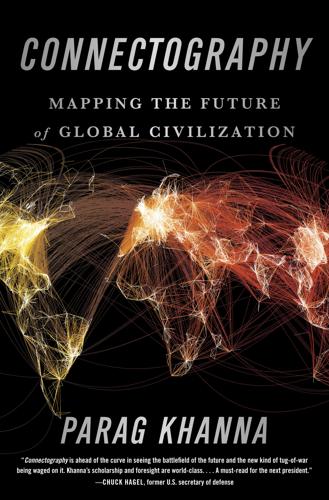
Connectography: Mapping the Future of Global Civilization
by
Parag Khanna
Published 18 Apr 2016
Most important, opening the door to foreign-operated zones has paved the way for a post-oil future in which already 75 percent of Dubai’s economy is construction, real estate, finance, manufacturing, retail, and other services. As Dubai’s rapid rebound since the crisis has proved, governments and companies working hand in hand is crony capitalism only in theoretical orthodoxy.2 In the real world, it is part of strategic economic survival. — DESERTS ARE LIMITLESS PLACES, but only with modern desalination and irrigation—and air-conditioning—has man been able to colonize the desert at large scale rather than merely, though with great fortitude, crossing it as Bedouin have done in the Sahara and the Gulf’s fabled Empty Quarter.
…
In Somalia, armadas of warships and private flotillas won’t stop piracy attacks on oil and cargo tankers, while basic fishing boats would help Somali fishermen return to a more legitimate economy. Bringing better supply chains to people is the only way to prevent them from being exploited by worse ones. GETTING BEYOND CORRUPTION? The world is awash not only in cheap capital but also in crony capital as trillions of dollars of wealth seeking safe havens from government crackdowns are laundered into real estate and other assets from New York and London to Dubai and Singapore. The world’s economic pie is growing larger, and everyone wants a slice. The same trends free-market advocates celebrate such as privatization and foreign investment liberalization also enable surging volumes of corruption worldwide.
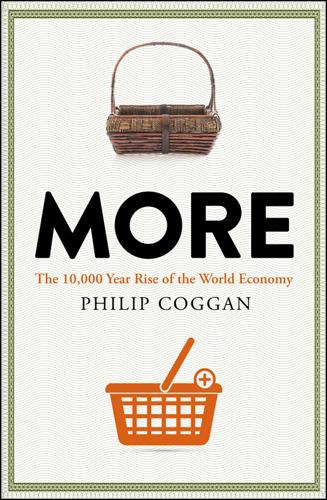
More: The 10,000-Year Rise of the World Economy
by
Philip Coggan
Published 6 Feb 2020
And once investors saw the Thais devalue, they worried about the prospect of other countries following suit. There was a sell-off across the region, and at one point, the Indonesian currency dropped 80% against the dollar.20 This brought many criticisms of the Asian model, as it was dubbed. The most significant was that the economies were marked by “crony capitalism”, in which governments handed out favours such as monopoly rights or subsidies to friendly businessmen. The clearest example was President Suharto of Indonesia, who had ruled for 30 years and whose family had amassed assets of around $30bn in the process.21 One study found that the family had significant stakes in 1,246 companies.22 Suharto was forced to call in the IMF, which insisted on its standard package of spending cuts and the dismantling of monopolies.
…
Paul Kuznets, “An East Asian model of economic development: Japan, Taiwan, and South Korea”, Economic Development and Cultural Change, vol. 36, no. 3, April 1988 19. Pam Woodall, “Tigers adrift”, The Economist, March 5th 1998 20. Ibid. 21. Philip Shenon, “The Suharto billions”, The New York Times, Jan 16th 1998 22. Victor Mallet, The Trouble with Tigers: The Rise and Fall of South-East Asia 23. Alan Beattie, “Suharto and the crisis of Asian crony capitalism, January 1998”, Financial Times, July 19th 2008 24. Paul Krugman, “The myth of Asia’s miracle”, Foreign Affairs, November/December 1994, https://www.foreignaffairs.com/articles/asia/1994–11–01/myth-asias-miracle 25. Mallet, The Trouble with Tigers, op. cit. 26. “One more push”, The Economist, July 21st 2011 27.
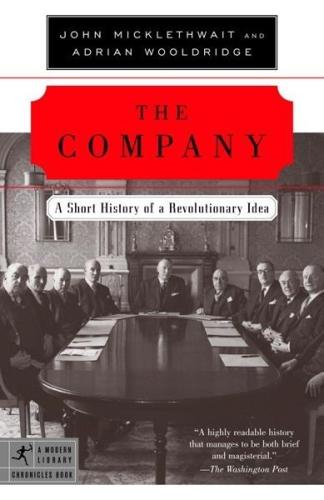
Company: A Short History of a Revolutionary Idea
by
John Micklethwait
and
Adrian Wooldridge
Published 4 Mar 2003
Keiretsu firms tended to overproduce and overinvest when compared with independent firms. Even in the boom years of 1971 to 1982, they derived significantly lower returns on assets.13 In the 1990s, they drifted from one disaster to another. The decade was also a humbling one both for the chaebol, which were flattened by the Asian currency crisis and charges of crony capitalism, and for German companies, which were hamstrung by the high labor costs that stakeholder capitalism entailed. The relative absence of “short-term” shareholder pressure proved a comparative weakness—all the more so because Anglo-Saxon firms, particularly American ones, were just beginning to benefit from genuine investor pressure.
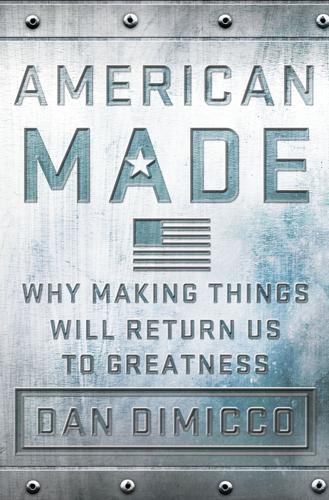
American Made: Why Making Things Will Return Us to Greatness
by
Dan Dimicco
Published 3 Mar 2015
Government and Business Shouldn’t Be Antagonists An American industrial policy assumes government and business will work together with some degree of harmony. But aren’t government and business too close as it is? What’s the difference between government policy that encourages private enterprise at home and abroad versus one that’s out-and-out crony capitalism? Truth is, the relationship between the private and public sector right now is a lot more complicated than most Americans realize. When government regulates business, it’s in the business’s interest to make sure government doesn’t regulate too much. Problems start when lobbyists jockey for special favors and exceptions.
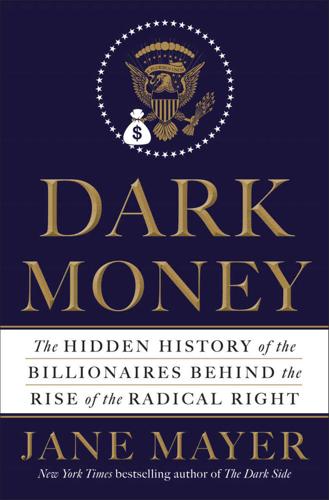
Dark Money: The Hidden History of the Billionaires Behind the Rise of the Radical Right
by
Jane Mayer
Published 19 Jan 2016
Harold Varmus, a former director of the National Cancer Institute, who knew Koch as a donor to scientific institutions, noted that many philanthropists had large business interests but admitted that he was “surprised” to learn of the company’s stance on formaldehyde. The Kochs’ corporate interests clashed with their philosophical positions on other issues as well, including their opposition to government-supported “crony capitalism.” Koch Industries took full advantage of a panoply of federal subsidies, ranging from artificially low grazing fees on the 40 percent of their 500,000 acres of cattle ranches that used federal lands, to a deal with the Bush administration in 2002 to sell eight million barrels of crude oil to fill the Strategic Petroleum Reserve, a federal supply set aside as a hedge against market disruptions.
…
Moreover, while Solyndra’s investors were portrayed as Obama supporters, among its biggest backers were members of the conservative Walton family, the founders of Walmart. A huge investor in another solar company that went bust after taking the same Energy Department loans was the venture capitalist Dixon Doll, a major contributor to the Kochs’ donor network. But as the House held hearings and various conservative front groups whipped up outrage about “crony capitalism,” the facts were buried in favor of a narrative that helped the fossil fuel industry. Congressman Upton insisted that he hadn’t changed his position on environmental issues. But Jeremy Symons, then a senior vice president of the nonpartisan National Wildlife Federation, said that the transformation was “like night and day.”
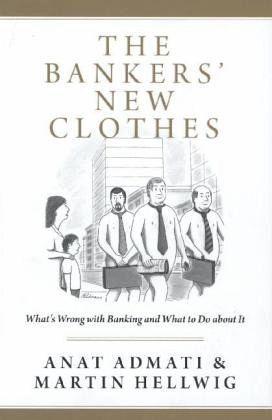
The Bankers' New Clothes: What's Wrong With Banking and What to Do About It
by
Anat Admati
and
Martin Hellwig
Published 15 Feb 2013
Treasury secretary from 1999 to 2001, refers to “the increasing salience of long-standing financial-sector weaknesses, arising from some combination of insufficient capitalization and supervision of banks and excessive leverage and guarantee—the combination that, along with directed lending, has been captured in the term ‘crony capitalism,’ ” as a root cause of most crises (Summers 2000, 5). Turning to runs, Summers (2000, 7) states that “they are not driven by sunspots: their likelihood is driven and determined by the extent of fundamental weaknesses” and concludes that “preventing crises is heavily an issue of avoiding situations where the bank run psychology takes hold, and that will depend heavily on strengthening core institutions and other fundamentals.”
…
See also AIG; credit default swaps credit limits, regulations on, 88, 268n24 Crédit Lyonnais: cost of bailout of, 318n7; failure of, 55–56, 252n37 creditors: benefits of guarantees to, 129, 142; collateral used by, 164, 301n57; covenants of, 141; default as problem of, 36, 244n3; deposit insurance and, 62, 163; lending through repo (repurchase) agreements, 164; motivations for short-term lending by, 163–65; response to default, 35–36 credit ratings: guarantees in, role of, 9, 143, 235nn31–32, 290n28; for mortgage-related securities, 156–57, 185; risks hidden in, 124–25, 156–57, 222, 296n29; in securitization of mortgages, 259n33 credit risks: AIG and, 74, 161; definition of, 313n64; in financial crisis of 2007-2009, 157, 185; in risk-weighted approach, 183, 313n64, 313n66 creditworthiness assessments, 50; careless-ness in, 56, 277n12; challenges of, 50; economizing on, 249n13; hard versus soft information in, 50, 248n9; for mortgages, 56, 58, 248n9, 277n12 criminal proceedings, 208, 215, 228, 321n27 crony capitalism, 331n19 culture of banking: complacency in, 206; greed in, 208–9, 328n6; lying in, 328n5; return on equity in, 115, 125–28, 284–85nn29–30; unethical behavior in, 209, 328n6, 329n8 Cumming, Christine, 262n60, 263n62 currency, and risk of sovereign default, 276n6 currency boards, 294n15, 333n39 currency swaps, 260n37 Curry, Timothy, 252n34, 289n20, 293n3 Das, Satyajit, 230n9, 253n42, 259n34, 260nn37–38, 260n41, 261n43, 261n46, 261n50, 262nn52–53, 284n24, 284n29, 285n37, 286n40, 308n41, 323n38, 328n5, 329n6, 329n8 Dattel, Danny, 252n36 Davies, Richard, 270n31, 290n29, 291n34 Davydenko, Sergei A., 245n13 debit cards, 49, 150 debt, treated as equity, 187–88.
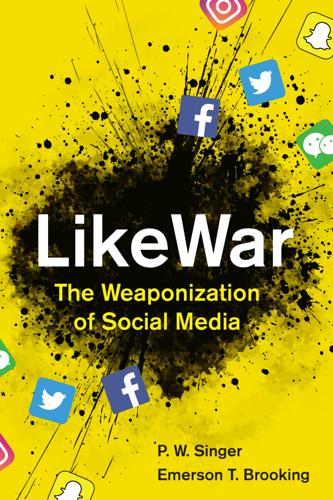
Likewar: The Weaponization of Social Media
by
Peter Warren Singer
and
Emerson T. Brooking
Published 15 Mar 2018
“Everyone shall have the right to freely look for, receive, transmit, produce and distribute information by any legal way,” the document declared. In reality, the Cold War’s end didn’t mean the end of disinformation. With new means of dissemination via social media, the prospect of spreading lies became all the more attractive, especially after the ascension of Vladimir Putin, a former KGB officer once steeped in them. By way of crony capitalism and forced buyouts, Russia’s large media networks soon lay in the hands of oligarchs, whose finances are deeply intertwined with those of the state. Today, the Kremlin makes its positions known through press releases and private conversations, the contents of which are then dutifully reported to the Russian people, no matter how much spin it takes to make them credible.
…
See elections Nissenbaum arrest, 90–95 See also confirmation bias; polarization; war Conservative Vice Lords, 12 conspiracy theories, 160, 175, 190 Content ID system, 226, 237 content moderation, 225, 233–34, 244–48 Conway, Kellyanne, 112 core principles, 21–22 countering violent extremism (CVE), 171–72, 185, 236–37 Couric, Katie, 24 Cox, Chris, 224 Creative Minds for Social Good, 172 credibility, 209 Crimea, 204, 205 Crimean War, 30 Cronkite, Walter, 34 crony capitalism, 104 crowdfunding, 64, 65 crowdsourcing, 64–65, 69, 175, 245 CS Alert (ship), 181 Cyber Caliphate, 148–49, 214 “Cyber Scouts” program, 94 cyberbanging, 12 cyberbullying, 227–28 cybercrimes, in China, 100 cyberporn, 223–24 cybersecurity, 241 cybertagging, 12, 13, 165 cyber-utopianism, 86–87 “Cyberwar Is Coming!”
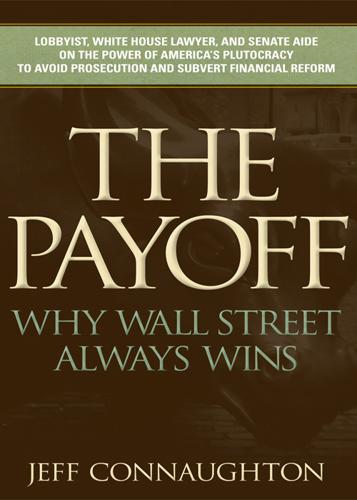
The Payoff
by
Jeff Connaughton
If you believe, as I do, that Wall Street’s capture of Washington is America’s biggest problem, it’s time to stop voting for the lesser of two evils and stand on principle. The Occupy Wall Street movement for a time had been a refreshing gust of renewed hope for change. When will the Tea Party and Occupy Wall Street realize that, when it comes to crony capitalism, they share common ground? We still need structural reform of Wall Street, either by separating federally insured commercial banking from risky investment banking by reinstating Glass-Steagall, or by passing Brown-Kaufman to place a size-and-leverage limit on too-big-to-fail institutions. We still need a Justice Department and SEC willing to enforce the law against the most powerful by holding accountable those individuals who are responsible for fraud.
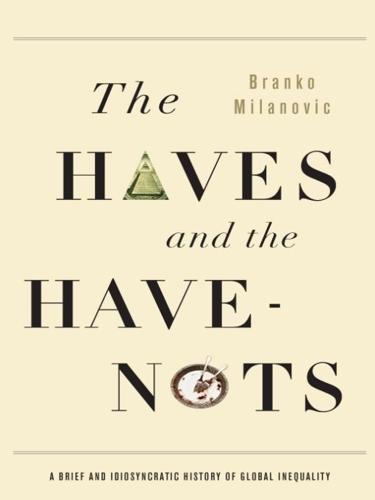
The Haves and the Have-Nots: A Brief and Idiosyncratic History of Global Inequality
by
Branko Milanovic
Published 15 Dec 2010
Today, as the gap between the Goliaths and Davids is much greater than ever, surprises are much less likely to happen. Goliaths always win; moreover, they often do not deign to play with Davids. Vignette 3.6 Income Inequality and the Global Financial Crisis The current financial crisis is generally blamed on feckless bankers, financial deregulation, crony capitalism, and the like.1 Although all of these elements may have contributed, this purely financial explanation of the crisis overlooks its fundamental reasons. They lie in the real sector, and more exactly in the distribution of income across individuals and social classes. Deregulation, by helping irresponsible behavior, just exacerbated the crisis; it did not create it.
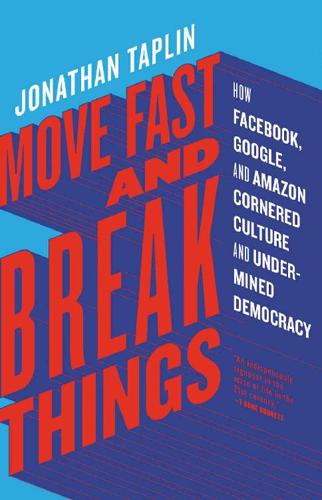
Move Fast and Break Things: How Facebook, Google, and Amazon Cornered Culture and Undermined Democracy
by
Jonathan Taplin
Published 17 Apr 2017
Amazon demanded 70 percent of the subscription revenues, leaving him with 30 percent to cover the cost of creating 100 percent of the content. This, he noted, could hardly be characterized as a fair business deal. 6. It is Peter Thiel’s investment in Palantir that demonstrates a certain libertarian hypocrisy about corporate welfare. Thiel is always complaining about crony capitalism, but the initial investment in the company came from the CIA’s venture capital arm, and the firm is now valued at more than $10 billion. Palantir was founded three years after the 9/11 terrorist attacks on the United States and was set up as a data-mining company that could sell its services to the CIA.
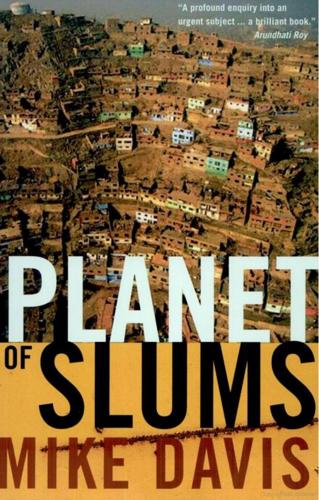
Planet of Slums
by
Mike Davis
Published 1 Mar 2006
With land inflation raging even on the distant urban edge, the only choices seemingly left to the poorest Manilenos are either to risk death in the flood-prone metropolis by squatting in the beds of esteros or along the precarious banks of rivers, or to occupy the interstices of wealthier barangays where violent eviction is an imminent threat. Throughout the Third World, then, the (John) Turnerian frontier of free land for poor squatters has ended: the "slums of hope" have been replaced by urban latifundia and crony capitalism. The constriction or closure of opportunities for non-market setdement at the edge, in turn, has immense repercussions for the stability of poor cities. In lockstep with the increasing percentage of renters, the most dramatic consequence in the short run has been soaring population density in Third World slums — land inflation in the context of stagnant or declining formal employment has been the piston driving this compression of people.
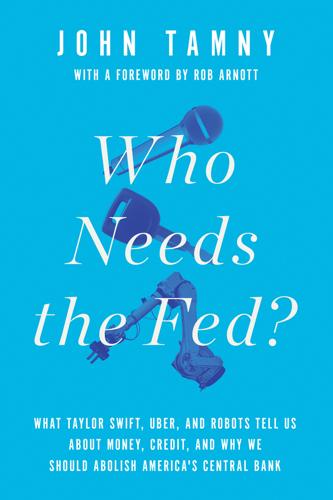
Who Needs the Fed?: What Taylor Swift, Uber, and Robots Tell Us About Money, Credit, and Why We Should Abolish America's Central Bank
by
John Tamny
Published 30 Apr 2016
Not long before he was elected president of the United States, Barack Obama correctly criticized The Export-Import Bank (Ex-Im) as “little more than a fund for corporate welfare.”6 He was right. It exists to lend taxpayer funds to foreign companies interested in buying U.S. exports. Since reaching the White House, Obama has changed his position on the Bank. As of this writing, even a Republican-controlled Congress is still struggling to fully close this monument to crony capitalism. The existence of Ex-Im, along with the TVA and the War on Poverty, shows why supply-siders are so wrong when they sell income tax cuts to the political class as a way to get politicians more money to spend. That all three programs and subsidies still exist is a reminder that surging federal revenues morph into a major tax on future growth as politicians divine new ways to spend the money; the ideas hatched are exceedingly difficult to sunset.
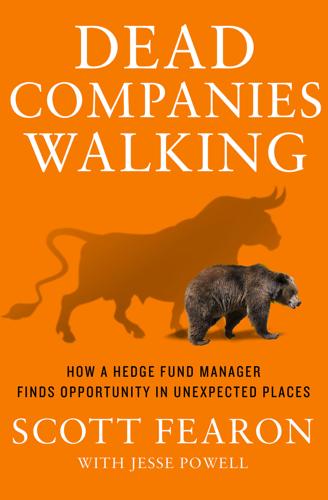
Dead Companies Walking
by
Scott Fearon
Published 10 Nov 2014
In a healthy economy, capital markets fuel growth by allocating resources to smart ideas and well-run companies while starving out less-deserving ventures. But by protecting investors in the stocks and especially the bonds of failed companies, we’ve warped that process. Capital increasingly flows to politically favored businesses instead of innovative and well-managed concerns. That’s not a free market; it’s crony capitalism—a surefire way to hamper growth, job creation, and economic vitality. I know it sounds contradictory, but I believe that if we want to return to a growing and dynamic economy, we have to learn to embrace failure again. We have to let the markets get back to their normal function of elevating good ideas and eliminating bad ones.
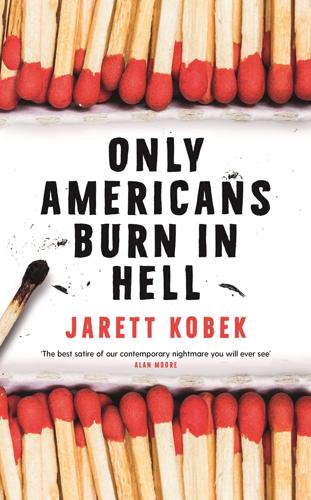
Only Americans Burn in Hell
by
Jarett Kobek
Published 10 Apr 2019
Orson’s hobbies included skipping rocks across ponds, speaking in a high-pitched voice while imitating his mother’s folk wisdom, and pretending that he was a beautiful princess waiting to be rescued by a dashing knight. Being an asymptomatic carrier of typhoid fever meant that although Orson never showed any signs of having the disease, his body was in a state of constant typhoid production. Orson was like a factory worker under crony capitalism: he was making something, but he didn’t share in the gains of that production. One night, Orson was corralled into helping prepare a feast. This had happened because one of the usual preparers of food was busy fucking out his brains in a shadowy elm grove by the Ancient Rocks of Forever. And so Orson helped prepare the feast for the Red-Rose Knight, the Red-Rose Knight’s men, and all the women of Fairy Land.
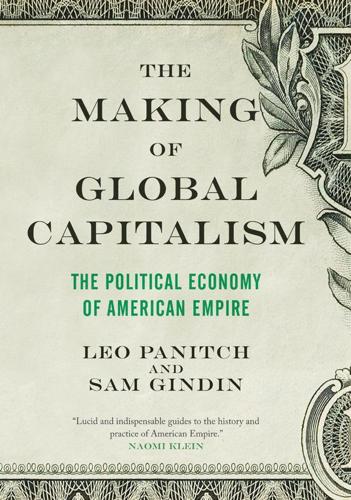
The Making of Global Capitalism
by
Leo Panitch
and
Sam Gindin
Published 8 Oct 2012
But both the grand principles and the local clientelism and patronage were totally embedded in local notables and balances of power.”83 This was the “crony capitalism” that the IMF would demand be extirpated in exchange for its emergency loan packages after the Asian financial crisis erupted in 1997. And when the contagion from that crisis spread to Russia the following year, it was the IMF’s very public despair at not being able to do anything about this “crony capitalism” in the Russian case that led it to pull back from its emergency lending, sparking the Russian government’s default in August 1998 on its foreign debt (which at $61 billion represented 17 percent of Russian GDP).
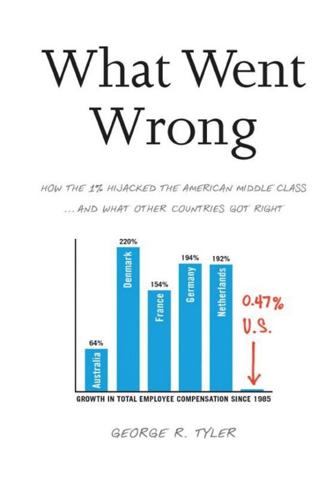
What Went Wrong: How the 1% Hijacked the American Middle Class . . . And What Other Countries Got Right
by
George R. Tyler
Published 15 Jul 2013
And self-regulation prevailed whose inevitable outcome was described by Martin Wolf, chief economic columnist for the Financial Times, in December 2007: “What is happening in credit markets today is a huge blow to the credibility of the Anglo-Saxon model of transactions-oriented financial capitalism. A mixture of crony capitalism and gross incompetence has been on display in the core financial markets of New York and London. From … subprime lending to the placing (and favourable rating) of assets that turn out to be almost impossible to understand, value or sell, these activities have been riddled with conflicts of interest and incompetence.”62 The rather dire consequences for the real economy of regulatory capture were also noticed in Asia.
…
Two quasi-independent entities comprise this structure, Fair Work Australia and the Australian Productivity Commission; similar institutional arrangements exist in the other family capitalism countries.39 These institutions enjoy powerful support from voters and enforce government rules supporting broadly based prosperity. On a spectrum of income disparity, the Reagan-era US income distribution leans toward the crony capitalism of nations such as China, with wide disparities. At the other end of the spectrum are Australia and the other family capitalism countries, where families broadly enjoy economic sovereignty and garner a considerable portion of the gains from growth. As I have emphasized, it’s not the quantity of government regulations, taxes, or the size of government that distinguish Australia or Germany from the US, but whether government rules broadcast the gains from growth widely or narrowly.
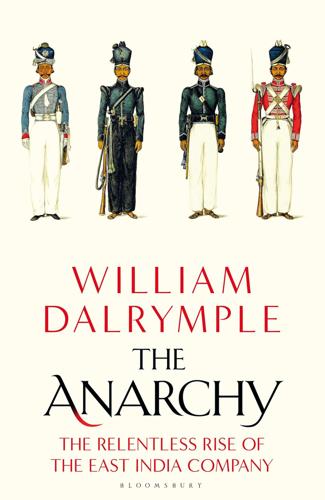
The Anarchy: The Relentless Rise of the East India Company
by
William Dalrymple
Published 9 Sep 2019
In September 2015, the then governor of India’s central bank, Raghuram Rajan, made a speech in Mumbai expressing his anxieties about corporate money eroding the integrity of parliament: ‘Even as our democracy and our economy have become more vibrant,’ he said, ‘an important issue in the recent election was whether we had substituted the crony socialism of the past with crony capitalism, where the rich and the influential are alleged to have received land, natural resources and spectrum in return for payoffs to venal politicians. By killing transparency and competition, crony capitalism is harmful to free enterprise, and economic growth. And by substituting special interests for the public interest, it is harmful to democratic expression.’ His anxieties were remarkably similar to those expressed by Horace Walpole and many others in Britain more than 300 years earlier, when the East India Company had become synonymous with ostentatious wealth and political corruption.
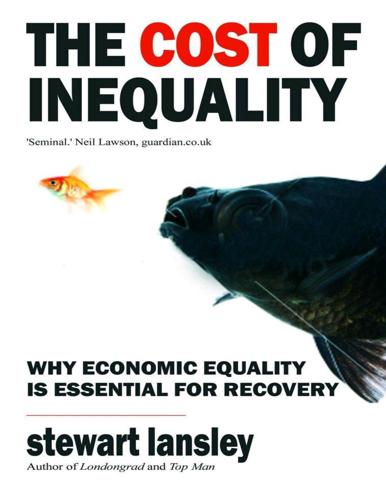
The Cost of Inequality: Why Economic Equality Is Essential for Recovery
by
Stewart Lansley
Published 19 Jan 2012
George W Bush’s first cabinet—dubbed a ‘junta of major corporate interests’—had a combined wealth more than ten times that of the Clinton cabinet.256 Government was effectively captured by a group of cheerleaders for the further deregulation of finance. Thomas Hoenig, President of the Reserve Bank of Kansas City has called the American economic system ‘crony capitalism … who you know, how big your political donation is.’257 A similar if less direct process has been at work in the UK. Gradually an elite group of financiers came to exercise an increasingly monopolistic influence on Britain’s political leaders, out of all proportion to their real economic contribution.
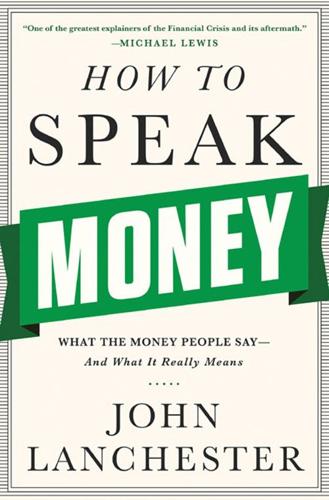
How to Speak Money: What the Money People Say--And What It Really Means
by
John Lanchester
Published 5 Oct 2014
Second, less well known and maybe more interesting, is the pattern of industrial ownership, in which large family-owned companies invest for the very long term, with complex and overlapping patterns of ownership and relationship between big, stable companies—the opposite of the Anglo-Saxon model in which everyone looks at the stock market price and the quarterly profits figures ahead of everything else. This Swedish industrial model is sometimes admired abroad for its long-termism and stability, sometimes deplored for its crony capitalism, depending on how it is perceived as performing relative to its foreign alternatives. synergy Mainly bullshit, but when it does mean anything, it means merging two companies and taking the opportunity to sack people. For instance, if two companies that make similar products merge, they will have similar warehouse and delivery operations: so one of the two sets of employees will lose their jobs.
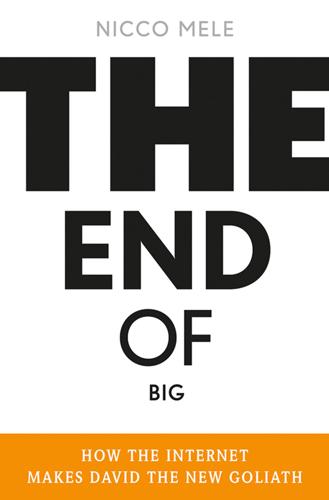
The End of Big: How the Internet Makes David the New Goliath
by
Nicco Mele
Published 14 Apr 2013
And I was surprised to discover that the quality and depth of every submission transcended the vast majority of the output of bloggers or citizen journalists. Professionalism in journalism might not be sexy, it might seem old-fashioned, but it does matter. Consider what happened in the small town of Bell, California. The town’s mayor paid himself ever-larger salaries—over $800,000 a year—and engaged in the most crooked, crony capitalism, handing out other oversize salaries to his friends. Meanwhile, through a combination of lies and intimidation, he kept the largely poor, Hispanic city population in the dark, continuing to cut critical municipal services while giving himself and his buddies pay raises. After months of research and work, the Los Angeles Times delivered a pounding exposé of the corruption that led to multiple arrests.
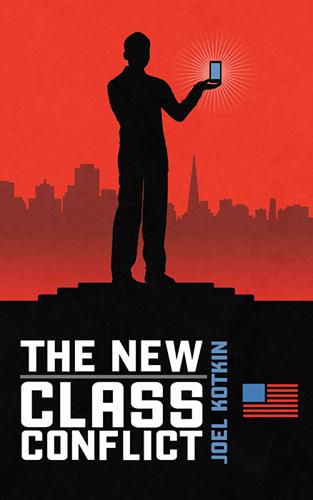
The New Class Conflict
by
Joel Kotkin
Published 31 Aug 2014
Much of conventional opinion on the right generally embraces the idea of a “new normal” and certainly has little appetite, perhaps outside the early Tea Party, to confront either the old oligarchy or even the new one. Most Republicans, particularly in the Senate, embraced the bailout of the large financial institutions, the very essence of the crony capitalism that favors large, established, and connected institutions over smaller ones.20 But such negativity and defeatism is not necessary, given the basic strengths of the U.S. economy. The American economy may not possess the “almost limitless resiliency” claimed by Kiplinger during the mid-80s Reagan-era boom, but its capacity for renewal is still much greater than is widely believed.21 The notion that America faces a negative trajectory has been commonplace since the time of the Depression.

Space 2.0
by
Rod Pyle
Published 2 Jan 2019
As John Logsdon, former director of the Space Policy Institute at George Washington University, put it, “Their budget is not adequate to maintain a world-class space effort across the board.”111 The situation was put in a starker light by space historian Asif Siddiqui: “Roscosmos has been beset with corruption, mismanagement, and crony capitalism that is the hallmark of the larger post-Soviet economy. In a tech sector that needs to meet very high standards, these problems have led the workforce on the ground to cut corners.”112 In November 2017, a Soyuz upper stage failed at liftoff, after an earlier launch failure in 2016 and three in 2015.
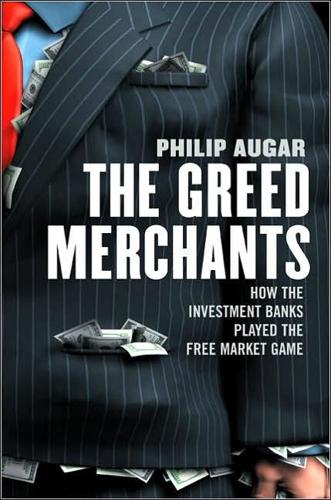
The Greed Merchants: How the Investment Banks Exploited the System
by
Philip Augar
Published 20 Apr 2005
A consequence was outlined to me by one of the world’s top investment bankers: ‘A true relationship comes when the CEO feels comfortable with one person and one bank. You are expected to deliver a reasonable price but it is not the be-all and end-all. Everyone feels comfortable and does not inquire about price. It is a rough and ready thing.’21 A better description of crony capitalism I have yet to hear. Issuers One of the mysteries of the IPO process is why issuers were so forgiving of the investment banks, allowing them to persist with high fees and not objecting when the shares they had just sold very often rose to a premium. The difference between the price at which shares are issued and the price at which they open is known as ‘money left on the table’ by the issuer.
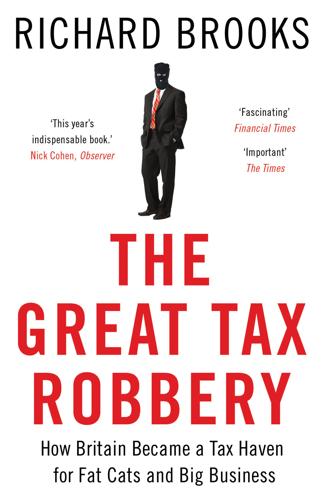
The Great Tax Robbery: How Britain Became a Tax Haven for Fat Cats and Big Business
by
Richard Brooks
Published 2 Jan 2014
David Cameron promised that his government would be ‘business-friendly to small businesses’, whereas ‘with the large companies, that have the fancy corporate lawyers and the rest of it, I think we need a tougher approach’.15 Not to be outdone, his deputy Nick Clegg clearly had Vodafone and Goldman Sachs in mind when he promised to take on ‘a wealthy elite of large businesses who can pay an army of tax accountants to get out of paying their fair share of tax, who basically treat paying tax as an optional extra where you can pick and choose the taxes you pay’.16 Their interventions were part of a politically shrewd broadside against ‘crony capitalism’ that took in not just tax dodging but other scourges such as excessive boardroom pay. If their austerity programme was to carry public support, they needed to look like they were confronting greed at the top too. When it comes to taxation, the need for fairness is especially acute. If individuals and small businesses sense that the privileged are not paying their fair share, compliance with tax laws can fall dramatically, with economically ruinous consequences.
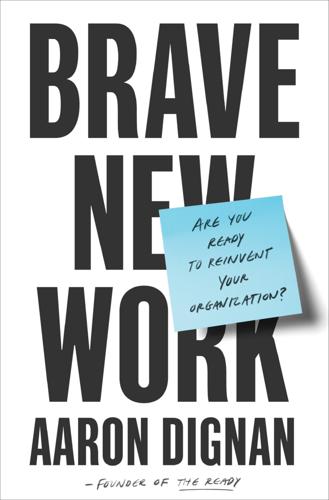
Brave New Work: Are You Ready to Reinvent Your Organization?
by
Aaron Dignan
Published 1 Feb 2019
And the coup de grâce, accelerating climate change that threatens the safety and security of billions of people. All of it the result of our mindless adherence to the ways of the past—to an operating system that fundamentally misunderstands complexity and human nature. This isn’t the uplifting capitalism of a burgeoning economy, it’s advanced capitalism at best and crony capitalism at worst. That future doesn’t work for me. Somehow we have to reconcile that twentieth-century bureaucracy and capitalism got us here, but they won’t get us where we need to go unless they (and we) evolve. We are being called to lead that renaissance. You can feel it in your gut that this is the turning point.
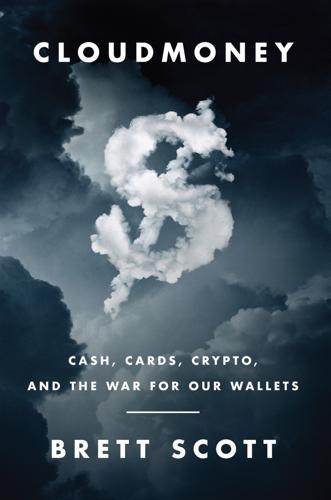
Cloudmoney: Cash, Cards, Crypto, and the War for Our Wallets
by
Brett Scott
Published 4 Jul 2022
While the technically minded witnesses struggle to describe Bitcoin’s blockchain in anything but this incomprehensible mumbo-jumbo, others are attracted to shouting catchy political slogans about how the ghost stands for freedom and innovation. They also are intent upon telling the detective what it does not look like. They contrast it with the centralised database, the banks, corruption, flimsy politics, filthy records stored in filing cabinets, governments, Mastercard, third parties, crony capitalism, socialist dictators, inflation, taxation, theft! One slogan really stands out: Bitcoin is digital gold, backed by mathematics. It sounds impressive, but on second thought the detective – me – realises it is not particularly informative. Mathematics is an abstract language, and while I might construct equations to model gravity, that ancient force is not backed by a human-invented number system.

Jared Bibler
by
Iceland's Secret The Untold Story of the World's Biggest Con-Harriman House (2021)
There is also a value added tax (VAT) that for most goods and services stands at 24%. (2019 data.) 13 The decision to float the Icelandic currency in the first place was part of a neoliberal economic program spearheaded by Prime Minister Davíð Oddsson. All of the easy money flowing into the country as a result fueled a banking and asset boom. Icelandic banks in those years were able to borrow seemingly as much as they wanted. Davíð’s privatization of the banks was classic crony capitalism. There was no competitive bidding process. The politicians who controlled the country handed out banks to their allies as favors, one major bank to each of the two political parties in power, with no serious bids from foreign institutions. This was a family affair. 3 The go-go year T his guy is just impeccably well dressed.
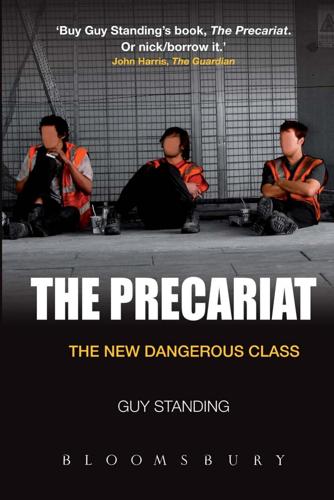
The Precariat: The New Dangerous Class
by
Guy Standing
Published 27 Feb 2011
Obama never tried to reach out to the precariat, even though many in it had been hopeful that he would do so. The social democratic imagination could not empathise with real predicaments. In the United States and elsewhere, anger grew at some of the corrupt aspects of the globalisation era. Recall the systemic use of subsidies. Naomi Klein among others has called the globalisation era ‘crony capitalism’, revealing itself not as a huge ‘free market’ but as a system in which politicians hand over public wealth to private players in exchange for political support. Ironically, far-right groups captured the anti-corporatist backlash. If the state has been captured by cronyism, why should anyone support a ‘strong state’?
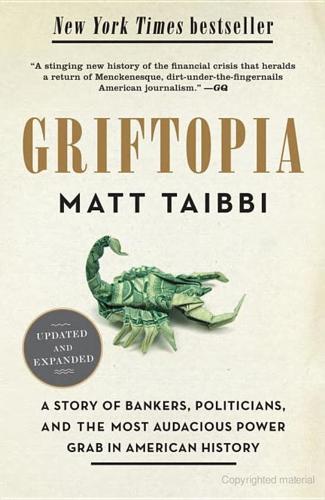
Griftopia: Bubble Machines, Vampire Squids, and the Long Con That Is Breaking America
by
Matt Taibbi
Published 15 Feb 2010
The government might let other players on the market die, but it simply would not allow Goldman Sachs to fail under any circumstances. Its implicit market advantage suddenly became an open declaration of supreme privilege. “It wasn’t even an implicit assumption anymore,” says Simon Johnson, an economics professor at MIT and former International Monetary Fund official who compared the bailouts to the crony capitalism he had seen in the underdeveloped world. “It became an explicit assumption that the government would always rescue Goldman.” All of this government aid belies the myth of Goldman as a collection of the smartest cats in the world. All of this stuff sounds complicated, but when you get right down to it, it isn’t.
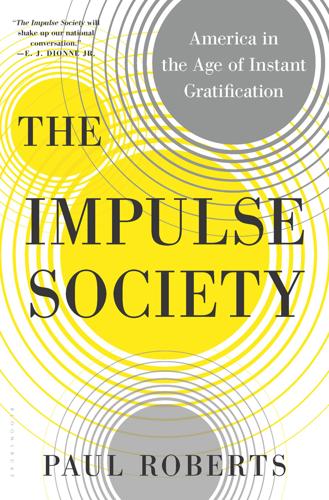
The Impulse Society: America in the Age of Instant Gratification
by
Paul Roberts
Published 1 Sep 2014
Since the rise of the Impulse Society, however, that connection has faltered. In recent decades, we’ve demonstrated that it’s possible to have a roaring GDP and a failing society. It’s not simply that more and more of the growth is being rerouted to a smaller population of beneficiaries, via the efficiencies of financialization and crony capitalism. It’s also that, in a socioeconomic system whose values are set by the marketplace, economic “success” no longer necessarily coincides with social success. Indeed, it is part of the perverse nature of the self-centered economy that our social failures are often the source of our roaring GDP.
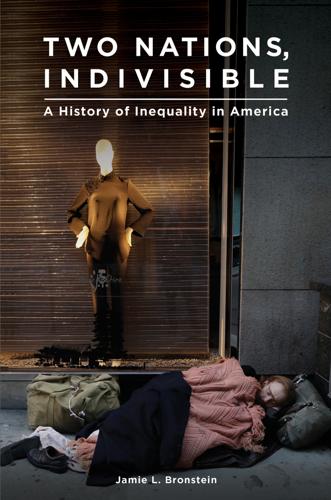
Two Nations, Indivisible: A History of Inequality in America: A History of Inequality in America
by
Jamie Bronstein
Published 29 Oct 2016
Social thinkers in both Britain and the United States in the 1880s promoted the notion that no one was a social atom, that people ought to be knit to each other with certain rights and responsibilities by virtue of being co-citizens, and that the state had a role to play in nurturing accomplishment and education to make this possible.55 The Social Gospel movement, which emerged simultaneously from the churches and from the grassroots, provided a religious grounding for such policies by emphasizing that the Bible promoted neighborly uplift and care for the poor.56 Some writers, such as muckraking journalist Henry Demarest Lloyd, identified monopolies and corruption as the enemies of society. In Wealth Against Commonwealth (1894), Lloyd despaired because Americans’ attempts to institute municipal services like streetcars and gasworks were “sung to sleep with the lullaby about government best, government least.”57 Lloyd painstakingly chronicled the emergence of crony capitalism, false corporate entities, differential pricing, and rebates in the railroad and oil industries, all presided over by a sham regulatory system. But in the end he did not blame the corporations but rather the men behind them. “The real actors are men; the real instrument, the control of their fellows by wealth, and the mainspring of the evil is the morals and economics which cipher that brothers produce wealth when they are only cheating each other out of their birthrights.”58 Corporate capitalism eroded American morality.59 Lloyd noted that the United States was a political, but not an economic, democracy.
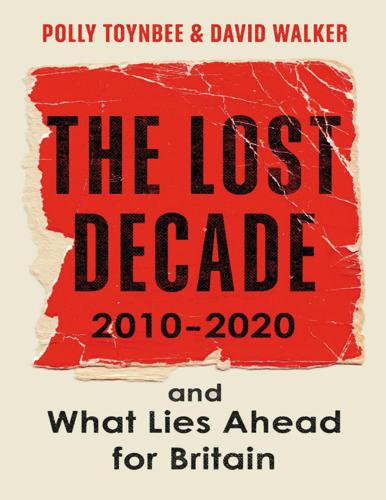
The Lost Decade: 2010–2020, and What Lies Ahead for Britain
by
Polly Toynbee
and
David Walker
Published 3 Mar 2020
Nonetheless, 60 per cent went on saying it was the government’s duty to reduce differences between people with high and low incomes, the same as in Sweden and Germany, and substantially higher than in the US. Levels of mutual trust were similar to in Germany and higher than in France, as measured before the gilets jaunes started rampaging. ‘We’re all in it together,’ George Osborne mocked, as he tugged policy in the opposite direction. Unfairness was in your face as crony capitalism was displayed in the form of vast and undeserved salary packages and bonuses. Greedy company directors proved immune to public shaming: a day’s embarrassment once a year from a few bolshie shareholders at the general meeting was well worth the millions. For their staff, low pay became endemic.
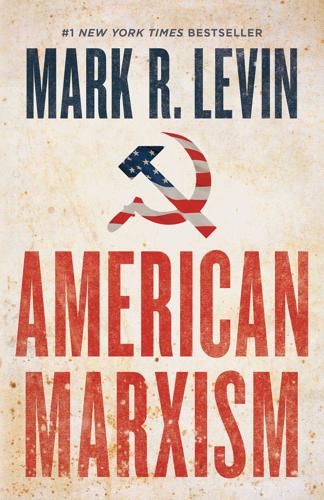
American Marxism
by
Mark R. Levin
Published 12 Jul 2021
Where possible, you should also purchase goods and services from smaller, start-up, or neighborhood businesses that are less likely to be involved in the various Marxist-based movements, rather than large international corporations, Amazon, or large warehouse stores that are increasingly aligned with those movements. 3. Support for free market capitalism must no longer be confused with defending corporate oligarchism and crony capitalism. Large corporations have moved into the social activism business and have aligned with Marxist-based movements and the Democratic Party.55 Therefore, let them live under the iron fist of their newfound partners and experience the consequences. When our allies in government are setting tax and regulatory policies, we must insist that they segregate the treatment of the oligarchical corporations from small and medium-sized businesses.
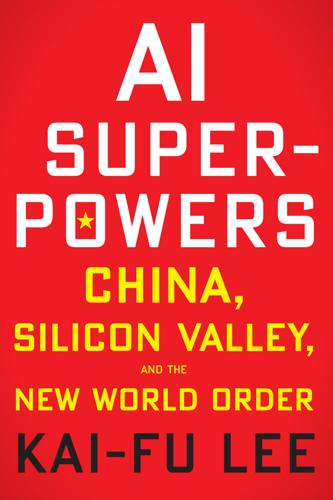
AI Superpowers: China, Silicon Valley, and the New World Order
by
Kai-Fu Lee
Published 14 Sep 2018
One of the recipients of those loan guarantees was Solyndra, a California solar panel company that initially looked promising but then went bankrupt in 2011. President Obama’s critics quickly turned that failure into one of the most potent political bludgeons of the 2012 presidential election. They hammered the president with millions of dollars in attack ads, criticizing the “wasteful” spending as a symptom of “crony capitalism” and “venture socialism.” Never mind that, on the whole, the loan guarantee program is projected to earn money for the federal government—one high-profile failure was enough to tar the entire enterprise of technological upgrading. Obama survived the negative onslaught to win another term, but the lessons for American politicians were clear: using government funding to invest in economic and technological upgrades is a risky business.
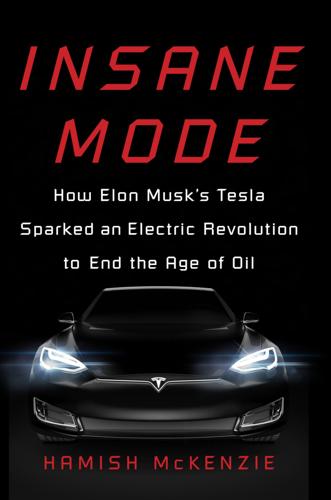
Insane Mode: How Elon Musk's Tesla Sparked an Electric Revolution to End the Age of Oil
by
Hamish McKenzie
Published 30 Sep 2017
The video proceeded to suggest that Musk has been using his “unprecedented access to the halls of power” to line the pockets of politicians in an effort to secure billions of dollars of subsidies for his ventures Tesla, SpaceX, and SolarCity—all at the expense of the unsuspecting American taxpayer. Below the video, the site linked to critical articles about Musk and his “crony capitalism,” including opinion pieces written by such people as Veronique de Rugy, a research fellow at the Koch-funded Mercatus Center at George Mason University, and Bruce Fein, formerly an adjunct scholar at the American Enterprise Institute, funded by the Koch-linked Donors Trust nonprofit group. In his piece, Fein even wondered if the Koch brothers should create “an annual Elon Musk Fleecing Government Award to stigmatize wealth begotten from the hijacking of government to obtain risk-free riches.”
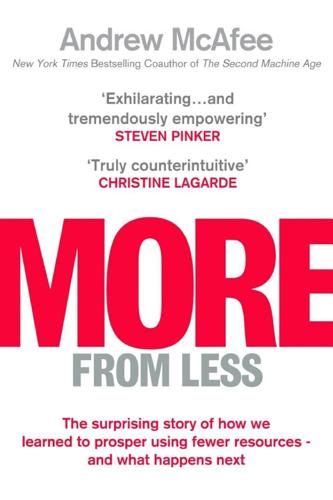
More From Less: The Surprising Story of How We Learned to Prosper Using Fewer Resources – and What Happens Next
by
Andrew McAfee
Published 30 Sep 2019
Smith saw that government had a role to play in making sure that competitors don’t become cronies—close friends who collude to all get rich together by simultaneously raising prices. Many of the complaints I hear about our current economic system aren’t complaints about capitalism. Instead, they’re complaints about perversions of it. Collusion and crony capitalism, as described by Smith in the paragraph above, are dangers. So is corporatism: favors done for large, established companies by the government. Smith also realized the danger of what is now called regulatory capture—where instead of acting in the best interests of the public, regulators or elected officials instead take care of incumbent companies.
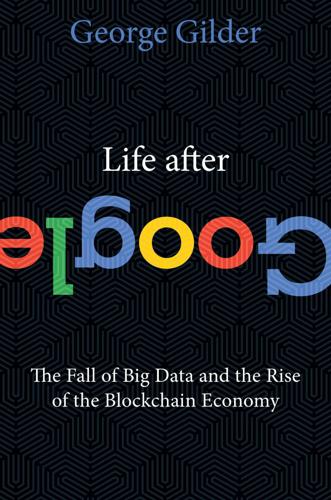
Life After Google: The Fall of Big Data and the Rise of the Blockchain Economy
by
George Gilder
Published 16 Jul 2018
They’re the ones who appoint these imperial currency managers, piling on the transfer payment bloat and bribing the voters with impossible promises of never-ending pensions. (If you can’t vote them out, then just stir in more fiat money and debt into the $280 trillion doomsday pot.) Let us pass by these prescriptions without comment. The premise of the cryptocurrency movement is the recognition that the old bureaucracies of socialism and crony-capitalism have failed. That is the problem, not the solution. A source of the confusion is Stinchcombe’s notion, fostered by the crypto-movement itself, that smart contracts and global currencies are something entirely new. He implies that the disintermediation of trusted third parties is a radical departure fostered by a blockchain apocalypse.

Andrew Carnegie
by
David Nasaw
Published 15 Nov 2007
In 1862, Carnegie invited Jacob Linville, the Pennsylvania’s chief bridge engineer, and John Piper and Aaron Shiffler, also engineers, to join him, Scott, and Thomson in organizing a new company to build iron railroad bridges in Pittsburgh. The new company, Piper & Shiffler, was a fine example of nineteenth-century crony capitalism. Carnegie would oversee operations and finances from Pittsburgh. Scott and Thomson, who remained silent partners in the enterprise, would make sure the new company received lucrative contracts for iron bridges from the Pennsylvania and its affiliated companies. As he had become the modus operandi of their investment partnership, Carnegie held Scott’s stock in his own name.
…
Carnegie created a company with no assets, added value to it by making deals with his partners Thomson and Scott, and then, after a series of negotiations and exchanges, transmogrified stock worth no more than the paper on which it was engraved into shares of Western Union that he would hold and collect dividends on for the rest of his life. This was crony capitalism at its most basic. And there were no laws on the books to stop it, no Securities and Exchange Commission to regulate it. Anyone with the money to print stock certificates and the political influence to get an act of incorporation through a state legislature could play the game. AT THE SAME TIME that he was organizing his Keystone Telegraph Company, Carnegie reentered the sleeping car business, another industry poised to ride the postwar railway boom.
…
While they expected to be awarded Pennsylvania Railroad contracts for their rails, they did not intend to operate as a subsidiary of one railroad. The intent behind the decision to build the new steel mill adjacent to the B&O tracks and on the Monongahela River was unmistakable. Carnegie, who had made his fortune by playing the game of crony capitalism, was signaling to Thomson that he would play that game no longer. The Edgar Thomson steelworks would sell its wares to the highest bidders—for the highest price—and transport its raw materials and finished goods on the roads that offered the best rates. It would be captive to neither Thomson nor his Pennsylvania Railroad.19 In later years, Carnegie’s enemies would claim that one of the sources of his early success was the “special concessions” on freight rates his companies received from the Pennsylvania Railroad.
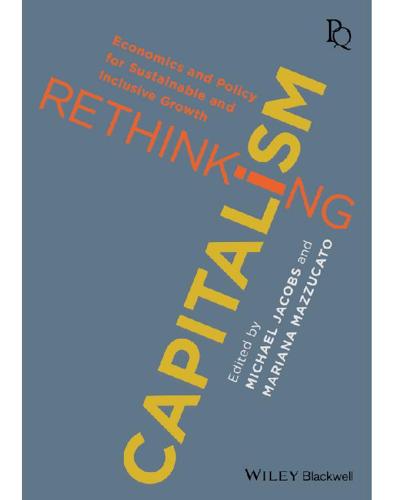
Rethinking Capitalism: Economics and Policy for Sustainable and Inclusive Growth
by
Michael Jacobs
and
Mariana Mazzucato
Published 31 Jul 2016
See https://www.gov.uk/government/groups/uktistrategic-relations-team#supporting-the-uks-top-76-investors-and-exporters (accessed 22 October 2015). 13 Ibid. 14 R. H. Bork, The Antitrust Paradox: A Policy at War with Itself, New York, Free Press, 1993, 1st edn 1978; R. A. Posner, Antitrust Law, 2nd edn, Chicago, University of Chicago Press, 2001. 15 T. Cave and A. Rowell, A Quiet Word: Lobbying, Crony Capitalism and Broken Politics in Britain, London, Bodley Head, 2014. 16 Davis, Lister and Wrigley, NHS for Sale. 17 A helpful discussion of the various issues arising from the TTIP can be found in Queries, no. 6, Spring 2015, pp. 32–83, http://www.queries-feps.eu/PDF%20Complet%20-%20Queries%206.pdf (accessed 22 October 2015). 18 The most impressive example of this was R.
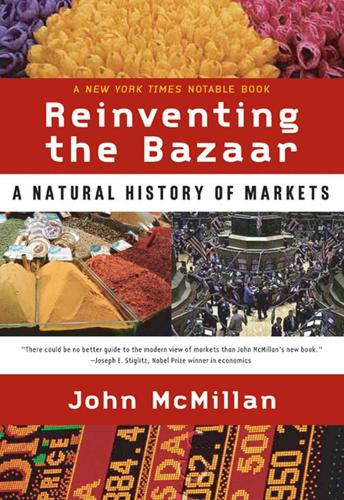
Reinventing the Bazaar: A Natural History of Markets
by
John McMillan
Published 1 Jan 2002
The concentration of ownership in a few hands reflects the absence of formal shareholder protections. Outsiders’ justifiable fears that the company will be run in the interests of the controlling family dissuade them from investing in it. The members of the clique often have special links to the government, and such crony capitalism adds to outside shareholders’ defenselessness. In Russia, there is little regulatory oversight and lawsuits are difficult to mount. Investors are told little about the state of firms, and what little they are told is unreliable. Sometimes they are even locked out of annual meetings. Managers often sell off subsidiaries and pocket the proceeds.
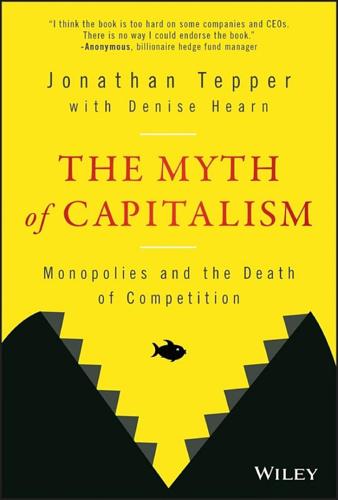
The Myth of Capitalism: Monopolies and the Death of Competition
by
Jonathan Tepper
Published 20 Nov 2018
Ibid. 24. http://antitrustconnect.com/2017/08/07/rejection-of-containerboard-conspiracy-claims-shows-difficulty-of-getting-an-antitrust-case-to-a-jury/. 25. https://www.healthaffairs.org/do/10.1377/hblog20170905.061802/full/. 26. Steven G. Calabresi, “The Right to Buy Health Insurance across State Lines: Crony Capitalism and the Supreme Court,” 81 U. Cin. L. Rev. (2013).” Available at: https://scholarship.law.uc.edu/uclr/vol81/iss4/5; “Focus on Health Reform: How Competitive are State Insurance Markets?” The Henry J. Kaiser Family Foundation (October 2011), http://www.kff.org/healthreform/upload/8242.pdf; and Bob Cook, “AMA: Health Plan Market Dominance Causes ‘Competitive Harm,’ ” American Medical News (December 10, 2012), http://www.ama-assn.org/amednews/2012/12/10/bisb1210.htm. 27.
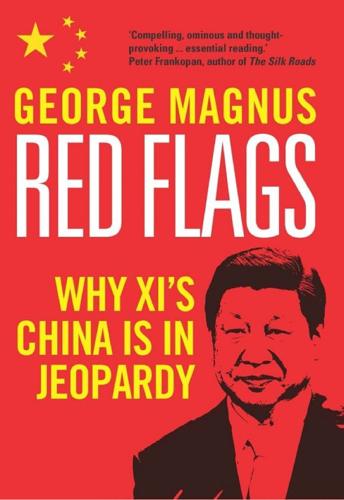
Red Flags: Why Xi's China Is in Jeopardy
by
George Magnus
Published 10 Sep 2018
, John Wiley & Sons, 2011 Marshall, Tim, Prisoners of Geography: Ten Maps that Tell You Everything You Need to Know about Global Politics, Elliott & Thompson, 2015 Mercator Institute for Chinese Studies, ‘China’s Core Executive’, June 2016 Mitter, Rana, China’s War with Japan, 1937–1945: The Struggle for Survival, Allen Lane, 2013 Morris, Ian, Why the West Rules – For Now, Profile Books, 2010 Naughton, Barry, The Chinese Economy: Transitions and Growth, MIT Press, 2007 Nolan, Peter, Re-Balancing China, Anthem Press, 2015 OECD, ‘The People’s Republic of China: Avoiding the Middle-Income Trap’, September 2013 OECD, ‘Economic Survey, China’, 2017 Pei, Minxin, China’s Crony Capitalism, Harvard University Press, 2016 Pettis, Michael, ‘China Financial Markets: Will China’s New “Supply-Side” Reforms Help China?’, <http://blog.mpettis.com>, 2016 Pieke, Frank N., Knowing China: A Twenty-First Century Guide, Cambridge University Press, 2016 Ringen, Stein, The Perfect Dictatorship: China in the 21st Century, Hong Kong University Press, 2016 Shambaugh, David, ed., Deng Xiaoping: Portrait of a Chinese Statesman, Oxford University Press, 1995 Shih, Victor, ‘Financial Instability in China: Possible Pathways and their Likelihood’, Mercator Institute for China Studies, 20 October 2017 ‘Silk Road Bottom Up: Regional Perspectives on the Belt and Road Initiative’, ed.
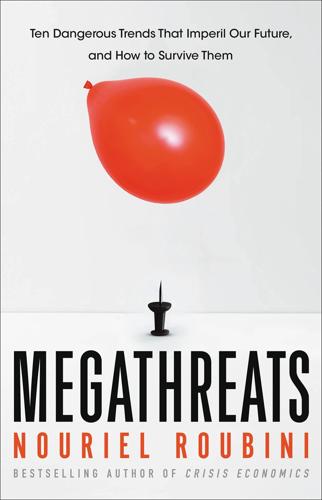
MegaThreats: Ten Dangerous Trends That Imperil Our Future, and How to Survive Them
by
Nouriel Roubini
Published 17 Oct 2022
Ultimately, the collapse of bloated, predatory governments mobilizes citizens to redistribute economic assets, at huge costs. The collapse of the Soviet Union, though ostensibly peaceful, caused a demographic collapse along with violent conflicts along the edges of its empire, and a civil war in Chechnya. Ultimately, the result was a new militaristic autocracy in Russia, with a new version of crony capitalism that enriched a very small elite. Such a kleptocratic autocracy became aggressive, most lately in Ukraine, in the delusional dream of restoring the Soviet empire. As inequality festers, it tends to bring gaping budget deficits and private dissavings financed by unsustainable public and private debts.

The Hidden History of Burma
by
Thant Myint-U
Even tigers were not spared, as their habitat was wrecked and they themselves hunted for the sale of their body parts to an insatiable Chinese market. By the 2000s, Burma’s tigers were on the verge of extinction. A kind of capitalism was being restored. Some like to put an adjective in front: “crony capitalism,” “ceasefire capitalism,” “army capitalism.” It wasn’t the socially responsible capitalism the World Economic Forum might want to promote, but it wasn’t too different from the system in colonial days: an extractive economy that benefited office-holders most, then a handful of businessmen, with infrastructure built to serve exports, and with little or no concept of the state as something meant to serve popular welfare.
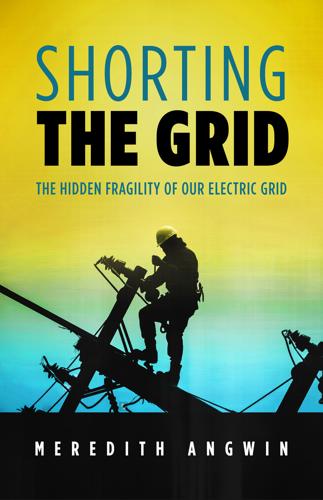
Shorting the Grid: The Hidden Fragility of Our Electric Grid
by
Meredith. Angwin
Published 18 Oct 2020
Transmission lines are a well-known technology, and the bidders are very likely to bid very similar amounts. For these reasons, many knowledgeable people think competitive bidding will not lower costs but that setting up the competitive RFP will raise costs. Personally, I think RFPs are an important part of grid governance. RFPs are a partial bulwark (note how I am hedging my words) against crony capitalism. So, I don’t totally agree with this argument that RFPs will make transmission lines more expensive. RFPs certainly make things more complicated, though. Utility Dive’s Herman Trabish has a recent article which raises a related topic: Has FERC’s landmark transmission-planning effort made transmission building harder?
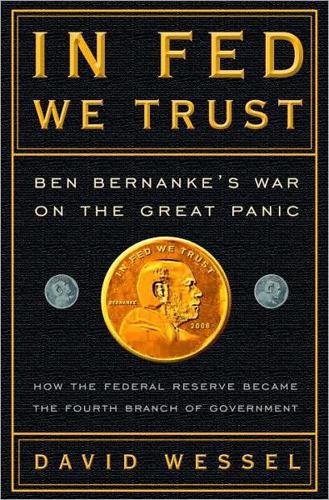
In FED We Trust: Ben Bernanke's War on the Great Panic
by
David Wessel
Published 3 Aug 2009
Directors of regional Fed banks didn’t vote to approve Fed loans like the one Bear Stearns was seeking; the loans went to the Fed board in Washington, where all the power was with government employees like Bernanke. And directors weren’t supposed to participate in formal conversations about their own institutions. But the incestuousness was obvious, the kind of crony capitalism that the U.S. government criticized in Indonesia and other developing countries. Geithner was hired by bankers he was supposed to supervise and, now, was being asked to bail out. The arrangement underscored the New York Fed’s peculiar relationship with Wall Street. It was supposed to be a regulator and guardian of the public interest, but sometimes was seen — by banks, by other factions inside the Fed, and by the public — as Wall Street’s advocate, rather than its overseer.
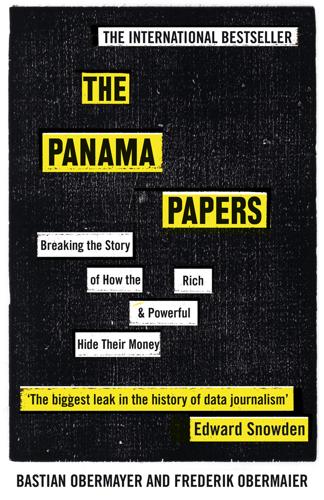
The Panama Papers: Breaking the Story of How the Rich and Powerful Hide Their Money
by
Frederik Obermaier
Published 17 Jun 2016
As well as Syriatel he also holds stakes in various banks, duty-free chain stores, an airline and much more. People in Syria have long since stopped asking what belongs to him and instead ask: what doesn’t? The New York Times wrote that Makhlouf was a ‘symbol of how economic reforms turned crony socialism into crony capitalism, making the poor poorer and the connected rich fantastically wealthier’. Rami Makhlouf, who was born in Damascus in 1969, is Bashar al-Assad’s cousin. Makhlouf’s aunt Anisa is the widow of the late president Hafis al-Assad, the current ruler’s father. Rami and Bashar played together when they were young, and today they are close allies – one the head of state, the other the businessman on whose money and connections Assad can count at all times.
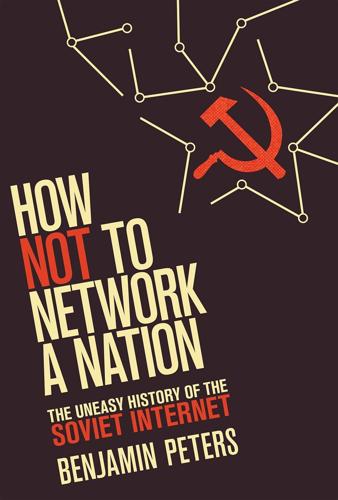
How Not to Network a Nation: The Uneasy History of the Soviet Internet (Information Policy)
by
Benjamin Peters
Published 2 Jun 2016
The basic institutions that stitch together the social and political fabric of democratic society—the rule of law, functioning courts, equitable tax compliance, Madisonian checks and balances, human and civil rights, an independent press, and private institutions—underlie the often ambiguous and always limited moral foundations of all modern information societies and economies, even informal economies.16 The patronage socialism of the Soviet Union (like the crony capitalism of modern-day Russia) was missing many of these elements (it had no rule of law, no predictability of procedure, no regulated financial environment, no bankruptcy law, no antirust law, no courts for managing property disputes, and no virtuous regulation of inseparable market and state), but this routine criticism risks ignoring the bigger picture.
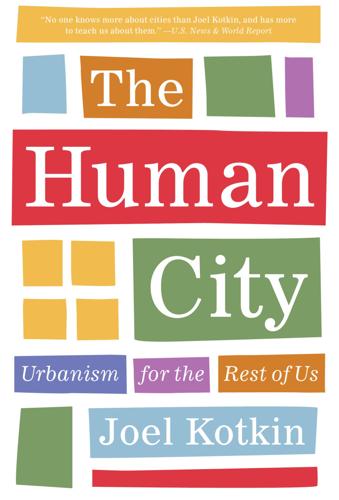
The Human City: Urbanism for the Rest of Us
by
Joel Kotkin
Published 11 Apr 2016
—Economist “Kotkin has a striking ability to envision how global forces will shape daily family life, and his conclusions can be thought-provoking as well as counterintuitive.” —WBUR-FM, Boston’s NPR news station Praise for The New Class Conflict “Were progressives serious about what used to preoccupy America’s left—entrenched elites, crony capitalism and other impediments to upward mobility—they would study ‘The New Class Conflict,’ by Joel Kotkin.” —Washington Post “In having the courage to junk the old nostrums, [Kotkin] has taken an important step forward.” —Financial Times “Joel Kotkin’s important new book, The New Class Conflict, suggests that America’s real class problems are deeper, and more damaging, than election rhetoric.”
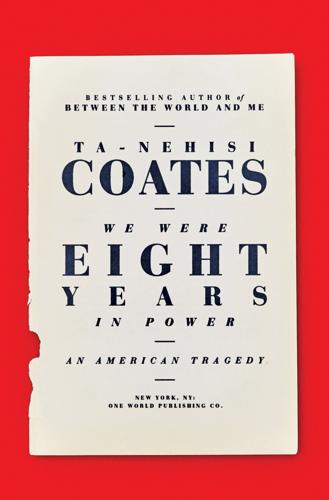
We Were Eight Years in Power: An American Tragedy
by
Ta-Nehisi Coates
Published 2 Oct 2017
Much ink has been spilled in an attempt to understand the Tea Party protests, and the 2016 presidential candidacy of Donald Trump, which ultimately emerged out of them. One theory popular among (primarily) white intellectuals of varying political persuasions held that this response was largely the discontented rumblings of a white working class threatened by the menace of globalization and crony capitalism. Dismissing these rumblings as racism was said to condescend to this proletariat, which had long suffered the slings and arrows of coastal elites, heartless technocrats, and reformist snobs. Racism was not something to be coolly and empirically assessed but a slander upon the working man. Deindustrialization, globalization, and broad income inequality are real.
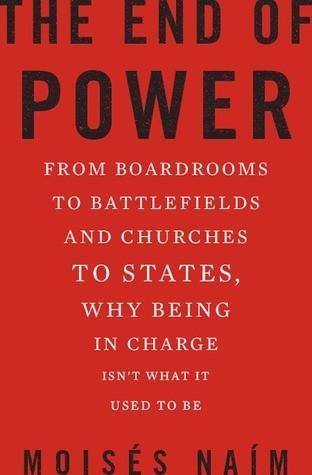
The End of Power: From Boardrooms to Battlefields and Churches to States, Why Being in Charge Isn’t What It Used to Be
by
Moises Naim
Published 5 Mar 2013
Across the Atlantic, the European Union—an ambitious project that many believed would form a counterpower to the United States—is mired in a devastating economic crisis, hampered by unwieldy governance, and slowed down by an aging population and a massive inflow of immigrants that the continent does not know how to absorb. Russia, the old rival and heir to Soviet resources and military capabilities, is another aging society, an authoritarian petro-state struggling to contain simmering popular discontent. Two decades of postcommunist crony capitalism, heavy-handed state intervention, and outright criminality have transformed the enormous nation into a hobbled and complicated beast that still owns a nuclear arsenal, yet is only a shadow of the superpower that preceded it. As noted, those searching for evidence of a new ascending great power have an easy answer: there is vitality in the east.
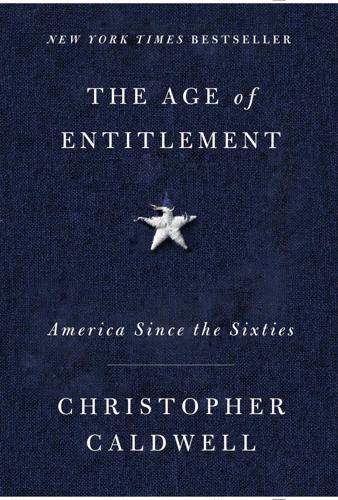
The Age of Entitlement: America Since the Sixties
by
Christopher Caldwell
Published 21 Jan 2020
Although the crisis arose out of American politics and American banking customs, virtually all of the most incisive diagnoses of the problem were done by those uninhibited by American political taboos—foreigners, in a word. Simon Johnson, an English-born former IMF economist, likened it to a late-twentieth-century emerging markets crisis of the sort he had seen in Ukraine, Russia, Thailand, Indonesia, and South Korea, with their crony capitalism and their corrupt, politically allocated credit. Raghuram Rajan, born in Bhopal and trained at MIT at the same time as Simon Johnson, had warned central bankers before the crisis that many American financial innovations meant to minimize risk, such as derivatives and swaps, were in fact amplifying it.

Human Frontiers: The Future of Big Ideas in an Age of Small Thinking
by
Michael Bhaskar
Published 2 Nov 2021
Ates see the role of those ever-stronger market-leading companies as critical.30 They note increases in the companies’ power and wealth, and corresponding increases in aggressive patenting activity (more of which below). This bloating and ossification enables establishment firms to dominate markets without real change. Vested interests, always averse to the unknown, then cream off the rewards of their entrenchment. Rent-seeking trumps innovation. Many companies cosy up to government for easy contracts – crony capitalism is still here. Markets, including the commanding heights of tech, are gridlocked, the same blue-chip names paraded year after year. Incentives for wrenching change wither in this environment – indeed, sectors that have a near miss on a major merger or acquisition remain more innovative, see more new companies and investment come in.31 The results are the pronounced shifts, already observed, towards development and away from research; pressure to return earnings to shareholders rather than reinvest them; a consolidation of big, older companies unwilling to disrupt themselves; a requirement to prove financial return that infects everything from the arts to academia.32 Over 80 per cent of the value of the S&P 500 is in intangible assets, which only makes companies want to husband and protect such assets, not radically alter them.33 The holding of such assets, including software, has moreover been correlated with decreased dynamism: sectors associated with these investments see a greater persistence of firms and less leapfrogging.34 All this creates what Mazzucato calls a ‘parasitic innovation ecosystem’, where large, powerful incumbents coast on work done elsewhere.35 Away from the glossy brochures, the phalanx of buzzword-spouting management consultants, the calendar-filling conferences, is a system both short-termist and static, risk-averse and returns-driven, timid and defensive.
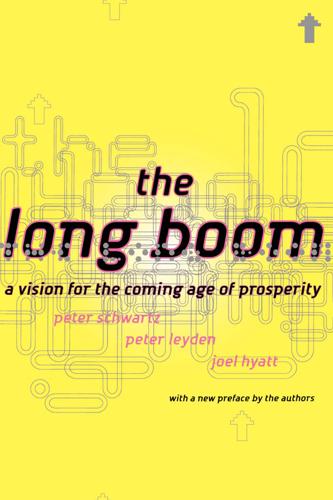
The Long Boom: A Vision for the Coming Age of Prosperity
by
Peter Schwartz
,
Peter Leyden
and
Joel Hyatt
Published 18 Oct 2000
No one has to tell them that it didn't work—they lived under it for seventy-five years. As long as they can find a reasonable transition to a decent form of capitalism, as opposed to the wild form of gangster capitalism that they have experienced, they'll move forward. The peoples of Southeast Asia don't want to go back to crony capitalism—certainly not if it will get them back into the same kind of trouble they experienced in the late 1990s. They want to do whatever it takes to get back to a high-growth economy, back into a boom—only this time a sustainable one built on solid financial foundations. The MilleNNiAl TRANSITION 55 The IMPERATIVE of GROwrk The millennial transition in global capitalism presents a choice to the world community: Do we proceed to a high-growth economic strategy; or do we maintain the status quo, a less dynamic economy of slow growth; or, as some radical environmentalists advocate, do we opt for no growth?
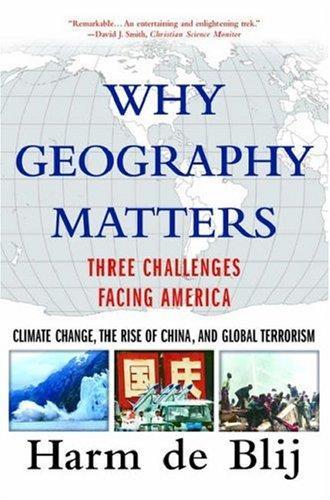
Why geography matters: three challenges facing America : climate change, the rise of China, and global terrorism
by
Harm J. De Blij
Published 15 Nov 2007
Russia was fortunate to possess substantial energy reserves from its share of the Caspian Basin in the west to Sakhalin Island in the east, with ready customers including Europe, Japan, and China. But overdependence on a single commodity entails risks and RUSSIA 241 skews development. It opened the way to "crony capitalism" as high-level insiders bought up state enterprises, tax collections faltered, factories failed, and, in 1998, the government defaulted and the economy crashed, driving away the first wave of investors. A vast reservoir of natural resources alone is not enough to ensure this (or any other) country's prosperity.
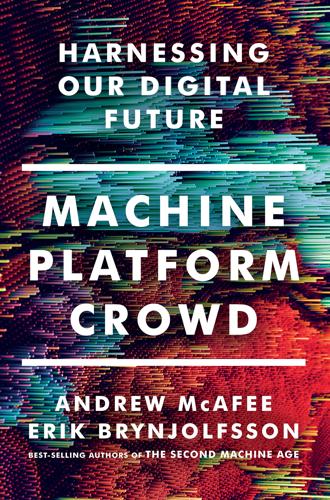
Machine, Platform, Crowd: Harnessing Our Digital Future
by
Andrew McAfee
and
Erik Brynjolfsson
Published 26 Jun 2017
Many of the weaknesses were not just software holes, but economic flaws that gave investors incentives to behave in ways that were at odds with the group’s best interest. Cade Metz, “The Biggest Crowdfunding Project Ever—The DAO—Is Kind of a Mess,” Wired, June 6, 2016, https://www.wired.com/2016/06/biggest-crowdfunding-project-ever-dao-mess. ‡ We do not share this view. Capitalism can be an enormous force for good, but “crony capitalism”—the act of distorting markets so that friends of the powerful can enrich themselves—should always be rooted out. § See, for example, Neil A. Gershenfeld, Fab: The Coming Revolution on Your Desktop—From Personal Computers to Personal Fabrication (New York: Basic Books, 2005). ¶ In his classic book The Visible Hand, Alfred Chandler argued that management, especially middle management, had become the most powerful institution in the US economy by the middle of the twentieth century.
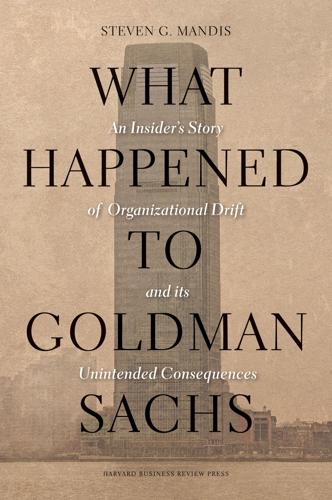
What Happened to Goldman Sachs: An Insider's Story of Organizational Drift and Its Unintended Consequences
by
Steven G. Mandis
Published 9 Sep 2013
Turns out, they were right” (Felix Salmon, “Hank Paulson’s Inside Jobs,” Reuters.com, November 29, 2011, http://blogs.reuters.com/felix-salmon/2011/11/29/hank-paulsons-inside-jobs/). Madison Ruppert says that Paulson’s actions epitomize “the plague upon our economy, and the greater global economic system, that is crony capitalism” (see “Turns Out the ‘Government Sachs’ Conspiracy Theorists Were Right All Along,” December 1, 2011, http://www.activistpost.com/2011/12/turns-out-government-sachs-conspiracy.html). 18. L. Wayne, “The Corridor from Goldman to Washington Is Well Traveled,” New York Times, December 13, 2002. 19.
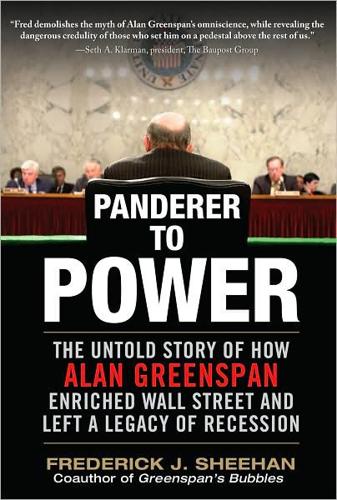
Panderer to Power
by
Frederick Sheehan
Published 21 Oct 2009
“You don’t have to predict it, we’re in it.”46 The former Federal Reserve chairman explained: “As custodian of the nation’s money, the Federal Reserve has the basic responsibility to protect its value and resist chronic pressures toward inflation.”47 It was apparent that Bernanke’s concerns did not include the dollar. He was busy bailing out participants in the crony capitalism that was making the United States look like a fourth-world country. 48 43 Richard Russell, Dow Theory Letter, March 17, 2008, pp. 7–8. 44 Federal Reserve Bank of New York, “Primary Dealer Credit Facility: Frequently Asked Questions.” www.ny.frb.org 45Roger Lowenstein, “The Education of Ben Bernanke,” New York Times Magazine, January 20, 2008. 46“Volcker’s Demarche,” “Review & Outlook,” online.wsj.com, April 9, 2008. 47 Paul Volcker, remarks at a luncheon of the Economic Club of New York, New York, April 8, 2008.
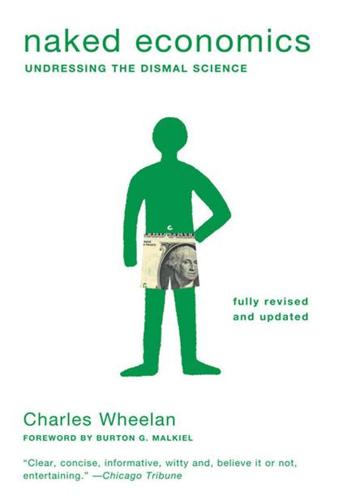
Naked Economics: Undressing the Dismal Science (Fully Revised and Updated)
by
Charles Wheelan
Published 18 Apr 2010
A private army is not an option, so this is the best we can reasonably expect. But the less the economy is left to politics, the better. Powerful politicians should not be deciding, for example, who gets bank credit and who does not. Yet that is exactly what happens in autocratic nations like China and in democratic countries like Indonesia where politicians play “crony capitalism.” Projects that have the potential to be highly profitable do not get financing while dubious undertakings sponsored by the president’s brother-in-law are lavished with government funds. Consumers lose in two ways. First, their tax money is squandered when projects that never should have been funded in the first place go bust (or when the whole banking system needs to be bailed out because it is full of rotten, politically motivated loans).
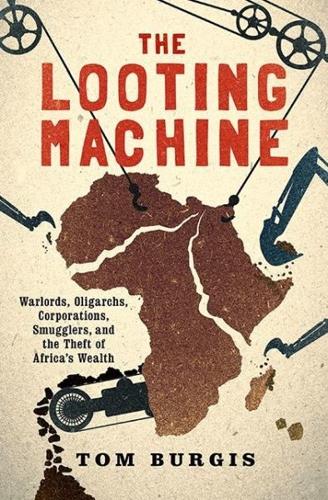
The Looting Machine: Warlords, Oligarchs, Corporations, Smugglers, and the Theft of Africa's Wealth
by
Tom Burgis
Published 24 Mar 2015
By then some five hundred thousand people had died. The MPLA found that the oil-fired machine it had built to power its war effort could be put to other uses. ‘When the MPLA dropped its Marxist garb at the beginning of the 1990s,’ writes Ricardo Soares de Oliveira, an authority on Angola, ‘the ruling elite enthusiastically converted to crony capitalism.’2 The court of the president – a few hundred families known as the Futungo, after Futungo de Belas, the old presidential palace – embarked on ‘the privatization of power’. Melding political and economic power like many a postcolonial elite, generals, MPLA bigwigs and the family of José Eduardo dos Santos, the party’s Soviet-trained leader who assumed the presidency in 1979, took personal ownership of Angola’s riches.

Targeted: The Cambridge Analytica Whistleblower's Inside Story of How Big Data, Trump, and Facebook Broke Democracy and How It Can Happen Again
by
Brittany Kaiser
Published 21 Oct 2019
In his unsavory tale, the Clintons—who, Hillary had claimed, left the White House “broke”—had rebuilt their financial empire during her years as secretary of state by accepting bribes in exchange for disaster relief; speeches, especially in countries such as Nigeria and Haiti; and changes in U.S. policy. Those bribes, Schweizer’s film claimed, filtered through the Clinton Foundation as payments for speeches Clinton had given—always at overinflated prices. It was “crony capitalism gone awry,” Schweitzer writes. I read the book at the time and would later watch the film with both disdain and alarm. It was odd to feel that way. I was not like the Hillary-obsessed Democrats of those days, and when the film was over, I couldn’t help but think that if even half of what it claimed was true, then I understood exactly why the Republicans were so dead set against Hillary ever becoming president.
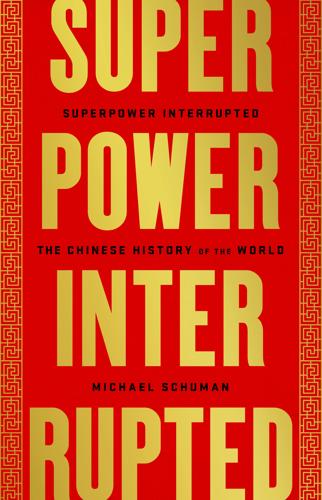
Superpower Interrupted: The Chinese History of the World
by
Michael Schuman
Published 8 Jun 2020
Michael Schuman provides an illuminating perspective on the Middle Kingdom’s rise, fall, and reemergence as a geopolitical superpower and the evolution of its ties with the rest of the world. Those wondering how a rejuvenated China will conduct itself in world affairs will do well to read Superpower Interrupted for its deep insights and rich historical knowledge.” —Minxin Pei, Claremont McKenna College, author of China’s Crony Capitalism “Timely, eloquent and lively throughout, Michael Schuman has written a book that covers China’s long past—and hints at its future.” —Peter Frankopan, Oxford University, author of The Silk Roads “This is the best book about China I have read in a long, long time. Michael Schuman elegantly walks us through Chinese views of the outside world and reveals why China even today has an antagonistic relationship with the West.”
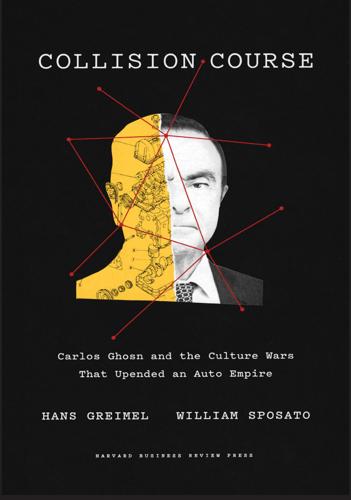
Collision Course: Carlos Ghosn and the Culture Wars That Upended an Auto Empire
by
Hans Gremeil
and
William Sposato
Published 15 Dec 2021
What wasn’t known was that they used money lent to them by the firm, and dutifully sold the shares back to the parent soon after MacArthur was wheels up from Tokyo’s Haneda airport. Still, many of the big names were eventually split up in some fashion. This did not mean the end of what could today be called “crony capitalism.” The break-up of the zaibatsu structure led to the creation of the less hierarchical keiretsu system of interlocking relationships, in which companies across a broad range of sectors banded together in loose cooperatives and often took cross-shareholdings in one another. Most were built around a financial institution to help in meeting the capital needs of the various members.
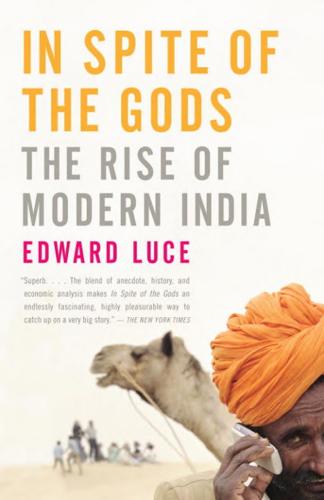
In Spite of the Gods: The Rise of Modern India
by
Edward Luce
Published 23 Aug 2006
Amar Singh is also the founder and head of the Uttar Pradesh Development Council, a group of politicians and businessmen whom the media has labeled “crony capitalist.” Prominent members include Anil Ambani, who controls Reliance Infocomm and Reliance Energy, two of India’s largest companies; and Subroto Roy, who owns the Sahara Group, a diversified private company with an airline, TV channels, and sprawling private residential estates. “If this is crony capitalism then we should all be crony capitalists,” Singh said to me, pointing out that the Uttar Pradesh Development Council had brought in many new investments for his state. What about the corruption allegations against his party? “There might be a little corruption here and there,” Singh said. “You cannot check everything.”
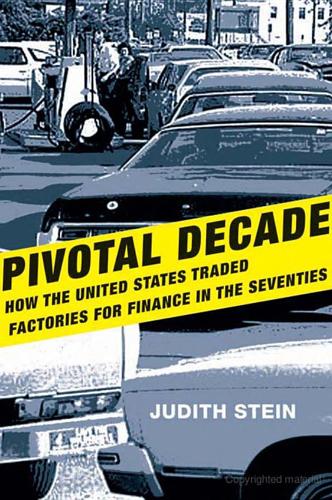
Pivotal Decade: How the United States Traded Factories for Finance in the Seventies
by
Judith Stein
Published 30 Apr 2010
Panic spread to South Korea, Malaysia, the Philippines, and Indonesia. On October 27 the Dow Jones average fell 554 points, 7.2 percent. Fed chair Alan Greenspan, Secretary of Treasury Robert Rubin, and his deputy secretary, Lawrence Summers, now changed the east Asian narrative. Instead of exemplars of free-market capitalism, the Asian tigers were icons of “crony capitalism.” In return for loans, the IMF demanded that nations cut government spending, increase interest rates to lure back private investors, pay back the worthless loans to Western banks, and ease the foreign purchase of domestic companies. But these measures worsened the recession, and Asian economies stagnated into 1998.
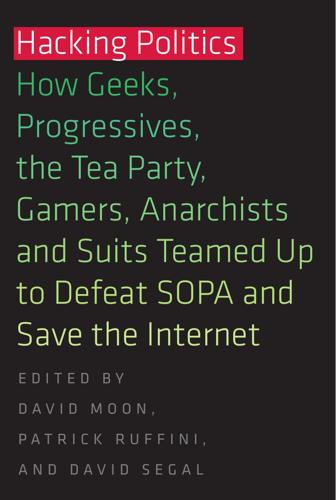
Hacking Politics: How Geeks, Progressives, the Tea Party, Gamers, Anarchists and Suits Teamed Up to Defeat SOPA and Save the Internet
by
David Moon
,
Patrick Ruffini
,
David Segal
,
Aaron Swartz
,
Lawrence Lessig
,
Cory Doctorow
,
Zoe Lofgren
,
Jamie Laurie
,
Ron Paul
,
Mike Masnick
,
Kim Dotcom
,
Tiffiniy Cheng
,
Alexis Ohanian
,
Nicole Powers
and
Josh Levy
Published 30 Apr 2013
Lobbyists can do that because they exploit an obvious dependence: Candidates for Congress need campaign cash. Lobbyists are a reliable channel for that cash—so long, at least, as the clients of these lobbyists get what they want. Everyone profits when that system works smoothly—except, of course, us. Lobbyists profit, because billings go up. Businesses and other wealthy interests profit, because crony capitalism pays. And Members and their staff profit, because campaigns get funded and Capitol Hill, as Congressman Jim Cooper puts it, remains a “farm league for K. Street.” The business model of government service is temporary governmental service—a temporary stop on the way to a lucrative career as a lobbyist.
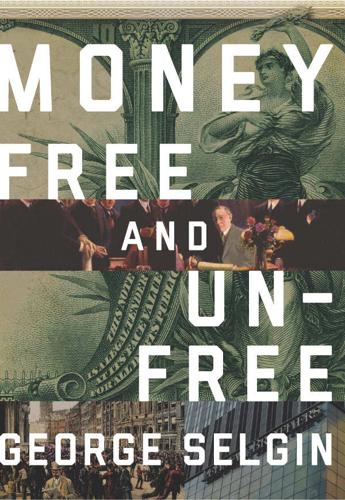
Money Free and Unfree
by
George A. Selgin
Published 14 Jun 2017
The popular perception of Aldrich—or at least that of Democrats and many western Republicans—was no different. It is well captured by a 1905 cartoon depicting him as the crowned king of the Senate, a tiny Teddy Roosevelt prostrate before him. Other Republican senators around him are busy welcoming “The Trusts” into the Senate Chamber, reading a ticker tape, or otherwise enjoying the fruits of crony capitalism. At the cartoon’s upper right corner the senator’s office door appears, with “VESTED INTERESTS” painted below his name on its etched-glass window. Aldrich’s close ties to Wall Street were evident in his choice of advisers. Although he treated his fellow commissioners as mere ciphers, he did not hesitate to take the advice of powerful financiers to heart, particularly ones closely associated with J.
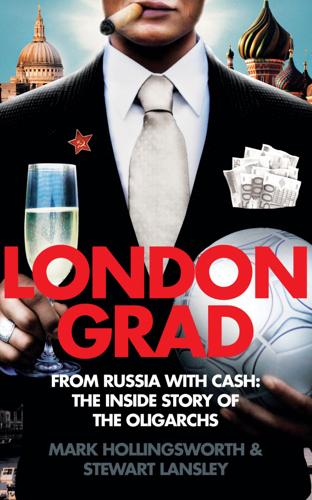
Londongrad: From Russia With Cash; The Inside Story of the Oligarchs
by
Mark Hollingsworth
and
Stewart Lansley
Published 22 Jul 2009
In Kremlin’, he would respond in his rapid-fire speech. Berezovsky wore officials down with his ceaseless networking and lobbying. When government ATS hotlines were installed in the guesthouse of his office at LogoVaz and his dacha at Alexandrovka, the telephone calls became even more frenzied. In many ways such crony capitalism had much in common with the worst features of the Soviet era. For a while Berezovsky and his colleagues functioned like a politburo: conducting backroom deals behind the scenes, secretly conspiring with and against each other, just as the senior apparatchiks had done under communism. As one prime minister was replaced with another, Berezovsky would hand the incoming leader pieces of paper bearing the names of the ministers he wanted in the new government.

People, Power, and Profits: Progressive Capitalism for an Age of Discontent
by
Joseph E. Stiglitz
Published 22 Apr 2019
“Since January 2003, drug manufacturers and wholesalers have given $147.5 million in federal political contributions to presidential and congressional candidates, party committees, leadership PACs and other political advocacy groups.” Most went to Republicans. From Stuart Silverstein, “This Is Why Your Drug Prescriptions Cost So Damn Much: It’s Exhibit A in How Crony Capitalism Works,” Mother Jones, Oct. 21, 2016. 26.These include Sheldon Adelson, who, with his wife and the companies they control, spent more than $82 million in support of Republicans and conservative outside groups in the 2016 election cycle alone; and Steve Wynn, who served as the Finance Chairman of the Republican National Committee until he was brought down by allegations of extreme sexual misconduct.
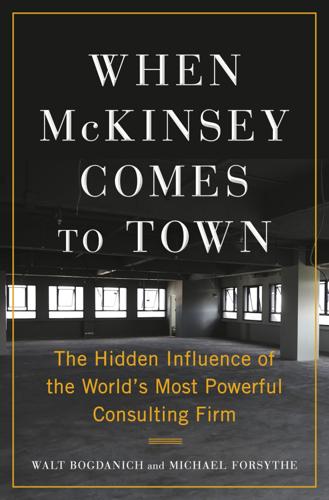
When McKinsey Comes to Town: The Hidden Influence of the World's Most Powerful Consulting Firm
by
Walt Bogdanich
and
Michael Forsythe
Published 3 Oct 2022
Subject line: “Future of the NHS.” In emails obtained by Tamasin Cave via FOI. Link to the email cache: powerbase.info/images/6/6b/2010_Emails_-_redacted.pdf. GO TO NOTE REFERENCE IN TEXT “You cannot get a cigarette paper”: Tamasin Cave and Andy Rowell, A Quiet Word: Lobbying, Crony Capitalism, and Broken Politics in Britain (London: Bodley Head, 2014), loc. 1564, Kindle. GO TO NOTE REFERENCE IN TEXT Emails show that he accepted: Masters sent his regrets for some events, such as the Health Investors Awards dinner. The details are from emails obtained by the journalist Tamasin Cave through Freedom of Information requests.
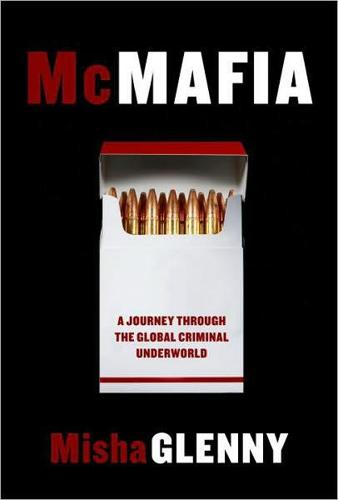
McMafia: A Journey Through the Global Criminal Underworld
by
Misha Glenny
Published 7 Apr 2008
Similarly, the yakuza struck up an intimate relationship with the key factions of the LDP, the Liberal Democratic Party, which dominated Japanese politics during the same period but unlike the Christian Democrats survived the fall of Communism and, despite some hiccups, still runs the country today. The bubble—when the zaibatsu, the LDP, and the yakuza all joined forces to realize what one commentator dubbed “the great transfer of wealth”—was no aberration. It was merely the country’s crony capitalism assuming its highest form for a blowout that lasted five years. This begs the question as to how the yakuza was ever able to occupy such an exalted position in Japanese society. Contrary to popular assumptions, they did not shoot, extort, or bribe their way to the top: they are, bizarrely, a product of Japan’s legal system.
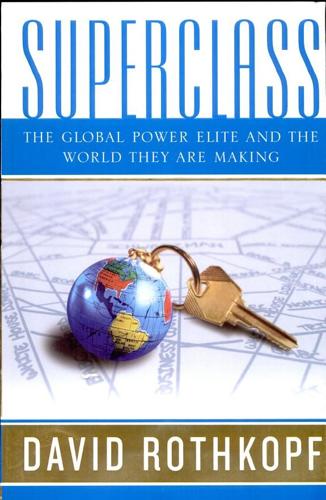
Superclass: The Global Power Elite and the World They Are Making
by
David Rothkopf
Published 18 Mar 2008
Bush was presented Alexandra Robbins, Secrets of the Tomb: Skull and Bones, the Ivy League, and the Hidden Paths of Power (Boston: Little, Brown, 2002), 126. 261 “Skull and Bones is not some ordinary” Ron Rosenbaum, “Skull and Bones, Denying Its Rite, Suckers AOL-TW,” New York Observer, July 14, 2002. 261 David Brooks, a conservative columnist “Skull and Bones: Secret Yale Society Includes America’s Power Elite,” 60 Minutes, June 13, 2004. 261 the Carlyle group, which manages more than $56 billion Company profile, www.carlyle.com. 262 its roster of prominent employees Melanie Warner, “Down the Rabbit Hole,” Fortune, March 18, 2002. 262 Even the younger Bush had a stint Jamie Doward, “Ex-Presidents Club Gets Fat on Conflict,” Guardian, March 23, 2003. 262 “Conspiracy theorists that obsess” Dan Briody, The Iron Triangle: Inside the Secret World of the Carlyle Group (Hoboken: John Wiley, 2003), 158. 263 newspaper articles and business magazine cover stories For example, a Carlyle feature by Emily Thornton et al., “Carlyle Changes Its Stripes,” made the cover of BusinessWeek, February 12, 2007. 263 in 1990 Carlyle started buying up defense-related assets Doward, “Ex-Presidents’ Club.” 263 took the company public Mark Fineman, “Arms Buildup Is a Boon to Firm Run by Big Guns,” Los Angeles Times, January 10, 2002. 263 Its $73 million purchase Terence O’Hara, “Carlyle Shows It’s Still Tops in Defense,” Washington Post, February 13, 2006. 263 He purportedly made a phone call Warner, “Down the Rabbit Hole.” 263 “The problem comes when” Oliver Burkeman and Julian Borger, “The Ex-Presidents’ Club,” Guardian, October 13, 2001. 263 One of Carlyle’s cofounders told The Nation Tim Shorrock, “Crony Capitalism Goes Global,” Nation, April 1, 2002. 263 “Since 9/11, USIS’s acquisition” Briody, Iron Triangle, 152. 264 Shafig bin Laden, one of Osama’s numerous brothers Warner, “Down the Rabbit Hole.” 264 As one top-level Carlyle employee Ibid. 266 One antiglobalist website, NewsWithViews Available at www.newswithviews.com. 266 “Business leaders go to Davos” Available at www.foe.co.uk. 266 “Davos is … the most visible symbol” Jeff Faux, “The Party of Davos,” Nation, February 13, 2006. 266 now generating more than $85 million a year World Economic Forum, “Annual Report 2005/06,” www.weforum.org. 267 The facts about the meeting are well known “About Us,” WEF website, www.weforum.org. 267 As Henri Schwamm, former vice president Jean-Christophe Graz, “How Powerful Are Transnational Elite Clubs?
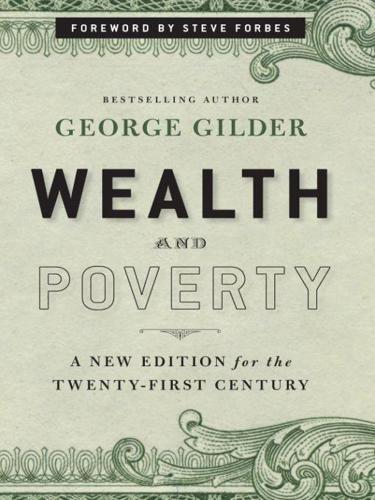
Wealth and Poverty: A New Edition for the Twenty-First Century
by
George Gilder
Published 30 Apr 1981
Surprises of resurgent growth and creativity come not only from these showcase countries, but also from the United States after the crash of 1920–21, from Margaret Thatcher’s United Kingdom, from revival in Eastern Europe and in China after the fall of communism, and even from abrupt rewards of changing policy in Sweden and Brazil. Much of Europe may be on track to dramatic revival, as countries across the continent adopt Germany’s increasingly supply-side policies. All these turnarounds show that retrenching interventionist government—its subsidies, mandates, and crony capitalism, its gargantuan tax gouges—is all upside. A self-serving myth of bureaucrats is the idea that reducing government power and spending is a risky and perilous pursuit. But a clear change in policy and a bold assertion of leadership in favor of enterprise and creation can accomplish a drastic turnaround in the performance of an economy.
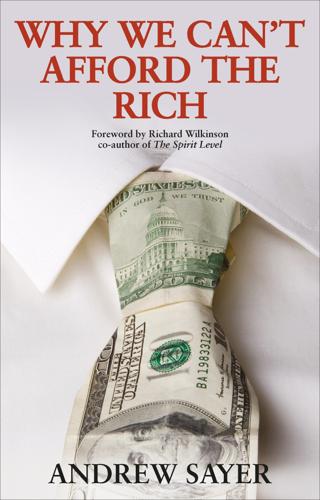
Why We Can't Afford the Rich
by
Andrew Sayer
Published 6 Nov 2014
(GPs are being given control of the majority of finance for health services, so that they can use whatever providers they wish, though in practice many lack the time to do so and will subcontract this allocation work to private companies: http://www.powerbase.info/index.php/Health_Portal.) Spinwatch itself does list its funders on its website, and how much they give: http://www.spinwatch.org/. 46 http://www.sourcewatch.org/index.php?title=State_Policy_Network and http://stinktanks.org/what-stinks/. 47 Cave, T. and Rowell, A. (2014) A quiet word: Lobbying, crony capitalism and broken politics in Britain, Oxford: The Bodley Head. 48 Bartels, L. (2005) ‘Economic inequality and political representation’, Working Paper, August, http://www.princeton.edu/~bartels/economic.pdf. See also Gilens, M. (2014) Affluence and influence, Princeton, NJ: Princeton University Press.
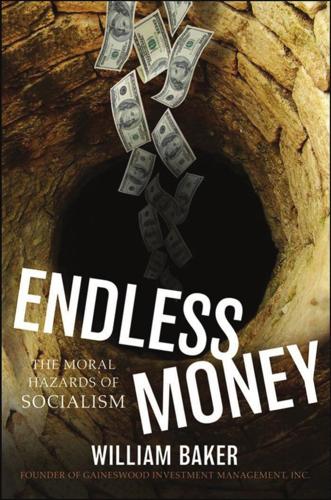
Endless Money: The Moral Hazards of Socialism
by
William Baker
and
Addison Wiggin
Published 2 Nov 2009
Neither the moderate steps resolved by the FOMC in its December 2008 meeting nor the swapping out of bad debt with Fed credit are likely to overcome the fears associated with what may be something like $20 trillion of excess debt being carried in the financial system relative to the low points of leverage experienced, such as the 1950s. About the only positive from not printing the massive amount of money needed to truly stabilize the system is that the gigantic moral hazard of wiping out savings might not happen. But, even without such printing, wealth will be redistributed from savers to nonsavers through crony capitalism to government contractors or whoever else would benefit from fiscal spending likely to be authorized, including or above the $1 trillion signed into law in February 2009. These dollars will be circulated soon, but the Treasury bonds and notes needed to be repaid would most certainly crimp taxpayer pocketbooks now or in subsequent generations unless so many were circulated that a great deal of consumer price inflation would result. 132 ENDLESS MONEY What this suggests is that the Fed will tinker with monetization in 2009, but consistently undershoot.
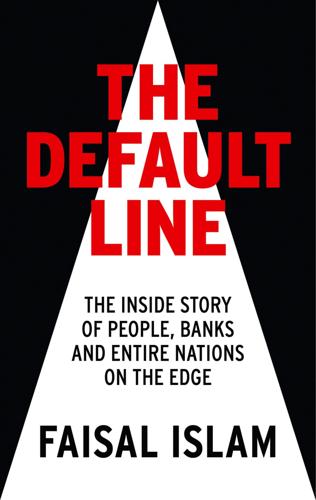
The Default Line: The Inside Story of People, Banks and Entire Nations on the Edge
by
Faisal Islam
Published 28 Aug 2013
These coalesce in two groups, known as the Octopus group and the Squid. Inside the Octopus camp are many members of the Independence Party and some of the country’s largest privately owned companies. The Squid group embraces the cooperative movement and many members of the Progressive Party.’ Crony capitalism is rather difficult to avoid in a country of 300,000 people, where everybody seems to know everybody else’s business. A regular source of dismay for British corporate financiers was how most of Iceland seemed to know which British retailers, banks and football teams were on the target list of the Icelandic billionaires.
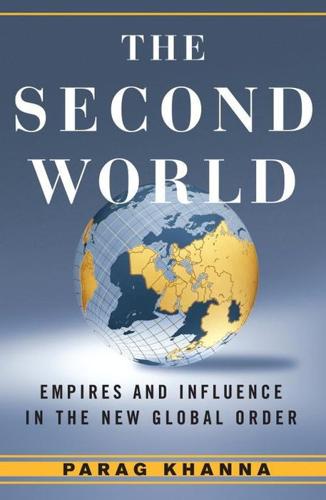
Second World: Empires and Influence in the New Global Order
by
Parag Khanna
Published 4 Mar 2008
Trust and commitment to leaders—these things do not exist: Few governments ever complete a first term. Latin culture is far too tolerant of “good corruption”—the kind that eases contract negotiations to make things move along—not recognizing that it actually derives from and perpetuates “bad corruption,” the prevalent system of big family rule and crony capitalism that operates in even Latin America’s best democracies. These gatekeepers and power brokers dominate all aspects of life, and democracy exacerbates the incentives for leaders to steal what they can and then flee. But Latin America could still become a solidly second-world region due to weighty economies like those of Brazil and Mexico, vast oil and gas resources, and proximity to the importing behemoth that is the United States. 22 In inaugurating South America’s visa-free zone, Brazilian foreign minister Celso Amorim declared, “Integration is an imperative because in a world of large blocs, we will be stronger if we are united.”
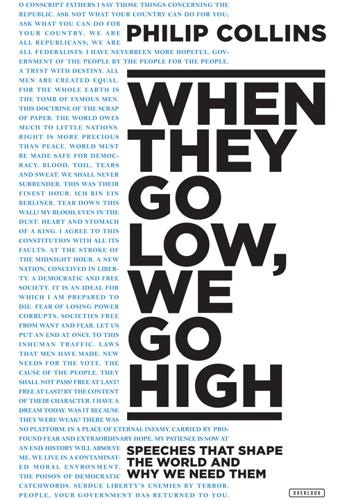
When They Go Low, We Go High: Speeches That Shape the World – and Why We Need Them
by
Philip Collins
Published 4 Oct 2017
He did not believe that most of those in prison had received a fair trial. He was probably right about that, but the most finely constructed words cannot brush off a troublesome reality. When the crime rate tripled in the four years after the Velvet Revolution, Havel faced the consequences of this first speech. Crony capitalism soon came to Czechoslovakia and, against Havel’s wishes, Czechoslovakia split into the Czech Republic and Slovakia in 1993. In conclusion, I would like to say that I want to be a president who will speak less and work more. To be a president who will not only look out of the windows of his airplane but who, first and foremost, will always be present among his fellow citizens and listen to them well.
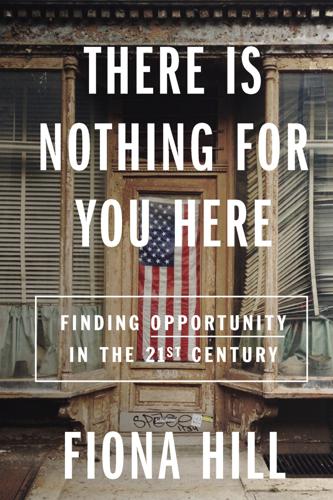
There Is Nothing for You Here: Finding Opportunity in the Twenty-First Century
by
Fiona Hill
Published 4 Oct 2021
But behind this flashy showmanship there was a darker kind of substance. Under Trump, the United States began to develop its own version of “the people who run the country own it,” which was a description applied to Russia by the Carnegie Moscow program head Dmitri Trenin. In populist settings you frequently end up with crony capitalism. Those who have personal ties get preferential treatment and rise to the top of the economy. The grabbing hand of state becomes the grabbing hand of the head of state. Personalized leadership tilts the playing field away from good governance and the true private sector toward corruption and nepotism.
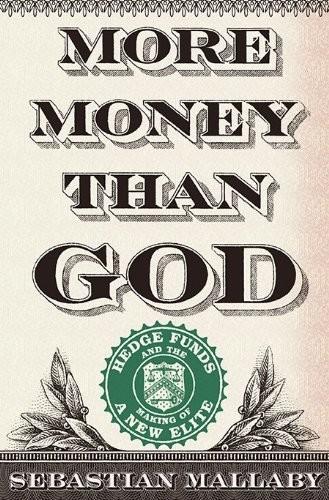
More Money Than God: Hedge Funds and the Making of a New Elite
by
Sebastian Mallaby
Published 9 Jun 2010
It was an astonishing proposal: A small San Francisco fund would take over the commanding heights of the world’s largest Muslim country. Farallon boasted no more than a few dozen employees; Bank Central Asia had eight million accounts and eight hundred branches. Farallon was the product of the Goldman arb culture plus a dollop of California cool; Bank Central Asia had been the embodiment of Indonesia’s crony capitalism. Andrew Spokes, a dapper English banker whom Steyer had recruited from the Goldman Sachs office in Hong Kong, later conceded that the deal was a stretch. “We were a little off piste,” he conceded, coolly inspecting his cuffs.25 He sounded like a vintage James Bond who skis an avalanche in a tuxedo.26 By the time the Bank Central Asia opportunity arose, the September 11 terrorist attacks had made Indonesia dicier than ever.
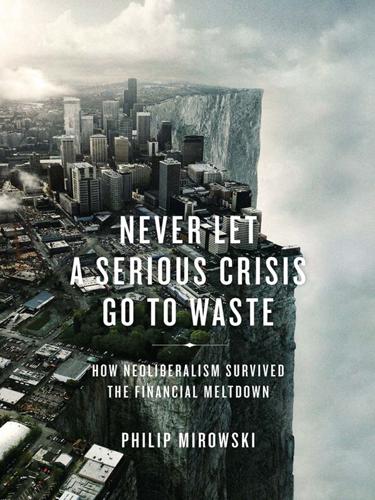
Never Let a Serious Crisis Go to Waste: How Neoliberalism Survived the Financial Meltdown
by
Philip Mirowski
Published 24 Jun 2013
The market designers still under contract responded to the Treasury’s volte-face in emphasis by insisting that there was no good reason the Treasury could not use auctions to purchase bank shares in addition to toxic assets, a position they maintained until the Treasury made it clear they had no intention to seek release of any additional TARP funds, therefore foreclosing any prospect for using auctions.135 Once that happened, things turned ugly: the market designers for hire themselves became some of the most fierce critics of the TARP, denouncing Cash for Trash. In an interview for NPR, Ausubel complained, “Instead of conducting transparent auctions, the Treasury is going to instead distribute suitcases of cash”; for Cramton, “It really is moving down the path to crony capitalism, in my mind, where the government is picking winners and losers in a nontransparent way.”136 This turnabout, however turncoat, was easy to pull off because both the market designers and the anti-TARP petitioners now claimed to have shared very similar assumptions about the economic role of government.
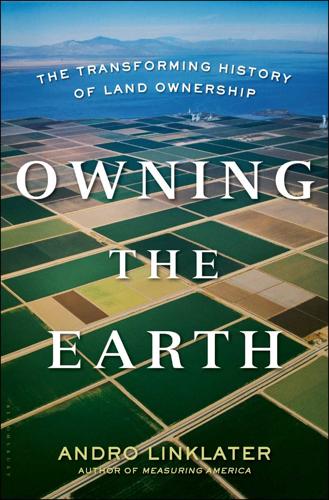
Owning the Earth: The Transforming History of Land Ownership
by
Andro Linklater
Published 12 Nov 2013
“Taib translated political power into property”: Yoolim Lee, “Getting Rich in Malaysia Cronyism Capital Means Dayak Lose Home,” Bloomberg News, August 24, 2009; cites Transparency International’s labelling of the Bakun Hydroelectric Dam on the Balui River in Sarawak as a “monument of corruption”; points to almost two hundred lawsuits pending in the Sarawak courts relating to claims by Dayak people on lands being used for oil palms and logging; quotes Sim Kwang Yang, former opposition MP, describing Sarawak’s economy as “crony capitalism driven by greed without any regard for the people,” and cites as examples the ownership by Taib’s adult children and his late wife, Lejla, of more than 29.3 percent of Cahya Mata Sarawak Bhd., the state’s largest industrial group, involved in construction, property development, and financial services.
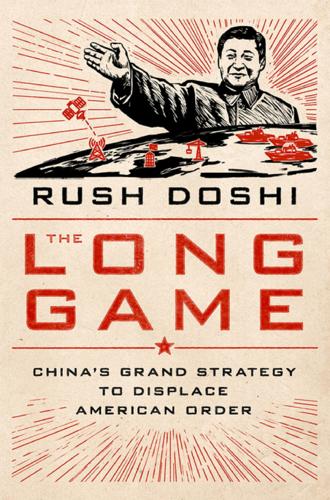
The Long Game: China's Grand Strategy to Displace American Order
by
Rush Doshi
Published 24 Jun 2021
: New Challenges for the Leaders of a Rising China,” in China’s Foreign Policy: Who Makes It, and How Is It Made?, ed. Gilbert Rozman (New York: Palgrave, 2011), 21–37; Linda Jakobson and Dean Knox, “New Foreign Policy Actors in China,” SIPRI Policy Paper (Stockholm: Stockholm International Peace Research Institute, 2010). 64Shambaugh, China’s Communist Party; Minxin Pei, China’s Crony Capitalism (Cambridge, MA: Harvard University Press, 2016). 65Zhao, “China’s Foreign Policy Making Process,” 105–6. 66Zhao Ziyang’s Collected Works Editing Team [赵紫阳文集编辑组], The Collected Works of Zhao Ziyang 1980-–1989 [趙紫陽文集 1980-1989], vol. 3 (Hong Kong: The Chinese University Press [香港中文大学], 2016), 218.. 67Ibid., vol. 3, 218. 68Jiang Zemin [江泽民], Jiang Zemin Selected Works [江泽民文选], vol. 1 [第一卷], 315. 69Ibid., vol. 1 [第一卷], 315. 70Ibid., vol. 1 [第一卷], 315. 71Hu Jintao [胡锦涛], Hu Jintao Selected Works [胡锦涛文选], vol. 2 [第二卷] (Beijing: People’s Press [人民出版社], 2016), 98–99 . 72Ibid., vol. 2 [第二卷], 98–99. 73Xi Jinping [习近平], Xi Jinping: The Governance of China [习近平谈治国理政], vol. 1 (Beijing: Foreign Language Press [外文出版社], 2014), 299. 74Xi Jinping [习近平], Xi Jinping: The Governance of China, Volume 2 [习近平谈治国理政], vol.
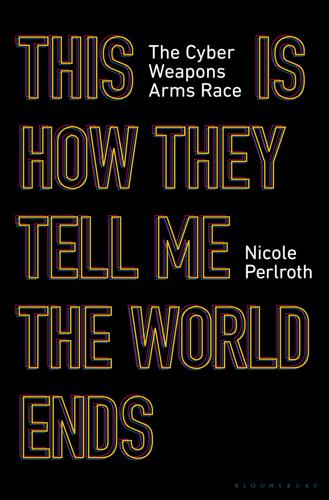
This Is How They Tell Me the World Ends: The Cyberweapons Arms Race
by
Nicole Perlroth
Published 9 Feb 2021
By other metrics like purchasing power parity, Russia now ranked seventy-second in the world—trailing even Europe’s economic problem child, Greece. With its population in rapid decline—at last count, Russia was losing a million working-age adults annually—Russia’s economic growth prospects had dropped to near zero. And now, with Putin and crony capitalism at the helm, a surge in foreign investment seemed unlikely. American officials came to believe—perhaps hope is the better word—that Russia’s attacks on U.S. energy firms were simply Moscow’s shady way of diversifying its economy. There was simply no good reason they could think of that Moscow would want to turn off our lights.
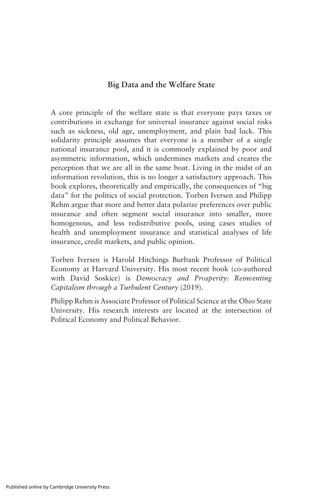
Big Data and the Welfare State: How the Information Revolution Threatens Social Solidarity
by
Torben Iversen
and
Philipp Rehm
Published 18 May 2022
Hicks, eds., The Comparative Political Economy of the Welfare State Joseph Jupille, Procedural Politics: Issues, Influence, and Institutional Choice in the European Union Karen Jusko, Who Speaks for the Poor? Electoral Geography, Party Entry, and Representation Stathis Kalyvas, The Logic of Violence in Civil War Stephen B. Kaplan, Globalization and Austerity Politics in Latin America David C. Kang, Crony Capitalism: Corruption and Capitalism in South Korea and the Philippines Junko Kato, Regressive Taxation and the Welfare State Orit Kedar, Voting for Policy, Not Parties: How Voters Compensate for Power Sharing Robert O. Keohane and Helen B. Milner, eds., Internationalization and Domestic Politics Herbert Kitschelt, The Transformation of European Social Democracy https://doi.org/10.1017/9781009151405.010 Published online by Cambridge University Press Herbert Kitschelt, Kirk A.
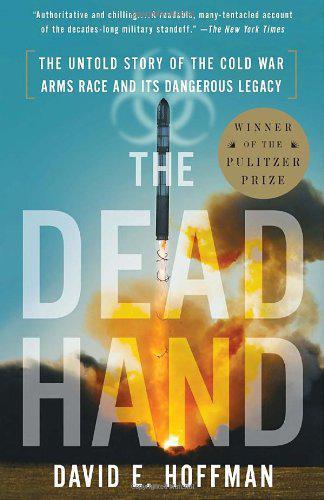
The Dead Hand: The Untold Story of the Cold War Arms Race and Its Dangerous Legacy
by
David Hoffman
Published 1 Jan 2009
The newly minted country was ruled by Nursultan Nazarbayev, a onetime steelworker whom Gorbachev had named Communist Party leader of the republic. An ethnic Kazakh, Nazarbayev gradually transformed himself after the Soviet collapse into a Central Asian potentate, mixing authoritarianism, oil wealth and crony capitalism. Now Nazarbayev wanted to be rid of the scourge of weapons that had so disfigured the landscape. He had no use for the uranium at Ust-Kamenogorsk. 7 A few weeks after their first meeting, Weber flew to join Mette for a hunting expedition. They drove in a jeep for hours to a base camp in the Altai Mountains of eastern Kazakhstan, near the borders of Russia and China, an ideal territory for hunting.
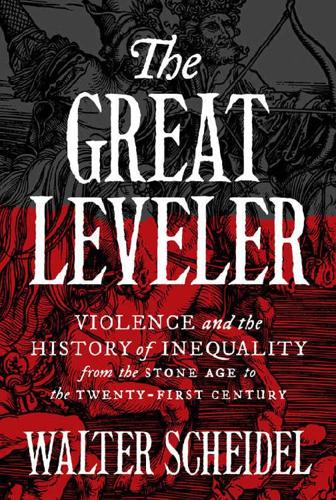
The Great Leveler: Violence and the History of Inequality From the Stone Age to the Twenty-First Century
by
Walter Scheidel
Published 17 Jan 2017
Causation is as clear as it can be: no violence, no leveling. As long as the system that was created in this transformation was kept in place by party cadres and the KGB, inequality remained low. As soon as political constraints were removed and replaced by a mixture of price-setting markets and crony capitalism, income and wealth disparities surged, most strikingly in the Russian and Ukrainian heartland of the former Soviet Union. ”THE MOST HIDEOUS CLASS WAR”: MAO’S CHINA With a time lag of about a generation, this story repeated itself on an even grander scale in China under communist rule. The biggest turnover occurred in the countryside, where most of the population lived.
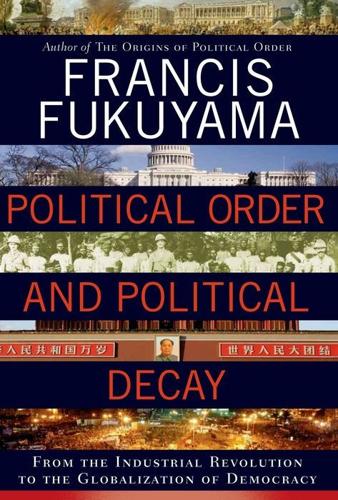
Political Order and Political Decay: From the Industrial Revolution to the Globalization of Democracy
by
Francis Fukuyama
Published 29 Sep 2014
This gave the government access to resources that it could use to suppress lawlessness and provide essential political stability. This led to an extraordinary period of economic growth in which Mexico succeeded in partially catching up to both North America and more liberal emerging powers such as Argentina. Díaz did not, however, create an open or liberal economic order but rather a system we would today label crony capitalism. It was similar in certain ways to the old mercantilist system, only run by local elites rather than the Spanish Crown.22 It did nothing to empower the mass of the Mexican population either economically or politically. The resulting social tensions exploded in the Mexican Revolution, another convulsive affair that led to Díaz’s overthrow in 1911 and lasted until 1916.
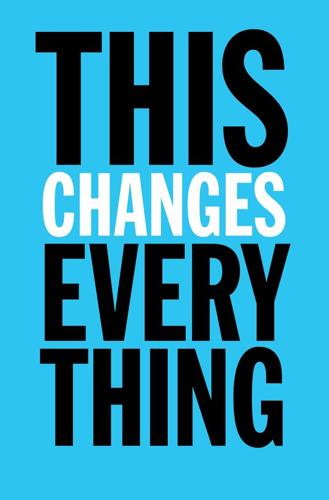
This Changes Everything: Capitalism vs. The Climate
by
Naomi Klein
Published 15 Sep 2014
In 2012, the conservancy managed to outrage many of its female staffers by partnering with the online luxury goods retailer Gilt to promote the Sports Illustrated Swimsuit Edition (the magazine explained that “whether you decide to buy a bikini, surfboards or tickets to celebrate at our parties, any money you spend . . . will help The Nature Conservancy ensure we have beaches to shoot Swimsuit on for another half-century”). VIII. Interestingly, before Nilsson got into the carbon game, he was investigated by a member of Queensland’s parliament for selling what appeared to be entirely fictional Australian real estate to unlucky marks in none other than Nauru. IX. Heartland regular Chris Horner called the bill “crony capitalism” on the Enron model—and Horner should know, because he used to work there. 7 * * * NO MESSIAHS The Green Billionaires Won’t Save Us “I had always got away with breaking rules and thought this was no different. I would have got away with it as well if I hadn’t been greedy.” —Richard Branson, on getting caught dodging taxes in the early 1970s1 “You gotta lead from the front.

Goliath: Life and Loathing in Greater Israel
by
Max Blumenthal
Published 27 Nov 2012
As Israeli-American journalist Liel Liebovitz wrote, “It takes a very small leap of imagination to see how perfectly this [post-Soviet] mentality translates into Hebrew: In Israel, aspiring politicians born in the former Soviet Union found that talk of trenches and enemies made for stellar political currency.” Like Vladimir Putin, Lieberman believed he was called by history to restore the honor and morale of a traumatized, economically ravaged population. Both men demanded total compliance to the system of crony capitalism and social repression they sought to impose, exploiting every regulatory and bureaucratic mechanism at their disposal to neuter civil society, especially the pesky human rights NGOs that produced embarrassing English-language human rights reports every now and again. Most significant, perhaps, was the terrifying street-level atmosphere Putin and Lieberman cultivated in their respective societies.
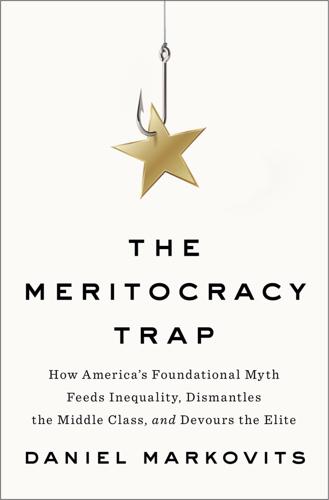
The Meritocracy Trap: How America's Foundational Myth Feeds Inequality, Dismantles the Middle Class, and Devours the Elite
by
Daniel Markovits
Published 14 Sep 2019
See also Bourree Lam, “Recruitment, Resumes, Interviews: How the Hiring Process Favors Elites,” Atlantic, May 27, 2015, accessed June 14, 2018, www.theatlantic.com/business/archive/2015/05/recruitment-resumes-interviews-how-the-hiring-process-favors-elites/394166/ [inactive]. outright fraud: See, e.g., Russell Sobel, “Crony Capitalism Pays Well for Rent-Seeking CEOs,” Investor’s Business Daily, July 9, 2014, accessed June 14, 2018, www.investors.com/politics/commentary/political-activity-and-connections-dont-make-business-profitable/. a rising oligarchy: See Thomas Piketty, Capital in the Twenty-First Century, trans. Arthur Goldhammer (Cambridge, MA: Belknap Press of Harvard University Press, 2014).
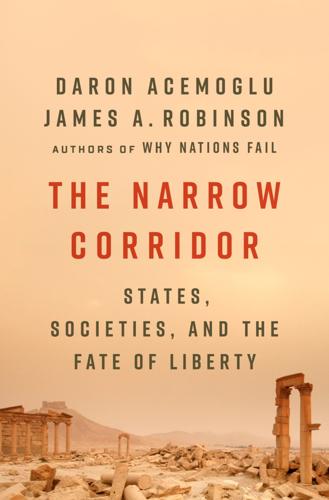
The Narrow Corridor: States, Societies, and the Fate of Liberty
by
Daron Acemoglu
and
James A. Robinson
Published 23 Sep 2019
“The Wind of Change: Maritime Technology, Trade, and Economic Development.” American Economic Review 107, no. 9: 2821–54. Pattison, George. (2000). Routledge Philosophy Guidebook to the Later Heidegger. London: Routledge. Pearlman, Wendy (2017). We Crossed a Bridge and It Trembled: Voices from Syria. New York: Custom House. Pei, Minxin (2016). China’s Crony Capitalism: The Dynamics of Regime Decay. Cambridge, MA: Harvard University Press. Perham, Margery (1960). Lugard: The Years of Adventure, 1858–1945 and Lugard: The Years of Authority, 1898–1945. 2 vols. London: Collins. Perry, Elizabeth J. (2008). “Chinese Conceptions of ‘Rights’: from Mencius to Mao—and Now.”
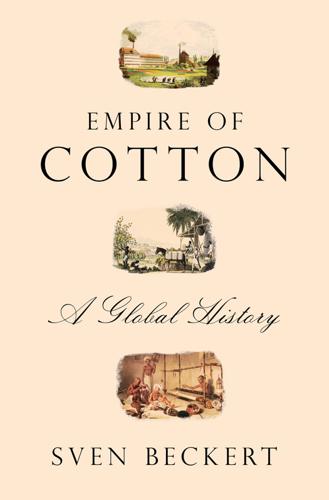
Empire of Cotton: A Global History
by
Sven Beckert
Published 2 Dec 2014
Williamson, “Globalization, De-industrialization and Mexican Exceptionalism, 1750–1879,” National Bureau of Economic Research Working Paper No. 12316, June 2006, 40; Stephen Haber, Armando Razo, and Noel Maurer, The Politics of Property Rights: Political Instability, Credible Commitments, and Economic Growth in Mexico, 1876–1929 (New York: Cambridge University Press, 2003), 128; Clark et al., Cotton Goods in Latin America, 20, 38; Wolfgang Müller, “Die Textilindustrie des Raumes Puebla (Mexiko) im 19. Jahrhundert” (PhD dissertation, University of Bonn, 1977), 63; Stephen H. Haber, “Assessing the Obstacles to Industrialisation: The Mexican Economy, 1830–1940,” Journal of Latin American Studies 24, no. 1 (February 1992), 18–21; Stephen Haber, Crony Capitalism and Economic Growth in Latin America: Theory and Evidence (Palo Alto, CA: Hoover Institution Press, 2002), 66, Table 2.3; Mirta Zaida Lobato, “A Global History of Textile Production, 1650–2000 (Argentina), Textile Conference IISH, November 11–13, 2004; Lockwood, Greene & Co. to Carlos Tornquist, Boston, August 13, 1924, in Industrias 144–8271, Biblioteca Tornquist del Banco Central de la República Argentina, Buenos Aires; Producción, elaboración y consumo del algodón en la República Argentina, 1924, in Industrias 144–8271, Biblioteca Tornquist del Banco Central de la República Argentina, Buenos Aires; Carlos D.
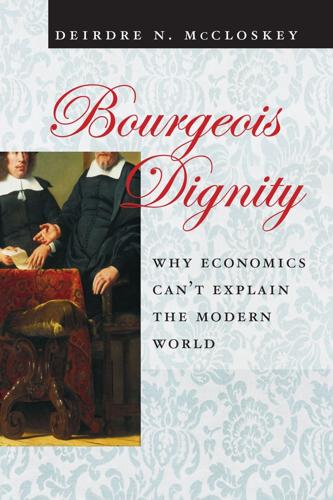
Bourgeois Dignity: Why Economics Can't Explain the Modern World
by
Deirdre N. McCloskey
Published 15 Nov 2011
As Mokyr puts it, what the Confucian tradition disdained was new useful knowledge or, as I would add, new knowledge useful by a test in trade. Chinese “Communist” real income per person is still a fifth of what it is in the United States. There is plenty of time for the Chinese to revert to ancient Confucian ideology and to kill, or at least sicken, the golden goose, as Argentinians did in the twentieth century and as crony capitalism has in Japan and as the habit of regulation and not-in-my-back-yard threatens to do in the United States. The Christians in their beginnings were among the most anticommercial people of faith, more so than Jews or Muslims or Hindus or Zoroastrians or even Buddhists.2 Important theorizers about the economy in the first millennium of Christianity were monks and mystics and desert fathers, in the style of St.
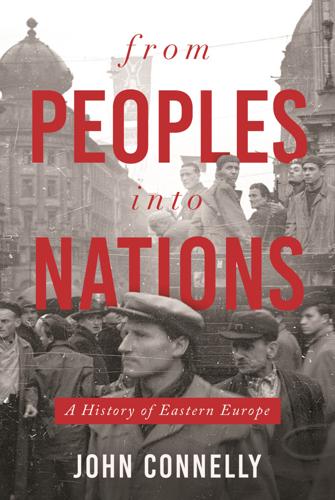
From Peoples into Nations
by
John Connelly
Published 11 Nov 2019
The gross national product dropped 9 percent, and from January 1996 to January 1997, the average monthly salary fell almost tenfold, from $118 to $12. The government was not serving the nation; instead, as Tsveta Petrova writes, it had become hostage to “shadowy interests, spiraling corruption, and crony capitalism.”52 Videnov’s performance explains Bulgaria’s exclusion from the first wave of EU entrants. EU agencies made clear that unless corruption and mismanagement were removed, the path to “Europe” was closed. Such messages naturally implicated the Bulgarian left. At the same time, Western NGOs on the center-right, like the Germany’s Konrad Adenauer Foundation or France’s Robert Shuman Foundation, helped the opposition Union of Democratic Forces (UDF)—a diverse federation of parties that had emerged in 1989—evolve into a Christian Democratic party.